Saints and Feast Days for the Month of April
All of the following are non-moveable feasts that always occurs on the same date each year
All of the following are non-moveable feasts that always occurs on the same date each year
April 2nd, St. Francis of Paola
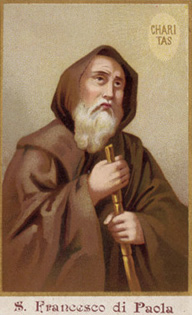
St. Francis of Paola, Confessor Saints: the Gift of Miracles April 2nd, St. Francis of Paola. O God, the exultation of the humble, Who hast raised Blessed Francis, Thy Confessor, to the glory of Thy saints, grant, we beseech Thee that by his merits and example we may happily obtain the rewards promised to the humble. Through our Lord, etc. (Roman Breviary) At the age of fifteen, Saint Francis left his poor home at Paula in Calabria, Italy, to live as a hermit in a cave on the seacoast. In time disciples gathered around him, and with them, in 1436, he founded the Order of the Minims. He chose this name that they might always consider themselves the least of monastic Orders. They observed a perpetual Lent, never touching meat, fish, eggs, or milk. Francis himself made the rock his bed; his best garment was a hair shirt, and boiled herbs were his only fare. His first consideration in all things was Caritas, charity. Saint Francis was a thaumaturge, which denomination indicates a miracle-worker known for his virtually unceasing wonders. The Church recognizes that God, as a rule, does not raise up more than one every century. He cured the sick, raised the dead, averted plagues, expelled evil spirits, and brought sinners to penance. But opposition arose; a famous preacher, misled by a few misguided monks, set to work to preach against Saint Francis and his miracles. The Saint took no notice of it, and the preacher, finding that he made no way with his hearers, determined to go to see this poor hermit whom he did not know, and confound him in person. The Saint received him kindly, gave him a seat by the fire, and listened to a long exposition of his own frauds. He then quietly took some glowing embers from the fire, and closing his hands upon them unhurt, said, Come, Father Anthony, warm yourself, for you are shivering for want of a little charity. Father Anthony, falling at the Saint's feet, asked for pardon, and then, having received his embrace, left him, to become his panegyrist and himself attain great perfection. When the avaricious King Ferdinand of Naples offered him a gift of money for his convent, Francis told him to give it back to his oppressed subjects, and softened his heart by causing blood to flow from the ill-gotten coin. King Louis XI of France, trembling at the approach of death, sent for the poor hermit to come and ward off the foe whose advance neither his fortresses nor his guards could check. Francis went at the Pope's command, leaving his country and his foundations there, which he foretold he would not see again; and he prepared the king for a pious death. He set the court to marveling when a delicately seasoned fish, which the king had ordered prepared for his guest's dinner, swam away after Saint Francis cast it into the pool from which it had been taken. And the successors of King Louis showered favors on their remarkable guest, desiring him to remain in France. It was God's will that retained him there. His Rule for the Order of Minims was adopted also by women religious, and spread throughout Europe; a less rigorous Rule was adapted for the Third Order Secular for those who desired a life of penance in their state. His name was reverenced everywhere in the Christian world; his prophecies were, during his lifetime, and are still today, held in great veneration. He died at the age of ninety-one, on Good Friday, 1507, with the crucifix in his hand and the last words of Jesus on his lips: Into Thy hands, O Lord, I commend my spirit. |
April 4th, St. Isidore, Bishop, Confessor, and Doctor of the Church.
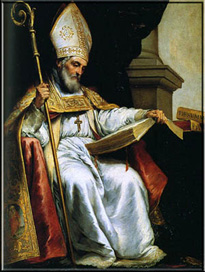 St. Isidore, Bishop, Confessor, and Doctor of the Church What Cannot and What Can Be Reformed in the Church. What Every Christian Must Believe and Do to be Saved. St. Isidore, Bishop, Confessor, and Doctor of the Church O God, Who didst give blessed Isidore to be a minister of eternal salvation to Thy people: grant, we beseech Thee, that we who have had him on earth as Teacher of life, may be worthy to have him for advocate in heaven. Through our Lord, etc. (Roman Breviary) Saint Isidore was born of a ducal family, at Carthagena in Spain. His two brothers, Leander, Archbishop of Seville, Fulgentius, Bishop of Ecija, and his sister Florentina, are all recognized by the Church as Saints. As a boy Isidore despaired over his poor success in study, and ran away from school. Resting in his flight at a roadside spring, he observed a stone, which had been hollowed out by the slow but constant dripping of water. This lesson decided him to return, and then, by determined application, he succeeded. He went back to his master and with the help of God became, even as a youth, one of the most learned men of the time. He assisted in converting Prince Recared, the leader of the Arian party; and with his aid, though at the constant peril of his own life, expelled that heresy from Spain. Then, following a call from God, he turned a deaf ear to the entreaties of his friends, and embraced a hermit's life. Prince Recared and many of the nobles and clergy of Seville went to persuade him to come back, representing the needs of the times and the good he could do, and had already done, among the people. He refused, and, as far as we can judge, his retreat gave him the necessary opportunity of acquiring the virtue and power which afterwards made him an illustrious Bishop and Doctor of the Church. On the death of his brother Leander, he was called to fill the vacant see. As a teacher, ruler, founder, and reformer, he labored not only in his own diocese, but throughout Spain, and his influence attained foreign countries. He died in Seville on April 4, 639, and within sixteen years of his death was declared a Doctor of the Catholic Church. Reflection. The strength of temptation usually lies in the fact that its object is something flattering to our pride, soothing to our sloth, or in some way attractive to the baser passions. Saint Isidore teaches us to listen neither to the promptings of nature nor the plausible advice of friends, when they contradict the voice of God. |
April 5th, St. Vincent Ferrer, Confessor
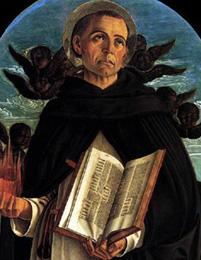
St. Vincent Ferrer I. Seven Petitions to St. Vincent Ferrer--May be said every Friday St. Vincent Ferrer II. Novena to St. Vincent Ferrer, March 28th through April 5th 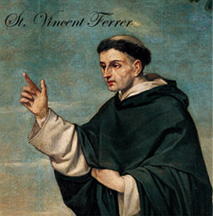 St. Vincent Ferrer, his life, Spiritual Teaching, and Practical Devotion Sermon on the End of the World and General Judgment by St. Vincent Ferrer Sermon on the Last Judgment--Sheep and Goats by St. Vincent Ferrer Prayers for the Preservation of Chastity. An Explanation and Defense of the Virtue of Chastity O God, who didst vouchsafe to make Thy Church illustrious by the merits and preaching of blessed Vincent Thy Confessor: grant to us Thy servants, that we may be instructed by his example, and through his intercession may be delivered from all harm. Through our Lord, etc. V. The Lord loved him, and adorned him. R. He clothed him with a robe of glory. Ant. I will liken him to a wise man who built his house upon a rock. (Roman Breviary) This wonderful apostle, the Angel of the Judgment, was born at Valencia in Spain in 1357. At the age of eighteen, he was professed in the Order of Saint Dominic. After a brilliant course of study he became Master of Sacred Theology, and began to preach. For three years he read only the Sacred Scriptures, and came to know the entire Bible by heart. He brought the light of Christ to the Jews of Valencia, and their synagogue became a church. Grief at the great schism then afflicting the Church reduced him to the point of death at the age of forty, but Our Lord Himself whom he saw in glory, healed him and bade him go forth to convert sinners, for My judgment is near. In the language of Scripture, a judgment is a time of trial during which the good become better by prayer and abandonment to God's Providence, and the impious blaspheme. The judgment which was to fall upon Europe, the rending of the robe of Christ through the still greater fragmentation of the Church, would follow soon after Saint Vincent's time; his passage preserved large numbers of souls from its fatal dangers. This virtually miraculous apostolate lasted twenty-one years. He preached throughout western Europe, in the towns and villages of Spain, Switzerland, France, Italy, England, Ireland, Scotland. Everywhere tens of thousands of sinners were reformed. Infidels, heretics, Jews were enlightened and warmed by the Sun of Justice. Stupendous miracles enforced his words. Twice each day the miracle bell summoned the sick, the blind, the lame to be cured, and the most obdurate sinners became Saints. Speaking only his native Spanish, he was understood in all tongues. Processions of ten thousand penitents followed him in perfect order. Convents, orphanages, hospitals, arose where he passed. Amid all the honors which came to him, his humility remained profound, his prayer constant. He always made prayer his principal preparation for preaching. Once, however, when a person of high rank was to be present at his sermon, he neglected prayer for study. The nobleman was not particularly struck by the discourse which had been thus carefully laid out. But he came again to hear the Saint, and the second sermon, for which Saint Vincent's supplications before the Crucifix were the preparation, made a deep impression on his soul. When Saint Vincent heard of his reaction, he remarked that in the first sermon it was Vincent who had preached, but in the second, Jesus Christ. Saint Vincent fell ill at Vannes in Brittany, and received the crown of everlasting glory in 1419. Reflection. Whatever you do, said Saint Vincent, think not of yourself, but of God. In this spirit he preached, and God spoke by him; in this spirit, if we listen, we shall hear the voice of God. |
April 11th: St. Leo I, Pope, Confessor and Doctor of the Church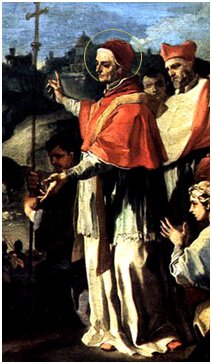 St. Leo I. Pope, Confessor, and Doctor of the Church On the Number of Sins, by St. Aphonsus Di Liguori O eternal Shepherd, watch over the peace of Thy flock, and through blessed Leo Sovereign Pontiff, whom Thou didst appoint shepherd over the whole Church, keep her under Thy constant protection. Through our Lord Jesus Christ, Thy Son, Who liveth and reigneth with Thee in the unity of the Holy Ghost, one God, world without end. Amen. (Roman Breviary) Saint Leo was born in Rome. He embraced the sacred ministry, was made Archdeacon of the Roman Church by Pope Saint Celestine, and under the same Vicar of Christ and Saint Sixtus III, had a large share in governing the Church. On the death of Sixtus, Leo was chosen Pope, and consecrated on Saint Michael's day, 440, amid great joy. It was the time of terrible trial which preceded by thirty years the definitive fall of the Roman Empire. Vandals and Huns were wasting the provinces of the empire, and Nestorians, Pelagians, and other heretics wrought still more grievous havoc in souls. While Leo's zeal was making headway against these perils, there arose the new heresy of Eutyches, who confounded the two natures of Christ. At once the vigilant pastor proclaimed the true doctrine of the Incarnation in his famous "tome"; but fostered by the Byzantine court, the heresy gained a strong hold upon the Eastern monks and bishops. After three years of unceasing toil, Saint Leo brought about its solemn condemnation by the Council of Chalcedon, the Fathers all signing his tome, and exclaiming, "Peter has spoken by Leo." Soon after, Attila with his Huns broke into Italy, and marched through its razed cities upon Rome. Leo went out boldly to meet him, and prevailed on him to turn back. His chieftains were astonished to see the terrible Attila, the "Scourge of God," fresh from the sack of Aquileia, Milan and Pavia and with the rich prize of Rome within his grasp, turn his great host back to the Danube at the Saint's word. They asked him why he had acted so strangely. He told them he had seen two venerable personages -- who are generally supposed to be Saints Peter and Paul -- standing behind Saint Leo; and impressed by this vision, he withdrew. Two years later the city fell a prey to the Vandals, but Leo saved it again from total destruction. He died in 461 after having ruled the Church for a little over twenty years. |
April 13th: St. Hermenegild, Martyr
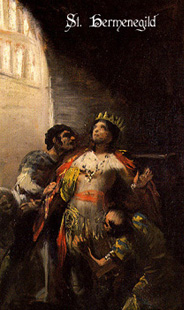 St. Hermenegild, Martyr Why the Catholic Church Condemns Attendance at False Worship by Michael Mueller, 1874 How Catholics lose the Faith by Fr. Michael Muller Unworthy Communion The Sacrament of the Holy Eucharist Litany of Faith and the Necessity of the Catholic Faith for Salvation The Heresy of Indifferentism: the Consequence of Luther's Heresy of Faith Alone No Salvation Outside the Catholic Church Are we bound to profess our Catholic Faith openly? On the Divinity of Christ The Dogma of the Incarnation Rests on the Divine Maternity of the Blessed Virgin Mary The Catholic Church's Teaching on Justification Saints: the Gift of Miracles Refuting Protestant Errors of Private Interpretation O God, Who didst teach Thy blessed Martyr Hermenegild to choose the kingdom of heaven rather than an earthly kingdom: grant, we beseech Thee, that, following his example, we may despise things that perish and pursue those that are everlasting. Through our Lord etc. (Roman Breviary) Leovigild, King of the Visigoths, had two sons, Hermenegild and Recared, who reigned conjointly with him. All three were Arians, but Hermenegild married a zealous Catholic, the daughter of Sigebert, King of France, and by her holy example was converted to the faith. His father, on hearing the news, denounced him as a traitor and marched to seize his person. Hermenegild tried to rally the Catholics of Spain in his defence, but they were too weak to make any stand, and, after a two years' fruitless struggle, he surrendered on the assurance of a free pardon. When safely in the royal camp, the king had him loaded with fetters and cast into a foul dungeon at Seville. Tortures and bribes were in turn employed to shake his faith, but Hermenegild wrote to his father that he held the crown as nothing, and preferred to lose sceptre and life rather than betray the truth of God. At length, on Easter night, an Arian bishop entered his cell, and promised him his father's pardon if he would but receive Communion at his hands. Hermenegild indignantly rejected the offer, and knelt with joy for his death-stroke. The same night a light streaming from his cell told the Christians who were watching near that the martyr had won his crown, and was keeping his Easter with the Saints in glory. He died in 586 A.D. Leovigild on his death-bed, though still an Arian, bade Recared seek out St. Leander, whom he had himself cruelly persecuted, and, following Hermenegild's example, be received by him into the Church. Recared did so, and on his father's death labored so earnestly for the extirpation of Arianism that he brought over the whole nation of the Visigoths to the Church. "Nor is it to be wondered," says St. Gregory, "that he came thus to be a preacher of the true faith, seeing that be was brother of a martyr, whose merits did help him to bring so many into the lap of God's Church." Reflection.---St. Hermenegild teaches us that constancy and sacrifice are the best arguments for the Faith, and the surest way to win souls to God. |
April 14th: St. Justin Martyr and St. Tiburtius and Companions, Martyrs. 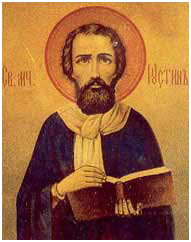
St. Justin Martyr The Folly of Sin O God, Who by the foolishness of the cross didst wonderfully instruct blessed Justin Martyr in the excellent knowledge of Jesus Christ: grant that through his intercession we may drive forth the deceits of error and become steadfast in faith. Through the same etc. (Roman Breviary) St. Justin was born of heathen parents at. Neapolis in Samaria, about the year 103. He was well educated, and gave himself to the study of philosophy, but always with one object, that he might learn the knowledge of God. He sought this knowledge among the contending schools of philosophy, but always in vain, till at last God himself appeased the thirst which He had created. One day, while Justin was walking by the seashore, meditating on the thought of God, an old man met him and questioned him on the subject of his doubts; and when he had made Justin confess that the philosophers taught nothing certain about God, he told him of the writings of the inspired prophets and of Jesus Christ Whom they announced, and bade him seek light and understanding through prayer. The Scriptures and the constancy of the Christian martyrs led Justin from the darkness of human reason to the light of faith. In his zeal for the Faith he travelled to Greece, Egypt, and Italy, gaining many to Christ. At Rome he sealed his testimony with his blood, surrounded by his disciples. "Do you think," the prefect said to Justin, "that by dying you will enter heaven, and be rewarded by God?" "I do not think," was the Saint's answer; "I know." Then, as now, there were many religious opinions, but only one certainty--the certainty of the Catholic faith. This certainty should be the measure of our confidence and our zeal. Reflection--We have received the gift of faith with little labor of our own. Let us learn how to value it from those who reached it after long search, and lived in the misery of a world which did not know God. Let us fear, as St. Justin did, the account we shall have to render for the gift of God. Almighty God, grant we beseech Thee, that we who keep the solemn feast of Thy holy Martyrs Tiburtius, Valerian and Maximus, may also imitate their virtues. Through our Lord etc. |
April 21st: St. Anselm, Bishop, Confessor and Doctor of the Church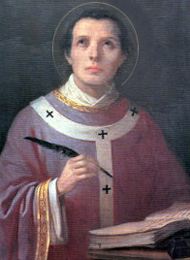 St. Anselm On the Horror of Mortal Sin Sins of Omission by Cardinal Manning Three Short Sermon: On the Havoc of Sin and the Judements of God Upon Mortal Sin Sermon on Faith Sermon: the Gift of Faith Explained O God, Who didst give blessed Anselm to be a minister of eternal salvation to Thy people: grant, we beseech Thee, that we Who have had him on earth as Teacher of life, may be advocate in heaven. Through our Lord etc. St. Anselm was a native of Piedmont. When a boy of fifteen, being forbidden to enter religion, he for a while lost his fervor, left his home, and went to various schools in France. At length his vocation revived, and he became a monk at Bec in Normandy. The fame of his sanctity in this cloister led William Rufus, when dangerously ill, to take him for his confessor, and to name him to the vacant see of Canterbury. Now began the strife of Anselm's life. With new health the king relapsed into his former sins, plundered the Church lands, scorned the archbishop's rebukes, and forbade him to go to Rome for the pallium. Anselm went, and returned only to enter into a more bitter strife with William's successor, Henry I. This sovereign claimed the right of investing prelates with the ring and crozier, symbols of the spiritual jurisdiction which belongs to the Church alone. The worldly prelates did not scruple to call St. Anselm a traitor for his defence of the Pope's supremacy; on which the Saint rose, and with calm dignity exclaimed, "If any man pretends that I violate my faith to my king because I will not reject the authority of the Holy See of Rome, let him stand forth, and in the name of God I will answer him as I ought" No one took up the challenge; and to the disappointment of the king, the barons sided with the Saint, for they respected his courage, and saw that his cause was their own. Sooner than yield, the archbishop went again into exile, till at last the king was obliged to submit to the feeble but inflexible old man. In the midst of his harassing cares, St. Anselm found time for writings which have made him celebrated as the father of scholastic theology; while in metaphysics and in science he had few equals. He is yet more famous for his devotion to our blessed Lady, whose Feast of the Immaculate Conception he was the first to establish in the West. He died in 1109. |
April 22nd: Sts. Soter and Caius, Popes, Martyrs
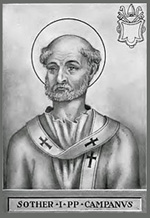
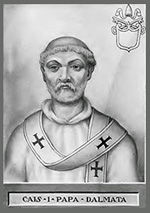
Sts. Soter and Caius, from the Liturgical Year, 1870 Catholic Book: The Marytrs of the Coliseum Why the World Continually Persecutes the Church Litany of Faith and the Necessity of the Catholic Faith for Salvation Are we bound to profess our Catholic Faith openly? Abjuration of Heresy and Profession of Faith of the Council of Trent, Pius IV., 1565 O Eternal Shepherd, watch over the peace of Thy flock, and through blessed Soter and Caius, Thy Martyrs and Sovereign Pontiffs, whom Thou didst appoint shepherds over the whole Church, keep her under Thy contact protection. Through our Lord. Ant. Perpetual light shall shine upon Thy Saints, O Lord, and an eternity of ages, alleluia. V. O ye holy and just ones, rejoice in the Lord, alleluia. R. God has chosen you to Himself for an inheritance, alleluia. (Roman Breviary) Saint Soter was raised to the papacy upon the death of Saint Anicetus in 161. By the sweetness of his discourses he comforted all afflicted persons with the tenderness of a father, and assisted the indigent with liberal alms, especially those who suffered for the Faith. He liberally extended his charities, according to the custom of his predecessors, to remote churches. He aided in particular that of Corinth, to which he addressed an excellent letter. Saint Dionysius of Corinth in his letter of thanks to Saint Soter, adds that the Pontifical letter together with the letter of Saint Clement, Pope, was read for the edification of the faithful on Sundays, during their assemblies to celebrate the divine mysteries. One of Saint Soter's ordinances required all Christians except those in public penance to receive Communion on Holy Thursday. Saint Soter vigorously opposed the heresy of Montanus, and governed the Church up to the year 170. He was martyred on April 22, 170, under the emperor Marcus Aurelius, and buried on the Appian Way in the cemetery of Callixtus. Pope Saint Caius, born in Dalmatia, was a relative of the emperor Diocletian. The cruel emperor did not for that reason spare him or his family during the bloody persecution of the years 283 to 296, during which the Christians of Rome were obliged to conceal themselves in caverns and cemeteries. Saint Caius counseled a patrician named Chromatius to receive the tracked disciples of Christ in his country residence. He himself went to visit them on a Sunday, and said to the faithful assembled there that Our Lord Jesus Christ, knowing the fragility of human nature, established two degrees in the practice of Christianity, confession and martyrdom. Our Saviour did so, he said, so that those who do not believe they could stand up under torment, may nonetheless conserve the grace of the faith by their confession. Our Lord had indeed specified, "When you are persecuted in one city, flee to another . . ." Then he said, "Those who wish to stay in the house of Chromatius, remain with Tiburtius, while those who prefer to return with me to the city, come." Several followed him back to Rome; among them are the martyrs of the same persecution, the brothers Saints Marcus and Marcellinus, and Saint Sebastian. Saint Caius himself received the crown of martyrdom in the final year of the persecution, 296, and was buried in the cemetery of Callixtus, where his body was found in 1622, with an inscription identifying him as Vicar of Christ. |
April 23rd: St. George, Martyr. St. George, Martyr 14 Holy Helpers Resisting the Devil Does Satan Exist? St. Michael/ Exorcism Are we bound to profess our Catholic Faith openly? Resisting the Enemies of Our Salvation O God, Who dost gladden us by the merits and intercession of blessed George Thy Martyr: grant in Thy mercy, that we who beg for Thy blessings through him may obtain them by the gift of Thy grace. Through our Lord etc. St. George was born in Cappadocia, at the close of the third century, of Christian parents. In early youth he chose a soldier's life, and soon obtained the favor of Diocletian, who advanced him to the grade of tribune. When, however, the emperor began to persecute the Christians, George rebuked him at once sternly and openly for his cruelty, and threw up his commission. He was in consequence subjected to a lengthened series of torments, and finally beheaded. There was something so inspiring in the defiant cheerfulness of the young soldier, that every Christian felt a personal share in this triumph of Christian fortitude. As years rolled on St. George became a type of successful combat against evil, the slayer of the dragon, the darling theme of camp song and story, until "so thick a shade his very glory round him made" that his real lineaments became hard to trace. Even beyond the circle of Christendom he was held in honor, and invading Saracens taught themselves to except from desecration the image of him they hailed as the "White-horsed Knight." The devotion to St. George is one of the most ancient and widely spread in the Church. In the East, a church of St. George is ascribed to Constantine, and his name is invoked in the most ancient liturgies; whilst in the West, Malta, Barcelona, Valencia, Arragon, Genoa, and England have chosen him as their patron. Reflection--"What shall I say of fortitude, without which neither wisdom nor justice is of any worth? Fortitude is not of the body, but is a constancy of soul; wherewith we are conquerors in righteousness, patiently bear all adversities, and in prosperity are not puffed up. This fortitude he lacks who is overcome by pride, anger, greed, drunkenness, and the like. Neither have they fortitude who when in adversity make shift to escape at their souls expense; wherefore the Lord saith, 'Fear not those who kill the body, but cannot kill the soul.' In like manner those who are puffed up in prosperity and abandon themselves to excessive joviality cannot be called strong. For how can they be called strong who cannot hide and repress the heart's emotion? Fortitude is never conquered, or if conquered, is not fortitude."--St. Bruno. Prayer: Thou, O George, art the glorious type of a Christian Soldier. Whilst serving under an earthly Monarch, thou didst not forget thy duty to the King of heaven. Thou didst shed thy blood for the faith of Christ; and he, in return, appointed thee Protector of Christian Armies. Be their defender in battle, and bless with victory them that fight in a just cause. Protect them under the shadow of thy standard; cover them with thy shield; make them the terror of their enemies. Our Lord is the God of Hosts; and He frequently uses War as the instrument of His designs, both of justice and mercy. They alone win true victory, who have heaven on their side; and these, when on the battle-field, seem to the world to be doing the work of man, whereas it is the work of God they are furthering. Hence are they more generous, because more religious, than other men. The sacrifices they have to make, and the dangers they have to face, teach them unselfishness. What wonder, then, that Soldiers have given so many Martyrs to the Church! But there is another warfare, in which we Christians are all enlisted, and of which St. Paul speaks, when he says: Labour as a good Soldier of Christ; for no man is crowned save he that striveth lawfully (II. Tim. ii. 5). That we have thus to strive and fight during our life, the same Apostle assures us of it in these words : Take unto you the Armour of God, that ye may be able to resist in the evil day, and to stand in all things perfect. Stand, therefore, having your loins girt about with truth, and having on the Breastplate of justice, and your feet shod with the preparation of the Gospel of peace. In all things taking the Shield of Faith, wherewith ye may be able to extinguish all the fiery darts of the most wicked one. And take unto you the Helmet of the hope of salvation, and the Sword of the spirit, which is the word of God (Eph. vi. 13, 17). We, then, are Soldiers, as thou wast, O holy Martyr! Before ascending into heaven, our divine Leader wishes to review His troops; do thou present us to Him. He has loaded us with honours, notwithstanding our past disloyalties; we must, henceforth, prove ourselves worthy of our position. In the Paschal Communion which we have received, we have a pledge of victory; how can we ever be so base, as to permit ourselves to be conquered! Watch over us, O sainted Warrior! Let thy prayers and example encourage us to fight against the dragon of hell. He dreads the Armour we wear; for it is Jesus Himself that prepared it for us, and tempered it in his own precious Blood: oh ! that, like thee, we may present it to Him whole and entire, when He calls us to our eternal rest. |
April 24th: St. Fidelis, Martyr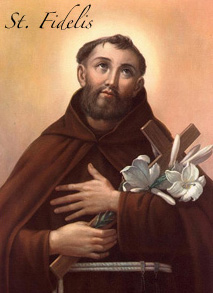 St. Fidelis, Martyr Short Sermon on a Lively Faith Are we bound to profess our Catholic Faith openly? Two Short Sermons: On Fighting Under the Standard of Jesus Christ On the Rules Prescribed by Jesus Christ to His Followers O God, Who didst vouchsafe to inflame the soul of blessed Fidelis with seraphic fervor, and to adorn him with the palm of martyrdom and with glorious miracles, in spreading the true faith: we beseech Thee, through his merits and intercession to strengthen us in faith and love by Thy grace, that we may be worthy to be found faithful in Thy service even unto death. Through our Lord etc. St. Fidelis was born at Sigmaringen in 1577, of noble parents. In his youth he frequently approached the sacraments, visited the sick and the poor, and spent moreover many hours before the altar. For a time he followed the legal profession, and was remarkable for his advocacy of the poor and his respectful language towards his opponents. Finding it difficult to become both a rich lawyer and a good Christian, Fidelis entered the Capuchin Order, and embraced a life of austerity and prayer. Hair shirts, iron-pointed girdles, and disciplines were penances too light for his fervor; and being filled with a desire of martyrdom, he rejoiced at being sent to Switzerland by the newly-founded Congregation of Propaganda, and braved every peril to rescue souls from the diabolical heresy of Calvin. When preaching at Sevis he was fired at by a Calvinist, but the fear of death could not deter him from proclaiming divine truth. After his sermon he was waylaid by a body of Protestants headed by a minister, who attacked him and tried to force him to embrace their so-called reform. But he said, "I came to refute your errors, not to embrace them; I will never renounce Catholic doctrine, which is the truth of all ages, and I fear not death." On this they fell upon him with their poignards, and the first martyr of Propaganda went to receive his palm. Reflection--We delight in decorating the altars of God with flowers, lights, and jewels, and it is right to do so; but if we wish to offer to God gifts of higher value, let us, in imitation of St. Fidelis, save the souls who but for us would be lost; for so we shall offer Him, as it were, the jewels of paradise. Prayer: How truly couldst thou, O Fidelis! say with the Apostle: I have finished my course (II. Tim. iv. 7)! Yea, thy death was even more beautiful than thy life, holy as that was. How admirable the calmness wherewith thou receivedst death! how grand the joy wherwith thou didst welcome the blows of thine enemies, thine, because they were those of the Church! Thy dying prayer, like Stephen's, was for them; for the Catholic, while he hates heresy, must love the heretics who put him to death. Pray, O holy Martyr, for the children of the Church. Obtain for them an appreciation of the value of Faith, and of the favour of God bestowed on them when he made them members of the true Church. May they be on their guard against the many false doctrines, which are now current through the world. May they not be shaken by the scandals which abound in this our age of effeminacy and pride. It is Faith that is to bring us to our Risen Jesus: and He urges us to it by the words he addressed to Thomas: Blessed are they that have not seen, and have believed (St. John, xx. 29)! Of this number we wish to be; and therefore is it, that we cling to the Church, the sovereign mistress of Faith. We wish to believe her, and not Human Reason, which has neither the power to fathom the Word of God, nor the right to sit in judgment over it. Jesus has willed, that this holy Faith should come down to us bearing on itself the strengthening testimony of the Martyrs; and each age has had its Martyrs. Glory to thee, O Fidelis, who didst win thy palm by combating the errors of the pretended Reformation! Take a Martyr's revenge, and pray without ceasing, to our Jesus, that he would bring all heretics back to the Faith and to union with the Church. They are our Brethren by Baptism; pray for them, that they may return to the Fold, and that we may one day celebrate with them the true Paschal Banquet, wherein the Lamb of God gives himself to be our food, not figuratively, as in the Old Law, but really and truly, as becometh the New Covenant. |
April 25th: St. Mark, the Evangelist
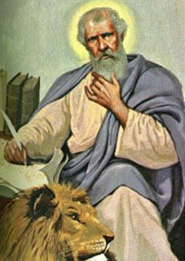
St. Mark, Evangelist Rogation Days Christian Instruction The Lives of the 12 Apostles and St. Paul: The Apostles Creed The Labor of the Apostles: Their Teaching of the Nations A Series of Sermons in Defense of the Catholic Teaching on Oral Tradition, the Word of God, and Errors of Private Interpretation What Cannot and What Can Be Reformed in the Church. What Every Christian Must Believe and Do to be Saved. The Greater Litanies of the Saints The Resurrection and Ascension of Jesus Christ, as Illustrated by Catholic Artist and Historian, James Tissot, 1899 O God, Who by Thy grace didst raise up blessed Mark the Evangelist to be a preacher of the gospel: grant, we beseech Thee, that we may both profit by his teaching and be defended by his prayers. Through our Lord etc. (Roman Breviary) St. Mark was converted to the Faith by the Prince of the Apostles, whom he afterwards accompanied to Rome, acting there as his secretary or interpreter. When St. Peter was writing his first epistle to the churches of Asia, he affectionately joins with his own salutation that of his faithful companion, whom he calls "my son Mark." The Roman people entreated St. Mark to put in writing for them the substance of St. Peter's frequent discourses on Our Lord's life. This the Evangelist did under the eye and with the express sanction of the apostle, and every page of his brief but graphic gospel so bore the impress of St. Peter's character, that the Fathers used to name it "Peter's Gospel." St. Mark was now sent to Egypt to found the Church of Alexandria. Here his disciples became the wonder of the world for their piety and asceticism, so that St. Jerome speaks of St. Mark as the father of the anchorites, who at a later time thronged the Egyptian deserts. Here, too, he set up the first Christian school, the fruitful mother of many illustrious doctors and bishops. After governing his see for many years, St. Mark was one day seized by the heathen, dragged by ropes over stones, and thrown into prison. On the morrow the torture was repeated, and having been consoled by a vision of angels and the voice of Jesus, St. Mark went to his reward. It is to St. Mark that we owe the many slight touches which often give such vivid coloring to the Gospel scenes, and help us to picture to ourselves the very gestures and looks of our blessed Lord. It is he alone who notes that in the temptation Jesus was "with the beasts;" that He slept in the boat "on a pillow;" that He "embraced" the little children. He alone preserves for us the commanding words "Peace, be still!" by which the storm was quelled; or even the very sounds of His voice, the "Ephpheta" and "Talitha cumi," by which the dumb were made to speak and the dead to rise. So, too, the "looking round about with anger," and the "sighing deeply," long treasured in the memory of the penitent apostle, who was himself converted by his Saviour's look, are here recorded by his faithful interpreter. Reflection.--Learn from St. Mark to keep the image of the Son of man ever before your mind, and to ponder every syllable which fell from His lips. |
April 26th: Sts. Cletus and Marcellinus, Popes and Martyrs
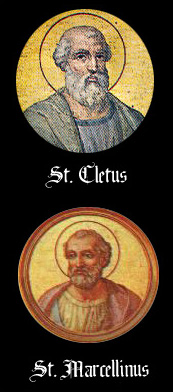 O eternal Shepherd, watch over the peace of Thy flock, and through blessed Cletus and Marcellinus, Thy Martyrs and Sovereign Pontiffs, whom Thou didst appoint shepherds over the whole Church, keep her under thy constant protection. Through our Lord etc. (Roman Breviary) St. Cletus was the third Bishop of Rome, and succeeded St. Linus, which circumstance alone shows his eminent virtue among the first disciples of St. Peter in the West. He sat twelve years, from 76 to 89. The canon of the Roman Mass, Bede, and other martyrologists, style him a martyr. He was buried near St. Linus, in the Vatican, and his relics still remain in that church. St. Marcellinus succeeded St. Coins in the bishopric of Rome in 296, about the time that Diocletian set himself up for a deity, and impiously claimed divine honors. In those stormy times of persecution Marcellinus acquired great glory. He sat in St. Peter's chair eight years, three months, and twenty-five days, dying in 304, a year after the cruel persecution broke out, in which he gained much honor. He has been styled a martyr, though his blood was not shed in the cause of religion. Reflection--It is a fundamental maxim of the Christian morality, and a truth which Christ has established in the clearest terms and in innumerable passages of the Gospel, that the cross or sufferings and mortification are the road to eternal bliss. They, therefore, who lead not here a crucified and mortified life are unworthy ever to possess the unspeakable joys of His kingdom. Our Lord Himself, our model and our he-ad, walked in this path, and His great Apostle puts us in mind that He entered into bliss only by His blood and by the cross. |
|
April 26th: Our Lady of Good Counsel 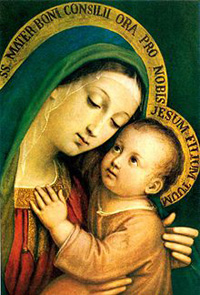
Our Lady of Good Counsel: Prayers, Litany and Book, "The Virgin Mother of Good Counsel" Litany of the Blessed Virgin Mary The Life of the Blessed Virgin Mary as Set Forth in Her Titles from the Litany of Loreto. Our Lady of Good Counsel--page 54. During the afternoon of April 25, 1467, the inhabitants of the little town of Genezzano, in Italy, heard celestial music--music that seemed to descend from the cloudless heavens. And then they saw a snow-white cloud, high above the town's highest houses, from which cloud shone forth rays of the most dazzling light. The cloud came nearer gradually, and finally rested on the wall of a ruined chapel--the bells of the chapel's tower ringing out although it was apparent that no human hand had set them in motion, and every church bell in the town sounded as if in answer. Little by little the cloud cleared away, and where it had been now stood an image of Our Blessed Lady, smiling on the Divine Child in Her arms. The villagers of Genezzano could not but think that the image had come from Heaven itself. It had come from Albania, across the Adriatic Sea, however. There, in the town of Scutari, this image of Our Lady--known then as the "Madonna of Scutari"--had miraculously appeared some two centuries before, and had been greatly venerated. For instance, the great Albanian, General Scanderbeg, openly declared that his victories over the Moslems were due to the Madonna of Scutari. When he died, the Moslems again threatened the country, and many Albanians sought safety in flight. Among them were two pious clients of Mary, Georgio and Sclavios by name, who went to visit their beloved Madonna just before their departure. As they knelt at Our Lady's shrine, they were astounded to see the image loosen itself from the wall, and, enveloped in a shining cloud, float out of the Church toward the sea. They followed. The image floated on over the sea, and the pious men stepped into the water and were borne up, without even trying to swim, till they reached the Italian shore. On land, they still followed the picture to the very gates of Rome, where the image disappeared. Nor did they see it again, until, having heard of its miraculous advent in Genezzano, they found it there, already rich in renown on account of the miracles wrought by its means, in the Augustinian Church where it still hangs today (its coloring not in the least tarnished or faded, by the way). In 1862, the miraculous image was crowned, and the title of "Our Lady of Good Counsel" also dates back to the seventeenth century. From the time of the image's coming until this very day hundreds upon hundreds of miraculous cures and conversions have taken place at the shrine of Our Lady of Good Counsel, in Genezzano. Many indulgences are attached to membership in the sodality of Our Lady of Good Counsel, generally known as "The Pious Union." |
April 27th: St. Peter Canisius, Confessor and Doctor of the Church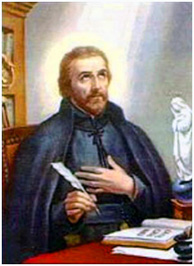 St. Peter Canisius St. Peter Canisius--Litany and Biographical Sketch by Pope Pius IX The Religious and Moral Training of Children On the Mode of Teaching Christian Doctrine to Children Library of Children's Religious Instructional Books Newly Added Four Short Sermons on the Sacrament of Baptism by Bishop Richard Challoner The Ceremonies of the Sacrament of Baptism The Sacrament of Baptism Prayers and Novena to Your Patron Saint at Baptism Abjuration of Heresy and Profession of Faith of the Council of Trent, Pius IV., 1565 O God, Who for the defense of the Catholic faith didst endow blessed Peter Thy Confessor with virtue and learning: mercifully grant that by his example and teaching, the hearts of those who have gone astray may return to the way of salvation and the souls of the faithful may remain steadfast in the confession of the truth. Through our Lord etc. (Roman Breviary) Born in 1521 of a distinguished family of Holland, Saint Peter Canisius studied in Cologne and received his license as doctor of civil law; he then went to Louvain (Belgium) to learn canon law. These studies followed close upon the days when Luther had burnt the papal bulls at Wittenberg, Germany. Soon Saint Peter, become a Jesuit, was teaching at the University of Cologne; he was there when the unfortunate archbishop of that city fell into the new heresy. The Catholics who desired to depose him needed a deputy to the emperor to present their request, and Saint Peter was chosen. His mission, seconded by the Holy Spirit, succeeded; and the deputy was remarked by a Cardinal, who desired to send him to the Council of Trent as his representative and theologian. Saint Peter's superior, Saint Ignatius of Loyola himself, approved this choice, and the young Jesuit took his place among the Fathers of the Council. He was commissioned to draft a memoir on the exact nature of the errors being propagated in the lands of the reform, in consort with the Pope's theologian, another Jesuit named Jacques Laynez. Their work was admired; the Council was dissolved soon afterwards, however, and Saint Peter was recalled to Rome by Saint Ignatius, to consult with him concerning the formation of the religious and the future of their Order. Afterwards Saint Peter and two other Jesuits founded a college at Ingolstadt, going there with only two books in their baggage, the Spiritual Exercises of Saint Ignatius and the famous Ratio Studiorum, or Plan of Studies of their Order. Saint Peter was named Rector of the University by that institution. He was in demand everywhere; King Ferdinand of Rome obtained his presence for Vienna. A pestilence broke out there, and he was most often found at the bedside of the dying, caring for the bodies and regenerating the souls of the unfortunate citizens. He opened a boarding school for boys, and Vienna soon found itself reborn in the faith: the famous Catechism of Saint Peter Canisius had much to do with the renovation. During his lifetime it appeared in more than 200 editions, in at least twelve languages. It remains a monument of the triumph of the Church over error in the time of Luther. Its author had tried to keep his name a secret but did not succeed, and then several nations disputed the honor of his presence. But Saint Peter was Provincial of Germany, named by Saint Ignatius, and he concerned himself above all with the colleges at Prague, Ingolstadt and Munich. Until his death in 1597 the Apostle of Germany continued the valiant and perpetual combat of the Church against error. For a long time forgotten, Saint Peter was canonized and declared a Doctor of the Church by Pope Pius XI in 1927. |
April 28th: St. Paul of the Cross, Confessor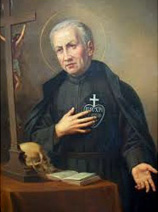 Novena to St. Paul of the Cross, Feast Day April 28th Catholic Book: The Life of Blessed Paul of the Cross St. Paul of the Cross Stations of the Cross The Short Method of the Stations of the Cross Litany of the Holy Cross Devotion to the Five Wounds of Jesus The Steps of Our Saviors Passion.html Passion of Christ 4 Short Sermons on Devotion to the Passion of Christ Clock of the Passion O Lord Jesus Christ, Who didst endow holy Paul with singular charity in preaching the mystery of the Cross, and wast pleased that through him a new family should flourish in the Church: grant, through his intercession, that we who continually recall the memory of Thy Passion while we are on earth, may be deemed worthy to receive the fruit of it in heaven. Who livest etc. (Roman Breviary) The eighty-one years of this Saint's life were modelled on the Passion of Jesus Christ. In his childhood, when praying in church, a heavy bench fell on his foot, but the boy took no notice of the bleeding wound, and spoke of it as "a rose sent from God." A few years later, the vision of a scourge with "love" written on its lashes assured him that his thirst for penance would be satisfied. In the hope of dying for the faith, he enlisted in a crusade against the Turks; but a voice from the Tabernacle warned him that he was to serve Christ alone, and that he should found a congregation in His honor. At the command of his bishop he began while a layman to preach the Passion, and a series of crosses tried the reality of his vocation. All his first companions, save his brother, deserted him; the Sovereign Pontiff refused him an audience; and it was only after a delay of seventeen years that the Papal approbation was obtained, and the first house of the Passionists was opened on Monte Argentario, the spot which Our Lady had pointed out. St. Paul chose as the badge of his Order a heart with three nails, in memory of the sufferings of Jesus, but for himself he invented a more secret and durable sign. Moved by the same holy impulse as Blessed Henry Suso, St. Jane Frances, and other Saints, he branded on his side the Holy Name, and its characters were found there after death. His heart beat with a supernatural palpitation, which was especially vehement on Fridays, and the heat at times was so intense as to scorch his shirt in the region of his heart. Through fifty years of incessant bodily pain, and amidst all his trials, Paul read the love of Jesus everywhere, and would cry out to the flowers and grass, "Oh! be quiet, be quiet," as if they were reproaching him with ingratitude. He died whilst the Passion was being read to him, and so passed with Jesus from the cross to glory. April 28th: St. Vitalis, Martyr Saint Vitalis was a first century Christian citizen of Milan and the father of the twin brothers and future martyrs, Saints Gervasius and Protasius. He is the principal patron of Ravenna, where he was martyred. Divine providence had conducted him to that city, where he saw come before the tribunal there a Christian physician named Ursicinus, who had been tortured and who then was condemned to lose his head for his faith. Suddenly the captive grew terrified at the thought of death, and seemed ready to yield. Vitalis was extremely moved by this spectacle. He knew his double obligation to prefer the glory of God and the eternal salvation of his neighbor to his own corporal life; he therefore boldly and successfully encouraged Ursicinus to triumph over death, saying, "Ursicinus, you who cured others would want to drive into your soul the dagger of eternal death? Do not lose the crown the Lord has prepared for you!" Ursicinus was touched; he knelt down and asked the executioner to strike him. After his martyrdom Saint Vitalis carried away his body and respectfully interred it. Saint Vitalis now resigned his post as judiciary assistant to Paulinus, who had been absent on the occasion of the sentence of Ursinius. Paulinus had his former assistant apprehended, and after having him tortured, commanded that if he refused to sacrifice to the gods, he be buried alive, which sentence was carried out. Afterwards, his wife Valeria, as she was on her way from Ravenna to Milan, was beaten by peasants because she refused to join them in an idolatrous festival and riot. She died two days later in Milan, and is also honored as a martyr and Saint. Gervasius and Protasius, their sons, sold their heritage and for ten years before their own martyrdom, lived a penitential life of prayer. Prayer by Father Prosper Gueranger Sin is the enemy of the soul; it throws her back again into that death, whence Jesus had drawn her by his Resurrection. To preserve one of thy brethren from this misery, thou, O Vitalis, bravely raisedst a cry of zealous warning to him in the midst of his torments, and thy words awakened him to self-possession and courage. Show this same fraternal charity to us. We are living with the Life of our Risen Jesus; but the enemy is bent on robbing us of this Life. He will seek to intimidate us; he will lay all manner of snares wherewith to deceive us; he will give us battle, and this untiringly. Pray then for us, O holy Martyr, that we may be on our guard, and that the mystery of the Pasch may be fully accomplished within us, now and for ever! |
April 29th: St. Peter of Verona, Marytr 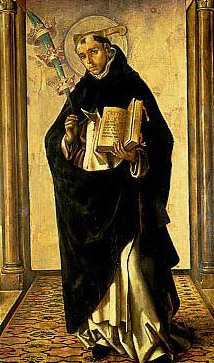
St. Peter the Martyr (Verona) Bearing Injustice Lead us not into Temptation: from the Council of Trent How Catholics lose the Faith by Fr. Michael Muller Litany of Faith and the Necessity of the Catholic Faith for Salvation Are we bound to profess our Catholic Faith openly? Saints: the Gift of Miracles Resisting the Enemies of Our Salvation The Sinner's Guide by Ven. Louis of Granada, O.P. Grant, we beseech thee, Almighty God: that we may follow the faith of blessed Peter Thy Martyr with befitting devotion; who for the spreading of the same faith was found worthy to win the palm of martyrdom. Through Our Lord etc. (Roman Breviary) In 1205 the glorious martyr Peter was born at Verona of heretical parents. He went to a Catholic school, and his Manichean uncle asked what he learnt. "The Creed," answered Peter; "I believe in God, Creator of heaven and earth." No persuasion could shake his faith, and at fifteen he received the habit from St. Dominic himself at Bologna. After ordination, he preached to the heretics of Lombardy, and converted multitudes. St. Peter was constantly obliged to dispute with heretics, and although he was able to confound them, still the devil took occasion thence to tempt him once against faith. Instantly he had recourse to prayer before an image of Our Lady, and heard a voice saying to him the words of Jesus Christ in the Gospel, "I have prayed for thee, Peter, that thy faith may not fail; and thou shalt confirm thy brethren in it." Once when exhorting a vast crowd under the burning sun, the heretics defied him to procure shade. He prayed, and a cloud overshadowed the audience. In spite of his sanctity, he was foully slandered and even punished for immorality. He submitted humbly, but complained in prayer to Jesus crucified. The crucifix spoke, "And I, Peter, what did I do?" Every day, as he elevated at Mass the precious blood, he prayed, "Grant, Lord, that I may die for Thee, Who for me didst die." His prayer was answered. The heretics, confounded by him, sought his life. Two of them attacked him as he was returning to Milan, and struck his head with an axe. St. Peter fell, commended himself to God, dipped his finger in his own blood, and wrote on the ground, "I believe in God, Creator of heaven and earth." They then stabbed him in the side, and he received his crown. Reflection--From a boy St. Peter boldly professed his faith among heretics. He spent his life in preaching the faith to heretics, and received the glorious and long-desired crown of martyrdom from heretics. We are surrounded by heretics. Are we courageous, firm, zealous, full of prayer for their conversion, unflinching in our profession of faith? April 30th: St. Catherine of Siena, Virgin 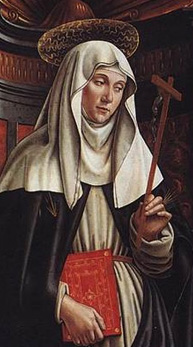
St. Catherine of Siena; Litany and Life of the Saint Novena to St. Catherine of Sienna, April 22th - April 30th Temptations and the Devils who Tempt On the Use of Temptations Catholic Book: Legends of the Blessed Sacrament. St. Catherine on Page 50 April Meditations on Humility The Sinner's Guide by Ven. Louis of Granada, O.P. St. Catherine of Siena, Virgin Grant, we beseech Thee, Almighty God: that we who celebrate the festival of blessed Catharine, Thy Virgin, may rejoice at her yearly festival and profit by the example of so great a virtue. Through our Lord etc. (Roman Breviary) Catherine, the daughter of a humble tradesman, was raised up to be the guide and guardian of the Church in one of the darkest periods of its history, the fourteenth century. As a child, prayer was her delight. She would say the "Hail Mary" on each step as she mounted the stairs, and was granted in reward a vision of Christ in glory. When but seven years old, she made a vow of virginity, and afterwards endured bitter persecution for refusing to marry. Our Lord gave her His Heart in exchange for her own, communicated her with His own hands, and stamped on her body the print of His wounds. At the age of fifteen she entered the Third Order of St. Dominic, but continued to reside in her father's shop, where she united a life of active charity with the prayer of a contemplative Saint. From this obscure home the seraphic virgin was summoned to defend the Church's cause. Armed with Papal authority, and accompanied by three confessors, she travelled through Italy, reducing rebellious cities to the obedience of the Holy See, and winning hardened souls to God. In the face well-nigh of the whole world she sought out Gregory XI. at Avignon, brought him back to Rome, and by her letters to the kings and queens of Europe made good the Papal cause. She was the counsellor of Urban VI., and sternly rebuked the disloyal cardinals who had part in electing an antipope. Long had the holy virgin foretold the terrible schism which began ere she died. Day and night she wept and prayed for unity and peace. But the devil excited the Roman people against the Pope, so that some sought the life cf Christ's Vicar. With intense earnestness did St. Catherine beg Our Lord to prevent this enormous crime. In spirit she saw the whole city full of demons tempting the people to resist and even slay the Pope. The seditious temper was subdued by Catherine's prayers; but the devils vented their malice by scourging the Saint herself, who gladly endured all for God and His Church. She died at Rome, in 1380, at the age of thirty-three. |
Saints and Feast Days for the Month of May
All of the following are non-moveable feasts that always occurs on the same date each year
All of the following are non-moveable feasts that always occurs on the same date each year
|
May 1st: Sts. Philip and James, Apostles
St. Philip 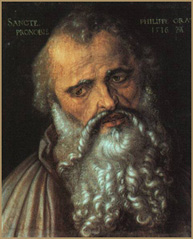 St. James the Lesser 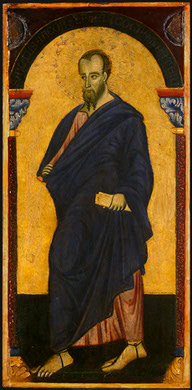 Sts. Philip and James Instructions on the Feast Day of Sts. Philip and James, Apostles The Lives of the 12 Apostles and St. Paul: The Apostles Creed The Labor of the Apostles: Their Teaching of the Nations Queen of Apostles Sts. Philip and James, Apostles O God, Who dost gladden us by the yearly festival of Philip and James Thy Apostles: grant, we beseech Thee, that as we rejoice in their merits, so we may be taught by their example. Through our Lord etc. (Roman Breviary) Philip was one of the first chosen disciples of Christ. On the way from Judea to Galilee Our Lord found Philip, and said, "Follow Me" Philip straightway obeyed; and then in his zeal and charity sought to win Nathaniel also, saying, "We have found Him of Whom Moses and the prophets did write, Jesus of Nazareth;" and when Nathaniel in wonder asked, "Can any good come out of Nazareth?" Philip simply answered, "Come and see," and brought him to Jesus. Another characteristic saying of this apostle is preserved for us by St. John. Christ in His last discourse had spoken of His Father; and Philip exclaimed, in the fervor of his thirst for God, "Lord, show us the Father, and it is enough" St. James the Less, the author of an inspired epistle, was also one of the Twelve. St. Paul tells us that he was favored by a special apparition of Christ after the Resurrection. On the dispersion of the apostles among the nations, St. James was left as Bishop of Jerusalem; and even the Jews held in such high veneration his purity, mortification, and prayer, that they named him the Just. The earliest of Church historians has handed down many traditions of St. James's sanctity. He was always a virgin, says Hegesippus, and consecrated to God. He drank no wine, wore no sandals on his feet, and but a single garment on his body. He prostrated himself so much in prayer that the skin of his knees was hardened like a camel's hoof. The Jews, it is said, used out of respect to touch the hem of his garment. He was indeed a living proof of his own words, "The wisdom that is from above first indeed is chaste, then peaceable, modest, full of mercy and good fruits." He sat beside St. Peter and St. Paul at the Council of Jerusalem; and when St. Paul at a later time escaped the fury of the Jews by appealing to Caesar, the people took vengeance on James, and crying, "The just one hath erred," stoned him to death. Reflection--The Church commemorates on the same day Sts. Philip and James, whose bodies lie side by side at Rome. They represent to us two aspects of Christian holiness. The first preaches faith, the second works; the one holy aspirations, the other purity of heart. |
May 2nd: St. Athanasius, Bishop, Confessor and Doctor of the Church
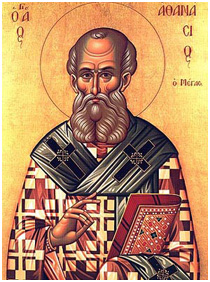 The Creed of St. Athanasius, Prayers and Letter to the Faithful Novena to St. Athanasius, April 24th - May 2nd The Life of St. Antony by St. Athanasius The Trinity Related Link on Arian Heresy: St. Hermenegild St. Eusebius, Confessor St. Hilary Bishop, Confessor, and Doctor of the Church What Cannot and What Can Be Reformed in the Church. What Every Christian Must Believe and Do to be Saved. Litany of Faith and the Necessity of the Catholic Faith for Salvation Are we bound to profess our Catholic Faith Openly? Sermon: the Gift of Faith Explained Showing Forth Our Faith Abjuration of Heresy and Profession of Faith of the Council of Trent, Pius IV., 1565 St. Athanasius, Bishop, Confessor and Doctor of the Church Graciously hear, O Lord, we beseech Thee, the prayers which we present to Thee on the festival of blessed Athanasius, Thy Confessor and Bishop: and through the merits and intercession of him who was found worthy to become Thy servant, loose us from all sin. Through our Lord etc. (Roman Breviary) Saint Athanasius was born in Alexandria, Egypt, towards the end of the third century, and from his youth was pious, learned, and deeply versed in the sacred writings. He left the paternal home to be raised by the bishop of Alexandria like a new Samuel in the Lord's temple, as befitted one whom God had chosen to be the champion and defender of His Church against the Arian heresy, which denied the Divinity of Christ. While still a deacon, he was chosen by Saint Alexander, his bishop, to go with him to the Council of Nicea, A.D. 325. There he attracted the attention of all the prelates by the learning and ability with which he defended the Faith. Five months later, as Saint Alexander was dying, he recommended Athanasius for his successor as Patriarch of Alexandria, and in that office for forty-six years the new Patriarch bore the whole brunt of the Arian assault, often virtually alone and undefended. When the invincible Athanasius refused to restore Arius to Catholic communion, he was exiled to Treves in France, and the Emperor ordered the Catholic Patriarch of Constantinople to receive the heresiarch. The end of that man of error is very instructive. He took an oath that he had always believed as the Church believes, though he taught that there was a time when the Word of God WAS NOT. Thereupon the Catholic Patriarch of Constantinople, with Saint James of Nisibe, who was in Constantinople at that time, Saint Athanasius in France and the Catholics everywhere, had recourse to fasting and prayer, that God would avert from the Church the frightful sacrilege. The day came for the solemn entrance of Arius into the great church of Saint Sophia. The heresiarch and his party set out, elated, in triumph. But before he reached the church, death smote him in an exemplary, swift and terrible way, and the dreaded sacrilege was averted. Saint Athanasius stood unmoved against four Roman emperors, was banished five times, was the butt of every insult, calumny and wrong the Arians could devise, and lived in constant peril of death. Though strong as diamond in defense of the Faith, he was meek and humble, pleasant and winning in conversation, beloved by his flock, unwearied in labors, prayer and mortifications, eloquent in speech, and unsurpassed in zeal for souls. From his places of exile he wrote many great works for the instruction and strengthening of his flock, writings rich in thought and learning, clear, keen and stately in expression. He is honored as one of the greatest of the Doctors of the Church. His admirers told the story of his response to a search party pursuing him downstream, as he retreated by boat. Knowing of their approach, he ordered the captain to change direction and return. When he crossed the search party on the river, they hailed him and asked whether he had seen the bishop of Alexandria pass by. He replied, "Continue; he is not far from here." Restored to his see by the emperor Valens for fear of a popular uprising, the stormy life of the Saint closed in peace on May 2nd of the year 373. |
May 3rd: The Finding of the Holy Cross
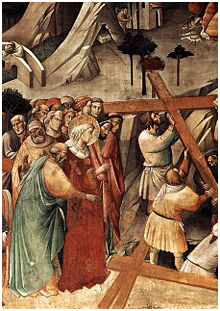
Finding of the Holy Cross Included Related Links: Instructions on the Festival of the Finding of the Holy Cross Litany of the Holy Cross St. Helena The Short Method of the Stations of the Cross Stations of the Cross St. Leonard of Port Maurice and the Stations of the Cross The Holy Ways of the Cross by Henri Boudon, 1875 On our Saviour's death upon the cross On the Sufferings of Saviour upon the cross On our Saviour's preaching from the Cross Saturday After Passion Sunday: Our Lord is Condemned to the Cross; Jesus Carries His Cross What must we do in order to be admitted with the Saints into Heaven? The Finding of the Holy Cross O God Who by the glorious Finding of the Cross of salvation didst renew the wonders of Thy Passion: grant, we beseech Thee, that through the ransom brought us by this tree of life we may obtain the privilege of eternal life. Who livest etc. (Roman Breviary) When God restored peace to His Church by exalting Constantine the Great to the imperial throne, that pious prince, who had triumphed over his enemies by the miraculous power of the Cross of Christ, was very desirous of expressing his veneration for the holy places which had been honored and sanctified by the presence and sufferings of our blessed Redeemer on earth. He accordingly resolved to build a magnificent church in the city of Jerusalem. Saint Helen, the Emperor's mother, desiring to visit the holy places there, made a journey into Palestine in 326, though she was at that time near eighty years of age. On her arrival at Jerusalem she was inspired with a great desire to find the identical cross on which Christ had suffered for our sins, in order to build the proposed church on the site of Calvary. But there was no mark or tradition, even among the Christians, to show where it might lie. Saint Helen consulted everyone in Jerusalem and the surrounding areas, whom she thought likely to assist her in discovering the cross. She was credibly informed that, if she could find the holy sepulchre, she would also find the instruments of the punishment, since it was the custom among the Jews to dig a pit near the place where the body of a criminal was buried, and to throw into it whatever had contributed to his execution. The Roman pagans who were dominated by an aversion to Christianity had done what they could to conceal the place where our Saviour was buried by heaping on it a great quantity of stone and rubbish, and building there a temple to Venus. They had also erected a statue of Jupiter in the place where Our Lord rose from the dead. The pious Empress therefore ordered the profane buildings to be pulled down, the statue broken in pieces, and the rubbish removed. And then, upon digging to a great depth, the holy sepulchre was uncovered. Near it were found three crosses and the nails which had pierced Our Saviour's body, with the title which had been fixed to His cross. By this discovery they knew that one of those three crosses was the one they sought, and that the others belonged to the two criminals between whom Our Saviour had been crucified. But because the title was found separate from the cross, it was difficult to distinguish which of the three crosses was the one on which our Redeemer consummated His sacrifice for the salvation of the world. In this perplexity the holy Bishop of Jerusalem Macarius, knowing that one of the principal ladies of the city lay ill and at the point of death, suggested to the Empress to have the three crosses carried to the sick person, not doubting that God would reveal which one was the cross they sought. Saint Macarius prayed that God would have regard to their faith, and then he applied the crosses, one after another, to the patient. She was immediately and perfectly cured by the touch of the True Cross, after the others had been tried without effect. Saint Helen, full of joy at having found the treasure which she had so earnestly sought and so highly esteemed, built a church on the site and placed the cross there with great veneration, after providing for it an extraordinarily rich silver reliquary. She afterwards carried part of it to her son Constantine at Constantinople, who received it with great veneration; and another part she took to Rome, to be placed in the church which she built there, called Church of the Holy Cross of Jerusalem, where it remains to this day. The title was sent by Saint Helen to that church in Rome, and placed on the top of an arch, where it was found in a case of lead in 1492. The inscription in Hebrew, Greek, and Latin is in red letters, and the wood was whitened. So it was in 1492; but these colors have since faded, and the words Jesus and Judaeorum are eaten away. The board is nine inches long, but is considered to have measured about twelve originally. The reliquary of Jerusalem was committed to the care of Saint Macarius and kept with singular care and respect in the magnificent church which Saint Helen and her son built there. Saint Paulinus relates that, though chips were almost daily cut off from it and given to devout persons, yet the sacred wood suffered thereby no diminution. It is affirmed by Saint Cyril of Jerusalem, twenty-five years after the discovery, that pieces of the cross were spread all over the earth; he compares this wonder to the miraculous feeding of five thousand men, as recorded in the Gospel. The discovery of the cross would have happened in the spring, after navigation began on the Mediterranean Sea, for Saint Helen went the same year to Constantinople and from there to Rome, where she died in the arms of her son on the 18th of August of the same year, 326. |
May 4th: St. Monica, Widow
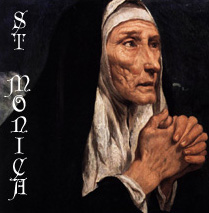
St. Monica, Widow Related Links: A Mother's Prayer for the Conversion of Her Child Book: The Mother of St. Augustine Triduum (3 Day Novena) of St. Monica Duties of Parents Sermon: Duties of Parents--They Must Guard their Flock What is a mixed Marriage St. Augustine I. St. Augustine II. Impurity a Terrible Evil Two Short Sermons: On Turning from Sin to God The Sentiments of a Penitent Sinner The Conversion of Sinners Paschal Time The Mystery of Paschal Time Eastertide Prayers - Regina Caeli St. Monica, Widow O God, the comforter of them that mourn, and the slavation of such as hope in Thee, Who didst show mercy to the pious tears of the blessed Monica in the conversion of her son Augustine: grant us, through their united intercession, grace to deplore our sins, and to find pardon and favor with Thee. Through our Lord etc. (Roman Breviary) Saint Monica, the mother of Saint Augustine, was born in 332 of a Christian family of the ancient city of Tagasta in northern Africa. After a girlhood of singular innocence and piety, she was given in marriage to Patricius, a pagan. She at once devoted herself to his conversion, praying for him always and winning his reverence and love by the holiness of her life and her affectionate forbearance. She was rewarded by seeing him baptized a year before his death. When her son Augustine went astray in faith and habits, her prayers and tears were incessant. She once begged a learned bishop that he would talk to her son, in order to bring him to a better disposition, but he declined, despairing of success with a young man at once so gifted and so headstrong. At the sight of her prayers and tears, he nonetheless bade her be of good courage, for it could not happen that the child of those tears should perish. Augustine, by going to Italy, was able for a time to free himself from his mother's importunities, but he could not escape from her prayers, which encompassed him like the providence of God. She followed him to Italy; and there, by his marvelous conversion, her sorrow was turned into joy. At Ostia, shortly before they were to re-embark for Africa, Augustine and his mother sat at a window conversing on the life of the blessed. She turned to him and said, "My son, there is nothing now I care for in this life. What I shall now do, or why I remain on this earth, I know not. The one reason I had for wishing to linger in this life a little longer was that I might see you a Catholic Christian before I died. This grace God has granted me superabundantly, seeing you reject earthly happiness to become His servant." A few days afterwards she had an attack of fever and died at the age of fifty-six, in the year 388. |
May 5th: St. Pius V, Pope and Confessor
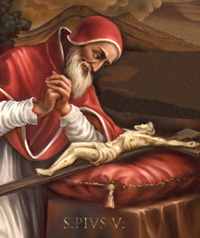 The The Life of St. Pius V. St. Pius V., Pope and Confessor The Sword of Saint Michael, St. Pius V. The Victory of Lepanto Papal Bull: Quo Primum, the Tridentine Mass for all Times Why the Mass is in Latin Catholic Worship, Explained Ave Maria Mary Help of Christians Glossary of Terms and Cannon Laws from 1917 Code Pastors as True Shepherds and the Evils of Negligent Pastors Part I. Grievousness and Chastisement of Sin in a Priest Part II. The Incontinent Priest and Sacrilegious Mass St. Pius V, Pope and Confessor O God, Who, in order to crush the enemies of Thy Church and to restore divine worship, didst deign to elect blessed Pius to the supreme Pontificate: grant us to be defended by his patronage, and so to cleave unto Thy service, that overcoming all the snares of the enemy, we may rejoice with perpetual peace. Through our Lord etc. (Roman Breviary) Michael Ghislieri, a Dominican friar from his fifteenth year, a teacher of religion at twenty, as a simple religious, as inquisitor, bishop, and cardinal, was famous both for the spotless purity of his own life and for his intrepid defense of the Church's faith and discipline. Surrounded in his time by great men and great Saints, in apostolic virtue he was surpassed by none. As Pope, his first concern was to reform the Roman court and the capital city by the strict example of his own household and the punishment of offenders. He next endeavored to obtain from the Catholic powers recognition of the decrees of the Council of Trent, two of which he strictly enforced: the obligatory residence of bishops in their sees, and the establishment of diocesan seminaries. He revised the Missal and Breviary, and reformed ecclesiastical music. He was not less active in protecting the Church outside Italy. We see him at the same time supporting the Catholic King of France against the Huguenot rebels, and encouraging Mary, Queen of Scots in the bitterness of her captivity. It is he who excommunicated her rival, the usurper Elizabeth, when the best blood of England flowed upon the scaffold and the measure of her crimes was full. The intrepidity of this Vicar of Christ found enemies. The holy Pope was accustomed to kiss the feet of the crucifix on leaving or entering his room. One day the feet moved away from his lips. Sorrow filled his heart, and he made acts of contrition, fearing that he must have committed some secret offense, yet he still could not kiss the feet. It was afterwards discovered that they had been poisoned by an enemy. It was in the Lepanto victory that the Saint's power was most plainly manifest. There, in October of 1571, by the holy league which he had formed but still more by the prayers of the aging Pontiff to the great Mother of God, the defeat of the advancing Ottoman forces was obtained and Christendom was saved from the Turk. Six months later Saint Pius V died, having reigned only six years. |
May 6th: St. John, Apostle and Evangelist (Before the Latin Gate). First Friday.
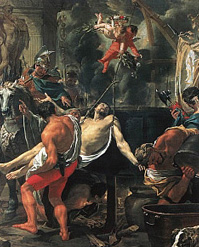
St. John before the Latin Gate St. John, Apostle and Evangelist The Apocalypse of St. John St. John the Apostle, Instructions The Lives of the 12 Apostles and St. Paul: The Apostles Creed The Labor of the Apostles: Their Teaching of the Nations Queen of Apostles St. John, Apostle and Evangelist (Before the Latin Gate) O God, Who seest that evils harrass us on every side: grant, we beseech Thee, that the glorious intercession of blessed John Thy Apostle and Evangelist may always protect us. Through our Lord etc. (Roman Breviary) I n the year 95, Saint John the Evangelist, the only surviving Apostle, who was governing all the churches of Asia Minor (present-day Turkey), was apprehended at Ephesus and sent in chains to Rome. The Emperor Domitian did not relent at the sight of the venerable old man, but condemned him to be cast into a cauldron of boiling oil. The martyr doubtless heard, with great joy, this barbarous sentence; the most cruel torments seemed to him light and agreeable because he hoped they would unite him forever to his divine Master and Saviour. But God accepted his will and crowned his desire; He conferred on him the honor and merit of martyrdom while suspending the operation of the fire, just as He had formerly preserved the three children from injury in the Babylonian furnace. The seething oil was changed for him into an invigorating bath, and the Saint came out more refreshed than when he had entered the cauldron. T he glorious triumph of Saint John happened just beyond the gate of Rome called the Latina. A church which ever since has borne this title was consecrated there, in memory of the miracle. Domitian saw this miracle without deriving the least advantage from it, remaining hardened in his iniquity. Nonetheless, he contented himself afterwards with banishing the holy Apostle to the little island of Patmos. Saint John returned to Ephesus during the mild reign of Nerva (96-98), who during his short imperial government lasting one year and four months, merely labored to restore the faded luster of the Roman Empire. |
May 7th: St. Stanislaus, Bishop and Martyr and First Saturday
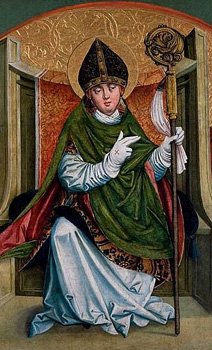 St. Stanislaus, Bishop and Martyr St. Stanislaus, Bishop and Martyr O God, for whose honor the glorious Bishop Stanislaus was slain by the swords of the wicked: grant, we beseech thee, that all who implore his protection may obtain the wholesome fulfilment of their prayers. Through our Lord etc. (Roman Breviary) Saint Stanislaus was born in answer to prayer, when his parents were advanced in age. Out of gratitude they educated him for the Church. When his parents died, he sold their vast properties and gave the price to the poor. He was ordained, and being a holy priest, soon afterwards became a Canon of the Cracow cathedral. It was necessary to have recourse to the Pope to have him accept the see of Cracow when it became vacant. But the bishop of Cracow's virtues increased with his dignity and obligations; Saint Stanislaus donned a hair shirt, which he wore until he died. He had a list drawn up of every poor person of the city, and gave orders to his servants never to refuse anything to anyone. Boleslaus II was at that time King of Poland; he was a prince of good disposition, but spoilt by a long series of victories and successes. After many acts of lust and cruelty, he outraged the whole kingdom by carrying off the wife of one of his nobles. Against this public scandal the chaste and gentle bishop alone raised his voice. Having commended the matter to God, he went to the palace and openly rebuked the king for his crime against God and his subjects, and threatened to excommunicate him if he persisted in his sin. Boleslaus, with the intention of irrevocably ruining the bishop's good reputation, suborned the nephews of a man named Paul who had recently died, to swear that their uncle had never been paid for land which the bishop had bought for the Church. Saint Stanislaus stood fearlessly before the king's tribunal, though all his frightened witnesses forsook him, and guaranteed to bring the dead man to witness in his favor within three days. On the third day, after many prayers and tears, he raised the dead man to life and led him in his grave-clothes before the king, where Paul testified that the bishop had reimbursed him fully for the terrain he had sold. He was then taken back to the grave, where he lay down and again relapsed into his former state, before a large number of witnesses. Boleslaus for a while made a show of a better life. Soon, however, he returned to the most scandalous excesses, and the bishop, finding all remonstrance useless, pronounced the sentence of excommunication. In defiance of the censure, on May 8, 1079, the king went to a chapel where Saint Stanislaus was saying Mass and commanded three groups of soldiers in succession to slay him at the altar. Each in turn came out, saying he had been alarmed by a light from heaven. At this the king himself rushed in and slew with his own hand the Saint at the altar during the Holy Sacrifice. The Pope placed the kingdom of Poland under interdict, excommunicated the king and declared his royalty null and void. Boleslaus repented, took refuge in another country for a time, then set out dressed as a pilgrim for Rome. On the way he knocked on a monastery door to ask for an alms, then decided to enter there anonymously, and was received. He spent seven years there as a Benedictine lay brother, rendering every humble service to the monks, patiently bearing rude treatment. Only on his deathbed did he identify himself, taking out his royal ring which he had concealed until then. He had spent hours praying before a statue of Our Lady in the chapel, by which we may conclude that the Mother of God had obtained for him the grace of conversion and a happy death. His body remains in the church of the same monastery of Ossiach. |
May 8th: Double Major Feast of the Apparition of Saint Michael the Archangel
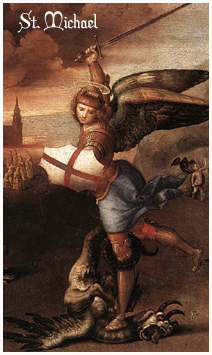 Apparition of St. Michael Dedication of St. Michael Chaplet and Devotions to St. Michael the Archangel Novena to St. Michael the Archangel, April 30th - May 8th Related Links St. Michael/ Exorcism Part 13: A Short Explanation on the Rite of Exorcisms Resisting the Enemies of Our Salvation The Spiritual Combat by Fr. Scupoli, 1865 Resisting the Devil The Constant Struggle On Serving Two Masters The Three Archangels and the Guardian Angels in Art, 1899 The Angels in the Liturgy Good and Bad Angels Litany of the Holy Angels Part 5: The Devils Plan to Ruin Souls and the Protection of the Holy Angels Our Lady Queen of Angels O God, who ordained in wondrous order, the offices of Angels and men, grant in Thy mercy, that those who stand forever before Thee in heaven to do Thy will, may also guard our lives upon earth. Through our Lord etc. (Roman Breviary) The Apparition of St. Michael the Archangel The Easter feasts are those of angelical spirits, for the Resurrection "gives joy also to the angels," says St. Gregory, "because in opening heaven to us again, it makes up for the losses which their ranks had sustained." The feast of the Apparition of St. Michael, the chief of the celestial host, shows forth, in this Paschaltide, all the grandeuer of the Saviour's triumph. Saint Michael hiself comes to us to defend us in battle (Alleluia). He came down from heaven (ibid) and appeared in Italy towards 525 under the Pontificate of Gelasius I, in Apulia, on the summit of Monte Gargano, near the Adriatic and the ancient Sipontum. He requested that a sanctuary should be erected to him where God should be worshipped, in memory of himself and all the angels, and the this place became celebrated on account of numerous miracles. It is evident from Holy Scripture that God is pleased to make frequent use of the ministry of the heavenly spirits in the dispensations of His providence in this world. The Angels are all pure spirits; by a property of their nature they are immortal, as is every spirit. They have the power of moving or conveying themselves at will from place to place, and such is their activity that it is not easy for us to conceive of it. Among the holy Archangels, Saints Michael, Gabriel and Raphael are particularly distinguished in the Scriptures. Saint Michael, whose name means Who is like unto God?, is the prince of the faithful Angels who opposed Lucifer and his followers in their revolt against God. Since the devil is the sworn enemy of God's holy Church, Saint Michael is given to it by God as its special protector against the demon's assaults and stratagems. Various apparitions of this powerful Angel have proved the protection of Saint Michael over the Church. We may mention his apparition in Rome, where Saint Gregory the Great saw him in the air sheathing his sword, to signal the cessation of a pestilence and the appeasement of God's wrath. Another apparition to Saint Ausbert, bishop of Avranches in France, led to the construction of Mont-Saint-Michel in the sea, a famous pilgrimage site. May 8th, however, is destined to recall another no less marvelous apparition, occurring near Monte Gargano in the Kingdom of Naples. In the year 492 a man named Gargan was pasturing his large herds in the countryside. One day a bull fled to the mountain, where at first it could not be found. When its refuge in a cave was discovered, an arrow was shot into the cave, but the arrow returned to wound the one who had sent it. Faced with so mysterious an occurrence, the persons concerned decided to consult the bishop of the region. He ordered three days of fasting and prayers. After three days, the Archangel Saint Michael appeared to the bishop and declared that the cavern where the bull had taken refuge was under his protection, and that God wanted it to be consecrated under his name and in honor of all the Holy Angels. Accompanied by his clergy and people, the pontiff went to that cavern, which he found already disposed in the form of a church. The divine mysteries were celebrated there, and there arose in this same place a magnificent temple where the divine Power has wrought great miracles. To thank God's adorable goodness for the protection of the holy Archangel, the effect of His merciful Providence, this feast day was instituted by the Church in his honor. It is said of this special guardian and protector of the Church that, during the final persecution of Antichrist, he will powerfully defend it: "At that time shall Michael rise up, the great prince who protects the children of thy people." (Dan. 12:1) Compare this text with Chapter 10 of the Apocalypse of Saint John. |
May 9th: St. Gregory Nazianzen, Bishop, Confessor, and Doctor of the Church.
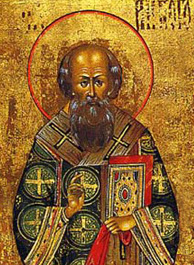 St. Gregory Nazianzen Prayers and Devotions to the Holy Trinity Part 3 of 3 on the Vice of Lust: The Anger of God Against the Vice of Impurity Temptations and the Devils who Tempt St. Gregory Nazianzen, Bishop, Confessor, and Doctor of the Church. O God, Who didst give blessed Gregory to be a minister of eternal salvation to Thy people: grant, we beseech Thee, that we who have had him on earth as Teacher of life, may be worthy to have him for Advocate in heaven. Through our Lord etc. (Roman Breviary) Saint Gregory was born in 312 near Caesarea of Cappadocia, of parents who are both honored as Saints, and the infant was immediately consecrated to God. After learning all that he could in his native land, he journeyed to Caesarea in Palestine to study at the famous school founded by Origen, then went to Alexandria in Egypt to rejoin his brother there. After some time he embarked for Athens, the metropolis of the sciences and the humanities. During the voyage, a storm of twenty days' duration nearly caused the loss of the ship and all passengers; their safe arrival in Athens was attributed to Saint Gregory's prayers, and all aboard adopted Christianity. In Athens he met and became the close friend of Saint Basil, and these noble souls turned away together from the most attractive worldly prospects. For some years they lived in seclusion, self-discipline, and studious labor, knowing only two roads, Gregory wrote, "one to church, the other to school." Only after thirty years of studies and good works in Athens did they leave that city and separate. They would meet again in the year 358, to live in solitude for a time in the Province of Pont. Saint Gregory was raised to the priesthood almost by force, preaching his first sermon, after a ten-weeks' retreat, on the dangers and responsibilities of the priesthood. In 372, when he was sixty years old, he was consecrated a bishop by his dear friend Saint Basil, who had become Archbishop of Caesarea in Cappadocia. All their lives they would correspond; many of Saint Gregory's noble and eloquent letters to Saint Basil can still be read among the 212 pieces of his correspondence which are still conserved. Saint Gregory's rare gifts and conciliatory disposition had become well known. In the year 379, when he was sixty-seven years old, he was chosen to be Patriarch of Constantinople. That city was distracted and laid waste in those times by Arian and other heretics. After a reception which was at best lukewarm, the new Patriarch labored there successfully, from his base in a small church named the Anastasia (Resurrection), where he gave instructions and saw the number of his listeners increase daily. The Arians were so irritated at the decay of their heresy that they pursued the Saint with outrage, calumny and violence, and at length resolved to take his life. For this purpose they chose an intrepid youth who was willing to undertake the sacrilegious commission. But God did not allow him to carry it out; he was touched with remorse and cast himself at the Saint's feet, avowing his sinful intent. Saint Gregory forgave him at once, treated him with all kindness and received him among his friends, to the wonder and edification of the whole city and to the confusion of the heretics, whose crime had served only as a mirror to the virtue of the Saint. Saint Jerome states that he himself learned at the feet of this master, who was his catechist in Holy Scripture. But Saint Gregory's humility, his austerities, the humble appearance of his aging and worn person, and above all his very success in Constantinople, did not cease to draw down upon him the hatred of every enemy of the Faith. He was persecuted by the magistrates, stoned by the rabble, and thwarted and deserted even by his brother bishops. During the second General Council, hoping to restore peace to his tormented city, the eloquent bishop, whom the Church calls Saint Gregory the Theologian, resigned his see and retired to his native town, where he died in the year 390. |
May 10th: St. Antoninus, Bishop and Confessor and Sts. Gordian & Epimachus, Martyrs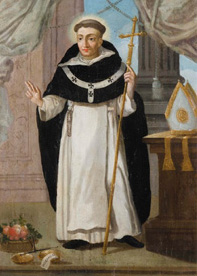 St. Antoninus, Bishop and Confessor Prayers for the Preservation of Chastity. An Explanation and Defense of the Virtue of Chastity The Necessity of Avoiding Occasions of Sin by St. Alphonsus Liguori St. Antoninus, Bishop and Confessor and Sts. Gordian & Epimachus, Martyrs Grant us, O Lord, to be assisted by the merits of holy Antoninus thy Confessor and Bishop: that, as we acknowledge Thy wonderful power in him, so we may glory in Thy mercy towards oursevles. Through our Lord etc. V. The Lord loved him, and adorned him, alleluia. R. He clothed him with a robe of glory, alleluia. Ant. O Priest, and Bishop, and worker of virtues, good shepherd of the people, pray unto the Lord for us, alleluia. (Roman Breviary) Saint Antoninus, or Little Antony, as he was called from his small stature, was born at Florence in 1389. After a childhood of singular holiness, he begged to be admitted very young into the Dominican house at Fiesole; but the Superior, to test his sincerity and perseverance, told him he must first learn by heart the book of the Decretals, or Canon Law, containing several hundred pages. This apparently impossible task was accomplished within twelve months; and Antoninus received the coveted habit in his sixteenth year. While still young, he filled several important posts of his Order and was consulted on questions of difficulty by the most learned men of his day, being known because of his wonderful prudence, as "the Counselor." He wrote several works on theology and history and served as Papal Theologian at the Council of Florence. In 1446 he was compelled to accept the archbishopric of that city. In this dignity he earned for himself the title of "the Father of the Poor," for all he had was at their disposal. Saint Antoninus never refused an alms which was asked in the name of God. When he had no money, he gave his clothes, shoes, or furniture. One day, being sent by the Florentines to the Pope, as he approached Rome a beggar came up to him almost naked, and asked him for an alms for Christ's sake. Outdoing Saint Martin, Antoninus gave him his whole cloak. When he entered the city, another one was given him; by whom, he knew not. His household consisted of only six persons; his palace contained no plate or costly furniture, and was often nearly destitute of the necessities of life. His one mule was frequently sold for the relief of the poor, but was ordinarily bought back for him again by some wealthy citizen. |
May 12th: Sts. Nereus, Achilleus, Domitilla the Virgin, and Pancratius, Martyrs.
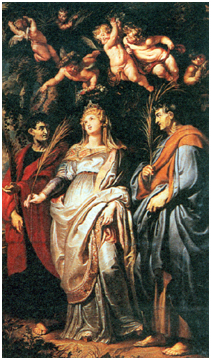 Sts. Nereus, Achilleus, Domitilla the Virgin, and Pancratius Prayers for the Preservation of Chastity. An Explanation and Defense of the Virtue of Chastity Have Confidence in God May the happy festival, O Lord, of Thy Martyrs, Nereus, Achilleus, Domitilla, and Pancratius always defend us from evil: and render us worthy to serve Thee. Through our Lord etc. (Roman Breviary) |
May 13th: St. Robert Bellarmine, Bishop, Confessor, and Doctor of the Church
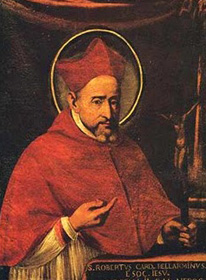
St. Robert Bellarmine The Art of Dying Well by St. Robert Bellarmine O God, who didst endow blessed Robert Thy Bishop and Doctor with wondrous learning and strength to foil the wiles of error and to vindicate the rights of the Apostolic See: grant, through his merits and intercession, that we may grow in the love of truth, and that the hearts of those who have gone astray may return to the unity of Thy Church. Through our Lord etc. (Roman Breviary) May 13th, the Anniversary of the First Apparition of Our Lady of Fatima 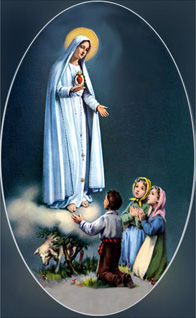
Our Lady of Fatima: Apparitions, Prayers, Devotions Novena to Our Lady of Fatima: May 5th - May 13th Fatima: Peace on Earth; A Catholic Russia; Peace of Mind Mary's Fatima Message. Peace and Devotions by Fr. Lovasik, 1955 Rosary Meditations for Fatima Saturday Novena of Reparation to the Immaculate Heart of Mary; Fatima and the Rosary Catholic Booklet: Fatima and the Rosary The Sight of Hell, A Book for Children and Young Persons as well as Adults Prayers for the Conversion of America and Guidelines for Making a Moral Decision Prayer in Time of War; The Evils of War; Litany in Time of War Prayers for Peace Immaculate Heart of Mary Our Lady of Mount Carmel Ave Maria The Most Holy Rosary Feast of the Holy Rosary The Excellence of the Rosary, Rev. M. J. Frings, 1912 Encyclical on the Recitation of the Rosary Prayers of Our Lady of the Rosary The History of the Rosary How to Say the Rosary Rosary Novenas Ave Maria Daily Rosary: Joyful Mysteries with Meditations Daily Rosary: Sorrowful Mysteries with Meditations Daily Rosary: Glorious Mysteries with Meditations |
May 14th: St. Boniface, Martyr.
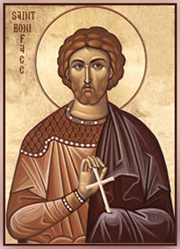
St. Boniface, Martyr The Sin of Scandal Moral Teaching on Unchaste Thoughts and Desires Prayers for the Preservation of Chastity. An Explanation and Defense of the Virtue of Chastity Impurity a Terrible Evil Holy Purity The Prodigal Son, the Sinner's Return to God Grant, we beseech Thee, almighty God: that we, who keep the solemn feast of blessed Boniface Thy Martyr, may be assisted by his intercession with thee. Through our Lord etc. (Roman Breviary) |
May 15th: St. John Baptist de LaSalle, Confessor and St. Dympna in some places.
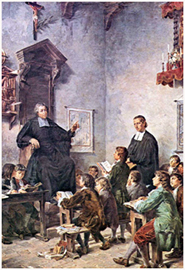
The Story of Saint John Baptist de la Salle, 1921 Religious and Moral Training of Children Christian Instruction Catholic Instruction for Children for the Sacrament of Penance, 1897 Instructions for the Catholic Family On the Mode of Teaching Christian Doctrine to Children O God, who didst raise up the holy Confessor John Baptist to promote the Christian education of the poor, and to direct the young in the way of truth, and by his means didst bring together a new family within the Church: mercifully grant, through his intercession and example, that we may burn with zeal for Thy glory in saving souls, and may share his crown in heaven. Through our Lord etc. (Roman Breviary) |
May 16th: St. Ubaldus (Ubaldo), Bishop and Confessor and Patron of Exorcists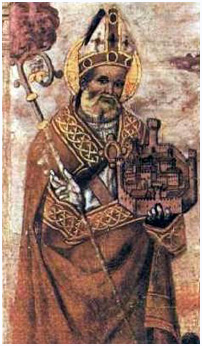 St. Ubaldus, Bishop and Confessor and Exorcist A Short Explanation on the Rite of Exorcisms Resisting the Enemies of Our Salvation St. Michael/ Exorcism The Triumph of the Blessed Sacrament or Exorcism of Nicola Aubry, by Fr. Michael Muller To fight against Satan, The Medal or Cross of St. Benedict, by Prosper Gueranger Does Satan Exist? Temptations and the Devils who Tempt Temptation: as defined by the Council of Trent Temptations: Why we have them Of Resisting Temptation Thomas A Kempis The Devils Plan to Ruin Souls and the Protection of the Holy Angels Resisting the Devil On Serving the Devil Be appeased, O Lord, we beseech Thee, and lend us Thy help: and by the intercession of blessed Ubald, Thy Confessor and Bishop, stretch forth the right hand of Thy mercy upon us against the wicked assaults of the devil. Through our Lord etc. (Roman Breviary) May 16th: St. John Nepomucen --Patron of the Sacrament of Penance 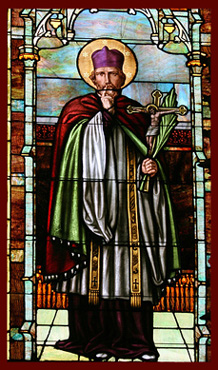 St. John Nepomucen, Martyr Defender of the Seal of Confession The Seal of Confession Blessed are the Clean of Heart Our Lady Refuge of Sinners Related links for the Sacrament of Penance The Idolatry of the Creature Due to Impurity Moral Teaching on Unchaste Thoughts and Desires and Prayers to Overcome Temptations Sacrament of Penance The Sacrament of Penance, All of Your Questions Answered On the Benefits of a Good Confession Two Short Sermons: On Turning from Sin to God The Sentiments of a Penitent Sinner Causes of Relapse into Sin On the Preparation Necessary to Make a Good Confession On Motives for Repentance and Contrition Necessary for a Good Confession Examination of Conscience The Necessity of Self-Examination The Seven Deadly Sins, Nine Ways to Being an Accessory to Another's Sin, Sins Against the Holy Spirit The Sixth Commandment: Explained by St. Thomas Aquinas Rite of Confession General Confession The Necessity of Avoiding Occasions of Sin by St. Alphonsus Liguori Contrition Contrition and the Purpose of Amendment The False Peace of a Sinful Conscience, by Fr. Hunolt, 1691-1746 Render an Account of Your Life: A Must Read for Every Soul The Sinner will Seek God at Death On the Number of Sins, by St. Aphonsus Di Liguori The Conversion of Sinners Penitent's Consolation The Nature of Sin The Folly of Sin On Not Making Light of Venial Sins On the Multitude of Our Sins On the Horror of Mortal Sin On Spiritual Murder Examination of Our Duties and State of Life Conscience Index of the Ten Commandments Sermon on Keeping the 10 Commandments The Conversion of Sinners The Necessity of Prayer for Sinners The Sinner's Guide by Ven. Louis of Granada, O.P. Catholic Instruction for Children for the Sacrament of Penance, 1897 St. John was born, in answer to prayer, 1330, of poor parents, at Nepomuc in Bohemia. In gratitude they consecrated him to God; and his holy life as a priest led to his appointment as chaplain to the court of the Emperor Wenceslas, where he converted numbers by his preaching and example. Amongst those who sought his advice was the empress, who suffered much from her husband's unfounded jealousy. St. John taught her to bear her cross with joy; but her piety only incensed the emperor, and he tried to extort her confessions from the Saint. He threw St. John into a dungeon, but gained nothing; then, inviting him to his palace, he promised him riches if he would yield, and threatened death if he refused. The Saint was silent. He was racked and burnt with torches; but no words, save Jesus and Mary, fell from his lips. At last set free, he spent his time in preaching, and preparing for the death he knew to be at hand. On Ascension Eve, May 16, Wenceslas, after a final and fruitless attempt to move his constancy, ordered him to be cast into the river, and that night the martyr's hands and feet were bound, and he was thrown from the bridge of Prague. As he died, a heavenly light shining on the water discovered the body, which was buried with the honors due to a Saint. A few years later, Wenceslas was deposed by his own subjects, and died an impenitent and miserable death. In 1618 the Calvinist and Hussite soldiers of the Protestant Elector Frederick tried repeatedly to demolish the shrine of St. John at Prague. Each attempt was miraculously frustrated; and once the persons engaged in the sacrilege, among whom was an Englishman, were killed on the spot. In 1620 the imperial troops recovered the town by a victory which was ascribed to the Saint's intercession, as he was seen on the eve of the battle, radiant with glory, guarding the cathedral. When his shrine was opened, three hundred and thirty years after his decease, the flesh had disappeared, and one member alone remained incorrupt, the tongue; thus still, in silence, giving glory to God. Reflection--St. John, who by his invincible sacramental silence won his crown, teaches us to prefer torture and death to offending the Creator with our tongue. How many times each day do we forfeit grace and strength by sins of speech! |
May 17th: St. Paschal Baylon, Confessor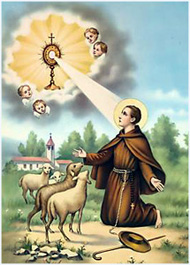 St. Paschal Baylon, Confessor The Necessity of Mortification The Sacrament of the Holy Eucharist Spiritual Communion The Anger of God Against the Vice of Impurity St. Paschal Baylon, Confessor O God, Who didst adorn Blessed Paschal, Thy Confessor, with a wonderful love for the holy mysteries of Thy Body and Blood, mercifully grant, that we, too, may deserve to receive the same spiritual graces which he received from this deivine banquet. Who livest and reignest, etc. Amen (Roman Breviary) From his childhood Saint Paschal seems to have been marked out for the service of God. Amid his daily labors as a shepherd, he found time to instruct and evangelize the rude herdsmen who kept their flocks on the hills of Aragon. At the age of twenty-four he entered the reformed Franciscan Order near the town of Monfort, Spain, where he remained, out of humility, a simple lay brother, occupying himself by preference with the roughest and most servile tasks. He was distinguished by his ardent devotion and love for the Blessed Sacrament. He would spend hours on his knees before the tabernacle, often being raised from the ground in the fervor of his prayer. And there, from the authentic and eternal Truth, he drew such stores of wisdom that, unlettered as he was, he was considered by all a master in theology and spiritual science. Shortly after his profession he was sent to Paris on business connected with his Order. The journey was full of perils, owing to the hostility of the Huguenots, who were numerous at the time in the south of France; and on four separate occasions Paschal was in imminent danger of death at their hands. Twice he was taken for a spy; but it was not God's will that His servant should obtain the crown of martyrdom which he so earnestly desired, though he regarded himself as unworthy of it. He returned in safety to his convent, where he would later die in the odor of sanctity in 1592. Multitudes witnessed the miracles which took place during the three days his body was exposed for veneration. He was canonized in 1690, and in 1897 declared patron of all Eucharistic congresses and confraternities. |
May 18th: St. Venantius, Martyr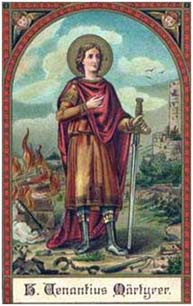
St. Venantius, Martyr On the Great Commandment of Divine Love On Loving the Lord Our God Above All Things On Loving the Lord Our God Above All Things Your Guardian Angel throughout life Suffering from the Catechism of St. John Vianney St. Venantius, Martyr O God, Who hast made this day holy by the triumph of Thy blessed Martyr Venantius: graciously hear the prayers of Thy people, and grant, that we who venerate his merits may follow the example of his constancy in the faith. Through our Lord etc. (Roman Breviary) St. Venantius was born at Camerino in Italy, and at the age of fifteen was seized as a Christian and carried before a judge. As it was found impossible to shake his constancy either by threats or promises, he was condemned to be scourged, but was miraculously saved by an angel. He was then burnt with torches and hung over a low fire that he might be suffocated by the smoke. The judge's secretary, admiring the steadfastness of the Saint, and seeing an angel robed in white, who trampled out the fire and again set free the youthful martyr, proclaimed his faith in Christ, was baptized with his whole family, and shortly after won the martyr's crown himself. Venantius was then carried before the governor, who, unable to make him renounce his faith, cast him into prison with an apostate, who vainly strove to tempt him. The governor then ordered his teeth and jaws to be broken, and had him thrown into a furnace, from which the angel once more delivered him. The Saint was again led before the judge, who at sight of him fell headlong from his seat and expired, crying, "The God of Venantius is the true God; let us destroy our idols." This circumstance being told to the governor, he ordered Venantius to be thrown to the lions; but these brutes, forgetting their natural ferocity, crouched at the feet of the Saint. Then, by order of the tyrant, the young martyr was dragged through a heap of brambles and thorns, but again God manifested the glory of His servant; the soldiers suffering from thirst, the Saint knelt on a rock and signed it with a cross, when immediately a jet of clear, cool water spurted up from the spot. This miracle converted many of those who beheld it, whereupon the governor had Venantius and his converts beheaded together in the year 250. The bodies of these martyrs are kept in the church at Camerino which bears the Saint's name. Reflection--Love of suffering marks the most perfect degree in the love of God. Our Lord Himself was consumed with the desire to suffer, because He burnt with the love of God. We must begin with patience and detachment. At last we shall learn to love the sufferings which conform us to the Passion of our Redeemer. |
May 19th: St. Peter Celestine, Pope and Confessor and St. Prudentia, Virgin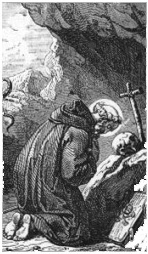 St. Peter Celestine, Pope and Confessor and St. Prudentia, Virgin On the Vice of Pride O God, Who didst raise up blessed Peter Celestine to the supreme pontificate, yet didst teach him to prefer humility to that dignity, mercifully grant, that, following his example, we may despise all the things of the world, and so deserve to attain to the rewards which thou hast promised to the lowly. Through our Lord etc. (Roman Breviary) As a child, Peter had visions of our blessed Lady, and of the angels and saints. They encouraged him in his prayer, and chided him when he fell into any fault. His mother, though only a poor widow, put him to school, feeling sure that he would one day be a Saint. At the age of twenty, he left his home in Apulia to live in a mountain solitude. Here he passed three years, assaulted by the evil spirits and beset with temptations of the flesh, but consoled by angels' visits. After this his seclusion was invaded by disciples, who refused to be sent away; and the rule of life which he gave them formed the foundation of the Celestine Order. Angels assisted in the church which Peter built; unseen bells rang peals of surpassing sweetness, and heavenly music filled the sanctuary when he offered the Holy Sacrifice. Suddenly he found himself torn from his loved solitude by his election to the Papal throne. Resistance was of no avail. He took the name of Celestine, to remind him of the heaven he was leaving and for which he sighed, and was consecrated at Aquila. After a reign of four months, Peter summoned the cardinals to his presence, and solemnly resigned his trust. St. Peter built himself a boarded cell in his palace, and there continued his hermit's life; and when, lest his simplicity might be taken advantage of to distract the peace of the Church, he was put under guard, he said, "I desired nothing but a cell, and a cell they have given me." There he enjoyed his former loving intimacy with the saints and angels, and sang the Divine praises almost continually. At length, on Whit-Sunday, he told his guards he should die within the week, and immediately fell ill. He received the last sacraments; and the following Saturday, as he finished the concluding verse of Lauds, "Let every spirit bless the Lord!" he closed his eyes to this world and opened them to the vision of God. Reflection--"Whose," says the Imitation of Christ, "withdraweth himself from acquaintances and friends, to him will God draw near with His holy angels." |
May 20th: St. Bernardine of Siena, Confessor. 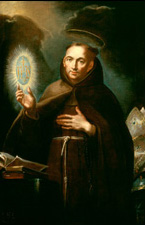 St. Bernardine of Siena, Confessor Prayers and Devotions to the Holy Name Meditations on the Life of Jesus Christ: Circumcision and the Holy Name Index of Prayers and Devotions for the Sick O Lord Jesus, Who didst bestow on the blessed Bernardine Thy Confessor an especial love for Thy Holy Name: mercifully pour into our hearts, by virtue of his merits and intercession, the spirit of Thy love: Who livest etc (Roman Breviary) In 1408 St. Vincent Ferrer once suddenly interrupted his sermon to declare that there was among his hearers a young Franciscan who would be one day a greater preacher than himself, and would be set before him in honor by the Church. This unknown friar was Bernardine. Of noble birth, he had spent his youth in works of mercy, and had then entered religion. Owing to a defective utterance, his success as a preacher at first seemed doubtful, but, by the prayers of Our Lady, this obstacle was miraculously removed, and Bernardine began an apostolate which lasted thirty-eight years. By his burning words and by the power of the Holy Name of Jesus, which he displayed on a tablet at the end of his sermons, he obtained miraculous conversions, and reformed the greater part of Italy. But this success had to be exalted by the cross. The Saint was denounced as a heretic and his devotion as idolatrous. After many trials he lived to see his innocence proved, and a lasting memorial of his work established in a church. The Feast of the Holy Name commemorates at once his sufferings and his triumph. He died on Ascension Eve, 1444, while his brethren were chanting the antiphon, "Father, I have manifested Thy Name to men." St. Bernardine, when a youth, undertook the charge of a holy old woman, a relation of his, who had been left destitute. She was blind and bedridden, and during her long illness could only utter the Holy Name. The Saint watched over her till she died, and thus learned the devotion of his life. Reflection--Let us learn from the life of St. Bernardine the power of the Holy Name in life and death. |
May 22nd, In some places St. Rita of Cascia
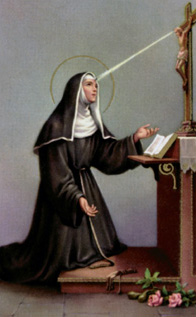
St. Rita, Widow Trials in the Married State Catholic Laws on Marriage and Divorce Sins Against the Marriage Contract Duties of Marriage In Defense of Catholic Marriage Against Divorce Christian Marriage Part 1: The Sacred Bond of Marriage: Happiness with Holiness in Family Life Condemnations of Divorce Index: Links to All Marriage and Family Pages. Provides answers to all of your questions. |
May 23rd: John Baptist de Rossi, Confessor.
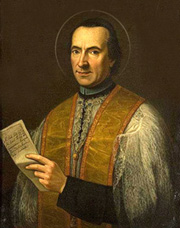
John Baptist de Rossi, Confessor. Patron of Abondoned Sinners Index of Prayers and Devotions for the Sick Index of Prayers and Devotions for the Dying |
May 24th: Ferial Day: In some places, Mary Help of Christians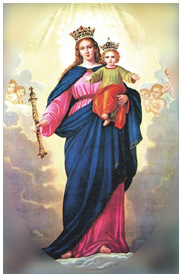 Mary Help of Christians Prayer to Mary Help of Christians The Victory of Lepanto In Defense of Mary The Mother of God On Reforming Our Lives Before Death by St. Alphonsus Di Liguori Every one desires to die the death of the saints; but it is scarcely possible for the Christian to make a holy end, who has led a disorderly life until the time of his death; to die united to God, after having always lived at a distance from Him. The saints, in order to secure a happy death, renounced all the riches, the delights, and all the hopes which this world held out to them, and embraced poor and mortified lives. They buried themselves alive in this world, to avoid, when dead, being buried for ever in hell. O God, for how many years past have I deserved to be buried in that place of torments, without hope of pardon, or of being able to love Thee! But Thou hast waited in order to pardon me. Truly, then, am I sorry from the bottom of my heart for having offended Thee, my sovereign good; have pity on me, and do not permit me to offend Thee any more. God forewarns sinners that they will seek Him in death and will not find Him: You shall seek and shall not find me. They shall not find Him because they will not then seek Him through love, but only through the fear of hell; they will seek God without renouncing their affection for sin; and hence they shall not find Him. No, my God, I will not wait to seek Thee in death, but will seek and desire Thee from this moment. I am sorry for having hitherto given Thee so much displeasure by seeking to gratify my own inclinations. I am sorry for it, I confess that I have done evil. But Thou willest not that the heart that seeks Thee should despair, but rejoice: Let the heart of them rejoice that seek the Lord. Ps. civ. 3. Yes, O Lord, I seek Thee and I love Thee more than myself. How miserable is the Christian who, before his death, has not spent a good part of his life in bewailing his sins! It is not to be denied that such a man may be converted at his death and obtain salvation; but the mind obscured, the heart hardened, the bad habits formed, the passions predominant, render it morally impossible for him to die happily. An extraordinary grace will be necessary for him; but does God reserve such a grace to bestow it upon one who has continued ungrateful to Him even until the moment of death? O God, to what straits are sinners reduced to escape eternal destruction. No, my God, I will not wait until death to repent of my sins and to love Thee. I am sorry now for having offended Thee; now do I love Thee with my whole heart. Suffer me not any more to turn my back upon thee, rather let me die. O holy mother, Mary, obtain for me perseverance in virtue. |
May 25th: St. Gregory VII., Pope and Confessor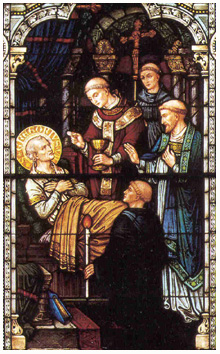
St. Gregory VII., Pope and Confessor, Com. of St. Urban I Pope and Martyr The Revolt of Society from God Pastors as True Shepherds Must Defend Their Flock Part I. Grievousness and Chastisement of Sin in a Priest Part II. The Incontinent Priest and Sacrilegious Mass How Catholics lose the Faith by Fr. Michael Muller Litany of Faith and the Necessity of the Catholic Faith for Salvation May 25th: St. Gregory VII., Pope and Confessor O God, the strength of all those who put their trust in Thee, Who didst strengthen blessed Gregory Thy Confessor and Pontiff with the virtue of constancy, to the end that he might defend the liberty of the Church: grant us, by his example and intercession, to overcome with a good courage all that is against us. Through our Lord etc. (Roman Breviary) Gregory VII., by name Hildebrand, was born in Tuscany, about the year 1013. He was educated in Rome. From thence he went to France, and became a monk at Cluny. Afterwards he returned to Rome, and for many years filled high trusts of the Holy See. Three great evils then afflicted the Church: simony, concubinage, and the custom of receiving investiture from lay hands. Against these three corruptions Gregory never ceased to contend. As legate of Victor II. he held a Council at Lyons, where simony was condemned. He was elected Pope in 1073, and at once called upon the pastors of the Catholic world to lay down their lives rather than betray the laws of God to the will of princes. Rome was in rebellion through the ambition of the Cenci. Gregory excommunicated them. They laid hands on him at Christmas during the midnight Mass, wounded him, and cast him into prison. The following day he was rescued by the people. Next arose his conflict with Henry IV., Emperor of Germany. This monarch, after openly relapsing into simony, pretended to depose the Pope. Gregory excommunicated the emperor. His subjects turned against him, and at last he sought absolution of Gregory at Canossa. But he did not persevere. He set up an antipope, and besieged Gregory in the castle of St. Angelo. The aged pontiff was obliged to flee, and on May 25, 1085, about the seventy-second year of his life and the twelfth year of his pontificate, Gregory entered into his rest. His last words were full of a divine wisdom and patience. As he was dying, he said, "I have loved justice and hated iniquity, therefore I die in exile." His faithful attendant answered, "Vicar of Christ, an exile thou canst never be, for to thee God has given the Gentiles for an inheritance, and the uttermost ends of the earth for thy possession." |
May 27th: St. Bede the Venerable, Confessor and Doctor of the Church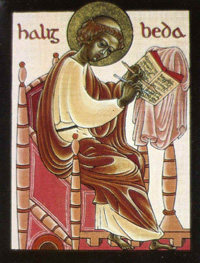 St. Bede and the Litany of Intercession for England O God, Who makest Thy Church illustrious by the learning of blessed Bede Thy Confessor and Doctor mercifully grant to us Thy servants, that we may always be enlightened by his wisdom and assisted by his merits. Through our Lord etc. (Roman Breviary) Venerable Bede, the illustrious ornament of the Anglo-Saxon Church and the first English historian, was consecrated -to God at the age of seven, and intrusted to the care of St. Benedict Bishop at Wearmouth. He became a monk in the sister-house of Jarrow, and there trained no less than six hundred scholars, whom his piety, learning, and sweet disposition had gathered round him. To the toils of teaching and the exact observance of his rule he added long hours of private prayer, and the study of every branch of science and literature then known. He was familiar with Latin, Greek, and Hebrew. In the treatise which he compiled for his scholars, still extant, he threw together all that the world had then stored in history, chronology, physics, music, philosophy, poetry, arithmetic, and medicine. In his Ecclesiastical History he has left us beautiful lives of Anglo-Saxon Saints and holy Fathers, while his commentaries on the Holy Scriptures are still in use by the Church. It was to the study of the Divine Word that he devoted the whole energy of his soul, and at times his compunction was so overpowering that his voice would break with weeping, while the tears of his scholars mingled with his own. He had little aid from others, and during his later years suffered from constant illness; yet he worked and prayed up to his last hour. The Saint was employed in translating the Gospel of St. John from the Greek up to the hour of his death, which took place on Ascension Day, 735. "He spent that day joyfully," writes one of his scholars. And in the evening the boy who attended him said, "Dear master, there is yet one sentence unwritten." He answered, "Write it quickly." Presently the youth said, "Now it is written" He replied, "Good! thou hast said the truth--consummatum est; take my head into thy hands, for it is very pleasant to me to sit facing my old praying-place, and there to call upon my Father." And so on the floor of his cell he sang, "Glory be to the Father, Son, and Holy Ghost;" and just as he said "Holy Ghost," he breathed his last, and went to the realms above. Reflection--"The more," says the Imitation of Christ, "a man is united within himself and interiorly simple, so much the more and deeper things doth he understand without labor; for he receiveth the light of understanding from on high." |
May 28th: St. Augustine, Bishop Confessor. 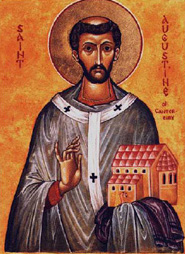 St. Augustine was sent by St. Gregory the Great to England to convert the pople to Christianity. At Canterbury he erected a monastery and there established his Episcopal See. He is said to have baptized thousands of Englishmen in one day. He died in the year 604. St. Augustine of Kent, Bishop and Confessor St. Augustine, Bishop Confessor O God, Who didst deign to make the light of the true faith shine upon the English people through the preaching and marvelous works of blessed Augustine Thy Confessor and Bishop: grant that, through his intercession, the hearts of those who have gone astray may return to the unity of Thy truth, and that we may all be of one mind in doing Thy will. Through our Lord etc. (Roman Breviary) Saint Augustine was prior of the monastery of Saint Andrew on Mount Coelius in Rome, when he was appointed by Saint Gregory the Great as Superior of the forty missionaries he was sending to England. The Christian faith of England, more than that of any other nation of Europe, was the fruit of the labors and spiritual conquests of the ministry of monks. Its deepest Christian roots are more ancient than Saint Augustine and his companions, and date from the era of the Apostles. England, in the first century, furnished its contingent of martyrs during the persecution of Diocletian. England sent its bishops to the first Councils held after the religion of Christ became that of the Empire in 313. But in the time of Saint Augustine, the Anglo-Saxon conquest had cut down almost all the branches of the tree. When Saint Augustine arrived, ruined churches, scarcely a Christian to be found to narrate a tradition, attested to the sacrilegious and incendiary hand of paganism, despite the labors of Saint Palladius and Saint Germain d'Auxerre in the fifth century. The last Christian Britons had taken refuge in the mountains of Wales. And England, the land of the Angles, had become a land of infamous slave-traders for the continent, including Rome; its merchants did not spare their own people when profit was at stake. In this way did Saint Gregory the Great come to purchase the English boys he saw marketed at the Roman Forum, and raise them in his house, which he had transformed into a monastery. Thus the definitive conversion of England began, in his compassionate heart, when in the sixth year of his pontificate he chose the prior of his own monastery for the mission to England. Saint Augustine and his companions during their journey heard many reports of the barbarism and ferocity of the pagan English. They were alarmed and wished to turn back. But Saint Gregory sent word to them saying, "Go on, in God's name! The greater your hardships, the greater your crown. May the grace of Almighty God protect you, and permit me to see the fruit of your labor in the heavenly country! If I cannot share your toil, I shall yet share the harvest, for God knows that it is not good-will which is wanting." The band of missionaries went on in obedience, after halting briefly to deliver letters of Saint Gregory at the Abbey of Lerins, and to the bishops of Aix, Tours, Marseille, Vienna, Autun, and Arles, as well as to obtain translators for the mission of the monks. Landing at Ebbsfleet, they sent ahead of them their translator-emissaries, to say to the king of those lands that they had come from Rome, to announce to him not merely good news, but the Good News of all ages, with its promises of heavenly joy and an eternal reign in the company of the living and true God. They met with the Saxon King Ethelbert who had been reigning for thirty-six years, and with his barons under a great oak tree at Minster in the present county of Kent, and announced to him the Gospel of Jesus Christ. He was predisposed to listen to the missionaries; his Christian wife, Bertha, was a great-granddaughter of Saint Clothilda and Clovis. He wished to deliberate for a few days nonetheless, and when they returned in procession, chanting and preceded by the Cross, he promised only to give them liberty to practice their faith unmolested. He gave them a residence in Canterbury and provided for their needs. Their good example brought many to them for instruction and then Baptism, and at Pentecost 597, the Anglo-Saxon king, too, entered into the unity of the Church of Christ. His example was followed by the greater number of his nobles and people. By degrees the Faith spread far and wide, and Augustine, as papal legate, set out on a visitation of Britain. He failed in his attempt to enlist the Christian Britons of the west in the work of his apostolate, but his success was otherwise triumphant from south to north. He died after eight years of evangelical labors, but his monks continued them and perpetuated them. The Anglo-Saxon Church which Saint Augustine founded is still famous for its learning, zeal, and devotion to the Holy See, while its calendar commemorates no fewer than 300 Saints, half of whom were of royal birth. |
May 29th: St. Mary Magdalen de Pazzi, Virgin. 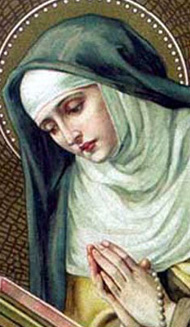 St. Mary Magdalen de Pazzi, Virgin Catholic Book: Legends of the Blessed Sacrament. St. Mary Magdalen de Pazzi on Page 88 Take Heed Lest You Fall On the Use of Temptations and How to Overcome Discouragement Part 12: Resisting the Enemies of Our Salvation Temptations and the Devils who Tempt Temptation: as defined by the Council of Trent Beware if you have no Temptations Moral Teaching on Unchaste Thoughts and Desires St. Mary Magdalen de Pazzi, Virgin O God, the lover of virginity, Who didst inflame the blessed virgin Mary Magdalen with Thy love, and didst adorn her with heavenly gifts: grant that, as we honor her by keeping her festival, so we may follow the example of her purity and love. Through our Lord etc. Ant. Come, Spouse of Christ receive the crown, which the Lord hath prepared for thee for all eternity, alleluia. V. With thy comeliness and thy beauty, alleluia. R. Set out, proceed prosperously, and reign, alleluia. (Roman Breviary) St. Mary Magdalen of Pazzi, of an illustrious house in Florence, was born in the year 1566, and baptized by the name of Catherine. She received her first Communion at ten years of age, and made a vow of virginity at twelve. She took great pleasure in carefully teaching the Christian doctrine to the ignorant. Her father, not knowing her vow, wished to give her in marriage, but she persuaded him to allow her to become a religious. It was more difficult to obtain her mother's consent; but at last she gained it, and she was professed, being then eighteen years of age, in the Carmelite monastery of Santa Maria degli Angeli in Florence, May 17, 1584. She changed her name Catherine into that of Mary Magdalen on becoming a nun, and took as her motto, "To suffer or die; " and her life henceforth was a life of penance for sins not her own, and of love of Our Lord, Who tried her in ways fearful and strange. She was obedient, observant of the rule, humble and mortified, and had a great reverence for the religious life. She loved poverty and suffering, and hungered after Communion. The day of Communion she called the day of love. The charity that burned in her heart led her in her youth to choose the house of the Carmelites, because the religious therein communicated every day. She rejoiced to see others communicate, even when she was not allowed to do so herself; and her love for her sisters grew when she saw them receive Our Lord. God raised her to high states of prayer, and gave her rare gifts, enabling her to read the thoughts of her novices, and filling her with wisdom to direct them aright. She was twice chosen mistress of novices, and then made superioress, when God took her to Himself, May 25, 1607. Her body is incorrupt. Reflection: St. Mary Magdalen of Pazzi was so filled with the love of God that her sisters in the monastery observed it in her love of themselves, and called her "the Mother of Charity" and "the Charity of the Monastery." |
May 30th: St. Felix, Pope and Martyr
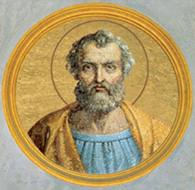
O Eternal Shepherd, watch over the peace of Thy flock, and through blessed Felix Thy Martyr and Sovereign Pontiff, whom thou didst appoint shepherd over the whole Church, keep her under Thy constant protection. Through our Lord etc. Ant. Perpetual light shall shine upon Thy Saints, O Lord, and an eternity of ages, alleluia. V. O ye holy and just ones, rejoice in the Lord, alleluia. R. God has chosen you to Himself for an ineritance, alleluia. (Roman Breviary) St. Felix was a Roman by birth, and succeeded St. Dionysius in the government of the Church in 269. Paul of Samosata, the proud Bishop of Antioch, to the guilt of many enormous crimes added that of heresy, teaching that Christ was no more than a mere man, in whom the Divine Word dwelt by its operation and as in its temple, with many other gross errors concerning the capital mysteries of the Trinity and Incarnation. Three councils were held at Antioch to examine his cause, and in the third, assembled in 269, being clearly convicted of heresy, pride, and many scandalous crimes, he was excommunicated and deposed, and Domnus was substituted in his place. As Paul still kept possession of the episcopal house, our Saint had recourse to the Emperor Aurelian, who, though a pagan, gave an order that the house should belong to him to whom the bishops of Rome and Italy adjudged it. The persecution of Aurelian breaking out, St. Felix, fearless of danger, strengthened the weak, encouraged all, baptized the catechumens, and continued to exert himself in converting infidels to the Faith. He himself obtained the glory of martyrdom. He governed the Church five years, and passed to a glorious eternity in 274. Reflection--The example of Our Saviour and of all His saints ought to encourage us under all trials to suffer with patience and even with joy. We shall soon begin to feel that it is sweet to tread in the steps of a God-man, and shall find that if we courageously take up our crosses, He will make them light by sharing the burden with us. 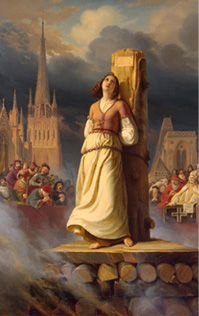 St. Joan of Arc, Virgin and Martyr St. Joan of Arc: Catholic Book Are we bound to profess our Catholic Faith openly? How Catholics lose the Faith by Fr. Michael Muller Sermon: the Gift of Faith Explained Showing Forth Our Faith Litany of Faith and the Necessity of the Catholic Faith for Salvation What Cannot and What Can Be Reformed in the Church. What Every Christian Must Believe and Do to be Saved. Abjuration of Heresy and Profession of Faith of the Council of Trent, Pius IV., 1565 Who today does not know the history of the Maid of Orleans, who saved France from the foreign domination of the English, only to be betrayed by the legitimate prince whom her efforts had crowned at Rheims, then burnt at the stake on May 30, 1431? Both in the French and English languages, many books and articles have honored her since her canonization in 1920 by Pope Benedict XV. The Holy Father spoke before the bishop of Orleans and others present for the reading of the decree which approved her two final great miracles, needed to proceed with the canonization. He said, We find the memory of Joan of Arc so apt to enkindle love in the French people for their mother country, that we regret being French only in our heart! Many others could say the same, and confirm the exactitude of the proverb: Every Christian has two mother countries--the one where he or she first saw the light of day, and France! Two years later, Pope Pius XI declared Saint Joan patroness of France with the Most Blessed Virgin, placing her second only to the Mother of God. In that year Monsignor Baudrillart, French historian, wrote that Saint Joan of Arc may be proposed as an example to all young children by her perfect piety; as a model of fidelity to the call of heaven, to all young persons. For artisans, scholars, writers, teachers, she gives excellent example by her respect for truth and her remarkable prudence. Those dedicated to the works of mercy should find inspiration in her charity, visible when she consoled and wept for her wounded and dying enemies. All agricultural workers can invoke her with confidence, for when Joan, with the archbishop of Rheims, rode through the rich fields in the month of August and saw the reapers at work, she expressed a wish, despite the honors she then enjoyed, to die in the midst of the country-folk of France whom she loved. Her illness in prison, her martyrdom in the flames, recommend her intercession to the sick, as also to all who pray for loved ones in purgatory. Finally, Monsignor Baudrillart concluded, we pray our new Patroness to intercede unceasingly with God and the Most Blessed Virgin that France, its thoughts turned towards the true liberty of God's children and its own ancient dignity, may truly be today as before, the firstborn daughter of the Church. For centuries that title--conferred because of the early conversion of King Clovis and three thousand of his noble soldiers, baptized on Christmas day of 496--was the glory of Christian France. It was later magnificently renewed and embellished by the heroic virgin, Joan of Arc. |
May 31st: the Queenship of the Blessed Virgin Mary and St. Petronilla, Virgin 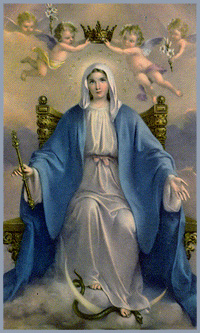 The Queenship of the Blessed Virgin Mary Children's Sermon: Mary Crowned Queen of Heaven Novena for the Queenship of Mary: May 23rd - May 31st Novena Prayer to Mary Help of Christians Mary Queen of All Saints Devotions in honor of the Queenship of Mary Our Lady Queen of Angels Queen of Apostles Mary, Our Advocate with Our Judge, by Fr. Francis Doyle 1879 Meditations for the Month of May dedicated to Our Lady The Child's Month of Mary for Each Day in May Visits to the Altar of Mary for Each Day in May Mary's Fatima Message. Peace and Devotions by Fr. Lovasik, 1955 Joyful Mysteries Sorrowful Mysteries Glorious Mysteries 30 Days Prayer to the Blessed Virgin Mary The Little Office of the Blessed Virgin Mary, from Candlemas until Advent The Humility of the Blessed Virgin of Mary The Crown of Twelve Stars True Devotion to the Blessed Virgin Mary by St. Louis Marie de Monfort The Life of the Blessed Virgin Mary as Set Forth in Her Titles from the Litany of Loreto The Book of the Holy Rosary, as explained by the Church Fathers and prefigured in the Old Testament The Life of the Blessed Virgin Mary, St. Joseph, St. Joachim and St. Anne, 1859 The Excellence of the Rosary, Rev. M. J. Frings, 1912 Our Lady of Good Counsel: Prayers, Litany and Book, "The Virgin Mother of Good Counsel" The Christian Mother Hear us, O God, our Savior, so that we, who rejoice in the feast of Blessed Petronilla, Thy Virgin, may be taught by the spirit of holy devotion. Through our Lord etc. (Roman Breviary) If we follow the writings of St. John of Damascus, St. Athanasius, and others, do these not oblige us to call Mary by the name of Queen, since her father David doth receive the highest praise in Scripture as a renowned king, and her Son as the King of kings and Lord of lords, reigning forever? She is Queen, moreover, when compared with the Saints who reign like kings in the heavenly kingdom, co-heirs with Christ, the great King, placed on the same throne with Him, as saith the Scripture. And as Queen she is second to none of the elect, but in dignity is raised so high above both Angels and men that nothing can be higher or holier than she, who alone hath the same Son as God the Father, and who seeth above her only God and Christ, and below her all creatures other than herself. The great Athanasius said clearly: Mary is not only the Mother of God, but also can truly be called Queen and Lady, since in the fact the Christ who was born of the Virgin Mother is God and Lord and also King. It is to this Queen, therefore, that the words of the Psalmist are applied : Upon thy right hand did stand the Queen in a vesture of gold. Thus Mary is rightly called Queen, not only of heaven, but also of the heavens, as the Mother of the King of Angels, and as the Bride and beloved of the King of the heavens. O Mary, most august Queen and most faithful Mother, to whom no one doth pray in vain who prayeth devoutly, and to whom all mortal men are bound by the enduring memory of so many benefits, again and again reverently do I beseech thee to accept and be pleased with every evidence of my devotion towards thee, to value the poor gift I offer according to the zeal with which it is offered, and to recommend it to thine all-powerful Son. |
Saints and Feast Days for the Month of June
All of the following are non-moveable feasts that always occurs on the same date each year
All of the following are non-moveable feasts that always occurs on the same date each year
June 1st: Angela Merici, Virgin 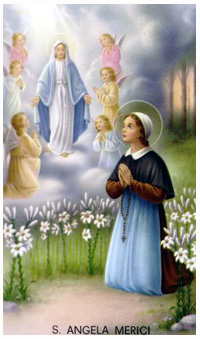 St. Angela Merici, Virgin Explanation of the Law of God 2 Short Sermons: On the Peace of a Christian On Perseverance in Good The Corporal Works of Mercy The Spiritual Works of Mercy O God, who didst bring to pass that through blessed Angela a new company of holy virgins should grow up within Thy Church: grant, through her intercession, that we may live as angels in the purity of our lives; and, renouncing all earthly joys, may be found worthy to enjoy those that are everlasting. Through our Lord etc. (Roman Breviary) On the Unhappy Life of the Sinner by St. Alphonsus Di Liguori There is no peace for the wicked. Is. xlviii. 22. The devil deceives poor sinners, by making them believe, that if they gratify their sensual desires, revenge themselves, or take what belongs to another, they will gain satisfaction and obtain peace: but no, for the reverse will always be their portion; the soul after sin becomes more than ever disquieted and afflicted. The brutes alone, who are created for the earth, can gain contentment from the enjoyments of the earth; but man, who is "created to enjoy God, cannot derive satisfaction from any or all of God's creatures; his only source of happiness is God. O my God, what, of all the delights by which I have offended thee, now remains but bitterness and sorrow to torment me? I do not regret the bitterness which they now cause me; but only the displeasure which they have given Thee, who hast so much loved me. The wicked are like the raging sea, which cannot rest. Isa. lvii. 20. What is a soul in disgrace with God, but a tempestuous sea, always in agitation? one wave rises and another succeeds, and all are waves of pain and anguish. No one in the world can have all things according to his will. He who loves God, when adversity comes, resigns himself to God's blessed will, and thus secures peace to his soul; but how can the sinner, if he is an enemy of God, pacify himself by resignation to God's holy appointments? Besides, sin always brings with it the dread of divine vengeance. The wicked man fleeth, when no man pursueth. Prov. xxviii. 1. Yes, for his own sin followeth after him, and by the remorse with which it preys upon his soul, makes him suffer an anticipated hell. O my Lord and my God, I am exceedingly sorry for having forsaken Thee; do Thou forgive me and suffer me not to lose Thee any more. Delight in the Lord, and He will give thee the requests of thy heart. Ps. xxxvi. 4. Man, whither goest thou in search of content? seek after God, and He will satisfy all the desires of thy soul. Seek, says St. Augustin, the one only good, in whom are all other goods. Behold a St. Francis, who when stript of all worldly goods, being still united to God, found in this a heaven even here upon earth, and could not often enough exclaim: My God, my God and my all! Happy the soul that leaves all for God; for in him she finds her all. O Jesus, instead of abandoning me, as I have deserved, Thou offerest me pardon and callest me to Thy love. Behold I return to Thee overwhelmed with sorrow for the evil which I have done, and deeply affected at seeing that even still Thou lovest me after the many offences I have committed against Thee. Thou lovest me, and I also love Thee and love Thee more than myself. Receive me into Thy favour, and do with me what Thou pleasest: only do not deprive me of Thy love. Mary, mother, have pity on me. |
June 2nd: Sts. Marcellinus, Peter and Erasmus, Bishop, Martyrs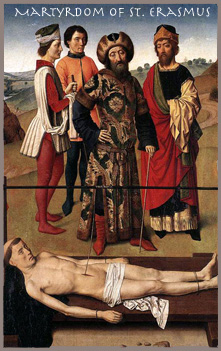
All Related Links for the Ascension of Our Lord Octave of the Ascension Sts. Peter and Marcellinus St. Erasmus, Bishop and Martyr Index 14 Holy Helpers: History of this Devotion , Novena and the Lives of Each Saint St. Michael/ Exorcism Part 13: A Short Explanation on the Rite of Exorcisms The Triumph of the Blessed Sacrament or Exorcism of Nicola Aubry, by Fr. Michael Muller O God, Who dost give us joy by the annual solemnity of Thy blessed martyrs, Marcellinus, Peter and Erasmus: grant, we beseech Thee, that we may be inspired by the examples of those in whose merits we rejoice. Through our Lord etc. (Roman Breviary) The exorcist Peter, sent to prison, under the Emperor Diocletian, converted his jailer and all his family, and brought them to the priest Marcellinus who baptized them. The judge Serenus ordered them both to appear before him and they bore witness to Jesus Christ. They were condemned to death and after atrocious torments, were beheaded towards 303. Possessing the first fruits of the Holy Ghost, they awaited with sighs the adoption of the children of God and their sufferings were in nowise compared with the glory which now shines forth in them. Both saints are mentioned in the Canon of the Mass. The Station of the Saturday on the Second Week of Lent is held in the Church dedicated to them. St. Erasmus, bishop in Syria, afterwards hermit in Lebanon, was cruelly tortured several times in Antioch and in Illyria under the Emperors Diocletian and Maximian. His legend tells that his entrails were wound round a windleass: he is therefore invoked for internal diseases, as one of the "fourteen auxilliary Saints". He died in peace at Formise in Campania. Let us follow the examples of courage and fortitude of these holy martyrs whose merits are our joy. |
June 4th: St. Francis Caracciolo, Confessor. 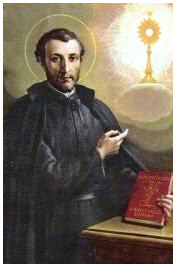 St. Francis Caracciolo, Confessor Eastertide Prayers: from Holy Saturday until Trinity Sunday True Devotion to the Blessed Virgin Mary by St. Louis Marie de Monfort St. Francis Caracciolo, Confessor O God, Who didst call blessed Francis to be the founder of a new Order, and didst adorn him with zeal in prayer and the love of penance: grant that we Thy servants may so walk in imitation of him, that, praying always, and bringing our bodies into subjection, we may be found worthy to attain to the glory of heaven. Through our Lord etc. (Roman Breviary) Francis was born in the kingdom of Naples, of the princely family of Caracciolo. In childhood he shunned all amusements, recited the Rosary regularly, and loved to visit the Blessed Sacrament and to distribute his food to the poor. An attack of leprosy taught him the vileness of the human body and the vanity of the world. Almost miraculously cured, he renounced his home to study for the priesthood at Naples, where he spent his leisure hours in the prisons or visiting the Blessed Sacrament in unfrequented churches. God called him, when only twenty-five, to found an Order of Clerks Regular, whose rule was that each day one father fasted on bread and water, another took the discipline, a third wore a hair-shirt, while they always watched by turns in perpetual adoration before the Blessed Sacrament. They took the usual vows, adding a fourth--not to desire dignities. To establish his Order, Francis undertook many journeys through Italy and Spain, on foot and without money, content with the shelter and crusts given him in charity. Being elected general, he redoubled his austerities, and devoted seven hours daily to meditation on the Passion, besides passing most of the night praying before the Blessed Sacrament. Francis was commonly called the Preacher of Divine Love. But it was before the Blessed Sacrament that his ardent devotion was most clearly perceptible. In presence of his divine Lord his face usually emitted brilliant rays of light; and he often bathed the ground with his tears when he prayed, according to his custom, prostrate on his face before the tabernacle, and constantly repeating, as one devoured by internal fire, "The zeal of Thy house hath eaten me up." He died of fever, aged forty-four, on the eve of Corpus Christi, 1608, saying, "Let us go, let us go to heaven!" When his body was opened after death, his heart was found as it were burnt up, and these words imprinted around it: "Zelus domus Tuae comedit me"--"The zeal of Thy house hath eaten me up." |
June 5th: St. Boniface, Bishop and Martyr. First Saturday
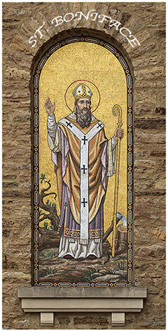
St. Boniface, Bishop and Martyr Are we bound to profess our Catholic Faith openly? The Following of Christ Time is No More The Necessity of Prayer for Sinners O God, Who by the zeal of blessed Boniface Thy Martyr and Bishop didst deign to call a multitude of peoples to the knowledge of Thy name: grant, we beseech thee, that we may enjoy his protection whose festival we are keeping. Through our Lord etc. (Roman Breviary) St. Boniface was born at Crediton in Devonshire, England, in the year 680. Some missionaries staying at his father's house spoke to him of heavenly things, and inspired him with a wish to devote himself, as they did, to God. He entered the monastery of Exminster, and was there trained for his apostolic work. His first attempt to convert the pagans in Holland having failed, he went to Rome to obtain the Pope's blessing on his mission, and returned with authority to preach to the German tribes. It was a slow and dangerous task; his own life was in constant peril, while his flock was often reduced to abject poverty by the wandering robber bands. Yet his courage never flagged. He began with Bavaria and Thuringia, next visited Friesland, then passed on to Hesse and Saxony, everywhere destroying the idol temples and raising churches on their site. He endeavored, as far as possible, to make every object of idolatry contribute in some way to the glory of God; on one occasion, having cut down on immense oak which was consecrated to Jupiter, he used the tree in building a church, which he dedicated to the Prince of the Apostles. He was now recalled to Rome, consecrated Bishop by the Pope, and returned to extend and organize the rising German Church. With diligent care he reformed abuses among the existing clergy, and established religious houses throughout the land. At length, feeling his infirmities increase, and fearful of losing his martyr's crown, Boniface appointed a successor to his monastery, and set out to convert a fresh pagan tribe. While St. Boniface was waiting to administer Confirmation to some newly-baptized Christians, a troop of pagans arrived, armed with swords and spears. His attendants would have opposed them, but the Saint said to his followers: "My children, cease your resistance; the long-expected day is come at last. Scripture forbids us to resist evil. Let us put our hope in God: He will save our souls." Scarcely had he ceased speaking, when the barbarians fell upon him and slew him with all his attendants, to the number of fifty-two. Reflection--St. Boniface teaches us how the love of Christ changes all things. It was for Christ's sake that he toiled for souls, preferring poverty to riches, labor to rest, suffering to pleasure, death to life, that by dying he might live with Christ. |
June 6th: St. Norbert, Bishop.
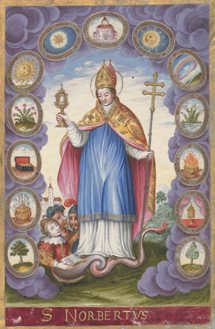
St. Norbert, Bishop and Confessor Repentance How to become a Saint The Three Steps to Heaven O God, Who didst make blesed Norbert Thy Confessor and Bishop an illustrious preacher of Thy word, and through him didst beget a new family in Thy Church: grant, we beseech Thee, that his merits may so plead for us, that by Thy help we may be able to practice what he taught both by word and example. Through our Lord etc. Of noble rank and rare talents, Norbert passed a most pious youth, and entered the ecclesiastical state. By a strange contradiction, his conduct now became a scandal to his sacred calling, and at the court of the Emperor Henry IV. he led, like many clerics of that age, a life of dissipation and luxury. One day, when he was thirty years of age, he was thrown half dead from his horse, and on recovering his senses, resolved upon a new life. After a severe and searching preparation, he was ordained priest, and began to expose the abuses of his Order. Silenced at first by a local council, he obtained the Pope's sanction and preached penance to listening crowds in France and the Netherlands. In the wild vale of Premontre he gave to some trained disciples the rule of St. Austin, and a white habit to denote the angelic purity proper to the priesthood. The Canons Regular, or Premonstratensians, as they were called, were to unite the active work of the country clergy with the obligations of the monastic life. Their fervor renewed the spirit of the priesthood, quickened the faith of the people, and drove out heresy. A vile heretic, named Tankelin, appeared at Antwerp, in the time of St. Norbert, and denied the reality of the priesthood, and especially blasphemed the Blessed Eucharist. The Saint was sent for to drive out the pest. By his burning words he exposed the impostor and rekindled the faith in the Blessed Sacrament. Many of the apostates had proved their contempt for the Blessed Sacrament by burying it in filthy places. Norbert bade them search for the Sacred Hosts. They found them entire and uninjured, and the Saint bore them back in triumph to the tabernacle. Hence he is generally painted with the monstrance in his hand. In 1126 Norbert found himself appointed Bishop of Magdeburg; and there, at the risk of his life, he zealously carried on his work of reform, and died, worn out with toil, at the age of fifty-three. |
June 9th: Sts. Primus and Felicianus, Martyrs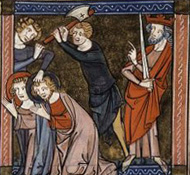 Ss. Primus and Felician, Martyrs Are we bound to profess our Catholic Faith openly? Catholic Book: The Marytrs of the Colisem The Sight of Hell, A Book for Children and Young Persons as well as Adults Reflection on Hell Part 4: The Four Gates of Hell Hell Grant, we beseech Thee, O Lord, that we may ever honor the festival of Thy holy Martyrs Primus and Felicianus: and by their prayersmay obtain the gift of Thy protection. Through our Lord etc. (Roman Breviary) These two martyrs were brothers, and lived in Rome, toward the latter part of the third century, for many years, mutually encouraging each other in the practice of all good works. They seemed to possess nothing but for the poor, and often spent both nights and days with the confessors in their dungeons, or at the places of their torments and execution. Some they encouraged to perseverance, others, who had fallen, they raised again, and they made themselves the servants of all in Christ, that all might attain to salvation through Him. Though their zeal was most remarkable, they had escaped the dangers of many bloody persecutions, and were grown old in the heroic exercises of virtue, when it pleased God to crown their labors with a glorious martyrdom. The pagans raised so great an outcry against them that they were both apprehended and put in chains. They were inhumanly scourged, and then sent to a town twelve miles from Rome to be farther chastised, as avowed enemies to the gods. There they were cruelly tortured, first both together, afterward separately. But the grace of God strengthened them, and they were at length both beheaded on the 9th of June. Reflection.-- soul which truly loves God regards all the things of this world as nothing. The loss of goods, the disgrace of the world, torments, sickness, and other afflictions are bitter to the senses, but appear light to him that loves. If we cannot bear our trials with patience and silence, it is because we love God only in words. "One who is slothful and lukewarm complains of everything, and calls the lightest precepts hard," says Thomas A Kempis June 9th: Our Lady Mother of Grace (In Some Places) 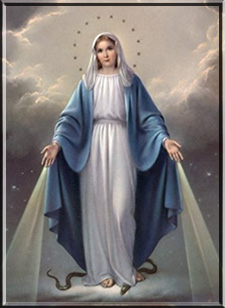
Ave Maria: Hail Mary, Full of Grace Prayer to Our Lady, Mother of Grace Most holy Mary, great Queen of Heaven, the very treasure of life and ever-flowing channel of Divine grace, by thine ineffable virtues thou wast so pleasing in the sight of God, that thou didst merit to conceive in thy virginal womb the very Author of life and of grace, Jesus Christ our Lord; and by becoming the Mother of the God-made man, thou didst become likewise the Mother of redeemed humanity. M other, therefore, of grace and of life, of mercy and forgiveness, turn upon me thy motherly countenance; behold my many miseries both in body and soul; raise me up to a state of perfect friendship with Almighty God, obtain for me the grace of final perseverance. And since thy prayers, O Mary, are all-powerful with our Lord, permit me, miserable as I am, to choose thee as my special patroness. With the help of thy mighty intercession I am sure to obtain from thy Divine Son all the graces necessary to serve God faithfully. In such wise thou wilt show thyself unto me the Mother of Divine grace as indeed thou art, and I, thanks to the assistance obtained by thee, will be enabled to live in holiness on earth and hereafter will enjoy the happy lot of praising thee eternally in Heaven. Amen. |
June 10th: St. Margaret, Queen of Scotland and Widow. 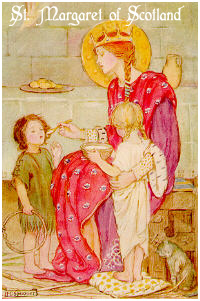
St. Margaret Queen of Scotland, Widow What it is to be a Mother Prayers for Catholic Mothers Trials in the Married State Blessings of Many Children Prayer Book: The Christian Mother A Catholic's Moral Guide to Sacramental Marriage and Family Life, Includes a Glossary of Faith and Morals for the Married and Unmarried Grant, we beseech Thee, O Lord, that we may ever honor the festival of Thy holy Martyrs Primus and Felicianus: and by their prayersmay obtain the gift of Thy protection. Through our Lord etc. (Roman Breviary) These two martyrs were brothers, and lived in Rome, toward the latter part of the third century, for many years, mutually encouraging each other in the practice of all good works. They seemed to possess nothing but for the poor, and often spent both nights and days with the confessors in their dungeons, or at the places of their torments and execution. Some they encouraged to perseverance, others, who had fallen, they raised again, and they made themselves the servants of all in Christ, that all might attain to salvation through Him. Though their zeal was most remarkable, they had escaped the dangers of many bloody persecutions, and were grown old in the heroic exercises of virtue, when it pleased God to crown their labors with a glorious martyrdom. The pagans raised so great an outcry against them that they were both apprehended and put in chains. They were inhumanly scourged, and then sent to a town twelve miles from Rome to be farther chastised, as avowed enemies to the gods. There they were cruelly tortured, first both together, afterward separately. But the grace of God strengthened them, and they were at length both beheaded on the 9th of June. Reflection.-- soul which truly loves God regards all the things of this world as nothing. The loss of goods, the disgrace of the world, torments, sickness, and other afflictions are bitter to the senses, but appear light to him that loves. If we cannot bear our trials with patience and silence, it is because we love God only in words. "One who is slothful and lukewarm complains of everything, and calls the lightest precepts hard," says Thomas Kempis |
June 11th: St. Barnabas, Apostle. 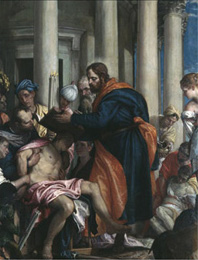
St. Barnabas, Apostle The 12 Apostles and the Apostles Creed Explained The Labor of the Apostles: Their Teaching of the Nations Queen of Apostles The Church is Apostolic Vol. 1, Part 2: The Ministry of Jesus Christ from the Latin Vulgate, as Illustrated by Catholic Artist and Historian, James Tissot, 1899 Vol. 2: Parables and Teachings of Jesus Christ from the Latin Vulgate, as Illustrated by Catholic Artist and Historian, James Tissot, 1899 O God, Who dost gladden us by the worthy deeds and availing prayers of thy blessed Apostle Barnabas, mercifully grant unto us who seek through him Thy manifold gifts, by the tenderness of Thy mercy effectually to obtain the same. Through our Lord etc. (Roman Breviary) We read that in the first days of the Church, the multitude of believers had but one heart and one soul; and none said that anything which he possessed was his own. (Acts 4:32) Amid this fervent company of Christians who practiced evangelical poverty, one only is singled out by name, Joseph, a rich Levite from Cyprus. He, having land, sold it, and bringing the price, laid it at the feet of the Apostles. They then gave him a new name, Barnabas, son of consolation. He was a good man, full of the Holy Spirit and of faith, and was soon chosen for an important mission, the rapidly growing Church of Antioch. Here he perceived the great work which was waiting to be done among the Greeks, and therefore he hastened to seek out and bring Saint Paul to Antioch, from his retirement at Tarsus. When the prophet Agabus at Antioch foretold a great universal famine, Barnabas and Paul were selected by the faithful, to take to the Church of Jerusalem their generous offerings for the poor of that city. It was also at Antioch that the two Saints were named for the apostolate of the Gentiles; and they sailed together for Cyprus and then to the cities of Asia Minor. Their preaching struck men with amazement, and some cried out, "The gods have come down to us in the likeness of men!" calling Paul Mercury, and Barnabas Jupiter. The Saints traveled together once again, to the Council of Jerusalem, and told of the "signs and wonders which God had wrought among the Gentiles" during their missionary journey. Shortly after this they separated; Barnabas with John Mark went to Cyprus, while Paul with Silas returned to Asia Minor. The tradition of Milan, Italy, reveals that Saint Barnabas went from Cyprus to Italy, and in Milan founded its church; he is still honored there as its first bishop. After seven years he consecrated Saint Anathalon to replace him, and returned to Cyprus to visit the churches. He crisscrossed the island several times to bring to every city and village the Holy Name of the Son of God. In Salamis, some of the recalcitrants plotted together to kill him. He was aware of the conspiracy; nonetheless, after foretelling to John Mark that he would die that same day, he went to the synagogue to preach as usual. It was there that he was stoned as a blasphemer, in the year 61 of our era. Saint John Mark succeeded in burying him near Salamis. |
June 12th: John Facundo, Confessor and St. Basilides and Companions, Martyrs.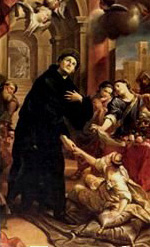 St. John of Facundo Instructions for the Catholic Family Preparation for Confession The Sacrament of Penance, All of Your Questions Answered O God, the author of peace and lover of charity, Who didst adorn blessed John Thy Confessor with a marvelous grace in reconciling enemies: grant, by his merits and intercession, that, being strengthened in Thy love, we may not be separated from Thee by any temptations. Through our Lord etc. (Roman Breviary) St. John was born at St. Fagondez, in Spain. At an early age he held several benefices in the diocese of Burgos, till the reproaches of his conscience forced him to resign them all except one chapel, where he said Mass daily, preached, and catechised. After this he studied theology at Salamanca, and then labored for some time as a most devoted missionary priest. Ultimately he became a hermit of the Augustinian Order, in the same city. There his life was marked by a singular devotion to the Holy Mass. Each night after Matins he remained in prayer till the hour of celebration, when he offered the Adorable Sacrifice with the most tender piety, often enjoying the sight of Jesus in glory, and holding sweet colloquies with Him. The power of his personal holiness was seen in his preaching, which produced a complete reformation in Salamanca. He had a special gift of reconciling differences, and was enabled to put an end to the quarrels and feuds among noblemen, at that period very common and fatal. The boldness shown by St. John in reproving vice endangered his life. A powerful noble, having been corrected by the Saint for oppressing his vassals, sent two assassins to slay him. The holiness of the Saint's aspect, however, caused by that peace which continually reigned in his soul, struck such awe into their minds that they could not execute their purpose, but humbly besought his forgiveness. And the nobleman himself, falling sick, was brought to repentance, and recovered his health by the prayers of the Saint whom he had endeavored to murder. He was also most zealous in denouncing those hideous vices which are a fruitful source of strife, and it was in defence of holy purity that he met his death. A lady of noble birth but evil life, whose companion in sin St. John had converted, contrived to administer a fatal poison to the Saint. After several months of terrible suffering, borne with unvarying patience, St. John went to his reward on June 11, 1479. Reflection--All men desire peace, but those alone enjoy it who, like St. John, are completely dead to themselves, and love to bear all things for Christ. St. Basilides and Companions, Martyrs These saints were Roman soldiers in the army of Maxentius. Upon professing Christianity, they were beheaded under the reign of Diocletian. Newly Added Catholic Book: The Marytrs of the Colisem. History of the martyrs under Diocletian are on page 309. We beseech Thee, O Lord, that the heavenly birthday of Thy holy Martyrs Basilides, Cyrianus, Nabor, and Nazarius may shine brightly upon us, and may the eternal glory which they enjoy be increased by the fruits of our devotion. Through our Lord etc. (Roman Breviary) |
June 13th: St. Anthony, Confessor and Doctor of the Church. 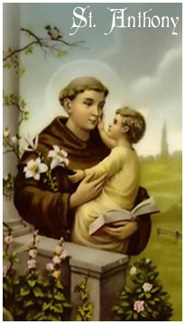 St. Anthony of Padua, Confessor and Doctor St. Anthony Additional Prayers St. Anthony of Padua, The Miracle-worker St. Anthony of Padua, Children's Page Novena to the St. Anthony of Padua: June 5th - June 13th Catholic Booklet: Devotion to St. Anthony of Padua: Novena, Litany, Chaplet and Other Approved Prayers Saints: the Gift of Miracles Grant, O Lord, that the festival of blessed Anthony Thy Confessor and Doctor, may gladden Thy Church: so that her children may ever be defended by spiritual help and may become worthy of everlasting bliss. Through our Lord etc. The Lord loved him, and adorned him. R. He clothed him with a robe of glory. Ant. O excellent Doctor, light of holy Church, blessed Anthony, lover of the divine law, pray unto the Son of God for us. This is he who wrought great things before God, and praised the Lord with his whole heart: May he intercede for the sins of all men. V. Behold a man without reproach, a true worshiper of God, keeping himself from every evil deed, and ever abiding in innocence. May he intercede for the sins of all men. This man, despising the world and triumphing over earthly things, hath laid up treasure in heaven by word and deed. (Roman Breviary) Anthony was born at Lisbon, in Portugal, of respectable parents, by whom he was piously brought up, and as a youth he joined an institute of canons regular. But, when the bodies of the five Martyrs of the friars Minor, who had, shortly before this, suffered in Morocco for the faith of Christ, were brought to Coimbra, burning with a desire for martyrdom, he went over to the Franciscan order. Presently, urged by the same desire, he proceeded on his way to the Saracens; but, suffering from ill-health, he was forced to turn back; but when the ship approached the coast of Spain, it was driven by contrary winds to Sicily. From Sicily he came to Assisi, to the general chapter. From there he went to the hermitage of Monte Paolo in Emilia, where he gave himself up for a long while to divine contemplation, fastings, and vigils. Then, when he had received sacred orders and had been sent to preach the Gospel, the wisdom and eloquence of his discourse was so noted, and excited such a great admiration of him, that once the Sovereign Pontiff, on hearing him preach, called him the Ark of the Testament. But chiefly against heresies did he put forth the whole force of his vigor, from which he gained the name of everlasting Hammer of heretics. He was the first of his order, on account of his preeminent learning, to teach sacred letters at Bologna and in other places, and he supervised the studies of his brethren. Then, having traveled through many provinces, he came, one year before his death, to Padua, where he left remarkable proofs of his holiness. One night, when St. Antony was staying with a friend in the city of Padua, his host saw brilliant rays streaming under the door of the Saint's room, and on looking through the keyhole he beheld a little Child of marvellous beauty standing upon a book which lay open upon the table, and clinging with both arms round Antony's neck. With an ineffable sweetness he watched the tender caresses of the Saint and his wondrous Visitor. At last the Child vanished, and Fra Antonio, opening the door, charged his friend, by the love of Him Whom he had seen, to "tell the vision to no man" as long as he was alive. Finally, having undergone much toil for the glory of God, famous for merits and for miracles, he fell asleep in the Lord upon the Ides of June (June 13), in the year of salvation 1231. The supreme Pontiff Gregory IX added him to the number of the holy Confessors, and Pius XII, upon consultation with the Congregation of Sacred Rites, declared him a Doctor of the universal Church. |
June 14th: St. Basil the Great, Bishop, Confessor and Doctor of the Church.
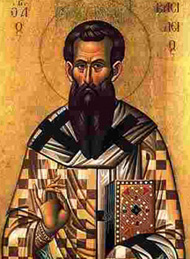
St. Basil the Great, Bishop, Confessor, and Doctor of the Church Refuting Protestant Errors of Private Interpretation A Series of Sermons in Defense of the Catholic Teaching on Oral Tradition, the Word of God, and Errors of Private Interpretation Martin Luther & the Bible What Cannot and What Can Be Reformed in the Church. What Every Christian Must Believe and Do to be Saved. Graciously hear the prayers, we beseech thee, O Lord, which we offer to Thee on the on the solemnity of blessed Basil Thy Confessor and Bishop: and as he deserved to serve thee worthily, so , by the intercession of his merits, do thou absolve us from all our sins. Through our Lord etc. The Lord loved him, and adorned him. R. He clothed him with a robe of glory. Ant. O excellent Doctor, light of holy Church, blessed Basil, lover of the divine law, pray unto the Son of God for us. Ant. This man, despising the world and triumphing over earthly things, hath laid up treasure in heaven by word and deed. V. The Lord conducted the just through the right ways. R. And showed him the kingdom of God. (Roman Breviary) St. Basil was born in Asia Minor. Two of his brothers became bishops, and, together with his mother and sister, are honored as Saints. He studied with great success at Athens, where he formed with St. Gregory Nazianzen the most tender friendship. He then taught oratory; but dreading the honors of the world, he gave up all, and became the father of the monastic life in the East. The Arian heretics, supported by the court, were then persecuting the Church; and Basil was summoned from his retirement by his bishop to give aid against them. His energy and zeal soon mitigated the disorders of the Church, and his solid and eloquent words silenced the heretics. On the death of Eusebius, he was chosen Bishop of Casarea. His commanding character, his firmness and energy, his learning and eloquence, and not less his humility and the exceeding austerity of his life, made him a model for bishops. When St. Basil was required to admit the Arians to Communion, the prefect, finding that soft words had no effect, said to him, "Are you mad, that you resist the will before which the whole world bows? Do you not dread the wrath of the emperor, nor exile, nor death?" "No," said Basil calmly; "he who has nothing to lose need not dread loss of goods; you cannot exile me, for the whole earth is my home; as for death, it would be the greatest kindness you could bestow upon me; torments cannot harm me: one blow would end my frail life and my sufferings together." "Never," said the prefect, "has any one dared to address me thus." "Perhaps," suggested Basil, "you never before measured your strength with a Christian bishop." The emperor desisted from his commands. St. Basil's whole life was one of suffering. He lived amid jealousies and misunderstandings and seeming disappointments. But he sowed the seed which bore goodly fruit in the next generation, and was God's instrument in beating back the Arian and other heretics in the East, and restoring the spirit of discipline and fervor in the Church. He died in 379, and is venerated as a Doctor of the Church. |
June 15th: Sts. Vitus, Modestus, and Crescentia, Martyrs.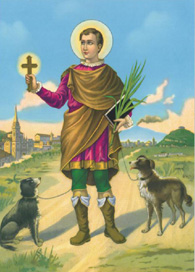 St. Vitus, Martyr and Holy Helper with Novena Catholic Book: The Marytrs of the Coliseum--Acts of St. Vitus and Companions--Page 360 - 373 14 Holy Helpers Your Guardian Angel throughout life Grant, O Lord, we beseech Thee, to Thy Church, through the intercession of Thy holy Martyrs Vitus, Modestus, and Crescentia: to forego the spirit of pride, and to proceed continually in that humility which is pleasing to Thee; so that, despising evil things, she may practice with an overflowing charity whatever is good in Thy sight. Through our Lord etc. (Roman Breviary) St. Vitus was a child nobly born, who had the happiness to instructed in the Faith, and inspired with the most perfect sentiments of his religion, by his Christian nurse, named Crescentia, and her faithful husband, Modestus. His father, Hylas, was extremely incensed when he discovered the child's invincible aversion to idolatry; and finding him not to be overcome by stripes and such like chastisements, he delivered him up to Valerian, the governor, who in vain tried all his arts to work him into compliance with his father's will and the emperor's edicts. He escaped out of their hands, and, together with Crescentia and Modestus, fled into Italy. They there met with the crown of martyrdom in Lucania, in the persecution of Diocletian. The heroic spirit of martyrdom which we admire in St. Vitus was owing to the early impressions of piety which he received from the lessons and example of a virtuous nurse. Of such infinite importance is the choice of virtuous preceptors, nurses, and servants about children. Reflection--What happiness for an infant to be formed naturally to all virtue, and for the spirit of simplicity, meekness, goodness, and piety to be moulded in its tender frame! Such a foundation being well laid, further graces are abundantly communicated, and a soul improves daily these seeds, and rises to the height of Christian virtue often without experiencing severe conflicts of the passions. |
|
June 16th: In some placed St. John Francis Regis is celebrated
St. John Francis Regis On the Mode of Teaching Christian Doctrine to Children Prayers for the Preservation of Chastity. An Explanation and Defense of the Virtue of Chastity Sermon on Keeping the 10 Commandments The Corporal Works of Mercy The Spiritual Works of Mercy How to Practice Mental Prayer On Spiritual Progress First Point.--Consider in the fervour with which the crowd congregated to hear Christ and to profit by His doctrine the earnestness with which thou shouldst strive to advance in His service, according to thy state of life. Enter into account with thyself, and consider the means and opportunities afforded thee for progressing in His service, and how little fruit thou hast derived therefrom. Weep over thy tepidity, and beg of God to give thee His Holy Spirit in order that thou mayest serve Him with fervour. Second Point.--Consider those words of Christ: "Duc in altum,"--"Launch out into the deep." Set sail, abandon the earth, and take to the high sea. These words the Lord addresses to thee, admonishing thee to ascend to greater perfection, to arise from earthly passions, and from all that the world adores, and to ascend to the heights of the Spirit, and to the summit of perfection. Remain not always in the lowest class, but advance to higher things; break the bonds of worldly affections which prevent thee from progressing; extend the sails of thy heart to the favourable wind of the Holy Spirit; take courage to run to the summit of perfection, and to live with God and for God alone. Offer thyself forthwith courageously to what is most arduous and perfect. God will assist thee, and in a short time thou wilt advance much. Third Point.--Meditate those words that the apostles addressed to Christ, "Master, we have laboured all the night and have taken nothing;" and consider in what thou hast spent thy strength and labour; and how little thou hast profited in the service of God, since thou canst in truth say, "I have laboured many years and gained nothing." And seeing thy poverty, exert thyself to employ thy strength with greater fruit henceforth; examine the causes of thy shortcomings, and bewail them before God; entreat His pardon for thy negligence, and implore grace in order to make up in the future for what thou hast lost in thy past life. Fourth Point.--Consider the very copious draught of fishes enclosed by the disciples through their obedience to Christ, and how they called their companions to aid them in their toil, and they came and helped them, and both the ships were filled with fish, securing thus great profit from their exertions. Ponder what fruit is derived from labouring in company with the virtuous, and from their exhortations, examples, and earnest labours, and draw thence desires of abiding in the society of the just, and of being assisted by their advice and examples, and of being animated by a holy emulation in the service of God. Behold the profit and progress made by others, who in a short time have far outstripped thee, and excite thyself, with the aid of God, to serve Him better, and to outstrip all others. |
June 18th: St. Ephrem the Syrian, Deacon, Confessor, and Doctor of the Church and Sts. Mark and Marcellianus, Martyrs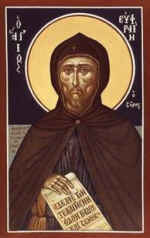
St. Ephrem the Syrian, Deacon, Confessor, and Doctor of the Church The Providence of God and why He permits evil God Will Punish You! The Corporal Works of Mercy The Spiritual Works of Mercy On Christian Self-Love O God, who hast willed to enlighten Thy Church by the wondrous learning and excellent merits of the life of blessed Ephraem Thy Confessor and Doctor: we suppliantly beseech Thee, that at his intercession Thou mayst defend it by Thy everlasting power against the snares of error and wickedness. Through our Lord etc. The Lord loved him, and adorned him. R. He clothed him with a robe of glory. O excellent Doctor, light of holy Church, blessed Ephrem, lover of the divine law, pray unto the Son of God for us. For theirs is the kingdom of heaven, who have despised the life of the world, and have attained to the rewards of the kingdom, and have washed their robes in the blood of the Lamb. (Roman Breviary for the Feast of St. Ephrem) St. Ephrem is the light and glory of the Syriac Church. A mere youth, he entered on the religious life at Nisibis, his native place. Long years of retirement taught him the science of the Saints, and then God called him to Edessa, there to teach what he had learned so well. He defended the Faith against heresies, in books which have made him known as the Prophet of the Syrians. Crowds hung upon his words. Tears used to stop his voice when he preached. He trembled and made his hearers tremble at the thought of God's judgments; but he found in compunction and humility the way to peace, and he rested with unshaken confidence in the mercy of our blessed Lord. "I am setting out," he says, speaking of his own death, "I am setting out on a journey hard and dangerous. Thee, O Son of God, I have taken for my Viaticum. When I am hungry, I will feed on Thee. The infernal fire will not venture near me, for it cannot bear the fragrance of Thy Body and Thy Blood." His hymns won the hearts of the people, drove out the hymns of the Gnostic heretics, and gained for him the title which he bears in the Syriac Liturgy to this day "the Harp of the Holy Ghost." Passionate as he was by nature, from the time he entered religion no one ever saw him angry. Abounding in labors till the last, he toiled for the suffering poor at Edessa in the famine of 378, and there lay down to die in extreme old age. What was the secret of success so various and so complete? Humility, which made him distrust himself and trust God. Till his death, he wept for the slight sins committed in the thoughtlessness of boyhood. He refused the dignity of the priesthood. "I," he told St. Basil, whom he went to see at the bidding of the Holy Spirit, "I am that Ephrem who has wandered from the path of heaven." Then bursting into tears, he cried out, "O my father, have pity on a sinful wretch, and lead me on the narrow way." Reflection--Humility is the path which leads to abiding peace and brings us near to the consolations of God. June 18th: Sts. Mark and Marcellianus, Martyrs Catholic Book: The Marytrs of the Coliseum Grant, we beseech Thee, almighty God: that we who celebrate the birthday of Thy Saints Mark and Marcellian, may through through their intercession be delivered from all the evils that are ready to fall upon us. Through our Lord etc. (Roman Breviary) Marcus and Marcellianus were twin brothers of an illustrious family in Rome, who had been converted to the Faith in their youth and were honorably married. Diocletian ascending the imperial throne in 284, the heathens raised persecutions. These martyrs were thrown into prison, and condemned to be beheaded. Their friends obtained a respite of the execution for thirty days, that they might prevail on them to worship the false gods, Tranquillinus and Martia, their afflicted heathen parents, in company with their sons' own wives and their little babes, endeavored to move them by the most tender entreaties and tears. St. Sebastian, an officer of the emperor's household, coming to Rome soon after their commitment, daily visited and encouraged them. The issue of the conferences was the happy conversion of the father, mother, and wives, also of Nicostratus, the public register, and soon after of Chromatius, the judge, who set the Saints at liberty, and, abdicating the magistracy, retired into the country. Marcus and Marcellianus were hid by a Christian officer of the household in his apartments in the palace; but they were betrayed by an apostate, and retaken. Fabian, who had succeeded Chromatius, condemned them to be bound to two pillars, with their feet nailed to the same. In this posture they remained a day and a night, and on the following day were stabbed with lances. Reflection--We know not what we are till we have been tried. It costs nothing to say we love God above all things, and to show the courage of martyrs at a distance from the danger; but that love is sincere which has stood the proof. "Persecution shows who is a hireling, and who a true pastor," says St. Bernard. |
June 19th: St. Juliana Falconieri, Virgin and Sts. Gervase and Protase, Martyrs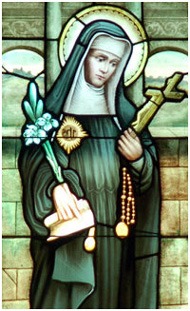 Sts. Gervase and Protase, Martyrs St. Juliana Falconieri, Virgin The Necessity of Mortification How to Fast from the Heart Mortification of the Passions Spiritual Communion Unworthy Communion O God, Who in the extremity of her sickness, didst wondrously refresh Thy blessed Virgin Juliana with the precious Body of Thy Son: grant, we beseech Thee; that, in the agony of death, we may by her intercession and merits be so strengthened and refreshed thereby, that we may attain in safety to our heavenly country. Through our Lord etc. (Roman Breviary) Saint Juliana Falconieri was born in 1270, in answer to prayer. Her father was the builder of the splendid church of the Annunziata in Florence, while her uncle, Saint Alexis Falconieri, became one of the seven Founders of the Servite Order. Under his surveillance Juliana grew up "more like an angel than a human being," as he said. Her great modesty was remarkable; never during her entire lifetime did she look at her reflection in a mirror. The mere mention of sin made her shudder and tremble, and once, on hearing of a scandal, she fainted. Her devotion to the sorrows of Our Lady drew her to the Servants of Mary or Servite Order, and at the age of fourteen, after refusing an offer of marriage, she received the habit from Saint Philip Benizi, General of the Order. Her sanctity attracted many novices, for whose direction she was bidden to draw up a rule, and thus she became foundress of the Mantellate. She was the servant of her Sisters rather than their mistress, while outside her convent she led a life of apostolic charity, converting sinners, reconciling enemies, and healing the sick. She was sometimes rapt for whole days in ecstasy, and her prayers saved the Servite Order when it was in danger of being suppressed. Saint Juliana in her old age suffered various painful illnesses. She was wasting away through a disease of the stomach which prevented her taking food, and bore her silent agony with constant cheerfulness, grieving only for the privation of Holy Communion. At last, when in her seventieth year she was at the point of death, she begged to be allowed once more to see and adore the Blessed Sacrament. It was brought to her cell and reverently laid on a corporal, which was placed over her heart. At this moment she expired, and the Sacred Host disappeared. After her death the form of the Host was found stamped upon her heart, at the exact spot over which the Blessed Sacrament had been placed. Saint Juliana died in her convent in Florence in 1340. Miracles have been frequently effected through her intercession. June 19th: Sts. Gervase and Protase, Martyrs Litany of the Saints O God, Who dost gladden us by the annual feast of Thy holy Martyrs, Gervase and Protase, mercifully grant that we who rejoice in their merits may be inspired by their examples. Through our Lord etc. (Roman Breviary) Gervase and Protase were the sons of Vitalis and Valeria, who both testified even unto death, for the Lord Christ's sake, by martyrdom--the father at Ravenna, and the mother at Milan. After the victory of their parents. Gervase and Protase gave all their inheritance to the poor, and set free their slaves. This act of theirs stirred up against them savage hatred, on the part of the heathen priests, and when the Count Astasius was about setting forth to war, they believed they had got a good occasion for the destruction of the two holy brethren. They persuaded Astasius that their gods had revealed to them that he had chance of conquering in the war, unless he had first made Gervase and Protase to deny Christ, and to offer sacrifice to the gods. Being commanded so to do, they refused with horror, and Astasius then ordered Gervase to be beaten with rods until he died under the stripes, and Protase to be beaten with clubs, and his head to be struck off. A servant of Christ named Philip took away their dead bodies by stealth and buried them in his own house; and in after times, St. Ambrose, being warned of God, found them, and bestowed them in a hallowed and honourable place. They suffered at Milan, on the thirteenth of the kalends of July. |
June 20th: St. Silverius, Pope and Martyr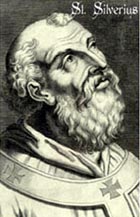
Daily June Meditations in Honor of the Sacred Heart of Jesus Short Sermons: Man's Need of God June 20th: St. Silverius, Pope and Martyr O eternal Shepherd, watch over the peace of Thy flock, and through blessed Silverius, Thy Martyr and Sovereign Pontiff, whom thou didst appoint shepherd over the whole Church, keep her under Thy constant protection. Through our Lord etc. This Saint hath striven for the law of his God even unto death, and hath not feared for words of the ungodly; for he had been founded upon a firm rock. V. Thou hast crowned him with glory and honor, O Lord. R. And hast set him over the works of Thy hands. (Roman Breviary) From the Liturgical Year, but Dom Gueranger Silverius was a native of Campania, and succeeded Agapitus in the Papacy. His doctrine and holiness shone forth in his pursuing of heretics; and his strength of soul, in his firmness regarding the upholding of the sentence passed by Agapitus. Agapitus had deposed Anthimus, from the Patriarchate of Constantinople for defending the heresy of Eutyches; and Silverius would never allow of his restoration, although the Empress Theodora repeatedly asked him to do so. The woman was enraged at him, on this account, and ordered Belisarius to send Silverius into exile. He was accordingly banished to the Island of Ponza, whence, it is said, he wrote these words to Bishop Amator: "I am fed upon the bread of tribulation, and the water of affliction, but nevertheless, I have not given up, and I will not give up, doing my duty." Soon indeed, worn out by grief and suffering, he slept in the Lord, on the twelfth of the Kalends of July: His body being taken to Rome, was laid in the Vatican Basilica and was made illustrious by numerous miracles. He ruled the Church for more than three years, and ordained in the month of December, thirteen priests, five deacons, and nineteen bishops for divers sees. Practical Consideration by Fr. Weninger The holy Pope Silverius is innocently accused of a great crime, expelled form the papal chair and sent into banishment, where he remains in suffering until his death. Theodora, however, the wicked Empress, lives long and in great honors, enjoys peacefully the pleasures of the world, possesses the imperial crown and reigns undisturbed. What was, however, the end of each, and how are they now placed in Eternity? St. Silverius died in exile, but thence, went into his heavenly home, where, for his patience and constancy, he received an eternal reward, which he will evermore enjoy. Theodora, on the contraty, was excommunicated by the successor of St. Silverius and thus banished from the Catholic Church. Soon after, she died most miserably, without being, so far as it is known, reconciled with God and the true Church; from which we can only conclude that she received her deserved punishment in hell, which will never cease. Learn from this, how the patient suffering of a servant of God, and also how the temporal happiness of the wicked end. Learn from it, further, that you may consider yourself happy, if you, while diligently seeking to serve God, endure great suffering. Your suffering will soon end, and you will be recompensed by a happy eternity, if, like St. Silverius, you bear your trials patiently. Most unhappy, however, are those who, while they have nothing to suffer, but live surrounded by honors, and all the pleasures that wealth can give, lead a wicked life; for this temporal happiness soon passes away, leaving them nothing but an eternity of misery. Hence, St. Augustine says rightly: "Nothing is more unhappy than the happiness of sinners; for it strenthens them in their wickedness and leads them towards hell." "It is a foreboding of evil, when a sinner's days are never clouded," writes St. Bonaventure. "The sinners who are not punished by God in this world, sink deepest into everlasting destruction," says St. Gregory. "Hence, envy not the temporal happiness of the wicked," writes St. Peter Damian, "but pity them because they are fattened like animals, to be led to the slaughter. Suffer patienclty, if you have trials and esteem it a good sign. God, by this means, will make you eternally happy in heaven. |
June 21st: St. Aloysius Gonzaga, Confessor and Patron of Youth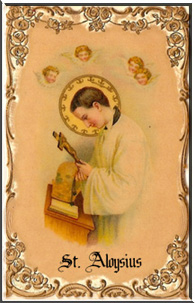 St. Aloysius Gonzaga, Confessor: Prayers and Devotions St. Aloysius Additional Prayers with Novena The Life of St. Aloysius Gonzaga of the Society of Jesus for the Youth of America The Life of St. Aloysius Feast Day of St. Aloysius Gonzaga, Children's Sermon Prayers for the Preservation of Chastity. An Explanation and Defense of the Virtue of Chastity Holy Purity Part 1 of 3 on the Vice of Lust: The Folly of Impure Desires of Sensual Pleasures Part 2 of 3 on the Vice of Lust: The Incurableness of Impurity Part 3 of 3 on the Vice of Lust: The Anger of God Against the Vice of Impurity The 6th Commandment Moral Teaching on Unchaste Thoughts and Desires The Ravages of Adultery Related Links to Resisting the Devil and Temptation to Impurity Part 12: Resisting the Enemies of Our Salvation St. Michael/ Exorcism To fight against Satan, The Medal or Cross of St. Benedict, by Prosper Gueranger June Meditations in Honor of the Sacred Heart of Jesus O God, the giver of heavenly gifts, who in the angelic youth Aloysius didst unite wonderful innocence of life with an equal severity of penance: grant, through his merits and prayers, that we who have failed to follow the example of his innocence may imitate his practice of penance. Through our Lord etc. (Roman Breviary) Aloysius, the eldest son of Ferdinand Gonzaga, Marquis of Castiglione, was born on the 9th of March, 1568. The first words he pronounced were the holy names of Jesus and Mary. When he was nine years of age he made a vow of perpetual virginity, and by a special grace was ever exempted from temptations against purity. He received his first Communion at the hands of St. Charles Borromeo. At an early age he resolved to leave the world, and in a vision was directed by our blessed Lady to join the Society of Jesus. The Saint's mother rejoiced on learning his determination to become a religious, but his father for three years refused his consent. At length St. Aloysius obtained permission to enter the novitiate on the 25th of November, 1585. He took his vows after two years, and went through the ordinary course of philosophy and theology. He was wont to say he doubted whether without penance grace would continue to make head against I nature, which, when not afflicted and chastised, tends gradually to relapse into its old state, losing the habit of suffering acquired by the labor of years. "I am a crooked piece of iron," he said, "and am come into religion to be made straight by the hammer of mortification and penance." During his last year of theology a malignant fever broke out in Rome; the Saint offered himself for the service of the sick, and he was accepted for the dangerous duty. Several of the brothers caught the fever, and Aloysius was of the number. He was brought to the point of death, but recovered, only to fall, however, into slow fever, which carried him off after three months. He died, repeating the Holy Name, a little after midnight between the 20th and 21st of June, on the octave-day of Corpus Christi, being Prather more than twenty-three years of age. Reflection--Cardinal Bellarmine, the Saint's confessor, testified that he had never mortally offended God. Yet he chastised his body rigorously, rose at night to pray, and shed many tears for his sins. Pray that, not having followed his innocence, you may yet imitate his penance. |
June 22nd: St. Paulinus, Bishop and Confessor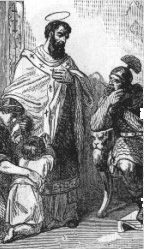
St. Paulinus, Bishop and Confessor The Corporal Works of Mercy The Spiritual Works of Mercy Trusting in God June Meditations in Honor of the Sacred Heart of Jesus O God, who hast promised a hundredfold hereafter and life everlasting to those who leave all things in this world for Thy sake: grant in Thy mercy, that we mayh follow in the footsteps of the holy bishop Paulinus and may learn to despise the things of this world and desire only those of heaven: Who livest etc. (Roman Breviary) Paulinus was of a family which boasted of a long line of senators, prefects, and consuls. He was educated with great care, and his genius and eloquence, in prose and verse, were the admiration of St. Jerome and St. Augustine. He had more than doubled his wealth by marriage, and was one of the foremost men of his time. Though he was the chosen friend of Saints, and had a great devotion to St. Felix of Nola, he was still only a catechumen, trying to serve two masters. But God drew him to Himself along the way of sorrows and trials. He received baptism, withdrew into Spain to be alone, and then, in consort with his holy wife, sold all their vast estates in various parts of the empire, distributing their proceeds so prudently that St. Jerome says East and West were filled with his alms. He was then ordained priest, and retired to Nola in Campania. There he rebuilt the Church of St. Felix with great magnificence, and served it night and day, living a life of extreme abstinence and toil. In 409 he was chosen bishop, and for more than thirty years so ruled as to be conspicuous in an age blessed with many great and wise bishops. St. Gregory the Great tells us that when the Vandals of Africa had made a descent on Campania, Paulinus spent all he had in relieving the distress of his people and redeeming them from slavery. At last there came a poor widow; her only son had been carried off by the son-in-law of the Vandal king. "Such as I have I give thee," said the Saint to her; "we will go to Africa, and I will give myself for your son." Having overborne her resistance, they went, and Paulinus was accepted in place of the widow's son, and employed as gardener. After a time the king found out, by divine interposition, that his son-in-law's slave was the great Bishop of Nola. He at once set him free, granting him also the freedom of all the townsmen of Nola who were in slavery. One who knew him well says he was meek as Moses, priestlike as Aaron, innocent as Samuel, tender as David, wise as Solomon, apostolic as Peter, loving as John, cautious as Thomas, keen-sighted as Stephen, fervent as Apollos. He died in 431. Reflection--"Go to Campania," writes St. Augustine; "there study Paulinus, that choice servant of God. With what generosity, with what still greater humility, he has flung from him the burden of this world's grandeurs to take on him the yoke of Christ, and in His service how serene and unobtrusive his life!" |
June 23th: Vigil of the Nativity of St. John the Baptist
June Meditations in Honor of the Sacred Heart of Jesus Grant, we beseech thee, almighty God: that thy servants may walk in the way of salvation, and by following the admonitions of the forerunner blessed John, may surely come to him whom he foretold, our Lord Jesus Christ, thy Son: Who liveth etc. Well done, thou good and faithful servant, because thou hast been faithful over a few things, I will place thee over many things, saith the Lord. (Roman Breviary) Homily on St. John the Baptist by St. Ambrose Divine Scripture teaches us that we should praise the lives not only of those who are publicly honored, but also the lives of their parents; in order that, as it were, the transmitted heritage of spotless purity may stand out in those whom we wish to praise. For what other intention had the holy Evangelist in this place but to glorify St. John the Baptist in his parents, as in his miracles, his manner of life, his gifts, and his sufferings? So also Anna is praised, the mother of holy Samuel; so did Isaac receive from his parents that nobility of goodness, which he bequeathed to his descendants. Therefore the priest Zachary was not only a priest, but even of the course of Abia, that is, of a house distinguished among the noble families. And his wife, says he, was of the daughters of Aaron. Therefore the nobility of St. John was inherited not only from his parents, but also from ancestors not distinguished by worldly power, but by a venerable religious succession. For it was fitting that the forerunner of Christ should have such ancestors; that it might be evident that the preaching of faith in the coming of the Lord was not a gift suddenly received, but one inherited from his ancestors, and implanted in him by the very law of nature. And they were, says he, both just before God, walking blamelessly in all the commandments and ordinances of the Lord. What do they make of this who, to show some excuse for their own sins, think that man cannot live without sinning often; and make use of the verse, which is written in Job; No man is pure from sin even though his life on earth be but for one day? We must answer such persons, first by asking what they mean by a man without sin: whether he is a man who has never sinned, or one who has stopped sinning. For if, by a man without sin, they mean one who has never sinned, I agree with them. For all have sinned, and are without the glory of God. But if they deny that he who has amended his old fault, and has changed his way of life, in order to refrain from sin, cannot keep from sins, I cannot concur in their opinion, since we read that: The Lord so loved the Church, that he might present it to himself a glorious one, not having spot or wrinkle or any such thing: but that it should be holy and without blemish. |
June 24th: Birthday of St. John the Baptist
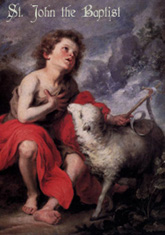 Novena to the St. John the Baptist: June 16th - June 24th The Nativity of St. John the Baptist I. The Nativity of St. John the Baptist II. Instructions on the Nativity of St. John the Baptist Children's Sermon for the Nativity of St. John the Baptist Bishop Challoner: Reflection on the Nativity of St. John the Baptist O God, Who hast made this present day full of honor to us in the birth of blessed John: give to Thy people the grace of spiritual joys, and guide the souls of all the faithful into the way of everlasting salvation. Through our Lord etc. (Roman Breviary) The birth of St. John was foretold by an angel of the Lord to his father, Zachary, who was offering incense in the Temple. It was the office of St. John to prepare the way for Christ, and before he was born into the world he began to live for the Incarnate God. Even in the womb he knew the presence of Jesus and of Mary, and he leaped with joy at the glad coming of the son of man. In his youth he remained hidden, because He for Whom he waited was hidden also. But before Christ's public life began, a divine impulse led St. John into the desert; there, with locusts for his food and haircloth on his skin, in silence and in prayer, he chastened his own soul. Then, as crowds broke in upon his solitude, he warned them to flee from the wrath to come, and gave them the baptism of penance, while they confessed their sins. At last there stood in the crowd One Whom St. John did not know, till a voice within told him that it was his Lord. With the baptism of St. John, Christ began His penance for the sins of His people, and St. John saw the Holy Ghost descend in bodily form upon Him. Then the Saint's work was done. He had but to point his own disciples to the Lamb, he had but to decrease as Christ increased. He saw all men leave him and go after Christ. "I told you," he said, "that I am not the Christ. The friend of the Bridegroom rejoiceth because of the Bridegroom's voice. This my joy therefore is fulfilled." St. John had been cast into the fortress of Machaerus by a worthless tyrant whose crimes be had rebuked, and he was to remain there till he was beheaded, at the will of a girl who danced before this wretched king. In this time of despair, if St. John could have known despair, some of his old disciples visited him. St. John did not speak to them of himself, but he sent them to Christ, that they might see the proofs of His mission. Then the Eternal Truth pronounced the panegyric of the Saint who had lived and breathed for Him alone: "Verily I say unto you, Among them that are born of women there hath not risen a greater than John the Baptist" Reflection--St. John was great before God because he forgot himself and lived for Jesus Christ, Who is the source of all greatness. Remember that you are nothing; your own will and your own desires can only lead to misery and sin. Therefore sacrifice every day some one of your natural inclinations to the Sacred Heart of Our Lord, and learn little by little to lose yourself in Him. |
June 25th: St. William, Abbot. Within the Octave of the Nativity of St. John the Baptist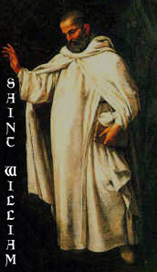
St. Willaim, Abbot by Prosper Gueranger On the Vanity of the World On Vainglory and Prescriptions Against It St. William, Abbot O God, Who, to help our weakness, has given us Thy Saints to be our example and protection in the way of salvation: grant to us that we may so venerate the merits of the blessed Abbot William, that we may both gain his prayers and follow in his footsteps. Through our Lord etc. (Roman Breviary) St. William, having lost his father and mother in his infancy, was brought up by his friends in great sentiments of piety; and at fifteen years of age, out of an earnest desire to lead a penitential life, he left Piedmont, his native country, made an austere pilgrimage to St. James's in Galicia, and afterward retired into the kingdom of Naples, where he chose for his abode a desert mountain, and lived in perpetual contemplation and the exercises of most rigorous penitential austerities. Finding himself discovered and his contemplation interrupted, he changed his habitation and settled in a place called Monte-Vergine, situated between Nola and Benevento, in the same kingdom; but his reputation followed him, and he was obliged by two neighboring priests to permit certain fervent persons to live with him and to imitate his ascetic practices. Thus, in 1119, was laid the foundation of the religious congregation called de Monte-Vergine. The Saint died on the 25th of June, 1142. |
June 26th: Sts. John and Paul, Martyrs
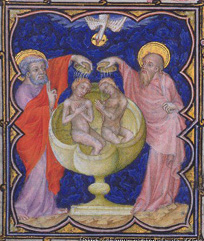
June 26th: Sts. John and Paul, Martyrs Grant, we beseech thee almighty God: that we may receive twofold joy on this day's festival of the triump of blessed John and Paul; whom the same faith and the same martyrdom made to be truly brethren. Through out Lord etc. (Roman Breviary) These two Saints were both officers in the army under Julian the Apostate, and received the crown of martyrdom, probably in 362. They glorified God by a double victory; they despised the honors of the world, and triumphed over its threats and torments. They saw many wicked men prosper in their impiety, but were not dazzled by their example. They considered that worldly prosperity which attends impunity in sin is the most dreadful of all judgments; and how false and short-lived was this glittering prosperity of Julian, who in a moment fell into the pit which he himself had dug! But the martyrs, by the momentary labor of their conflict, purchased an immense weight of never-fading glory; their torments were, by their heroic patience and invincible virtue and fidelity, a spectacle worthy of God, Who looked down upon them from the throne of His glory, and held His arm stretched out to strengthen them, and to put on their heads immortal crowns in the happy moment of their victory. Reflection--The Saints always accounted that they had done nothing for Christ so long as they had not resisted to blood, and by pouring forth the last drop completed their sacrifice. Every action of our lives ought to spring from this fervent motive, and we should consecrate ourselves to the divine service with our whole strength; we must always bear in mind that we owe to God all that we are, and, after all we can do, are unprofitable servants, and do only what we are bound to do. 
A Prayer to the Holy Martyrs to obtain their Protection O ye blessed Princes of the heavenly kingdom! ye who sacrificed to the Almighty God the honors, the riches, and possessions of this life, and have received in return the unfading glory and never-ending joys of heaven! ye who are secure in the everlasting possession of the brilliant crown of glory which your sufferings have obtained! look with compassionate regards upon our wretched state in this valley of tears, where we groan in the uncertainty of what may be our eternal destiny. And from that divine Saviour, for whom you suffered so many torments, and who now repays you with so unspeakable glory, obtain for us that we may love Him with all our heart, and receive in return the grace of perfect resignation under the trials of this life, fortitude under the temptations of the enemy, and perseverance to the end. May your powerful intercession obtain for us that we may one day in your blessed company sing the praises of the Eternal, and, even as you now do, face to face, enjoy the beatitude of His vision! |
In Some Places the Feast Day of Our Lady of Perpetual Help
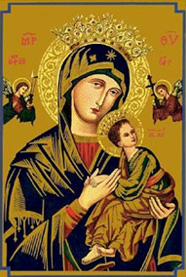
Mary, thou refuge of sinners, full of grace, pray for us, that God may give us the light to recognize fully the evil of sin, and to avoid it for evermore! The Novena to Our Mother of Perpetual Help--which can be found on the link below--can also be said anytime throughout the year. June 27th is the Feast of Our Lady of Perpetual Help. Novena to Our Lady of Perpetual Help Our Lady of Perpetual Help The Influence of Mary on Modern Civilization and Prayers of Petition to Our Lady True Devotion to the Blessed Virgin Mary by St. Louis Marie de Monfort |
June 28th: St. Irenaeus, Bishop and Martyr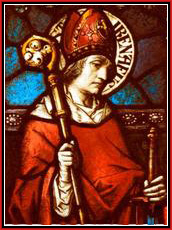
St. Irenaeus Bishop and Martyr What is Liberalism What Cannot and What Can Be Reformed in the Church. What Every Christian Must Believe and Do to be Saved. No Salvation Outside the Catholic Church Litany of Faith and the Necessity of the Catholic Faith for Salvation St. Francis of Assisi: Prophesies of Great Schisms and Tribulations in the Church. O God, by whose gift it was that blessed Irenaeus Thy Bishop should both fight against heresy with the weapon of true doctrine, and also establish peace in the Church: give to Thy people, we beseech Thee, constancy in their holy religion; and grant us Thy peace in our days. Through our Lord etc. V. Thou hast crowned him with glory and honor, O Lord. R. And hast set him over the works of Thy hands. Ant. This Saint hath striven for the law of his God even unto death, and hath not feared for the words of the ungodly; for he had been founded upon a firm rock. Grant, we beseech Thee, almighty God: that we who are keeping the festival of blessed Irenaeus, Thy Martyr, may through his intercession be strengthened in the love of Thy name. Through out Lord etc. (Roman Breviary) This Saint was born about the year 120. He was a Grecian, probably a native of Lesser Asia. His parents, who were Christians, placed him under the care of the great St. Polycarp, Bishop of Smyrna. It was in so holy a school that he learned that sacred science which rendered him afterward a great ornament of the Church and the terror of her enemies. St. Polycarp cultivated his rising genius, and formed his mind to piety by precepts and example; and the zealous scholar was careful to reap all the advantages which were offered him by the happiness of such a master. Such was his veneration for his tutor's sanctity that he observed every action and whatever be saw in that holy man, the better to copy his example and learn his spirit. He listened to his instructions with an insatiable ardor, and so deeply did he engrave them on his heart that the impressions remained most lively even to his old age. In order to confute the heresies of his age, this father made himself acquainted with the most absurd conceits of their philosophers, by which means he was qualified to trace up every error to its sources and set it in its full light. St. Polycarp sent St. Irenaeus into Gaul, in company with some priest; he was himself ordained priest of the Church of Lyons by St. Pothinus. St. Pothinus having glorified God by his happy death, in the year 177, our Saint was chosen the second Bishop of Lyons. By his preaching, he in a short time converted almost that whole country to the Faith. He wrote several works against heresy, and at last, with many others, suffered martyrdom about the year 202, under the Emperor Severus, at Lyons. Reflection--Fathers and mothers, and heads of families, spiritual and temporal, should bear in mind that inferiors "will not be corrected by words" alone, but that example is likewise needful. |
June 29th: Sts. Peter and Paul, Apostles
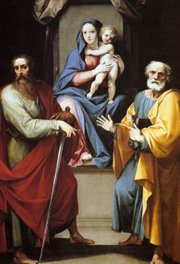
Devotions to Sts. Peter and Paul St. Peter and St. Paul Sermons by Fr. Weninger Instructions on the Feast of Ss. Peter and Paul, Apostles Short Reflection: On St. Peter and St. Paul The Lives of the 12 Apostles and St. Paul: The Apostles Creed The Labor of the Apostles: Their Teaching of the Nations Vol. 1, Part 2: The Ministry of Jesus Christ from the Latin Vulgate, as Illustrated by Catholic Artist and Historian, James Tissot, 1899 Vol. 2: Parables and Teachings of Jesus Christ from the Latin Vulgate, as Illustrated by Catholic Artist and Historian, James Tissot, 1899 The Church The Church is One The Church is Holy The Church is Catholic The Church is Apostolic What Cannot and What Can Be Reformed in the Church. What Every Christian Must Believe and Do to be Saved. O God, Who has made this day holy by the martyrdom of Thy Apostles Peter and Paul: grant unto Thy Church, that as from them she first received the faith, so she may in all things follow their holy precepts. Through out Lord etc. (Roman Breviary) St. Peter was of Bethsaida in Galilee, and as he was fishing on the lake was called by Our Lord to be one of His apostles. He was poor and unlearned, but candid, eager, and loving. In his heart, first of all, grew up the conviction, and from his lips came the confession, "Thou art the Christ, the Son of the living God;" and so Our Lord chose him, and fitted him to be the Rock of His Church, His Vicar on earth, the head and prince of His apostles, the centre and very principle of the Church's oneness, the source of all spiritual powers, and the unerring teacher of His truth. All Scripture is alive with him; but after Pentecost he stands out in the full grandeur of his office. He fills the vacant apostolic throne; admits the Jews by thousands into the fold; opens it to the Gentiles in the person of Cornelius; founds, and for a time rules, the Church at Antioch, and sends Mark to found that of Alexandria. Ten years after the Ascension he went to Rome, the centre of the majestic Roman Empire, where were gathered the glories and the wealth of the earth and all the powers of evil. There he established his Chair, and for twenty-five years labored with St. Paul in building up the great Roman Church. He was crucified by order of Nero, and buried on the Vatican Hill. He wrote two Epistles, and suggested and approved the Gospel of St. Mark. Two hundred and sixty years after St. Peter's martyrdom came the open triumph of the Church. Pope St. Sylvester, with bishops and clergy and the whole body of the faithful, went through Rome in procession to the Vatican Hill, singing the praises of God till the seven hills rang again. The first Christian emperor, laying aside his diadem and his robes of state, began to dig the foundations of St. Peter's Church. And now on the site of that old church stands the noblest temple ever raised by man; beneath a towering canopy lie the great apostles, in death, as in life, undivided; and there is the Chair of St. Peter. All around rest the martyrs of Christ' Popes, Saints, Doctors, from east and west and high over all, the words, "Thou art Peter, and on this Rock I will build My Church." It is the threshold of the apostles and the centre of the world. St. Paul was born at Tarsus, of Jewish parents, and studied at Jerusalem, at the feet of Gamaliel. While still a young man, he held the clothes of those who stoned the proto-martyr Stephen; and in his restless zeal he pressed on to Damascus, "breathing out threatenings and slaughter against the disciples of Christ." But near Damascus a light from heaven struck him to the earth. He heard a voice which said, "Why persecutest thou Me? "He saw the form of Him Who had been crucified for his sins, and then for three days he saw nothing more. He awoke another man--a new creature in Jesus Christ. He left Damascus for a long retreat in Arabia, and then, at the call of God, he carried the Gospel to the uttermost limits of the world, and for years he lived and labored with no thought but the thought of Christ crucified, no desire but to spend and be spent for Him. He became the apostle of the Gentiles, whom he had been taught to hate, and wished himself anathema for his own countrymen, who sought his life. Perils by land and sea could not damp his courage, nor toil and suffering and age dull the tenderness of his heart. At last he gave blood for blood. In his youth he had imbibed the false zeal of the Pharisees at Jerusalem, the holy city of the former dispensation. With St. Peter he consecrated Rome, our holy city, by his martyrdom, and poured into its Church all his doctrine with all his blood. He left fourteen Epistles, which have been a fountain-head of the Church's doctrine, the consolation and delight of her greatest Saints. His interior life, so far as words can tell it, lies open before us in these divine writings, the life of one who has died forever to himself and risen again in Jesus Christ. "In what," says St. Chrysostom, "in what did this blessed one gain an advantage over the other apostles? How comes it that he lives in all men's mouths throughout the world? Is it not through the virtue of his Epistles?" Nor will his work cease while the race of man continues. Even now, like a most chivalrous knight, he stands in our midst, and takes captive every thought to the obedience of Christ. Hymn: Beate Pastor, Petre Peter, blest Shepherd, hearken to our cry, And with a word unloose our guilty chain; Thou! who hast power to ope the gates on high To men below, and power to shut them fast again. Lead us, great teacher Paul, in wisdom's ways, And lift our hearts with thine to heaven's high throne; Till faith beholds the clear meridian blaze; And sunlike in the soul reigns charity alone. Praise, blessing, majesty, through endless days, Be to the Trinity immortal given; Who in pure unity profoundly sways Eternally alike all things in earth and heaven. |
June 30th: Commemoration of St. Paul, Apostle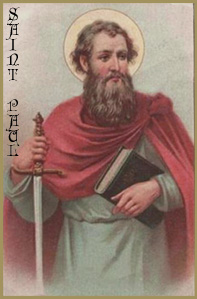 Prayers and Devotions to St. Paul Catholic Book: The Story of the Acts of the Apostles Commemoration of St. Paul St. Peter and St. Paul Sermons by Fr. Weninger Short Reflection: On St. Peter and St. Paul Conversion of St. Paul Epistle and Gospel: Conversion of St. Paul The Lives of the 12 Apostles and St. Paul: The Apostles Creed The Labor of the Apostles: Their Teaching of the Nations A Series of Sermons in Defense of the Catholic Teaching on Oral Tradition, the Word of God, and Errors of Private Interpretation Refuting Protestant Errors of Private Interpretation Are we bound to profess our Catholic Faith openly? What Cannot and What Can Be Reformed in the Church. What Every Christian Must Believe and Do to be Saved. How Catholics lose the Faith by Fr. Michael Muller The Catholic Church's Teaching on Justification Litany of Faith and the Necessity of the Catholic Faith for Salvation O God, Who by the preaching of the blessed Apostle Paul didst teach the multitude of the Gentiles: grant, we beseech Thee, that we who keep his festival may also enjoy his patronage. Through out Lord etc. Thou art a vessel of election, O holy Apostle Paul, a preacher of the turth to the whole world, through whom all nations have known the grace of God. V. Intercede for us with God, who chose thee. Saul, who is also called Paul, was made a great preacher, and being strengthened by God, he increased in power, and confounded the Jews. I have fought the good fight, I have finished the course, I have kept the faith. For the rest, there is laid up for me a crown of justice, which the Lord, the just Judge, will give to me in that day. (Roman Breviary) Hymn: Egregie Doctor O great Apostle Paul, may thy deep wisdom teach our earth-bound souls to strive with thee the skies to reach; Till that which perfect is shall shine with fuller glow, And that be done away, which here in part we know. All honor, might, and power, and hymns of joy we bring, While to the Trinity eternal praise we sing; He rules the universe in wondrous unity, And shall, throughout the days of all eternity. Amen Faith alone is not sufficient for Salvation It must be a living faith; that is, we must add to it good works and must be ready to confess it openly. A living faith is one which produces works pleasing to God. Our Lord says "Not every one who saith to Me, Lord, Lord, shall enter into the kingdom of heaven, but he that doth the will of My Father Who is in heaven" (Matt. vii. 21). He who has done no works of mercy will be condemned at the judgment (Matt. xxv. 41). Such a one is like the devils, who believe and disobey (James. ii. 19). "As the body without the spirit is dead, so faith without works is dead also" (James. ii. 26). Faith without works is like a tree without fruit, or like a lamp without oil. The foolish virgins had faith, but no works. Good works, such as are necessary for salvation, can only be performed by one who is in possession of sanctifying grace, and loves God in his heart. Hence St. Paul says, "If I should have all faith, so that I could remove mountains and have not charity, I am nothing" (1 Cor. xiii. 2). We must also be ready to confess our faith. "With the heart we believe unto justice; and with the mouth confession is made unto salvation" (Rom. x. 10). Man consists of body and soul, and therefore must honor God, not only inwardly, but else outwardly. Christ promises the kingdom of heaven only to those who confess Him before men (Matt. x. 32). |
July 1st: The Most Precious Blood. Octave Day of the Sacred Heart of Jesus. First Friday.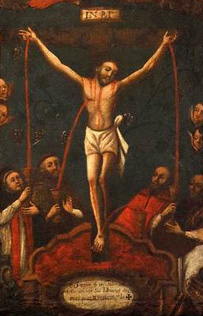 The Enthronement of the Sacred Heart of Jesus Consecration of Children to the Sacred Heart of Jesus First Friday Devotions On Preparing the Soul for the Holy Ghost On the Disposition Necessary for Receiving the Holy Ghost The Most Precious Blood Purchased by His Blood The Sacred Passion of Jesus Christ by Rev. Clarke, 1889 Novena of the Most Precious Blood of Jesus Importance of Salvation and the Feast of the Most Precious Blood July Meditations in Honor of the Precious Blood 7 Sheddings of Our Lord's Blood Devotion to the Five Wounds of Jesus Clock of the Passion Stations of the Cross The Short Method of the Stations of the Cross The Holy Hour The Psalter of Jesus Sorrowful Mysteries Litany of the Holy Cross Catholic Video: O Sacred Head Surrounded Almighty, everlasting God, Who didst appoint Thy only-begotten Son to be the Redeemer of the world, and didst vouchsafe to be appeased by the shedding of His Blood: grant, we beseech thee, that by our solemn service we may so honor what He paid as the price of our redemption, and by its virtue may be so defended while on earthy from the evils of this present life, that we may enjoy its fruit for evermore in heaven. Through out Lord etc. If the blood of goats and bulls and the sprinkled ashes of a heifer sanctify the unclean unto the cleansing of the flesh, how much more will the blood of Christ, who through the Holy Spirit offered himself unblemished unto God, cleanse your conscience from dead works to serve the living God?--Heb. 9, 13-14 (Roman Breviary) Hymn: Ira justa Conditoris He who once, in righteous vengeance, Whelmed the world beneath the Flood, Once again in mercy cleansed it With the stream of His own Blood, Coming from His throne on high On the painful Cross to die. Blest with this all-saving shower, Earth her beauty straight resumed; In the place of thorns and briars, Myrtles sprang, and roses bloomed: Bitter wormwood of the waste Into honey changed its taste. Scorpions ceased; the slimy serpent Laid his deadly poison by; Savage beasts of cruel instinct Lost their wild ferocity; Welcoming the gentle reign Of the Lamb for sinners slain. Oh, the wisdom of th' eternal! Oh, its depth and height divine! Oh, the sweetness of that mercy Which in Jesus Christ doth shine! Slaves we were condemned to die! Our King pays the penalty! When before the Judge we tremble, Conscious of His broken laws, May this Blood, in that dread hour, Cry aloud, and plead our cause; Bid our guilty terrors cease, Be our pardon and our peace. Prince and Author of Salvation! Lord of majesty supreme! Jesu, praise to Thee be given By the world Thou didst redeem; Who with the Father and the Spirit, Reignest in eternal merit. Prayer to Jesus We therefore pray Thee, help Thy servants: whom Thou hast redeemed with Thy Precious Blood. Amen (Indulgence of 300 days [215]) Prayer to the Eternal Father Eternal Father, I offer Thee the Most Precious Blood of Jesus Christ in atonement for my sins, and in supplication for the holy souls in purgatory and for the needs of the holy Church. Amen (Indulgence of 500 days [219]) Petition Lord Jesus Christ, Who camest down from heaven to earth from the bosom of the Father, and didst shed Thy Precious Blood for the remission of our sins: We humbly beseech Thee, that in the day of judgment we may deserve to hear, standing at Thy right hand: "Come, ye blessed," Who livest and reignest for ever and ever. Amen. (Roman Missal) |
July 2nd: The Visitation and First Saturday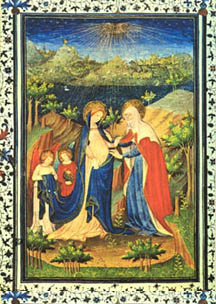 Visitation of the Blessed Virgin Mary The Visitation and Magnificat: Epistle and Gospel On the Visitation of the Blessed Virgin Mary Joyful Mysteries The Life of the Blessed Virgin Mary as Set Forth in Her Titles from the Litany of Loreto The Dogma of the Incarnation Rests on the Divine Maternity of the Blessed Virgin Mary In Defense of Mary The Mother of God Vouchsafe, O Lord, we beseech Thee, to us Thy servants the gift of Thy heavenly grace: that as in the childbirth of the Blessed Virgin our salvation began, so from the solemn festival of her Visitation we may obtain increase of peace. Through out Lord etc. (Roman Breviary) The angel Gabriel, in the mystery of the Annunciation, informed the Mother of God that her cousin Elizabeth had miraculously conceived, and was then pregnant with a son who was to be the precursor of the Messias. The Blessed Virgin out of humility concealed the wonderful dignity to which she was raised by the incarnation of the Son of God in her womb, but, in the transport of her holy joy and gratitude, determined she would go to congratulate the mother of the Baptist. "Mary therefore arose," saith St. Luke, "and with haste went into the hilly country into a city of Judea, and entering into the house of Zachary, saluted Elizabeth." What a blessing did the presence of the God-man bring to this house, the first which He honored in His humanity with His visit! But Mary is the instrument and means by which He imparts to it His divine benediction, to show us that she is a channel through which He delights to communicate to us His graces, and to en, courage us to ask them of Him through her intercession. At the voice of the Mother of God, but by the power and grace of her divine Son in her womb, Elizabeth was filled with the Holy Ghost, and the Infant in her womb conceived so great a joy as to leap and exult. At the same time Elizabeth was filled with the Holy Ghost, and by His infused light she understood the great mystery of the Incarnation which God had wrought in Mary, whom humility prevented from disclosing it even to a Saint, and an intimate friend. In raptures of astonishment Elizabeth pronounced her blessed above all other women, and cried out, "Whence is this to me that the mother of my Lord should come to me?" Mary, hearing her own praise, sunk the lower in the abyss of her nothingness, and in the transport of her humility, and melting in an ecstasy of love and gratitude, burst into that admirable canticle, the Magnificat. Mary stayed with her cousin almost three months, after which she returned to Nazareth. Reflection--Whilst with the Church we praise God for the mercies and wonders which He wrought in this mystery, we ought to apply ourselves to the imitation of the virtues of which Mary sets us a perfect example. From her we ought particularly to learn the lessons by which we shall sanctify our visits and conversation, actions which are to so many Christians the sources of innumerable dangers and sins. Magnificat My soul doth magnify the Lord. And my spirit hath rejoiced in God my Saviour. Because he hath regarded the humility of his handmaid; for behold from henceforth all generations shall call me blessed. Because he that is mighty, hath done great things to me; and holy is his name. And His mercy is from generation unto generations, to those that fear him. He hath showed might in his arm: he hath scattered the proud in the conceit of their heart. He hath put down the mighty from their seat, and hath exalted the humble. He hath filled the hungry with good things; and the rich he hath sent empty away. He hath received Israel his servant, being mindful of his mercy: As he spoke to our fathers, to Abraham and to his seed for ever. Hymn: O Gloriosa Virginum O glorious virgin, ever blest, Sublime above the starry sky, Who nurture from the spotless breast To thy Creator didst supply. What we had lost through hapless Eve The Blossom sprung from thee restores, And, granting bliss to souls that grieve, Unbars the everlasting doors. O Gate, through which hath passed the King, O Hall, whence Light shone through the gloom; The ransomed nations praise and sing Life given from the Virgin womb. All honor, laud, and glory be, O Jesu, Virgin-born, to Thee; All glory, as is ever meet, To Father and to Paraclete. Amen July 2nd: Sts. Processus and Martinianus O God, who dost guard and protect us by the glorious confessions of the holy Martyrs Processus and Martinianus: grant that we may profit by their example and rejoice in their intercession. Through out Lord etc. (Roman Breviary) |
July 3rd, St. Leo II., Pope and Confessor.
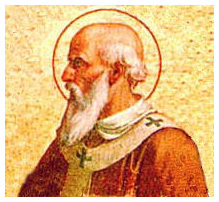
July Meditations in Honor of the Precious Blood St. Leo II., Pope and Confessor O Eternal Shepherd, watch over the peace of Thy flock, and through blessed Leo, Thy Sovereign Pontiff, whom thou didst appoint shepherd over the whole Church, keep her under Thy constant protection. Through out Lord etc. O Lord, father and God of my life, do not abandon me to evil thoughts: give me not haughtiness of my eyes, and turn away form me all evil desires, O Lord; remove concupiscence from me, and give me not over to a shameless and foolish mind, O Lord. (Roman Breviary) The pontificate of this great Pope was very brief but very fruitful, since in the ten months of his reign he accomplished good works which have caused his name to be blessed by all succeeding generations. Born in the seventh century in Sicily, he had been a Canon Regular, that is, an ecclesiastical dignitary who resided in his bishop's palace, was charged with recitation of the Office in the cathedral, and was relied upon to serve as the auxiliary of the Ordinary. Saint Leo was a devout student of Holy Scripture, and was well versed in the Greek as well as the Latin language. In his day grave difficulties frequently arose between the Holy See and the emperors of Constantinople, whose representatives at Ravenna tried to control the bishops of that see; the latter had been striving to become autonomous. Saint Leo published a decree ordering that in the future no bishop of Ravenna could enter into function before being consecrated for that office at Rome, by the Roman Pontiff. He built three churches in Rome, to honor Saint Paul the Apostle, Saint Sebastian, and Saint George. Saint Leo was highly gifted in the domain of music, and he renovated the Gregorian literature or library, then in a state of confusion; he also composed new hymns, still conserved by the Church. He took special care of widows and orphans and the poor in general, relieving their sufferings with a truly apostolic charity. Saint Leo confirmed the Acts of the Sixth Ecumenical Council which his predecessor had convoked at Constantinople against the Monothelite heresy, and translated its acts into Latin for the benefit of the Occidentals. When he died in July of 683, his death was deeply regretted by all the faithful. He was interred according to established custom in the church of Saint Peter. He is ordinarily pictured embracing a beggar or holding a book of music. |
July 4th
 The Immaculate Conception of the Blessed Virgin Mary: Patroness of the United States of America Prayers for America and Guidelines for Making a Moral Decision The Evil Scourge of War I am the Flag Star Spangled Banner Litany on Behalf of Country, Leo XIII, "Columbus is Ours" Prayers for Peace The True Story of the Life of Christopher Columbus A Memorial to those who have served in the Military Index of Prayers for the Holy Souls in Purgatory Related Links to Saints of North America St. Frances Xavier Cabrini, Virgin The North American Martyrs: St. Isaac Jogues St. John de Brebeuf St. Gabriel Lalemant St. Anthony Daniel St. Charles Gamier St. Noel Chabanel St. Rene Goupil St. John de la Lande Novena to the Jesuit Martyrs of North America |
July 5th, St. Anthony Mary Zaccaria, Confessor. 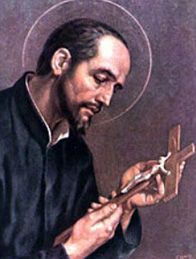
St. Anthony Maria Zaccharia Related Links to St. Anthony Zaccaria The Holy Hour The Corporal Works of Mercy The Spiritual Works of Mercy Index of Prayers and Devotions for the Sick On the Mode of Teaching Christian Doctrine to Children On the Benefits of a Good Confession Grant, O Lord God, that in the spirit of Paul the Apostle, we may learn the knowledge of Jesus Christ, which surpasses all understanding: wherein blessed Anthony Mary was marvelously learned, who gathered together in Thy Church new households of clerics and of virgins. Through out Lord etc. (Roman Breviary) Saint Anthony Maria Zaccaria was born at Cremona, Italy, in 1502, of noble parents. His father died when very young, and his eighteen-year-old mother was left to bring up her only son in the love of God and tenderness for the poor. As a child he gave his coat to a poor beggar who was shivering with cold. He studied philosophy and medicine at the Universities of Pavia and Padua and became a licensed physician in 1524, but was striving more earnestly to care for souls than to heal their material envelope. Sometimes when he was traveling as a doctor and found abandoned children, he assembled them to teach them their Christian duties. He desired a more perfect life and wider possibilities for the apostolate of a Christian. He therefore studied theology, and was twenty-six years old when ordained in 1528. Those present at the first Mass of Saint Anthony Maria saw him surrounded with an extraordinary light and a crown of Angels. He himself seemed to be an Angel on earth. By his preaching and example, Cremona was renewed, and then the young apostle went to Milan. To remedy disorders of every kind resulting from the war, he founded there the Order of Regular Clerics of Saint Paul, since called Barnabites because they were entrusted with the church of Saint Barnabas. He had a great devotion to Saint Paul and desired that his religious imitate the glorious Apostle. He also established a community of Sisters, called the Angelicals, and a confraternity for fathers of families. He animated all of his followers with his great love for God. Despite opposition of various kinds, in 1532 the Constitutions of his two communities were approved by Pope Clement VII. Their founder defended his religious with persevering gentleness in all the difficulties they encountered, and recommended to them to spend their free moments in conversation with Jesus crucified. God favored him with exceptional gifts; he read in hearts and saw the future. He died when only 36 years old, in 1539, and was canonized by Pope Leo XIII in 1897. |
July 6th: . Maria Goretti died on July 6th, 1902 and is a Paron Saint of Purity for Girls.
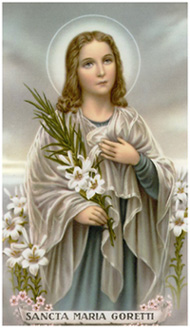
St. Maria Goretti died on July 6th, 1902 and is a Paron Saint of Purity for Girls. St. Maria Goretti, Child Saint Forgiveness Necessary for Heaven and the Eternity of Hell Children's Prayer Duties of Parents Religious and Moral Training of Children How to Teach Little Ones: A Children's Catechism On the Mode of Teaching Christian Doctrine to Children On the Vice of Impurity Moral Teaching on Unchaste Thoughts and Desires Part 1 of 3 on the Vice of Lust: The Folly of Impure Desires of Sensual Pleasures Part 2 of 3 on the Vice of Lust: The Incurableness of Impurity Prayers for the Preservation of Chastity. An Explanation and Defense of the Virtue of Chastity Contrition: Explanation of Perfect Contrition and the Necessity of Contrition for Forgiveness of Sins Contrition On Death, as the passage to Eternity by St. Alphonsus Di Liguori It is of faith that my soul is immortal, and that one day, when I least think of it, I must leave this world. I ought therefore to make a provision for myself, which will not fail with this life, but will be eternal, even as I am eternal. Great things were done here, in their life time, by an Alexander, or a Caesar; but, for how many ages past have their glories ceased! and where are they now? O my God, that I had always loved Thee! What now remains for me, after so many years spent in sin, but trouble and remorse of conscience? But since Thou dost allow me time to repair the evil which I have done, behold me, Lord, ready to perform whatever thou requirest of me, whatever thou pleasest. I will spend the remainder of my days in bewailing my ungrateful conduct towards Thee, and in loving Thee with all my power, my God and my all, my only good. What will it avail me to have been happy in this world (if indeed true happiness can be attained without God), if hereafter I should be miserable for all eternity? But what folly it is, to know that I must die, and that an eternity either of happiness or misery awaits me after death, and that upon dying ill or well depends my being miserable or happy forever, and yet, not to adopt every means in my power to secure a good death! Holy Spirit, enlighten and strengthen me to live always in Thy grace, until the hour of my departure. O infinite goodness, I am sensible of the evil which I have done by offending Thee, and I detest it: I know that Thou alone art worthy of being loved, and I love Thee above all things. In a word, all the good things of this life must end at our burial and be left, while we are mouldering in our graves. The shadow of death will cover and obscure all the grandeur and splendour of this world. He only, then, can be called happy, who serves God in this world, and by loving and serving Him acquires eternal happiness. O Jesus, I am truly sorry for having hitherto made so little account of Thy love. Now I love Thee above all things, and I desire nothing else but to love Thee. From henceforth Thou only shalt be the sole object of my love, Thou only shalt be my all; and this is the only inheritance I ask of Thee: to love Thee always, both in this life and in the next. For the merits of Thy bitter passion, give me perseverance in all virtues. Mary, mother of God, Thou art my hope. |
July 7th, Sts. Cyril and Metholius, Bishops and Confessors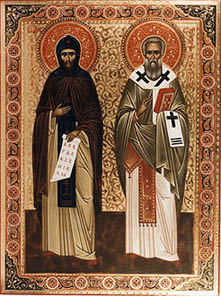 Sts. Cyril and Methodius Are we bound to profess our Catholic Faith openly? On the Great Commandment of Divine Love The Corporal Works of Mercy The Spiritual Works of Mercy Almighty and everlasting God, Who didst grant that the Slavonic peoples should come to know Thy name by means of the blessed Confessors and Bishop Cyril and Methodius: grant, that we who glory in their festival may be joined with them in fellowship. Through our Lord etc. (Roman Breviary) These two brothers were born in Thessalonica of a senatorial family. Saint Cyril was sent to Constantinople to study, where he became known as the Philosopher; but it was the Holy Church that he desired to serve, and he was ordained a priest. While Cyril was still young, the Patriarch of Constantinople recommended in the year 848 to the reigning Emperor to place him at the head of a mission which was to be sent to the Khazars of the eastern Danube region. Their king desired to learn of Christianity and had requested missionaries. Cyril asked for the time to learn the Turkish language which this people spoke, and after only a short while was ready to preach. The prince of the Khazars received Baptism and the entire nation soon followed his example. Cyril founded churches and furnished them with excellent ministers, then returned to Constantinople, refusing all presents offered him by his converts. He was next missioned to Bulgaria with his younger brother Methodius, who was a monk of eminent sanctity. This nation, which had migrated like the Khazars from the east, had settled in the Moldavian region and a part of Hungary; they had been exposed to Christianity by some Greek prisoners, and the sister of their king had become a Christian by the good offices of the empress Theodora. When Saint Methodius, an excellent artist, was delegated to paint in the palace for the king, as he requested, a scene which could frighten the beholders, he chose for subject the Last Judgment. The king was so impressed that after being instructed he was baptized, in 865, with forty-eight of his followers. The nation followed their leaders after a brief revolt had been promptly quieted. The two brothers preached also in Moravia, invited there by the pious king of that nation, whom they baptized with most of his subjects. It was there that Saint Cyril invented a Slavonic alphabet, translating the Bible and other writings from Greek and Latin into the language of the Slavic peoples. In 867 the missionaries went to Rome, where Saint Cyril, who was ill, died soon afterwards. Saint Methodius was named bishop of Moravia and Pannonia or Hungary. Difficulties were not lacking, but he remained there until 880, when he returned to Rome to justify his conduct, which certain enemies had accused to the Pope. The Pope cleared him before the adversaries, and settled some questions regarding the language to be used in worship. He permitted the Mass to be said in the Slavic language, not to the exclusion, however, of Latin. Saint Methodius also baptized the king of the Bohemians, and again many of the king's subjects followed his example. The Saint lived for about 20 years after his brother's decease; the exact date of his death is unknown. |
July 8th, St. Elizabeth of Portugal, Queen and Widow. 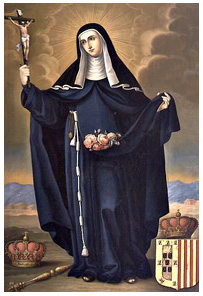
St. Elizabeth Queen, Widow and Mother The Corporal Works of Mercy The Christian Mother Index on Marriage and all Related Questions: A Catholic's Moral Guide to Sacramental Marriage and Family Life, Includes a Glossary of Faith and Morals for the Married and Unmarried How to Make a Moral Decision Examination of Our Duties and State of Life Exercising Works of Mercy The Business of Life and Vanity of Earthly Things July 8th, St. Elizabeth of Portugal O most merciful God, Who, amongst other excellent gifts, didst endow the blessed queen Elizabeth with special grace to calm the tempest of war: grant to our humble petitions, through her intercession, that, after a peaceful passage through this mortal life, we may win everlasting joys. Through our Lord etc. Hymn: Domare Cordis To rule thy heart, Elizabeth, To curb all motions vain, Seemed better to thy godly soul Than as a queen to reign. And lo, enthroned among the Saints, Above the gleaming skies, Thou hast received thy rich reward, The joys of Paradise. Thy reign is with the Angel choirs, The stars beneath thy feet, The Blessed Vision is thy prize And heaven thy queenly seat. All power unto the Father be, All glory to the Son, And honor to the Holy Ghost While endless ages run. Amen (Roman Breviary) St. Elizabeth was born in 1271. She was daughter of Pedro III. of Arragon, being named after her aunt, St. Elizabeth of Hungary. At twelve years of age she was given in marriage to Denis, King of Portugal, and from a holy child became a saintly wife. She heard Mass and recited the Divine Office daily, but her devotions were arranged with such prudence that they interfered with no duty of her state. She prepared for her frequent communions by severe austerities, fasting thrice a week, and by heroic works of charity. She was several times called on to make peace between her husband and her son Alphonso, who had taken up arms against him. Her husband tried her much, both by his unfounded jealousy and by his infidelity to herself. A slander affecting Elizabeth and one of her pages made the king determine to slay the youth, and he told a lime-burner to cast into his kiln the first page who should arrive with a royal message. On the day fixed the page was sent; but the boy, who was in the habit of hearing Mass daily, stopped on his way to do so. The king, in suspense, sent a second page, the very originator of the calumny, who, coming first to the kiln, was at once cast into the furnace and burned. Shortly after, the first page arrived from the church, and took back to the king the lime-burner's reply that his orders had been fulfilled. Thus hearing Mass saved the page's life and proved the queen's innocence. Her patience, and the wonderful sweetness with which she even cherished the children of her rivals, completely won the king from his evil ways, and he became a devoted husband and a truly Christian king. She built many charitable institutions and religious houses, among others a convent of Poor Clares. After her husband's death, she wished to enter their Order; but being dissuaded by her people, who could not do without her, she took the habit of the Third Order of St. Francis, and spent the rest of her life in redoubled austerities and almsgiving. She died at the age of sixty-five, while in the act of making peace between her children. Reflection--In the Holy Sacrifice of the Altar St. Elizabeth daily found strength to bear with sweetness suspicion and cruelty; and by that same Holy Sacrifice her innocence was proved. What succor do we forfeit by neglect of daily Mass! |
|
July 9th, In some places St. Thomas More and St. John Fisher The Martyrdom of St. John Fisher for his Defense of Marriage Against Divorce In Defense of Catholic Marriage Against Divorce What Cannot and What Can Be Reformed in the Church. What Every Christian Must Believe and Do to be Saved. Blessed are the dead who die in the Lord. From henceforth now, saith the Spirit, that they may rest from their labours: for their works follow them (Apoc. xiv. 13). Consider first, who they are who "die in the Lord." They are those who have lived in the Lord; for this is what commonly happens, that every one dies where his place of abode is. It may sometimes accidentally occur that a person dies in a place through which he is passing, but this is but seldom; the rule is that he dies where he has lived. And so the man who lives in sin, dies in sin; and the man who "lives in the Lord," dies "in the Lord." Where art thou living? Consider that thou wilt die where thou art living, if not in the particular sin which thou committest by accident, at least in that which thou committest habitually, the sin of lust or envy, or whatever it may be which may be rightly called thine: "You shall die in your sin (St . John viii. 21)." Consider secondly, what to "die in the Lord" means. It means to die, if not for the Lord, like the martyrs, at least in the Lord, like His confessors, that is, like those who have served Him faithfully, not merely by living in Him by grace as all the just do, but by living in Him by a special affection of charity. Such persons are rightly said to "die in the Lord," not merely because they die in a state of grace, which is common to all the just who die, but because they die with an entire abandonment of themselves into the bosom of their Lord: they die in His Sacred Side, in His Heart, in the blessed embraces of His arms. How sweet a death to die in God's embrace! Alas for those who live in the arms of His enemy, as his especial favourites! in his arms they must expect also to die. Consider thirdly, as a proof that this blessed death of which we are speaking does not fall to the lot of all those who die in a state of grace, but only of those whose life has been singularly perfect, God says, "Blessed are the dead who die in the Lord." It seems beyond a doubt that two different deaths are here spoken of, one of which comes after the other: how, otherwise, can the dead be said to die? It is the living who die, not those who are already dead. Yet this is what is said here: "Blessed are the dead who die in the Lord;" and surely there is a mystery in the words, for if there is not a single superfluous particle in all the Sacred Scriptures, least of all can this be so in the Apocalypse, where it is expressly threatened to strike out of the Book of Life the name not only of the man who shall contradict a single word as incorrect, but of him also who shall cancel a single word as superfluous: "If any man shall take away from the words of the book of this prophecy, God shall take away his part out of the Book of Life (Apoc. xxii. 19)." This being so, all commentators, terrified by the fulmination of this decree, agree with remarkable unanimity in judging that in this passage those persons are particularly referred to, who, after first dying to themselves by living a life altogether in God's embrace, have afterwards the wonderful blessedness of dying in it also. See, therefore, how true it is that it is those who live in the Lord who will die in Him! But what is dying to self? It is to anticipate the work of death by detaching ourselves from everything which death will at last take from us: property, country, relations, vanities, pleasures, amusements, and above all from an excessive love of ourselves; so as to live, if possible, without the body, even while in the body. It is to such persons that the Apostle was able to write: "You are dead, and your life is hid with Christ in God (Coloss. iii. 3.)." It is true that to be crowned it is not enough to begin well, we must go on perseveringly to the end. And, therefore, those are not here called "blessed" who merely die to themselves, but those who, after having died to themselves, die at last in the Lord: "Blessed are the dead who die in the Lord." Of what avail will it be that thou didst once die to thyself to live to the Lord, if afterwards thou risest again from that death, to live once more to thyself? Thou must be willing to continue dead to thyself till the time comes when thou shalt "die in the Lord." |
July 10th, The Seven Brothers, Martyrs and Sts. Rufina & Secunda, Virgins and Martyrs The Seven Holy Brothers Martyrs and Sts. Rufina & Secunda St. Felicity, Martyr The Litany of Faith Showing Forth Our Faith Are we bound to profess our Catholic Faith openly? Religious and Moral Training of Children Influence of the Example of Parents Upon Their Children Duties of Parents How Catholics lose the Faith by Fr. Michael Muller The Christian Mother What is it to be a Mother? Prayers for Catholic Mothers A Mother's Prayer for the Conversion of her child Blessings of Many Children Grant, we beseech Thee, O almighty God: that we who acknowledge the glorious Martyrs to have been valiant in their confession, may experience their compassion by their intercession with Thee. Through our Lord etc. (Roman Breviary) The illustrious martyrdom of these Saints happened at Rome, under the Emperor Antoninus. The seven brothers were the sons of St. Felicitas, a noble, pious, Christian widow in Rome, who, after the death of her husband, served God in a state of continency and employed herself wholly in prayer, fasting, and works of charity. By the public and edifying example of this lady and her whole family many idolaters were moved to renounce the worship of their false gods, and to embrace the Faith of Christ. This excited the anger of the heathen priests, who complained to the emperor that the boldness with which Felicitas publicly practised the Christian religion drew many from the worship of the immortal gods, who were the guardians and protectors of the empire, and that, in order to appease these false gods, it was necessary to compel this lady and her children to sacrifice to them. Publius, the prefect of Rome, caused the mother and her sons to be apprehended and brought before him, and, addressing her, said, "Take pity on your children, Felicitas; they are in the bloom of youth, and may aspire to the greatest honors and preferments." The holy mother answered, "Your pity is really impiety, and the compassion to which you exhort me would make me the most cruel of mothers." Then turning herself towards her children, she said to them, "My sons, look up to heaven, where Jesus Christ with His Saints expects you. Be faithful in His love, and fight courageously for your souls." Publius, being exasperated at this behavior, commanded her to be cruelly buffeted; he then called the children to him one after another, and used many artful speeches, mingling promises with threats to induce them to adore the gods. His arguments and threats were equally in vain, and the brothers were condemned to be scourged. After being whipped, they were remanded to prison, and the prefect, despairing to overcome their resolution, laid the whole process before the emperor. Antoninus gave an order that they should be sent to different judges, and be condemned to different deaths. Januarius was scourged to death with whips loaded with plummets of lead. The two next, Felix and Philip, were beaten with clubs till they expired. Sylvanus, the fourth, was thrown headlong down a steep precipice. The three youngest, Alexander, Vitalis, and Martialis, were beheaded, and the same sentence was executed upon the mother four months after. Reflection--What afflictions do parents daily meet with from the disorders into which their children fall through their own bad example or neglect! Let them imitate the earnestness of St. Felicitas in forming to perfect virtue the tender souls which God hath committed to their charge, and with this Saint they will have the greatest of all comforts in them, and will by His grace count as many Saints in their family as they are blessed with children. |
July 11th, St. Pius I, Pope and Martyr
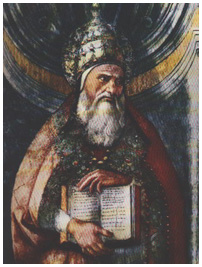
Mortal Sin On the Horror of Mortal Sin The Sin Unto Death by Cardinal Manning O eternal Shepherd, watch over the peace of Thy flock, and through blessed Pius, Thy Martyr and Sovereign Pontiff, whom thou didst appoint shepherd over the whole Church, keep her under Thy constant protection. Through our Lord etc. Ant. This Saint hath striven for the law of his God even unto death, and hath not feared for the words of the ungodly; for he had been founded upon a firm rock. V. Thou hast crowned him with glory and honor, O Lord. R. And hast set him over the works fo thy hands. This is indeed a Martyr, who shed his blood for Christ's name: Who feared not the threats of judges, nor sought the glory of worldly honor, but hath attained to the heavenly kingdoms. V. The Lord conducted the just through the right ways, and dowed him the hingdom of God. (Roman Breviary) Saint Pius I, born in the State of Venice, succeeded Saint Hygin in the year 142 as the ninth successor to Saint Peter, during the reign of the emperor Antoninus the Pious. Throughout his pontificate he took great care to make the religion of Christ flourish, and published many beautiful ordinances for the utility of the universal Church. In his decrees he was severe towards blasphemers and with the clergy who showed negligence for the divine Mysteries of the altar. Saint Pius ordained that Easter be celebrated on a Sunday; in this way the custom which the Apostles had already observed became an inviolable law of the Church. His pontificate was marked by the efforts of various heretics in Rome, among them the gnostics Valentinian, Cerdon, and Marcion, to sow their errors in the Church's center. The last-named, when excluded from communion by Saint Pius, founded the heretical group which bears his name. Saint Justin and other Catholic teachers assisted the Pontiff in defending Christian doctrine and preserving it from corruption. After having governed the Church for fifteen years Saint Pius I obtained the crown of martyrdom by the sword, in the year of Our Lord 150. |
July 12th, St. John Gualbert, Abbot. Sts. Nabor & Felix, Martyrs 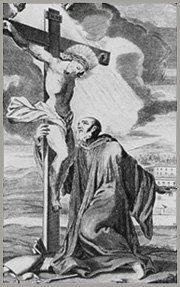 St. John Gualbert, Abbot On Not Making Light of Venial Sins Short Reflection: On Forgiveness On Christian Self-Love and the Necessity of Holy Fear and Avoiding Sloth Forgiveness necessary for Heaven and the Eternity of Hell Death and the Importance of Salvation Importance of Salvation and the Feast of the Most Precious Blood Sermon of St. John Vianney: Salvation Resisting the Enemies of Our Salvation Meditations on Saving Your Soul: Will it be Heaven or Hell? St. John Gualbert, Abbot. May the intercession of the blessed Abbot, John, procure favor for us, we beseech thee, O Lord: that we may gain, by his patronage, those things of which we are not capable by our own merits. Through our Lord etc. Grant, we beseech Thee, O Lord: that we, who honor the festival of Thy Martyrs Nabor and Felix, may ever enjoy their intercession for us. Through our Lord etc. (Roman Breviary) Saint John Gualbert was born in Florence in the year 999. He was raised with care in piety and the study of the humanities, but no sooner had he entered adult life than he acquired a taste for pleasures. God, desiring to save and sanctify him, found a means to open his eyes. He was following the profession of arms at that troubled period, when on Good Friday, as he was riding into Florence accompanied by armed men, he encountered his brother's murderer in a place where neither could avoid the other. John would have slain him, according to the customary vengeance of those times; but his adversary, who was totally unprepared to fight, fell upon his knees with his arms outstretched in the form of a cross, and implored him, for the sake of Our Lord's holy Passion, to spare his life. Saint John said to his enemy, "I cannot refuse what you ask in Christ's name. I grant you not only your life, but my friendship. Pray that God may forgive me my sin!" They embraced and parted; grace had triumphed. A humble and changed man, he went to a nearby abbatial church, and while he prayed with fervor for forgiveness, the figure of our crucified Lord, before which he was kneeling, bowed its head toward him, as if to confirm His pardon and manifest His gratitude for the generous pardon John himself had granted. Abandoning the world then, Saint John devoted himself to prayer and penance in the Benedictine Order. His virtue and austerity were so great that when his abbot died, he was unanimously chosen to replace him; but he could not be prevailed upon to accept that honor. He retired to Vallombrosa, which became the cradle of a new Order which followed the Rule of Saint Benedict in all its austerity. It was from this shady valley, a few miles from Florence, that the Order spread over Italy. Once during a time of famine, he went to the nearly empty storeroom, and at his prayer the provisions multiplied to the point that he could distribute grain to all his houses and to all the poor who presented themselves. On an occasion when he found one of the monasteries too rich, he prayed a stream flowing past it to take on the violence of a torrent and overturn the building. This was done without delay. Another time, the enemies of the Saint came to his convent of Saint Salvi, plundered it and set fire to it and, after treating the monks with ignominy, beat them and injured them. Saint John rejoiced. "Now," he said, "you are true monks. Oh, how I envy your lot!" Saint John Gualbert fought vigorously against simony, and in many ways promoted the interests of the Faith in Italy. After a life of great austerity, he died while Angels were singing near his bed, on July 12th, 1073. |
July 13th, St. Anacletus, Pope and Martyr
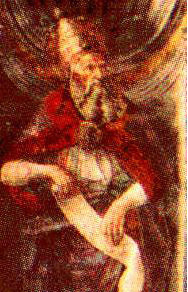
O eternal Shepherd, watch over the peace of Thy flock, and through blessed Anacletus, Thy Martyr and Sovereign Pontiff, whom thou didst appoint shepherd over the whole Church, keep her under Thy constant protection. Through our Lord etc. Ant. This Saint hath striven for the law of his God even unto death, and hath not geared for the words of the ungodly; for he had been founded up on a firm rock. V. Thou hast crowned him with glory and honor, O Lord. R. And hast set him over the works of Thy hands. (Roman Breviary) Saint Anacletus was the second successor to Saint Peter, by whom he was converted to the faith. He was also ordained a deacon and consecrated priest by Christ's own first Vicar, as Saint Ignatius of Antioch affirms. He was Greek by origin, born in Athens; in the year 83 he was chosen to succeed Saint Cletus, who had been martyred. The emperor Domitian had begun a violent persecution which increased in fury as time passed; but the faith of the Christians did not diminish, only receiving new force from the blood of the martyrs. This holy Pontiff omitted no solicitude which could animate the faithful to expose their lives generously for the glory of Jesus Christ. During his nine years of reign, he consecrated six bishops. The last of these bishops was Saint Evaristus, who would succeed him; Saint Anacletus consecrated him the year before his death, foreseeing he could not long escape the fate of all the first Vicars of Christ. One of his enduring ordinances was the law that for the consecration of a bishop, three bishops must participate; that practice had been established by Saint Paul. He also required that all ordinations be accomplished in public. He built a church in honor of Saint Peter, to whom he owed his conversion, at the site of Saint Peter's burial; the original structure was conserved by Providence amid many tempests. He reserved burial sites for future martyrs in the Christian cemeteries, because multitudes were being condemned under Domitian. He also designated and adorned sites for the interment of future Pontiffs in the Vatican. Saint Anacletus was highly praised by Saint Ignatius of Antioch in a well-known letter. He died on July 13th in the year 96, and was buried in the Vatican. Certain authors would confound Saint Cletus and Anacletus and make of them one person. Their father's names are known, however, as well as their place of birth--the one in Italy, the other in Greece; moreover, Saint Cletus was consecrated bishop by Saint Peter, saint Anacletus was ordained a priest by him. What is Liberalism What Cannot and What Can Be Reformed in the Church. What Every Christian Must Believe and Do to be Saved. Catholic Worship, Explained Why the World Continually Persecutes the Church Abjuration of Heresy and Profession of Faith of the Council of Trent, Pius IV., 1565 The Sacrament of Holy Orders |
July 14th, St. Bonaventure, Bishop, Confessor and Doctor of the Church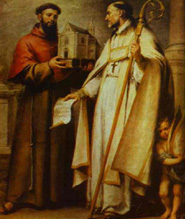 St. Bonaventure Bishop, Confessor, and Doctor of the Church The Twelve Works of Our Guardian Angel by St. Bonaventure Final Perseverance by St. Bonaventure O God, Who didst give blessed Bonaventure to be a minister of eternal salvation to Thy people: grant, we beseech Thee, that we who had him on earth as Teacher of life, may be worthy to have him for advocate in heaven. Through our Lord etc. (Roman Breviary) Born in Tuscany in 1225, this frail child was given the name of John at his baptism. He soon fell so ill that his cure was despaired of, and his sorrowing mother had recourse to Saint Francis, recognized everywhere in Italy as a Saint. She promised God she would endeavor to have the child take the habit of the Franciscan Order, if he were cured. Her prayer was granted, the child was cured, and Saint Francis himself gave him his new name. In reference to the miraculous cure, he prophetically exclaimed of the infant, "O buona ventura!--O good fortune!" Saint Francis died a few months later, not without foreseeing the future of this little one, destined to be a seraph of love like himself. Saint Bonaventure is titled "the Seraphic Doctor," from the fervor of divine love which breathes in his writings. Sanctity and learning raised Bonaventure to the Church's highest honors, yet at heart he was ever the poor Franciscan friar, who practiced and taught humility and mortification. He was the friend of Saint Thomas Aquinas; they received the Doctor's cap together in Paris. Saint Thomas asked him one day from what source he drew his great learning; he replied by pointing to his crucifix. Another time Saint Thomas found him in ecstasy while writing the life of Saint Francis. The Angelic Doctor said, while retiring quietly, "Let us leave a Saint in peace, to write of a Saint!" At the age of thirty-six Saint Bonaventure was made General of his Order. In 1265 he only escaped another dignity, the Archbishopric of York, by dint of tears and entreaties to the Holy Father Clement IV. When he learned of Pope Gregory X's resolve to create him a Cardinal, he quietly made his escape from Italy, and in France began to compose a book. But Gregory sent him a summons to return to Rome. On his way, he stopped to rest at a convent of his Order near Florence; and there two Papal messengers, sent to meet him with the Cardinal's hat, found him washing the dishes. The Saint asked them to hang the hat on a nearby bush, and take a walk in the garden until he had finished what he had begun. Then taking up the hat with unfeigned sorrow, he joined the messengers, and paid them the respect due to their character. He was the guest and adviser of Saint Louis, and the director of Saint Isabella, the king's sister. He sat at the right hand of Pope Gregory X and presided all sessions at the Council of Lyons, assembled to provide for the reform of morals and the needs of the Holy Land, and to cement the union of the Greeks with the Roman Church. The piety and eloquence of Saint Bonaventure won over the Greeks to Catholic union, but his strength failed suddenly, the day after its closure. He died on the 15th of July, 1274, and was buried by the assembly of the Council members, still in Lyons; he was mourned by the entire Christian world. Prayer to Our Lady of Sorrows O most holy Virgin, Mother of our Lord Jesus Christ: by the overwhelming grief you experienced when you witnessed the martyrdom, the crucifixion, and the death of your divine Son, look upon me with eyes of compassion, and awaken in my heart a tender commiseration for those sufferings, as well as a sincere detestation of my sins, in order that, being disengaged from all undue affection for the passing joys of this earth, I may sigh after the eternal Jerusalem, and that henceforward all my thought and all my actions may be directed towards this one most desirable object. Honor, glory, and love to our divine Lord Jesus, and to the holy and immaculate Mother of God. Amen (Saint Bonaventure) |
July 15th, St. Henry II, Emperor and Confessor St. Henry II. Emperor, Confessor Index of Prayers and Devotions for the Dying On Death-Bed Performances The Careless Christian and Self-Watchfulness On the Examination of the State of Our Interior On the Certainty of Death Reflections on: the Terrors of Death; the Assaults of Satan at the Hour of Death; the Apparition of the Spirits of Darkness; the Fear of Hell; the Judment O God, who on This day didst remove blessed Henry Thy Confessor from the government of an earthly empire and raise him to the eternal kingdom: we humbly beseech Thee, that even as by the fulness of Thy preventing grace Thou didst give him strength to overcome the enticements of this life, so thou wouldst enable us, through his example, to shun the blandishments of this world, and come to Thee with clean hearts. Through our Lord etc. Ant. I will liken him to a wise man who built his house upon a rock. V. The Lord love him and adorned him with a robe of glory. Hymn: Iste Confessor This the Confessor of the Lord, whose triumph Now all the faithful celebrate, with gladness Erst on this feast-day merited to enter Into his glory. Saintly and prudent, modest in behavior, Peaceful and sober, chaste was he, and lowly, While that life's vigor, coursing through his members, Quickened his being. Sick ones of old time, to his tomb resorting, Sorely by ailments manifold afflicted, Oft-times have welcomed health and strength returning, At his petition. Whence we in chorus gladly do him honor, Chanting his praises with devout affection, That in his merits we may have a portion, Now and forever. His be the glory, power and salvation, Who over all things reigneth in the highest, Earth's mighty fabric ruling and directing, Onely and Trinal. Amen (Roman Breviary) Henry, Duke of Bavaria, saw in a vision his guardian, St. Wolfgang, pointing to the words "after six." This moved him to prepare for death, and for six years he continued to watch and pray, when, at the end of the sixth year, he found the warning verified in his election as emperor. Thus trained in the fear of God, he ascended the throne with but one thought to reign for His greater glory. The pagan Slavs were then despoiling the empire. Henry attacked them with a small force; but angels and Saints were seen leading his troops, and the heathen fled in despair. Poland and Bohemia, Moravia and Burgundy, were in turn annexed to his kingdom, Pannonia and Hungary won to the Church. With the Faith secured in Germany, Henry passed into Italy, drove out the Antipope Gregory, brought Benedict VIII. back to Rome, and was crowned in St. Peter's by that Pontiff, in 1014. It was Henry's custom, on arriving in any town, to spend his first night in watching in some church dedicated to our blessed Lady. As he was thus praying in St. Mary Major's, the first night of his arrival in Rome, he "saw the Sovereign and Eternal Priest Christ Jesus" enter to say Mass. Sts. Laurence and Vincent assisted as deacon and sub-deacon. Saints innumerable filled the church, and angels sang in the choir. After the Gospel, an angel was sent by Our Lady to give Henry the book to kiss. Touching him lightly on the thigh, as the angel did to Jacob, he said, "Accept this sign of God's love for your chastity and justice;" and from that time the emperor always was lame. Like holy David, Henry employed the fruits of his conquests in the service of the temple. The forests and mines of the empire, the best that his treasury could produce, were consecrated to the sanctuary. Stately cathedrals, noble monasteries, churches innumerable, enlightened and sanctified the once heathen lands. In 1022 Henry lay on his bed of death. He gave back to her parents his wife, St. Cunegunda, "a virgin still, as a virgin he had received her from Christ," and surrendered his own pure soul to God. Reflection--St. Henry deprived himself of many things to enrich the house of God. We clothe ourselves in purple and fine linen, and leave Jesus in poverty and neglect. |
July 16th, Our Lady of Mount Carmel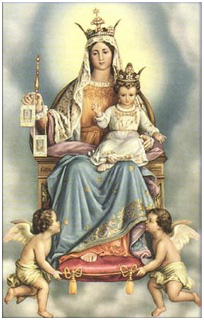 Our Lady of Mount Carmel History of Our Lady of Mount Carmel The Feast of the Scapular The Confraternity of Our Blessed Lady of Mount Carmel called the Scapular, 1850 Novena to Our Lady of Mount Carmel: July 8th - July 16th Index of Prayers for the Holy Souls in Purgatory The Location and Duration of Purgatory The Cry of the Souls in Purgatory to us Instructions for the Feast of All Souls Indulgences/ All Souls July 16th, Our Lady of Mount Carmel O God, Who hast honored the order of Carmel with the special title of Thy most blessed Mother Mary, ever a virgin: mercifully grant, that we who keep her memory this day by a solemn office, may be shielded by her protection, and become worthy to win everlasting bliss: Who livest etc. V. Vouchsafe that I may praise Thee, O holy Virgin. R. Give me strength against thy enemies. Ant. Holy Mary, succor those in misery, strengthen the fainthearted, comfort the sorrowful, pray for the people, mediate for the clergy, intercede for all devout women: may all experience thy help who celebrate thy solemn Commemoration. (Roman Breviary) |
July 17th, St. Alexius, Confessor. In some Places the Humility of the Blessed Virgin Mary St. Alexius, Confessor Meditations on Saving Your Soul: Will it be Heaven or Hell? How to become a Saint Salvation: Your Choice The Business of Life and Vanity of Earthly Things On the Vanity of the World The Humility of the Blessed Virgin of Mary O God, Who dost gladden us by the yearly solemnity of blessed Alexius Thy Confessor: grant in Thy mercy, that we, who keep his festival, may also follow the pattern of his life. Through our Lord etc. Ant. I will liken him to a wise man who guilt his house upon a rock. V. The Lord loved him, and adorned him. R. He clothed him with a robe of glory. (Roman Breviary) St. Alexius was the only son of parents pre-eminent among the Roman nobles for virtue, birth, and wealth. On his wedding-night, by God's special inspiration, he secretly quitted Rome, and journeying to Edessa, in the far East, gave away all that he had brought with him, content thenceforth to live on alms at the gate of Our Lady's church in that city. It came to pass that the servants of St. Alexius, whom his father sent in search of him, arrived at Edessa, and seeing him among the poor at the gate of Our Lady's church, gave him an alms, not recognizing him. Whereupon the man of God, rejoicing, said, "I thank thee, O Lord, Who hast called me and granted that I should receive for Thy name's sake an alms from my own slaves. Deign to fulfil in me the work Thou hast begun." After seventeen years, when his sanctity was miraculously manifested by the Blessed Virgin's image, he once more sought obscurity by flight. On his way to Tarsus contrary winds drove his ship to Rome. There no one recognized in the wan and tattered mendicant the heir of Rome's noblest house; not even his sorrowing parents, who had vainly sent throughout the world in search of him. From his father's charity he begged a mean corner of his palace as a shelter, and the leavings of his table as food. Thus he spent seventeen years, bearing patiently the mockery and ill-usage of his own slaves, and witnessing daily the inconsolable grief of his spouse and parents. At last, when death had ended this cruel martyrdom, they learned too late, from a writing in his own hand, who it was that they had unknowingly sheltered. God bore testimony to His servant's sanctity by many miracles. He died early in the fifth century. |
July 18th, St. Camillus de Lellis, Confessor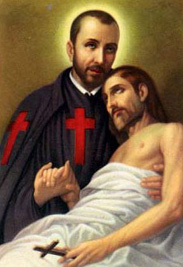 St. Camillus of Lellis Index of Prayers and Devotions for the Sick Index of Prayers and Devotions for the Dying The Sickness of the Body is a Blessing to the Soul Sickness: an Opportunity for Merit & the Dangers of Delaying Conversion Instruction Concerning the Value of Time and Consolation in Sickness St. Camillus de Lellis, Confessor O God, Who didst endow holy Camillus with a special grace of charity for the relief of souls in their last agony: we beseech Thee, by his merits, so to pour into our hearts the spirit of Thy love, that at the hour of our departure we may overcome the enemy, and deserve to win a heavenly crown. Through our Lord etc. V. The Lord Loved him, and adorned him. R. He clothed him with a robe of glory. Ant. I will liken him to a wise man who built his house upon a rock. (Roman Breviary) The early years of Camillus gave no sign of sanctity. At the age of nineteen he took service with his father, an Italian noble, against the Turks, and after four years' hard campaigning found himself, through his violent temper, reckless habits, and inveterate passion for gambling, a discharged soldier, and in such straitened circumstances that he was obliged to work as a laborer on a Capuchin convent which was then building. A few words from a Capuchin friar brought about his conversion, and he resolved to become a religious. Thrice he entered the Capuchin novitiate, but each time an obstinate wound in his leg forced him to leave. He repaired to Rome for medical treatment, and there took St. Philip as his confessor, and entered the hospital of St. Giacomo, of which he became in time the superintendent. The carelessness of the paid chaplains and nurses towards the suffering patients now inspired him with the thought of founding a congregation to minister to their wants. With this end he was ordained priest, and in 1586 his community of the Servants of the Sick was confirmed by the Pope. Its usefulness was soon felt, not only in hospitals, but in private houses. Summoned at every hour of the day and night, the devotion of Camillus never grew cold. With a woman's tenderness he attended to the needs of his patients. He wept with them, consoled them, and prayed with them. He knew miraculously the state of their souls; and St. Philip saw angels whispering to two Servants of the Sick who were consoling a dying person. One day a sick man said to the Saint, "Father, may I beg you to make up my bed? it is very hard." Camillus replied, "God forgive you, brother! You beg me! Don't you know yet that you are to command me, for I am your servant and slave." "Would to God," he would cry, "that in the hour of my death one sigh or one blessing of these poor creatures might fall upon me!" His prayer was heard. He was granted the same consolations in his last hour which he had so often procured for others. In the year 1614 he died with the full use of his faculties, after two weeks' saintly preparation, as the priest was reciting the words of the ritual, "May Jesus Christ appear to thee with a mild and joyful countenance!" Reflection--St. Camillus venerated the sick as living images of Christ, and by ministering to them in this spirit did penance for the sins of his youth, led a life precious in merit, and from a violent and quarrelsome soldier became a gentle and tender Saint. July 18th, St. Symphorosa and her seven sons, Martyrs 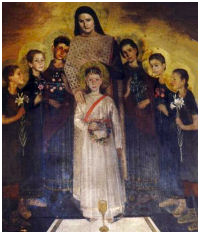 . St. Symphorosa and her seven Sons, Martyrs The Christian Mother What is it to be a Mother? Prayers for Catholic Mothers A Mother's Prayer for the Conversion of her child Blessings of Many Children O God, by Whose grace we keep the festival of Thy holy Martyrs Symphorosa and her sons: grant that we may enjoy their fellowship in everlasting bliss. Through our Lord etc. (Roman Breviary) |
July 19th, St. Vincent de Paul, Confessor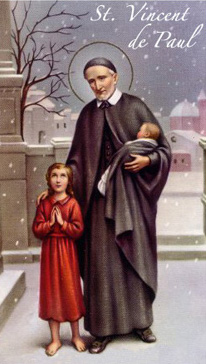
St. Vincent de Paul Novena in Honor of St. Vincent De Paul: July 11th - July 19th The Corporal Works of Mercy The Spiritual Works of Mercy On the Mode of Teaching Christian Doctrine to Children Children Prayers and Sermons St. Vincent de Paul, Confessor O God, Who for the preaching of the Gospel to the poor and for advancing the honor of the ecclesiastical order didst endow blessed Vincent with apostolic virtue: grant, we beseech Thee, that we who pay honor to his godly life may also be taught by the example of his virtues. Through our Lord etc. V. The Lord loved him, and adorned him. R. He clothed him with a robe of glory. Ant. I will liken him to a wise man who built his house upon a rock. Ant. This man, despising the world and triumphing over earthly things, hath laid up treasure in heaven by word and deed. V. The Lord conducted the just through the right ways. R. And showed him the kingdom of God. (Roman Breviary) St. Vincent was born in 1576. In after-years, when adviser of the queen and oracle of the Church in France, he loved to recount how, in his youth, he had guarded his father's pigs. Soon after his ordination he was captured by corsairs, and carried into Barbary. He converted his renegade master, and escaped with him to France. Appointed chaplain-general of the galleys of France, his tender charity brought hope into those prisons where hitherto despair had reigned. A mother mourned her imprisoned son. Vincent put on his chains and took his place at the oar, and gave him to his mother. His charity embraced the poor, young and old, provinces desolated by civil war, Christians enslaved by the infidel. The poor man, ignorant and degraded, was to him the image of Him Who became as "a leper and no man." "Turn the medal," he said, "and you then will see Jesus Christ." He went through the streets of Paris at night, seeking the children who were left there to die. Once robbers rushed upon him, thinking he carried a treasure, but when he opened his cloak, they recognized him and his burden, and fell at his feet. Not only was St. Vincent the saviour of the poor, but also of the rich, for he taught them to do works of mercy. When the work for the foundlings was in danger of failing from want of funds, he assembled the ladies of the Association of Charity. He bade his most fervent daughters be present to give the spur to the others. Then he said, "Compassion and charity have made you adopt these little creatures as your children. You have been their mothers according to grace, when their own mothers abandoned them. Cease to be their mothers, that you may become their judges; their life and death are in your hands. I shall now take your votes: it is time to pronounce sentence" The tears of the assembly were his only answer, and the work was continued. The Society of St. Vincent, the Priests of the Mission, and 25,000 Sisters of Charity still comfort the afflicted with the charity of St. Vincent of Paul. He died in 1660. Reflection--Most people who profess piety ask advice of directors about their prayers and spiritual exercises. Few inquire whether they are not in danger of damnation from neglect of works of charity. |
July 20th, St. Jerome Emiliani, Confessor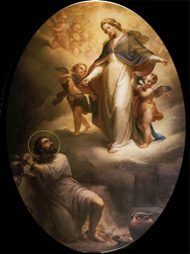 St. Jerome Emiliani, Confessor On the Mode of Teaching Christian Doctrine to Children O God, the Father of mercies, Who wast pleased to make blessed Jerome a father and helper of orphans: grant, we beseech Thee, that by virtue of his merits and intercession, we may always faithfully keep the spirit of adoption, whereby we are both in deed and in name Thy children. Through our Lord etc. (Roman Breviary) St. Jerome Emiliani was a member of one of the patrician families of Venice, and, like many other Saints, in early life a soldier. He was appointed governor of a fortress among the mountains of Treviso, and whilst bravely defending his post, was made prisoner by the enemy. In the misery of his dungeon he invoked the great Mother of God, and promised, if she would set him free, to lead a new and a better life. Our Lady appeared, broke his fetters, and led him forth through the midst of his enemies. At Treviso he hung up his chains at her altar, dedicated himself to her service, and on reaching his home at Venice devoted himself to a life of active charity. His special love was for the deserted orphan children whom, in the times of the plague and famine, he found wandering in the streets. He took them home, clothed and fed them, and taught them the Christian truths. From Venice he passed to Padua and Verona, and in a few years had founded orphanages through Northern Italy. Some pious clerics and laymen, who had been his fellow-workers, fixed their abode in one of these establishments, and devoted themselves to the cause of education. The Saint drew up for them a rule of life and thus was founded the Congregation, which still exists, of the Clerks Regular of Somascha. St. Jerome died February 8, 1537, of an illness which he had caught in visiting the sick. Reflection--Let us learn from St. Jerome to exert ourselves in behalf of the many hundred children whose souls are perishing around us for want of some one to show them the way to heaven. July 20th, St. Margaret, Virgin and Martyr 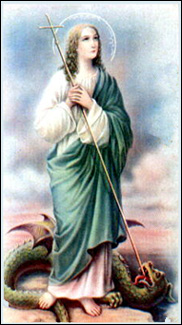 St. Margaret, Virgin and Martyr 14 Holy Helpers Prayers for the Preservation of Chastity. An Explanation and Defense of the Virtue of Chastity On the Anger of God Against the Vice of Impurity On the Folly of Impure Desires of Sensual Pleasures The Angelic Virtue On the Incurableness of the Vice of Impurity |
July 21st, St. Praxedes, Virgin
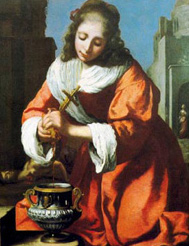
A Prayer to the Virgin Saints O Glorious St. Praxedes, and all you blessed virgins who, by your purity and your ardent love, were upon earth the delight of your God, pray for me, who alas! am not the object of His delight, but who am the cause of His sufferings through my evil life. Pray to Him to pardon me, to give me a new heart, a heart pure and full of love like unto yours. Amen Showing Forth Our Faith The Three Steps to Heaven Graciously hear us, O God our salvation: and grant that we, who are gladdened by the festival of blessed Praxedes Thy Virgin, may therefrom learn loving devotion towards Thee. Through our Lord etc. (Roman Breviary) Praxedes, a Roman virgin, sister of the virgin Prudentiana, when the emperor Marcus Antoninus was persecuting the Christians, bestowed upon them wealth, labors, consolation, and every work of charity. For some she concealed in her house; others, she encouraged to firmness of faith; she buried the bodies of others; and for those who were shut up in prison, or who were put to forced labor she saw to it that there was nothing lacking. When she could no longer endure so great a slaughter of the Christians, she prayed God, that, if it were expedient for her to die, he would take her away from such great evils. Accordingly, on the twelfth of the Calends of August (July 21st) she was called to heaven, to receive the reward of her charity. Her body was buried by the priest Pastor, in the tomb of her father and her sister Pudentiana, which was in the cemetery of Priscilla, on the Salarian way. |
July 22nd, St. Mary Magdalen, Penitent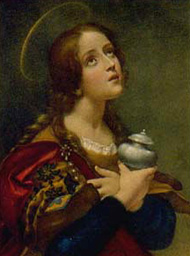
St. Mary Magdalene, Penitent On the Conversion of St. Mary Magdalene Prayers for the Preservation of Chastity. An Explanation and Defense of the Virtue of Chastity True Conversion: One of the best sermons for Hardened Sinners Motives for the Conversion of Sinners The Penitent Christian The Ravages of Adultery On Spiritual Murder On the Horror of Mortal Sin Impediment to Marriage: Bond of Previous Marriage Marriage Impediment: Impediment of Crime (Adultery) The 6th Commandment The 9th Commandment Sermon on Keeping the 10 Commandments The Commandments The Sin of Impurity Unchaste Thoughts Contrition: Explanation of Perfect Contrition and the Necessity of Contrition for Forgiveness of Sins Part 1 of 3 on the Vice of Lust: The Folly of Impure Desires of Sensual Pleasures Part 2 of 3 on the Vice of Lust: The Incurableness of Impurity Part 3 of 3 on the Vice of Lust: The Anger of God Against the Vice of Impurity Temptations The Necessity of Avoiding Occasions of Sin by St. Alphonsus Liguori Catholic Laws on Marriage and Divorce Duties of Married People Holy Purity Repentance: Sermon of John Vianney Our Lady Refuge of Sinners On the Preparation Necessary to Make a Good Confession On Motives for Repentance and Contrition Necessary for a Good Confession Examination of Conscience Directions for Confession The Form of Absolution Directions Afer Confession Thanksgiving After Confession Temptations and the Devils that Tempt To fight against Satan, The Medal or Cross of St. Benedict, by Prosper Gueranger St. Michael/ Exorcism St. Mary Magdalen, Penitent May we be helped by the intercession of blessed Mary Magdalene, we beseech Thee, O Lord: who in answer to her prayers didst raise her brother Lazarus to life after he had been dead four days: Who livest etc. Ant. Mary anointed the feet of Jesus, and wiped them with her hair, and the house was filled with the odor of the ointment. (Roman Breviary) Or the earlier life of Mary Magdalen we know only that she was "a woman who was a sinner." From the depth of her degradation she raised her eyes to Jesus with sorrow, hope, and love. All covered with shame, she came In where Jesus was at meat, and knelt behind him. She said not a word, but bathed His feet with her tears, wiped them with the hair of her head, kissed them in humility, and at their touch her sins and her stain were gone. Then she poured on them the costly unguent prepared for far other uses; and His own divine lips rolled away her reproach, spoke her absolution, and bade her go in peace. Thenceforward she ministered to Jesus, sat at His feet, and heard His words. She was one of the family "whom Jesus so loved" that He raised her brother Lazarus from the dead. Once again, on the eve of His Passion, she brought the precious ointment, and, now purified and beloved, poured it on His head, and the whole house of God is still filled with the fragrance of her anointing. She stood with Our Lady and St. John at the foot of the cross, the representative of the many who have had much forgiven. To her first, after His blessed Mother, and through her to His apostles, Our Lord gave the certainty of His resurrection; and to her first He made Himself known, calling her by her name, because she was His. When the faithful were scattered by persecution the family of Bethany found refuge in Provence. The cave in which St. Mary lived for thirty years is still seen, and the chapel on the mountaintop, in which she was caught up daily, like St. Paul, to "visions and revelations of the Lord." When her end drew near she was borne to a spot still marked by a "sacred pillar," where the holy Bishop Maximin awaited her; and when she had received her Lord, she peacefully fell asleep in death. Reflection--"Compunction of heart," says St. Bernard, "is a treasure infinitely to be desired, and an unspeakable gladness to the heart. It is healing to the soul; it is remission of sins; it brings back again the Holy Spirit into the humble and loving heart." |
July 23rd, St. Apollinaris, Bishop and Martyr. 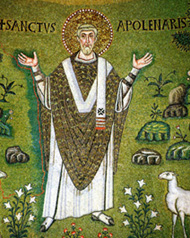 July 23rd, St. Apollinaris, Bishop and Martyr O God, the Rewarder of all faithful souls, who hast made this day holy by the martyrdom of Thy Priest the blessed Apollinaris: grant to us thy servants, we beseech Thee, that we, who are keeping his holy festival, may obtain pardon through his prayers. Through or Lord etc. V. Thou hast crowned him with glory and honor, O Lord. R. And hast set him over the works of thy hands (Roman Breviary) St. Apollinaris was the first Bishop of Ravenna; he sat twenty years, and was crowned with martyrdom in the reign of Vespasian. He was a disciple of St. Peter, and made by him Bishop of Ravenna. St. Peter Chrysologus, the most illustrious among his successors, has left us a sermon in honor of our Saint, in which he often styles him a martyr; but adds, that though he frequently suffered for the Faith, and ardently desired to lay down his life for Christ, yet God preserved him a long time to His Church, and did not allow the persecutors to take away his life. So he seems to have been a martyr only by the torments he endured for Christ, which he survived at least some days. His body lay first at Classis, four miles from Ravenna, still a kind of suburb to that city, and its seaport till it was choked up by the sands. In the year 549 his relics were removed into a more secret vault in the same church. St. Fortunatus exhorted his friends to make pilgrimages to the tomb, and St. Gregory the Great ordered parties in doubtful suits at law to be sworn before it. Pope Honorius built a church under the name of Apollinaris in Rome, about the year 630. It occurs in all martyrologies, and the high veneration which the Church paid early to his memory is a sufficient testimony of his eminent sanctity and apostolic spirit. Reflection--The virtue of the Saints was true and heroic, because humble and proof against all trials. Persevere in your good resolutions: it is not enough to begin well; you must so continue to the end. Grant, we beseech Thee, almighty God: that the holy festival of blessed Liborius, Thy Confessor and Bishop may both increase our devotion and advance our salvation. Through our Lord etc. July 23rd, St. Liborius, Bishop and Confessor He was descended of a noble Gaulish family, and by his innocence and sanctity of life was recommended to the priesthood in the church of Mans. He loved retirement and prayer, never conversed with seculars but on spiritual accounts, and linked himself only with those among the clergy whose actions and words were such as might inspire him more and more with the spirit of his state. His distinguished learning and virtue fixed all eyes upon him, and in 348 he was chosen fourth bishop of Mans. Indefatigable in all the functions of his charge, he prayed and fasted much, and was most attentive in succouring the necessities of the poor, by that means to draw down the blessing of God upon himself and his flock. He built and endowed many new churches in his diocess, and having governed it forty-nine years, died about the year 397. His remains were translated to Paderborn in 836, and he is honoured as patron of that city. |
July 24th, St. Christina, Virgin and Martyr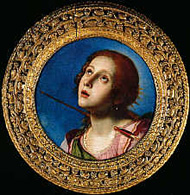 St. Christina, Virgin and Martyr The Value of Time Part 12: Resisting the Enemies of Our Salvation St. Christina, Virgin and Martyr May blessed Christina, Thy Virgin and Martyr earnestly entreat for us pardon from Thee, we beseech Thee, O Lord: for both by her chastity and by her acknowledgment of Thy power she ever pleased Thee well. Through or Lord etc. (Roman Breviary) St. Christina was the daughter of a rich and powerful magistrate named Urbain. Her father, who was deep in the practices of heathenism, had a number of golden idols, which our Saint destroyed, and distributed the pieces among the poor. Infuriated by this act, Urbain became the persecutor of his daughter; he had her whipped with rods and then thrown into a dungeon. Christina remained unshaken in her faith. Her tormentor then had her body torn by iron hooks, and fastened her to a rack beneath which a fire was kindled. But God watched over His servant and turned the flames upon the lookers-on. Christina was next seized, a heavy stone tied about her neck, and she was thrown into the lake of Bolsena, but she was saved by an angel, and outlived her father, who died of spite. Later, this martyr suffered the most inhuman torments under the judge who succeeded her father, and finally was thrown into a burning furnace, where she remained, unhurt, for five days. By the power of Christ she overcame the serpents among which she was thrown; then her tongue was cut out, and afterwards, being pierced with arrows, she gained the martyr's crown at Tyro, a city which formerly stood on an island in the lake of Bolsena in Italy, but was long since swallowed up by the waters. Her relics are now at Palermo in Sicily. |
July 25th, St. James, Apostle and St. Christopher, Martyr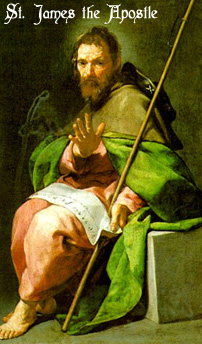 St. James the Greater, Apostle The Labor of the Apostles: Their Teaching of the Nations. St. James the Greater--page 148 The Catholic Church's Teaching on Justification Vol. 1, Part 2: The Ministry of Jesus Christ from the Latin Vulgate, as Illustrated by Catholic Artist and Historian, James Tissot, 1899 Vol. 2: Parables and Teachings of Jesus Christ from the Latin Vulgate, as Illustrated by Catholic Artist and Historian, James Tissot, 1899 The Lives of the 12 Apostles and St. Paul: The Apostles Creed The Church is Apostolic Queen of Apostles Litany of the Saints St. James, Apostle Sanctify Thy people, O Lord, and keep them: so that, strengthened by the help of James Thy Apostle, They may become pleasing to Thee in the conduct of Their lives and may serve thee without fear. Through our Lord etc. (Roman Breviary) Among the twelve Apostles, three were chosen to be the close companions of our Blessed Lord, and of these James was one. He, with Peter and John, was admitted to the house of Jairus when his dead child was raised to life (Luke 8:40 ff.); only these three were taken up to the high mountain of Thabor and beheld the face of Jesus shining as the sun, and His garments white as snow (Mark 9:2-7). These three alone witnessed the fearful agony in Gethsemane. (Luke 22:39-45). What was it that won James a place among the favorite three? Faith, burning, impetuous and outspoken, the straightforwardness of the true Israelite, were visible in him; but these qualities needed purifying before the "Son of Thunder" could proclaim the Gospel of peace. It was James who suggested fire from heaven to consume the inhospitable Samaritans, and who sought a place of honor beside Christ in His kingdom. Yet Our Lord, in rebuking his presumption, prophesied his faithfulness unto death. (Mark 10:38-40) He went to Spain after the death of Our Lord, and remained there for nine years, according to tradition. The famous Basilica of Saint James of Compostello, one of the most frequented pilgrimage sites of Europe, the site also of countless miracles, commemorates the memory of the nation's beloved Apostle. In the year 44 Saint James, who was at that time in Jerusalem, was brought before King Herod Agrippa. The Apostle had been preaching fearlessly there, curing the sick and the blind, and delivering possessed persons. Two magicians were sent by the authorities to stop his doings by their charms, but both were converted. His enemies were not defeated by that, however, and paid two Roman captains to incite a sedition during the Apostle's preaching, then seize him as its author. A certain Josias, a scribe among the Pharisees, put a cord around his neck and took him before the third Herod, grandson of the first, murderer of the Innocents, and nephew of the second, who had the Baptist decapitated. This new sycophant of the Roman Emperors, desiring to conciliate the Jews and make them forget his non-Jewish origins, decided to do so by persecuting the Christians. Without delay he condemned Saint James to die by the sword. The Apostle's fearless confession of Jesus crucified so moved the scribe Josias, that he too confessed Christ and begged pardon of the Saint. He was taken with the Apostle to the place of execution, where Saint James and his convert died together. The Apostle won the three crowns of heroism: he is a Doctor par excellence of the Faith, he was the first Apostle to be martyred, and according to Saint Epiphanus and other historians, he always conserved his virginity. He is the patron of Spain. A Spanish author by the name of Tamayo reports fifteen different apparitions of Saint James to the kings and princes of Spain, followed each time by some specific assistance for the benefit of the land. July 25th, St. Christopher, Martyr 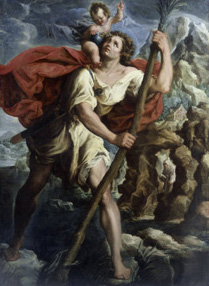 St. Christopher, Martyr 14 Holy Helpers (St. Christopher was a native of Chanaan. While carrying people across a raging stream, it is believed that he carried the Christ Child across this same stream. His name Christopher, which means Christbearer, is also understood in the spiritual sense of bearing Christ in his heart. A generous soul, he walked like a giant in the way of virtue. The piety of our fathers inspired by this grand allegory caused them to place a colossal statue of St. Christopher at the entrance to cathedrals. He is the patron of travelers and is invoked against storms, plagues and died a martyr under the reign of Emperor Decius.) Grant, we beseech thee almighty God: that we who are keeping the festival of blessed Christopher, Thy Martyr, may through his intercession be strengthened in the love of Thy name. Through our Lord etc. (Roman Breviary) Prayer to St. Christopher: O God, Who didst make St. Christopher a true Christ-bearer who converted multitudes to the Christian faith, and Who didst give him the grace to suffer for Thy sake the most cruel torments; through the intercession of this Saint we implore Thee to protect us from sin, the only real evil. Preserve us, also, against harmful elementary forces, such as earthquake, lightning, fire, and flood. Amen. |
July 26th, St. Anne, Mother of the Blessed Virgin Mary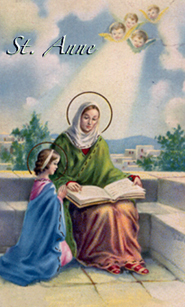 St. Anne, Mother of the Blessed Virgin Mary. Novena, Litany and Chaplet of St. Anne Feast of St. Ann, Mother of the Blessed Virgin Mary and Consideration by Bishop Challoner The Nature of Marriage: St. Joachim and St. Ann, Patron Saints of Catholic Marriage How Catholics Should Prepare for a Happy Marriage The Life of the Blessed Virgin Mary, St. Joseph, St. Joachim and St. Anne, 1859 Prayers for Catholic Mothers What is it to be a Mother? The Christian Mother St. Anne, Mother of the Blessed Virgin Mary O God, Who didst vouchsafe to endow blessed Anne with grace, that she might be worthy to become the mother of her who brought forth thy only-begotten Son: grant in Thy mercy, that we who keep her festival may also be helped by her intercession. Through the same. Through our Lord etc. (Roman Breviary) Sermon by St. John Damascene The home of Anne is set before us, giving an example at once of married life and of virginity, the first in the person of the mother, the second in that of the daughter; of whom the one has just been freed from sterility, and the other, a little later on, is to bring forth Christ in a supernatural birth, adapted by a divine artifice to the circumstances of our nature. Therefore, filled with the divine Spirit, her soul happy and joyous, deservedly does Anne cry aloud: Rejoice with me, for from my sterile womb I have borne the bud of promise, and, as I had desired, I feed at my breast the fruit of blessing. I have put off the mourning-garment of sterility, and put on the joyful raiment of fruitfulness. Let that [other] Anne, the rival of Phenenna, rejoice with me this day, and let her celebrate with me this new and unexpected miracle, which has been wrought in me, as it was in her. Let Sara rejoice, she who rejoiced in conception in her old age, and foreshadowed my conception from sterility. Let all the barren and childless sing in harmony together at my visitation made to me from heaven in a wonderful manner. Likewise, let all mothers endowed with this fruitfulness say: Blessed be He who granted what they wished to those who prayed to Him, and Who gave fruit to the sterile, and granted to her to bear that most happy bud, the Virgin who was the Mother of God according to the flesh, whose womb was a heaven, in which he dwelt whom no place can contain. And let us also offer praise becoming to these very things, that she who was called sterile now stands forth as the mother of a virgin mother. Let us say to her in the words of Scripture: How blessed is the house of David, from which thou hast sprung, and the womb in which God fashioned the ark of sanctification, that is, her from whom he himself was conceived without seed. Truly blessed art thou, and thrice blessed, thou who hast borne an infant given thee by the blessing or God, that is to say, Mary, whose very name is likewise to be honored in the highest degree; from whom came forth Christ, the flower of life; a Virgin whose origin was glorious, and whose child-bearing was above all the world. We also congratulate thee, most blessed woman; for truly thou hast brought forth by the divine bounty the hope of all of us, that is, the child of promise. Blessed indeed art thou; and blessed is the fruit of thy womb. For the tongues of the godly magnify Thy offspring, and every joyful word is spoken concerning thy child. It is truly fitting indeed, and most fitting it is, to praise her, who received a revelation by the divine goodness, and brought forth for us such and so great a fruit, from whom came forth the sweet Jesus. |
July 27th, St. Pantaleon, Martyr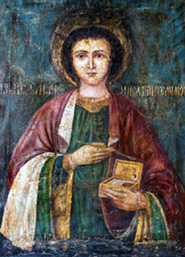 St. Pantaleon, Physician and Martyr. Novena and Litany for the Sick 14 Holy Helpers The Corporal Works of Mercy The Spiritual Works of Mercy Index of Prayers and Devotions for the Sick Index of Prayers and Devotions for the Dying The Sickness of the Body is a Blessing to the Soul Sickness: an Opportunity for Merit & the Dangers of Delaying Conversion Instruction Concerning the Value of Time and Consolation in Sickness St. Pantaleon, Martyr Grant, we beseech thee, almighty God: that by the intercession of blessed Pantaleon Thy Martyr, our bodies be delivered from all harm, and our hearts cleansed from wicked thoughts. Through our Lord etc. V. The just shall flourish like the palm-tree. R. He shall grow like the cedar of Libanus. R. This Saint hath striven for the law of his God even unto death, and hath not feared for the words of the ungodly: For he had been founded upon a firm rock. V. This is he, who hath despised the life of the world, and hath attained to the heavenly kingdoms. (Roman Breviary) Saint Pantaleon was born in Nicomedia of a pagan father and a Christian mother, who died while her son was still a child. He was among the court physicians of the Emperor Galerius Maximianus. Deceived by hearing the false maxims of the world applauded, he was without religion when God decided to rescue his soul from its unhappy darkness. A zealous and prudent Christian named Hermolaus took special notice of him and awakened his conscience, telling him that although the famous physicians of ancient times had possessed the science which cures bodies, Jesus Christ was a far more excellent Physician, able to cure not only bodies, but souls, by His divine doctrine. Hermolaus succeeded in bringing him into the fold of the Church. The young Christian strove to procure for his father the same grace he himself had received, and his words had already begun to separate his father from his idols, when one day a blind man, led by friends, came to the door and begged Pantaleon to cure him. His father was present and heard the promise his son made to this man to do so, if he would give to the poor the money he was offering him. The father was amazed and feared that the promise could not be fulfilled. But the young Saint prayed and touched the eyes of the blind man, invoking the name of Jesus Christ, and his eyes were opened. Pantaleon's father and the blind man were both baptized as a result of this miracle. When Eustorgus, his father, died, Saint Pantaleon liberated all his slaves and, having sold most of his possessions, gave to the liberated ones and others the assistance their poverty required. He cured other illnesses and soon became renowned in Nicomedia. Saint Pantaleon, being a very sincere penitent, ardently wished to expiate his former idolatry by the martyrdom he could foresee. When a bloody persecution broke out at Nicomedia in 303, the blind man he had cured was beheaded upon refusing to admit that it was the gods who had cured him. Saint Pantaleon, to prepare himself for the imminent combat, distributed all he had left among the poor. Not long after this act of charity he was arrested and subjected to various tortures, during which he was preserved from death. Three other Christians, of whom one was Hermolaus, were apprehended. After suffering many torments, the four confessors were all sentenced to be beheaded. The relics of Saint Pantaleon were translated to Constantinople, and there received great honor. His blood, conserved in a small vial, is said to liquefy on his feast day and become oxygenated. Charlemagne brought a part of his relics into France, where they are presently divided again, a portion being in the abbey of Saint Denys near Paris, and the head at Lyons. Saint Pantaleon, whose name means the "all-compassionate one," is the patron of physicians. |
July 28th, St. Nazarius (Child Saint) and Celsus, Martyrs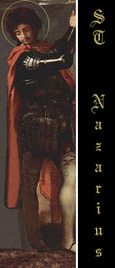
On the Great Commandment of Divine Love Purchased by His Blood July Meditations in Honor of the Precious Blood A Prayer to the Holy Martyrs to Obtain Their Protection O ye blessed Princes of the heavenly kingdom! ye who sacrificed to the Almighty God the honors, the riches, and possessions of this life, and have received in return the unfading glory and never-ending joys of heaven! ye who are secure in the everlasting possession of the brilliant crown of glory which your sufferings have obtained! Look with compassionate regards upon our wretched state in this valley of tears, where we groan in the uncertainty of what may be our eternal destiny. And form that divine Savior, for Whom you suffered so many torments, and Who now repays you with so unspeakable glory, obtain for us that we may love Him with all our heart, and receive in return the grace of perfect resignation under the trials of this life, fortitude under the temptations of the enemy, and perseverance to the end. May your powerful intercession obtain for us that we may one day in your blessed company sing the praises of the Eternal, and even as you now do, face to face, enjoy the beatitude of His vision! Amen (St. Alphonsus de Liguori) May the blessed confession of Thy Saints, Nazarius, Celsus, Victor, and Innocent, O Lord, be our defense: and graciously win us support in our weakness. Through our Lord etc. V. Be glad in the Lord, and rejoice, ye just. R. And glory all ye upright of heart. Ant. For theirs is the kingdom of heaven, who have despised the life of the world, and have attained to the rewards of the kingdom, and have washed their robes in the blood of the Lamb. (Roman Breviary) St. Nazarius and Celsus, Martyrs Saint Nazarius, born in Rome, was the son of a pagan military man who held an important post in the Roman army. His mother, honored by the Church as Saint Perpetua, was a zealous Christian, instructed by Saint Peter or his disciples in the most perfect maxims of Christianity. Nazarius at the age of nine embraced the Faith with so much ardor that he copied in his own young life all the great virtues he saw in his teachers. He was baptized by Saint Linus, who would later become Pope. His pagan father was touched by his son's virtue and seconded his project to go elsewhere to preach the Gospel. Out of zeal for the salvation of others, Nazarius therefore left Rome, his native city, and preached the Faith in many places with a fervor and disinterestedness fitting for a disciple of the Apostles. Ten years later he is known to have been in Milan. He was driven from the city by the prefect after being whipped, and he left Italy to go to eastern Gaul or France. There a young boy by the name of Celsus was brought to him; his mother asked him to teach and baptize her son, and to take him for his disciple. The child was docile, and Nazarius did so; and they were never separated. When conversions multiplied, the local governor was alarmed and the apostle was again arrested, beaten and tortured. The wife of this governor was a Christian, however, and succeeded in obtaining liberty for the two young innocents. They were freed on condition they would not preach at this place any longer. The two fervent Christians went to the Alpine villages where only a few solitary settlers braved the rigors of the climate and the altitude. They were not rebuffed and went as far as Embrun. There they built a chapel to the true God, and then continued on to Geneva, and to Treves where Saint Nazarius was arrested and imprisoned. Celsus followed him in tears, longing to share his captivity. When after a few days the prefect ordered them brought before him, they were treated cruelly but appeared before the magistrate, their faces shining with glory. The prodigies which followed caused fear in the pagans, and they were released and told to leave the region. They returned to Milan, but were soon arrested there also. When they would not sacrifice to the gods of the empire, after several tortures in which God again preserved them, they were sentenced to be beheaded. They embraced one another in transports of joy and praise to God for this grace. It was during the reign of Nero, in about the year 56, that these generous Martyrs added their blood to the treasure of the Christians. Their bodies were buried separately in a garden outside the city, where they were discovered and taken up by Saint Ambrose in 395. In the tomb of Saint Nazarius, whose decapitated body and head were perfectly conserved, a vial of the Saint's blood was found as fresh and red as if it had been spilt that same day. Saint Ambrose conveyed the bodies of the two martyrs into the new church of the Apostles which he had just built. A woman was delivered of an evil spirit in their presence. Saint Ambrose sent some of these relics to Saint Paulinus of Nola, who received them with great respect as a most valuable gift, as he himself testifies, and placed them in honor at Nola. |
July 29th, St. Martha, Virgin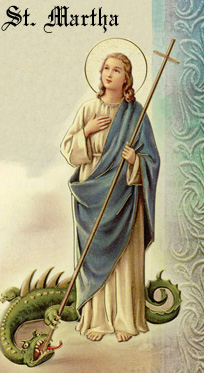
St. Martha On the Pleasure of Serving God St. Martha, Virgin Graciously hear us, O God our salvation: and grant that we, who are gladdened by the festival of blessed Martha Thy Virgin, may therefrom learn loving devotion towards Thee. Through our Lord etc. V. With thy comeliness and thy beauty. R. Set out, proceed prosperously, and reign. Ant. The souls of the Saints, who have followed the footsteps of Christ, rejoce in heaven; and, because they have shed their blood for his love, therefore do they exult with Christ forever. V. The Saints shall rejoice in glory. R. They shall be joyful in their beds. (Roman Breviary) Martha was born of noble and wealthy parents, but she is more illustrious for her hospitality to Christ the Lord. After his ascension into heaven she was seized by the Jews, together with her brother and sister, Marcella her woman-in-waiting, and Maximinus, one of the seventy-two disciples of Christ the Lord, who had baptized the whole household, and many other Christians. They were put on board a ship without sails or oars, and left on the open sea, exposed to certain shipwreck. But the ship, steered by God, came to a safe harbor at Marseilles, and they were all saved. This miracle, together with their preaching, brought first the people of Marseilles, and then of Aix and of the neighborhood, to believe in Christ. Lazarus was made bishop of Marseilles, and Maximinus of Aix. But Magdalene, who was accustomed to prayer and to sit at the Lord's feet, in order to enjoy the better part which she had chosen, that is, contemplation of the joys of heaven, retired into a cavern on a very high mountain. There she lived for thirty years, separated from all human association; and every day during that period she was carried aloft by the Angels to hear the heavenly praises. But Martha, after having won the hearts of the people of Marseilles to a love and admiration of the wonderful charity and holiness of her life, withdrew in the company of several very virtuous women to a spot remote from men, where she lived for a long time, greatly renowned for her piety and prudence. She foretold her death long before it occurred; and at length, famous for miracles, she passed to the Lord on the fourth of the Calends of August (July 29). Her body is held in great veneration at Tarascon. July 29th, Sts. Felix, Simplicius, Faustinus and Beatrice, Martyrs Grant, O Lord, we beseech Thee: that the Christian people, who are gladdened in this life by the festival of Thy Martyrs Felix, Simplicius, Faustinus and Beatrice, may so rejoice in life everlasting, and may receive the fruit of the sacrifice which they offer. Through our Lord etc. (Roman Breviary) |
July 30th, Sts. Abdon and Sennen, Martyrs
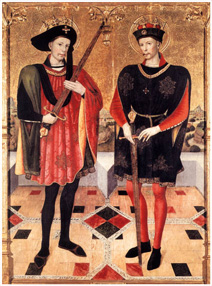
O God, Who didst endow Thy holy ones Abdon and Sennen with abundant gifts of Thy grace, and so bring them to their present glory: grant thy servants the forgiveness of their sins; so that, by the merits of Thy Saints which plead for them, they may become worthy to be free from all harm. Through our Lord etc. Ant. For theirs is the kindom of heaven, who have despised the life of the world, and have attained to the rewards of the kingdom, and have washed their robes in the blood of the Lamb. V. Be glad in the Lord, and rejoice, ye just. R. And glory, all ye upright of heart. (Roman Breviary) The emperor Decius, enemy of Christians, had defeated the king of Persia and become master of several countries over which he reigned. He had already condemned to torture and death Saint Polychrome, with five members of his clergy. Saint Abdon and Saint Sennen, illustrious Persian dignitaries of the third century whom the king of Persia had highly honored, were secretly Christian; it was they who had taken up the body of the martyred bishop, which had been cast contemptuously before a temple of Saturn, to bury it at night, with honor. The two royal officials, now fallen under the domination of Rome, were grieved to witness the emperor's cruelty towards the faithful, and believed it their duty to make known their love for Jesus Christ; thus, without fear of their new sovereign, they undertook by all possible means to spread and fortify the faith, to encourage the confessors and bury the martyrs. Decius, learning of their dedication, was extremely irritated. He sent for the two brothers to appear before his tribunal, and attempted to win them over to sacrifice to the gods, by appealing to his recent victory as a sign of their favor. The Saints replied, however, that this victory was not at all a proof of such power, since the unique true God, Creator of heaven and earth with His Son, Jesus Christ, gives victory to some and defeat to others, for reasons hidden in the designs of His providence. They said they could never adore any but Him, and Decius imprisoned them. Soon afterwards, when he learned of the death of the viceroy he had left to govern in his place at Rome, he returned to Rome and took his two captives with him to serve as splendid trophies of his Persian victory. In effect, these magistrates were wearing jewels and rich fabrics under their chains. He arraigned them before the Senate, in whose presence they again testified to the divinity of Christ, saying they could adore no other. The next day they were flogged in the amphitheater; then two lions and four bears were released to devour them. But the beasts lay down at their feet and became their guardians, and no one dared approach for a time. Finally the prefect sent out gladiators to slay them with the sword, which with the permission of God was done. Their bodies remained three days without burial, but a subdeacon, who afterwards wrote their history, took them up and buried them on his own terrain. Under Constantine the Great, their tombs were discovered by divine revelation and their relics reburied in the Pontian cemetery, which afterwards was called by their names. We see them in a picture of the catacombs, crowned by Our Lord Himself. Their glorious martyrdom occurred in the year 254. Prayer: Hearken to our earnest prayers, O blessed martyrs! May the faith at length triumph in that land of Persia whence so many flowers of martyrdom have been culled for heaven. Before the time appointed for the struggle to begin in your native land, ye went to meet death elsewhere, and thus ye gained a new fatherland whereon to bestow your love. Bless us the fellow citizens of your choice, and bring us all to the eternal fatherland of all the children of God. A Prayer to the Holy Martyrs to obtain their Protection O ye blessed Princes of the heavenly kingdom! ye who sacrificed to the Almighty God the honors, the riches, and possessions of this life, and have received in return the unfading glory and never-ending joys of heaven! ye who are secure in the everlasting possession of the brilliant crown of glory which your sufferings have obtained! Look with compassionate regards upon our wretched state in this valley of tears, where we groan in the uncertainty of what may be our eternal destiny. And from that divine Savior, for Whom you suffered so many torments, and Who now repays you with so unspeakable glory, obtain for us that we may love Him with all our heart, and receive in return the grace of perfect resignation under the trials of this life, fortitude under the temptations of the enemy, and perseverance to the end. May your powerful intercession obtain for us that we may one day in your blessed company sing the praises of the Eternal, and even as you now do, face to face, enjoy the beatitude of His vision! Amen |
July 31st, St. Ignatius, Confessor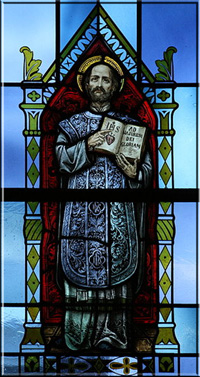 Litany, Prayers and Sermons for St. Ignatius of Loyola Novena to St. Ignatius of Loyola: July 23rd - July 31st Autobiography of St. Ignatius of Loyola, Founder of the Jesuits Instructions for the Feast of St. Ignatius of Loyola The Spiritual Exercises: According to the Method of Saint Ignatius of Loyola St. Ignatius, Confessor O God, Who, to spread the greater glory of thy name, didst by means of blessed Ignatius reinforce Thy Church militant by the addition of a new army: grant that, with his help and by his example, we may so fight on earthy as to become worthy to be crowned with him in heaven. Through our Lord etc. V. The Lord loved him, and adorned him. R. He clothed him with a robe of glory. Ant. I will liken him to a wise man who built his house upon a rock. (Roman Breviary) Saint Ignatius was born at Loyola in Spain, in the year 1491. He served his king as a courtier and a soldier until his thirtieth year. At that time a cannon ball broke the right leg of the young officer, who in a few days had reached the brink of death and received the Last Sacraments. It was the eve of the feast day of Saint Peter and Saint Paul; he fell asleep afterwards and believed he saw Saint Peter in a dream, restoring him to health by touching his wound. When he woke, his high fever was gone and he was out of danger, although lame. To pass the time of his convalescence after three operations, he asked for books; the Life of Christ and lives of the Saints were brought to him. He read them distractedly at first, then with profound emotion. He underwent a violent combat, but finally grace won out. He began to treat his body with the utmost rigor and rose every night to weep over his sins. One night, he consecrated himself to the Saviour through the intercession of Our Lady, Refuge of Sinners, swearing inviolable fidelity to the Son and His Mother. Not long afterwards, to fortify him in his good resolutions, Mary appeared to him surrounded by light, holding in Her arms the Child Jesus. His heart purified by this vision, Ignatius made a general confession and a pilgrimage to Montserrat, to venerate a miraculous image of the Mother of God and implore Her protection, then bought a rude long habit for the pilgrimage he was planning to make to Jerusalem. He set out on foot, wearing only one sandal for his lame leg. He spent some time at Manreza caring for the sick and undertaking a life of austerity equaled only by the most celebrated anchorites. Living by alms, fasting on bread and water, wearing a hair shirt, he remained kneeling every day for six or seven hours in prayer. The devil made vain efforts to discourage him. He fell ill, however, and was carried to the hospital from the cavern where he was staying. It was only out of obedience to his director at Montserrat that he ceased his extreme penance, and found again, through his obedience, the peace of soul he had lost. At Manreza he composed his famous Spiritual Exercises for retreatants, which ever since have brought to grace and fervor great numbers of souls. After a journey to Rome and other points of pilgrimage in Italy, he embarked for the Holy Land. He wished to remain there to work for the conversion of souls, but was commanded by the enlightened Provincial of the Franciscans, under obedience, to return to Europe. He was then thirty-three years old. Ignatius had already won certain Spanish compatriots to join him in the service of God; it was for them that he had composed the Exercises. With them he undertook studies for several years, and at the end of that time had four companions. He taught catechism while at Alcala, and virtually reformed the entire youth of that city. In 1528, when he was already 37 years old, he went to Paris to study in the greatest poverty, eating his meals at a hospital with the poor. He was persecuted when he converted a number of young persons. It was in Paris, with six young companions, that at Montmartre the Society of Jesus was founded. They made a vow to go to Jerusalem in absolute poverty, or if this proved impossible, which it did, to go to Rome to the Vicar of Christ, and place themselves at his disposition for the service of the Church and the salvation of souls. Our Lord promised Saint Ignatius that the precious heritage of His Passion would never be lacking to his Society. By this term, heritage, the Saviour referred to the contradictions and persecutions the just must always face. Founded to combat error, the Company of Jesus has always had to bear the fury of those who favor it. When Saint Ignatius was cast into prison at Salamanca on suspicion of heresy, he said to a friend who expressed his sympathy, "It is a sign that you have little love of Christ in your heart, or you would not deem it so hard a fate to be in chains for His sake. All Salamanca does not contain as many fetters, manacles, and chains as I would gladly wear for love of Jesus Christ." Saint Ignatius went to receive his crown on July 31, 1556. |
Saints and Feast Days for the Month of August
All of the following are non-moveable feasts that always occurs on the same date each year
All of the following are non-moveable feasts that always occurs on the same date each year
August 1st, St. Peter's Chains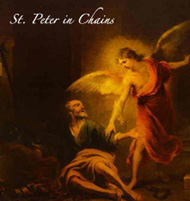 St. Peter's Chains Novena to St. Peter: July 24th - Aug. 1st St. Peter Apostle, First Pope St. Peter and St. Paul Sermons by Fr. Weninger The Lives of the 12 Apostles and St. Paul: The Apostles Creed The Labor of the Apostles: Their Teaching of the Nations On the Denial of St. Peter Contrition Contrition: Explanation of Perfect Contrition and the Necessity of Contrition for Forgiveness of Sins Examination of Conscience The Church The Church is One The Church is Holy The Church is Catholic The Church is Apostolic Short Explanation of the Prayer: Our Father August Meditations on the Prayer "Our Father" The Providence of God and why He permits evil Three Short Sermons on Death and the Particular Judgment O God, Who didst loose the blessed apostle Peter from his bonds and didst send him forth unharmed; loose, we pray Thee, the chains of our sins, and in Thy great mercy keep us from all evil. Through our Lord etc. Ant. Thou art Peter. R. And upon this rock I will build my Church. Ant. Thou art the shepherd of the sheep, O Prince of the Apostles, unto thee were given the keys of the kingdom of heaven. Ant. O holy Apostle Paul, preacher of truth and Doctor of the Gentiles, intercede for us with God who chose thee. V. Thou art a vessel of election, O holy Apostle Paul. R. A preacher of the truth to the whole world. (Roman Breviary) Herod Agrippa, King of the Jews, having put to death St. James the Great in the year 44, in order to gain the affection and applause of his people, caused St. Peter, the prince of the sacred college, to be cast into prison. It was his intention to put him publicly to death after Easter. The whole Church at Jerusalem put up its prayers to God for the deliverance of the chief pastor of His whole flock, and God favorably heard them. The king took all precautions possible to prevent the escape of his prisoner. St. Peter lay fast asleep, on the very night before the day intended for his execution, when it pleased God to deliver him out of the hands of his enemies. He was guarded by sixteen soldiers, four of whom always kept sentry in their turns: two in the same dungeon with him, and two at the gate. He was fastened to the ground by two chains, and slept between the two soldiers. In the middle of the night, a bright light shone in the prison, and an angel appeared near him, and, striking him on the side, awaked him out of his sleep, and bade him instantly arise, gird his coat about him, put on his sandals and his cloak, and follow him. The apostle did so, for the chains had dropped off from his hands. Following his guide, he passed after him through the first and second wards of watches, and through the iron gate which led into the city, which opened to them of its own accord. The angel conducted him through one street, then, suddenly disappearing, left him to seek some asylum. The apostle went directly to the house of Mary the mother of John, surnamed Mark, where several disciples were met together, and were sending up their prayers to heaven for his deliverance. As he stood knocking without, a young woman, knowing Peter's voice, ran in and informed the company that he was at the door; they concluded it must be his guardian angel, sent by God upon some extraordinary account, until, being let in, he related to them the whole manner of his miraculous escape; and having enjoined them to give notice thereof to St. James and the rest of the brethren, he withdrew to a place of more retirement and security, carrying, wherever he went, the heavenly blessing and life. August 1st, The Holy Machabees, Martyrs The seven Machabean brothers were the first martyrs to suffer for their fiath before the advent of Christ. They were martyred during the reign of Antiochus Epiphanes. |
August 2nd, St. Alphonsus de Liguori, Bishop, Confessor, and Doctor of the Church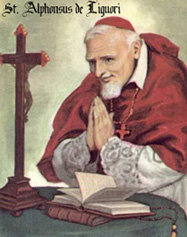 St. Alphonsus Mary of Liguori Bishop, Confessor, and Doctor of the Church. Main Page: Sermons and Prayer Novena to St. Alphonsus de Liguori: Aug 2nd - Aug. 10th. Includes Litany, Prayers and Sermons Instructions for the Feast of St. Alphonsus Maria Ligouri by Fr. Leonard Goffine Clock of the Passion Stations of the Cross Novena to the Sacred Heart by St. Alphonsus Spiritual Communion Additional Sermons by St. Alphonsus Ligouri Meditations on Saving Your Soul: Will it be Heaven or Hell? The Necessity of Avoiding Occasions of Sin by St. Alphonsus Liguori Abuse of Divine Mercy They that Live in Sin Time is No More The Particular Judgment Part 4: The Four Gates of Hell How to Practice Mental Prayer The Prodigal Son by St. Alphonsus Contrition and the Purpose of Amendment O God, Who didst inflame blessed Alphonsus Mary, Thy Confessor and Bishop, with a burning zeal for souls, and by his means didst beget new children in Thy Church: grant, we beseech Thee, That we may be taught by his wholesome doctrine and strengthened by his example, and so may be able happily to come unto Thee. Through our Lord etc. Ant. O excellent Doctor, light of holy Church, blessed Alphonsus Mary, lover of the divine law, pray unto the Son of God for us. V. The Lord Loved Him, and adorned him. R. He clothed him with a robe of glory. (Roman Breviary) Saint Alphonsus was born of noble parents near Naples, in 1696. His spiritual formation was entrusted to the Oratorian Fathers of that city, and from his boyhood Alphonsus was known as a very devout little Brother of the Minor Oratory. At the early age of sixteen he became a doctor in civil law; and entering this career with ardor, he met great success and renown. A mistake, however, by which he lost an important case, showed him the vanity of human fame and glory. He decided to abandon the legal profession at the age of twenty-seven, to labor for the glory of God alone. Alphonsus' father long opposed his decision, but as a man of virtue consented at last. Saint Alphonsus was ordained a priest in 1726, and he soon became as renowned a preacher as he had been a lawyer. His father stopped in a church to pray one day, and amazed, heard his son preaching; he suddenly saw clearly how God had marvelously elevated his son, and was filled with joy, saying: "My son has made God known to me!" As for Alphonsus, he loved and devoted himself to the most neglected souls in the region of Naples. He was a very perfect confessor, and wrote a manual which has been used ever since for the instruction of those who administer the sacrament of Penance. A musician of the first rank, Saint Alphonsus gave up his instruments to devote himself more perfectly to his apostolic labors; he nonetheless composed joyous religious hymns for the poor folk he heard singing in the streets, that they might glorify God and not waste their voices and efforts in vain and worldly songs. To extend and continue his work, he later founded the missionary Congregation of the Most Holy Redeemer, for the evangelization of the poor. At the age of sixty-six he became Bishop of Saint Agatha, a suffragan diocese of Naples, and undertook the reform of his diocese with the zeal of a Saint. He made a vow never to waste a moment of time, and, though his life was spent in prayer and work, he also composed a vast number of books. These volumes were filled with such great science, unction, and wisdom that in 1871 he was declared by Pius IX a Doctor of the Church. Saint Alphonsus wrote his first book at the age of forty-nine, and in his eighty-third year had published about sixty volumes; at that time his director forbade him to continue writing. The best known of his books is his volume entitled "The Glories of Mary", by which he exalts the graces and narrates the wondrous deeds of mercy of the Mother of God for those who invoke Her. Very many of these books were written in the half hours snatched from his labors as a missionary, as a religious Superior, and finally as a Bishop, often in the midst of unrelenting bodily and mental sufferings. With his left hand he would hold a piece of marble against his aching head, while his right hand wrote. Yet he counted no time lost which was spent in charity. He did not refuse to maintain a long correspondence with a simple soldier who asked for his advice, or to play the harpsichord in his declining years, while he taught his novices to sing spiritual canticles. He lived in times of religious laxity, and met with many persecutions and disappointments. During his last seven years he was prevented by constant sickness from offering the adorable Sacrifice, but he received Holy Communion daily, and his love for Jesus Christ and his trust in Mary's prayers sustained him to the end. He died in 1787, in his ninety-first year. August 2nd, St. Stephen, Pope and Martyr O eternal Shepherd, watch over the peace of Thy flock, and through blessed Stephen, Thy Martyr and Sovereign Pontiff, whom thou didst appoint shepherd over the whole Church, keep her under Thy constant protection. Through our Lord etc. (Roman Breviary) |
August 3rd, Finding of the Holy Relics of St. Stephen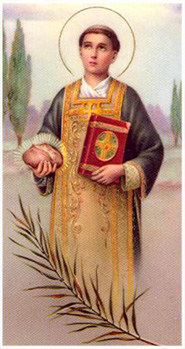 Finding of the Holy Relics of St. Stephen St. Stephen, First Martyr On St. Stephen Novena to St. Stephen: July 26th - Aug. 3rd; Additional Prayers and Devotions Are we bound to profess our Catholic Faith openly? Spiritual Communion Related Links to the Saints Veneration of the Saints The Church Triumphant Feast of the Holy Relics  Complete Index of the Lives of the Saints and their feast days Communion of Saints Litany of the Saints Finding of the Holy Relics of St. Stephen Give us grace, O Lord, we beseech Thee, so to imitate what we reverence: that we may learn to love even our enemies; as we now celebrate the finding of him who, even for his persecutors, knew how to entreat forgiveness of Thy Son, our Lord Jesus Christ: Who liveth etc. Ant. And Stephen, full of grace and fortitude, did great signs among the people. V. Thou hast crowned him with glory and honor, O Lord. R. And hast set him over the works of thy hands. (Roman Breviary) This second festival in honor of the holy protomartyr Saint Stephen was instituted by the Church on the occasion of the discovery of his precious remains. His body had long lain concealed under the ruins of an old tomb in Caphargamala, a place twenty miles from Jerusalem, where there was a church served by a venerable priest named Lucian. In the year 415, on the 3rd of December, the priest was sleeping on his cot in the baptistry, where he habitually retired in order to guard the sacred vessels of the church. Being half awake, he saw a tall, comely old man of venerable aspect, clothed in white and gold, who approached him and called him by his name three times, bidding him go to Jerusalem and tell Bishop John to come and open the tombs where his remains and those of certain other servants of Christ lay. This act would permit God to open the gates of His clemency to many souls, the visitor affirmed. Lucian asked his name, and he replied, "I am Gamaliel, who instructed Saint Paul in the Law." Gamaliel then said they would also find the tomb of Saint Stephen, protomartyr, and of Nicodemus, who came to visit Jesus at night and who, when driven out of Jerusalem by the authorities, had been sheltered by himself in his country residence at the present site. This vision was twice repeated, and on the third visit, the priest was reproached for his delay. He was promised that the discovery would cause a current famine to cease. After the third vision, Lucian went to Jerusalem and laid the whole affair before Bishop John, who directed him to go and search himself for these relics. And Gamaliel appeared again, this time to a holy monk of the same region, to indicate the exact site where the inhabitants of the village should dig. There indeed were found three coffins or chests with the respective names engraved on them; and without opening these, Lucian sent immediately to acquaint Bishop John with the discovery. The bishop was at the Council of Diospolis, and, taking with him the bishops of Sebastis and of Jericho, he journeyed to Caphargamala. Upon the opening of Saint Stephen's coffin the earth trembled, and there came from the coffin an agreeable scent. There was at that moment a vast multitude of people assembled at the burial place, among whom were many persons afflicted with various maladies; seventy-three recovered their health instantly. They kissed the holy relics, and then the chests were closed again. The bishop left the relics of Gamaliel and Nicodemus for the village, and consented to leave a small portion of Saint Stephen's relics there; then, amid the singing of psalms and hymns, the rest of them were carried to the Church of Sion in Jerusalem. They were later transferred to a magnificent church built in his honor in that city, towards the end of the fifth century. The greater part of the relics are presently in Rome. |
August 4th, St. Dominic, Confessor
Devotions to St. Dominic Novena to St. Dominic: July 27th - Aug. 4th St. Dominic and the Attacks of the Devil St. Dominic and the History of the Rosary Instructions for the Feast of St. Dominic Encyclical on the Recitation of the Rosary Prayers of Our Lady of the Rosary The Excellence of the Rosary, Rev. M. J. Frings, 1912 The Book of the Holy Rosary, as explained by the Church Fathers and prefigured in the Old Testament How to Say the Rosary Rosary Novenas Daily Rosary: Joyful Mysteries with Meditations Daily Rosary: Sorrowful Mysteries with Meditations Daily Rosary: Glorious Mysteries with Meditations Ave Maria 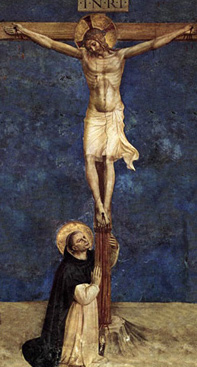
St. Dominic, Confessor O God, Who hast vouchsafed to make Thy Church illustrious by the merits and teaching of blessed Dominic Thy Confessor: grant that, through his intercession, she may not be deprived of temporal help, and may continually advance in spiritual growth. Through our Lord. V. The Lord loved him, and adorned him. R. He clothed with a robe of glory. Ant. I will liken him to a wise man who built his house upon a rock. (Roman Breviary) Saint Dominic de Guzman was born in Spain in 1170. As a student, he sold his books to feed the poor during a famine, and offered himself to ransom a slave. At the age of twenty-five, after taking the religious habit he became acting Superior of the Canons Regular of Saint Augustine in Osma, and was soon offered an episcopal chair at Compostella. He answered as afterward he also answered many times: "God has not sent me to be a bishop, but to preach." He accompanied his prelate to southern France on a commission for the king of Castille. There his heart was well-nigh broken by the ravages of the Albigensian heresy, a variant of ancient Manicheanism, and the source of devastating wars in southern France. His life from that time on was devoted to the conversion of heretics and the defense of the Faith. In the year 1199, while he was still a Canon Regular of Saint Augustine and was preaching near the Spanish coasts, he was taken captive, with all his audience and a Brother in religion, by a band of pirates. They placed the prisoners in their galleys at the oars. When a furious storm broke, the young Saint exhorted the disciples of Mohammed to think seriously of their souls, to open their eyes to the truth of Christianity, and above all, to invoke the Mother of God. They did not listen until his third exhortation, at a moment when it was clear the ship and passengers could not be saved. They swore to him then that if the God of Christians preserved them by the intercession of His Holy Mother, they would dedicate themselves to their service. Immediately the storm ceased, and the pirates kept their word. When in his 46th year, and with six companions, he began the great Order of Preaching Friars, this Order with that of the Friars Minor, founded by his contemporary friend Saint Francis of Assisi, was the chief means God employed to renew Christian fervor during the Middle Ages. In addition, Saint Dominic founded his Second Order for nuns for the education of Catholic girls, and his Third Order, or Tertiaries, for persons of both sexes living in the world. God abundantly blessed the new Order, and France, Italy, Spain, and England welcomed the Preaching Friars. Our Lady took them under Her special protection. During a debate with the heretics, a book by the Saint, defending Her Immaculate Conception, was thrown into the flames along with one by the heretics, to see whether one might be spared. Saint Dominic's was not injured, and many heretics were converted. It was in 1208, while Saint Dominic knelt in the little chapel of Notre Dame de La Prouille, and implored the great Mother of God to save the Church, that Our Lady appeared to him and gave him the Rosary, bidding him to go forth and preach it. During the famous battles in southern France against the Albigensians, with his rosary in hand he revived the courage of the Catholic armies, led them to victory against overwhelming numbers, and finally subdued the heresy. His nights were spent in prayer; and, though all beheld him as an Angel of purity, before morning broke he would scourge himself to blood. His words rescued countless souls, and three times raised the dead to life. At length, on August 6, 1221, at the age of fifty-one, he gave up his soul to God. |
August 5th, Dedication of Our Lady of the Snow. 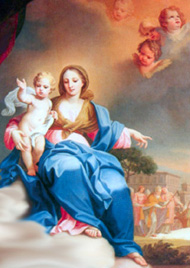 Our Lady of the Snows Dedication of Our Lady of the Snow Grant, we beseech Thee, O Lord God, to us Thy servants, that we may evermore enjoy health of mind and body: and by the glorious intercession of blessed Mary, ever a Virgin, may be delivered from present sorrows, and enjoy everlasting gladness. Through our Lord. V. Vouchsafe that I may praise thee, O holy Virgin. R. Give me strength against thy enemies. Ant. Holy Mary, succor those in misery, strengthen the fainthearted, comfort the sorrowful, pray for the people, mediate for the clergy, intercede for all devout women: may all experience thy help who celebrate thy holy festival. (Roman Breviary) There are in Rome three patriarchal churches in which, on different feast days, the Pope officiates. These are the Basilicas of Saint Peter on the Vatican Hill, Saint John Lateran, and Saint Mary Major on the Esquiline Hill. The last-named, the Liberian Basilica, was founded in the time of Pope Liberius, in the fourth century; it was consecrated to the Virgin Mary by Sixtus III in the year 435, under the title of Saint Mary ad Nives, or at the snow, because the Mother of God Herself chose, and indicated by a miracle, its site to be that of Her first church in Rome. In the fourth century a patrician by the name of John and his pious spouse had no children; already advanced in age and without heirs, they resolved to consecrate their wealth to the Most Blessed Virgin. They prayed in order to know how the Queen of Heaven would like them to use their fortune. On August 5, 366, She appeared to each of them in a dream and told them that Her Divine Son's and Her own will was that their wealth be employed in the construction of a church on Mount Esquiline, at a place which in the morning they would find covered with snow. They consulted together when the dawn broke, and went to the Pope at once to tell him what God had made known to them. He himself had had a similar dream and could not doubt that this was a celestial prodigy. He assembled the clergy and people, and all went in procession towards the indicated place, to verify the reality of the marvel. When they arrived on the hilltop, they saw an area covered with snow, extending over a space sufficient to build a vast church. It was built at the expense of the noble couple with great magnificence, and given the name of Saint Mary of the Snows. The same Basilica is sometimes entitled Saint Mary ad Praesepe, of the Manger, from the holy crib or manger of Bethlehem, in which the Infant Jesus was laid at His birth. It was transported to Rome and kept in a sumptuous subterranean chapel of the church. Today this Basilica bears the name of Saint Mary Major, because it is, both by its beauty and its antiquity, the first of the numerous Roman churches dedicated to Mary. It stands as a venerable monument to the Council of Ephesus (431), at which the dogma of Mary's divine Motherhood was solemnly defined; the definition of the Council occasioned a most notable increase in the veneration paid to Mary. Christendom's first Marian shrine for pilgrims, this great basilica set the precedent for the countless shrines where pilgrims gather to honor our Blessed Mother throughout the world. Here was introduced an authentic expression of popular piety that has been the source of untold blessings and graces. |
August 6th, The Transfiguration of Our Lord Jesus Christ and St. Xystus II., Pope & Companions, Martyrs. 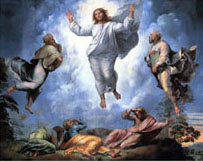 The Transfiguration of Jesus Transfiguration Sermons Children's Sermon on the Transfiguration Transfiguration: Epistle and Gospel On the Transfiguration of Jesus On the Deplorable State of a Christian Who is Cold and Insensible with Regard to Heaven Heaven Vol. 2: Parables and Teachings of Jesus Christ from the Latin Vulgate, as Illustrated by Catholic Artist and Historian, James Tissot, 1899 The Transfiguration of Our Lord Jesus Christ O God, Who in the glorious Transfiguration of Thy only-begotten Son didst confirm the mysteries of faith by the testimony of the fathers, and in the voice which came down from a bright cloud didst marvelously foreshow the adoption of sons; vouchsafe in Thy mercy, to make us co-heirs with the King of glory, and grant that we may share in his glory. Through the same our Lord Jesus Christ, Thy Son, Who liveth and reigneth with Thee in the unity of the Holy Ghost, one God, world without end. R. Amen. (Roman Breviary) Our divine Redeemer, being in Galilee the summer before His sacred Passion, took with Him Saint Peter and the two sons of Zebedee, Saint James and Saint John, and led them to the heights of a solitary mountain. Tradition assures us that this was Mount Tabor, which is exceedingly high and beautiful, and in those days was covered with green trees and shrubs. It rises alone in the midst of a vast plain of Galilee. It is here that the God-Man appeared in His glory. While Jesus prayed, He permitted the glory which was always due to His sacred humanity--and of which for our sake, not to alarm us, He deprived it--to diffuse its brilliance over His whole body. His face was transfigured and shone as the sun, and His garments became white as snow. Moses and Elias were seen in His company by the three apostles on this occasion, and were heard discoursing with Him of the death which He was to suffer in Jerusalem. The three were wondrously delighted with this glorious vision, and Saint Peter cried out to Christ, "Lord, it is good for us to be here! Let us make three tents, one for Thee, one for Moses, and one for Elias." While Saint Peter was speaking, suddenly there came a bright cloud from heaven, emblem of the presence of God's majesty, and from out of this cloud was heard a voice which said, "This is My beloved Son, in whom I am well pleased; hear Him." By these words, God made known that in Christ they must recognize the One He had foretold to Moses, saying: "I will raise up from among them a Prophet like you; I will put My words in His mouth, and He will tell them all I command Him. If anyone does not want to hear the words that this Prophet will speak in My Name, it is to Me that he will have to answer for it." (Deut. 18:18-19) When the Jews asked John the Baptist if he was the Prophet, this was the Expected One they referred to. The apostles understood perfectly now what these words meant; the prophecy was known to all who listened to the Scriptures read each week in their synagogues. Hearing this voice, they were nonetheless seized with a sudden fear, and fell upon the ground; but Jesus, going to them, touched them, and bade them rise. They immediately did so, and saw no one but Jesus standing there in His ordinary state. This vision happened during the night. As they went down the mountain early the next morning, Jesus forbade them to tell anyone what they had seen, before He had risen from the dead. Hymn: Quicumque Christum All ye who would the Christ descry, Lift up your eyes to him on high: There mortal gaze hath strength to see The token of His majesty. A wondrous sign we there behold, That knows not death nor groweth old Sublime, most high, that cannot fade, That was ere earth and heaven were made. Here is the King the Gentiles fear, The Jews' most mighty King is here Promised to Abraham of yore, And to his seed forevermore. 'Tis he the Prophets' words foretold, And by their signs shown forth of old; The Father's witness hath ordained That we should hear with faith unfeigned. Jesu, to Thee our praise we pay, To little ones revealed today, With Father and Blest Spirit One Until the ages' course is done. Amen |
August 7th, St. Cajetan, Confessor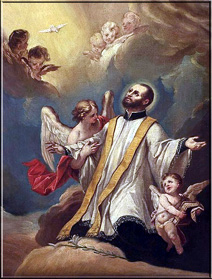 St. Cajetan, Confessor Legends of the Blessed Sacrament. St. Cajetan: page 62 Sermon on Prayer Trusting in God Examination of Our Duties and State of Life Short Sermon: On Our Two Duties The 10 Commandments, The Christian Rule of Life Sermon on Keeping the 10 Commandments Martin Luther's Teaching and its Results, in his own words Index of Prayers and Devotions for the Sick The Providence of God and Why He permits evil The Corporal Works of Mercy St. Cajetan, Confessor O God, Who gavest blessed Cajetan Thy Confessor grace to live the life of an apostle: grant, we beseech Thee, that, by his intercession and example, we may always trust in Thee, and desire only heavenly things. Through our Lord Jesus Christ, Thy Son, Who liveth and reigneth with Thee in the unity of the Holy Ghost, one God, world without end. R. Amen Ant. Seek first the kingdom of God and His justice, and all these things shall be given you besides. V. The Lord loved him and adorned him. R. He clothed him with a robe of glory. (Roman Breviary) Saint Cajetan was born in 1480 at Vicenza near Venice in Italy, of the pious and noble family by the name of Thiena. His great-uncle, who bore the same name as himself and was a Canon of Padua, was considered to be the prince of the theologians of his century; and several prelates and cardinals, as well as governors of Milan and Naples, were of the same line. His parents dedicated Cajetan to our Blessed Lady. From childhood he was remarked for his obedience, his temperance, and his charity towards the poor. A distinguished student, a veritable model for all his peers, he desired a higher perfection and left his native town, where he was in honor, to seek obscurity in Rome. There, however, Pope Julius II, perceiving his merit, named him an apostolic protonotary, a high office. He joined a certain Congregation or Confraternity known as that of Divine Love and, working with its members, introduced frequent Communion in their midst, and elsewhere through their influence. The Pope saw to his ordination, and he then offered many fervent Masses. About that time, on Christmas Eve at the Church of Saint Mary Major, when he entered the church he saw the Holy Mother; She came to him and placed Her divine Infant in his arms. It was also Saint Cajetan who later would introduce the Forty Hours Adoration of the Blessed Sacrament, as an antidote to the heresy of Calvin. He returned to Vicenza when his mother died, and began to seek out the sick poor and transport them to the Hospital of the Incurables or of Mercy, with which he had united the Congregation of Divine Love, established in that city also. He served the sick in the hospital himself. He placed himself under the direction of a holy Dominican priest, Father John Baptist de Crema, who not long afterwards told him he should go to Venice. His obedience was perfect in this sacrifice, which cost not only himself but those in his hospital many tears. At Venice too, he was needed in a hospital; and the Venetians in those days of luxury and licence, soon reformed what was not correct in their conduct to follow his holy examples. To renew the lives of the clergy, in 1524, with Paul Caraffa, then Bishop of Theata or Chieti in the kingdom of Naples, who later would become Pope Paul IV, and with two other fervent Christians, Saint Cajetan founded the first group of Regular Clerics, since known as Theatines. All had deeply regretted the state of the Church at that time, and with ardor they devoted themselves to preaching, to the administration of the sacraments and the careful execution of the Church's rites and ceremonies. When the Germans, under Constable Bourbon, sacked Rome, Saint Cajetan was barbarously scourged to extort from him imaginary riches; his only wealth was his good works, which he had long since securely stored in heaven. When the Saint was on his deathbed, resigned to the Will of God, happy to suffer to satisfy his love, and eager for death to attain to life, he again beheld the Mother of God, radiant with splendor and surrounded by ministering seraphim. Turning Her countenance full of majesty and sweetness upon him, She said, "Cajetan, My Son calls you. Let us go in peace." Worn out with toil and sickness, he went to his reward in 1547. August 7th, St. Donatus, Bishop and Martyr St. Donatus was Bishop of Arezzo in Tuscany and suffered martyrdom for Christ during the reign of Julian the Apostate in 362. O God, the glory of Thy priests, grant, we beseech Thee, that we may experience the aid of Thy holy Martyr and Bishop Donatus, whose feast we keep. Through our Lord Jesus Christ, Thy Son, Who liveth and reigneth with Thee in the unity of the Holy Ghost, one God, world without end. R. Amen |
August 8th, Sts. Cyriacus and Companions, Martyrs
In some places, the Feast of the 14 Holy Helpers (Collectively) is celebrated. 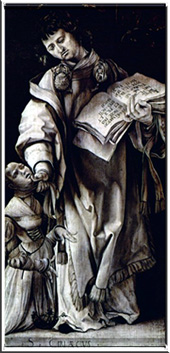 St. Cyriacus, Holy Helper Novena to St. Cyriacus (Holy Helper): July 31st - Aug. 8th A Short Explanation on the Rite of Exorcisms St. Michael/ Exorcism Resisting the Enemies of Our Salvation Novena to the 14 Holy Helpers Against the Chinese Coronavirus Index 14 Holy Helpers: History of this Devotion , Novena and the Lives of Each Saint Novena to St. John Vianney: Aug. 1st - Aug. 9th Novena to of St. Lawrence, Aug 2nd - Aug. 10th Novena to St. Philomena: Aug 3rd - Aug. 11th Novena to of St. Clare, Aug 4th - Aug. 12th Novena to Our Lady Refuge of Sinners: Aug. 5th - Aug. 13th Novena of the Assumption: Aug. 7th - Aug. 15th Novena to St. Joachim Aug. 8th - Aug. 16th Index of Prayers for the Holy Souls in Purgatory 30 Days Prayer to the Blessed Virgin Mary The Little Office of the Blessed Virgin Mary, from Candlemas until Advent Daily Rosary: Joyful Mysteries with Meditations Daily Rosary: Sorrowful Mysteries with Meditations Daily Rosary: Glorious Mysteries with Meditations Sts. Cyriacus and Companions, Martyrs O God, Who dost gladden us by the yearly festival of thy holy Martyrs Cyriacus, Largus, and Smaragdus: grant in Thy mercy, that we who celebrate their festival, may also follow their example in the fortitude with which they suffered. Through our Lord Jesus Christ, Thy Son, Who liveth and reigneth with Thee in the unity of the Holy Ghost, one God, world without end. R. Amen Ant. For theirs is the kingdom of heaven, who have despised the life of the world, and have attained to the rewards of the kingdom, and have washed their robes in the blood of the Lamb. V. Be glad in the Lord, and rejoce, ye just. R. And glory all ye upright of heart. Saint Cyriacus, born of a noble patrician family, embraced the Christian religion and gave all his wealth to the poor. He was ordained a deacon at Rome, under Pope Marcellinus. Diocletian was emperor at that time, assisted by Maximian, his favorite. The latter decided to build a beautiful palace for the emperor, with magnificent baths, and to make the Christians work at the construction. Among the new slaves were elderly gentlemen and persons of the highest rank, clerics and priests. The labor was hard and the food scanty. A Roman nobleman desired to relieve the sufferings of these laborers and sent four Christians with alms and encouragements; these were Saint Cyriacus, Saint Sisinius, Saint Largus and Saint Smaragdus. They pursued their charities at the risk of their lives, and they worked vigorously alongside those who were growing very weak. When Maximian heard of it, he had Saint Sisinius and an old gentleman whom he had helped, decapitated. Saint Cyriacus was well known to Diocletian, who was fond of him. Suddenly Diocletian's daughter became possessed by a furious demon, and she announced that only Cyriacus could deliver her. Diocletian sent for him, and he cured her. She became a Christian like her mother, who is today Saint Serena. A short time later the daughter of the king of Persia also became possessed, and cried out like Diocletian's daughter that she could be delivered only by Cyriacus, who was in Rome. A message was sent to Diocletian, who asked his wife to persuade the deacon to go to Persia for this purpose. He did so with his two remaining Christian companions, and again cast out the demon, thus bringing about the conversion of the king, his family and four hundred persons, whom he baptized. The three confessors returned to Rome, having refused all compensation for their services, saying that they had received the gifts of God gratuitously and wished to share them gratuitously, not deriving profit from them. The barbarous Maximian, hearing of their return in 303, had them seized, imprisoned and tortured, and finally decapitated with twenty other courageous Christians. Their bodies were first buried near the place of their execution on the Salarian Way, but were later removed to the city. An abbey in France, at Altorf in Alsace, possesses relics of Saint Cyriacus and bears his name. St. Cyriacus is one of the 14 Holy Helpers invoked against temptations on the deathbed. |
August 9th, St. John Mary Vianney, Confessor and St. Romanus, Martyr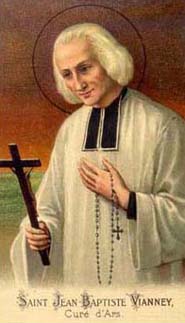 St. John Vianney, Prayers Devotions and 12 Sermons St. John Vianney: Sermons on the Priesthood and Confession The Spirit of the Cure of Ars How St. John Vianney was Persecuted by Demons Pastors as True Shepherds and the Evils of Negligent Pastors Part II. The Incontinent Priest and Sacrilegious Mass Part I. Grievousness and Chastisement of Sin in a Priest Related Links: Index for the Sacrament of Penance Why the Catholic Church Condemns Attendance at False Worship by Michael Mueller, 1874 How Catholics lose the Faith by Fr. Michael Muller How Blind the Sinner Is Repentance The Penitent Christian 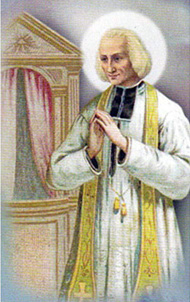 St. John Mary Vianney, Confessor Almighty and merciful God, Who didst endow holy John Mary with wonderful pastoral zeal and unflagging desire for prayer and penance: grant, we beseech thee, that by his example and intercession we may be able to gain the souls of our brethren for Christ, and with them reach everlasting glory. Through the same our Lord Jesus Christ, Thy Son, Who liveth and reigneth with Thee in the unity of the Holy Ghost, one God, world without end. R. Amen V. The Lord loved him, and adorned him. R. He clothed him with a robe of glory. Ant. I will liken him to a wise man who built his house upon a rock. Ant. This Saint hath striven for the law of his God even unto death, and hath not feared for the words of the ungodly; for he had been founded upon a firm rock. V. Thou hast crowned him with glory and honor, O Lord. R. And hast set him over the works of thy hands. (Roman Breviary) St. John Baptist Mary Vianney was born at Dardilly near Lyons (France) on May 8th, 1786. After many difficulties, he received holy priesthood in August 1815. He was parish priest of Ars for nearly forty-two years: he became a model for all his brethren in the sacerdotal ministry by his pastoral zeal, and by the unflagging ardour of his prayer and penance. Sitting up to sixteen hours a day in the confessional, he healed souls and sometimes bodies as well. His simple catechism preaching touched the hearts of grown ups as well as those of children. Meanwhile, he chastized his body as an act of reparation and impetration for sinners. He died on August 4th, 1859. August 9th, Vigil of St. Lawrence, Martyr O Lord, give ear to our prayers, and by the intercession of Blessed Lawrence, Thy Martyr, whose feast we anticipate, graciously bestow upon us Thy everlasting mercy. Through our Lord, etc. S. Amen August 9th, St. Romanus, Martyr St. Romanus was a soldier contemporaneous with St. Lawrence from whom he received Baptism. He suffered glorious marytrdom by being beheaded. |
August 10th, St. Lawrence, Martyr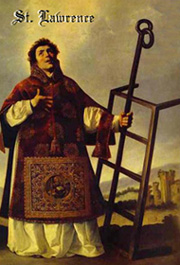
Novena to of St. Lawrence: Includes His Life and other Prayers and Devotions Instructions on the Feast of St. Lawrence, Martyr St. Lawrence, Martyr G rant to us, we beseech Thee, almighty God, to extinguish within us the flames of our vices, even as Thou didst grant to Blessed Lawrence to overcome the fires of his torments. Through our Lord Jesus Christ, Thy Son, Who liveth and reigneth with Thee in the unity of the same Holy Ghost, one God, world without end. R. Amen V. Thou hast crowned him with glory and honor, O Lord. R. And hast set him over the works of Thy hands. Ant. Lawrence the Levite has wrought a good work, he restored sight to the blind by the sign of the Cross, and distributed to the poor the treasures of the Church. (Roman Breviary) Saint Lawrence was Chief of the seven deacons of Rome. In the year 258 Pope Sixtus was led out to die, and Saint Lawrence followed beside him, weeping because unable to share his fate. "Where are you going, my father, without your son? Where are you going, holy pontiff, without your deacon? Never did you offer a sacrifice without my serving you at the altar. In what way have I displeased you?" The holy Pope comforted him with the words, "I am not abandoning you, my son; a more difficult trial and a more glorious victory are reserved for you; in three days you will follow me." This prophecy was fulfilled. After the Pope's martyrdom the prefect of the city, knowing the rich offerings which the Christians put into the hands of the clergy, demanded the treasures of the Roman Church from Lawrence, their guardian. The Saint promised to show him, at the end of three days, riches exceeding all the wealth of the empire. He was granted the time of delay. The Archdeacon of Rome went about assembling the poor, the infirm, and the religious who lived by the alms of the faithful, and he brought them to the prefect on the appointed day. "Behold the treasures I promised you; I add pearls and precious stones--these virgins and widows consecrated to God; the Church has no other riches." The prefect replied: "How dare you play games with me, miserable one? Is this how you show your contempt for the imperial power?" Christ, whom Lawrence had served in His poor, gave him strength in the conflict which ensued. After being placed on the rack, he was stretched on a grill over a slow fire. He joked about his pains. "I am roasted enough on this side," he said, "perhaps you should turn me over." Soon, his gaze towards heaven, he gave up his soul to God. He was buried in the catacomb near the Tiburtine Way, called the Verano Field, a little over a mile from the city walls. The faithful watched there for three days to mourn their holy Archdeacon who had been so good to them. God, by the glory of this holy martyr, demonstrates the value He sets upon love for the poor. Innumerable prayers were offered at his tomb. Saint Lawrence continued from his throne in heaven his charity to those in need, granting them, as Saint Augustine says, "the smaller graces which they sought, and leading them to the desire of better gifts." |
August 11th, In Some Places: St. Philomena, Virgin and Martyr 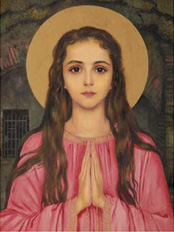 St. Philomena The Life and Miracles of St. Philomena Prayers for the Preservation of Chastity. An Explanation and Defense of the Virtue of Chastity The Necessity of Avoiding Occasions of Sin by St. Alphonsus Liguori Part 1 of 3 on the Vice of Lust: The Folly of Impure Desires of Sensual Pleasures Part 2 of 3 on the Vice of Lust: The Incurableness of Impurity Part 3 of 3 on the Vice of Lust: The Anger of God Against the Vice of Impurity May the unfailing protection of Thy holy martyrs Tiburtius and Susanna comfort us, O Lord, for never dost Thou turn away Thin eyes of mercy from those to whom such help is given. Through our Lord Jesus Christ, Thy Son, Who liveth and reigneth with Thee in the unity of the same Holy Ghost, one God, world without end. R. Amen V. The Saints shall rejoive in glory. R. They shall be joyful in their beds. Ant. The hairs of your head are all numbered: do not be afraid: you are of more value than many sparrows. (Roman Breviary) 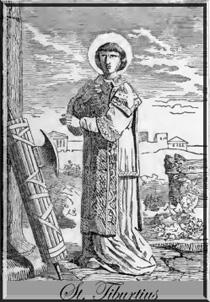 St. Tiburtius Sts. Tiburtius and Susanna A certain pagan prefect of Rome, by the name of Agrestius Chromatius, saw arrive before his tribunal a holy man named Tranquillinus. The prefect had already condemned a number of Christians to martyrdom, among them the twin brothers, Marcus and Marcellianus; but when Saint Tranquillinus, who was their father, told him how he had recovered from the gout through his baptism, Chromatius listened to him. He himself had the same malady. He sent for a priest, and he too was freed from his infirmity when baptized. He then liberated 400 slaves and retired to a country home, where he sheltered many Christians who feared they could not resist tortures during the persecutions. Saint Tiburtius, whom the Church honors today, was the son of Chromatius, and was baptized with him. He was later ordained a subdeacon, and one day raised to life a man whom he found on the ground, his body broken by a fall from the upper story of a residence. Under Diocletian, Tiburtius was betrayed to the persecutors by an unfaithful Christian. He courageously confessed his ardent faith, saying, "I sacrifice only to one God, the Creator of the world, who reigns over heaven and earth, and my greatest desire is to be immolated and sacrificed myself for this confession." After being condemned to walk on hot coals, which he did without suffering any pain, he was beheaded at a site three miles from Rome. A church was afterward built at this site and named for him. 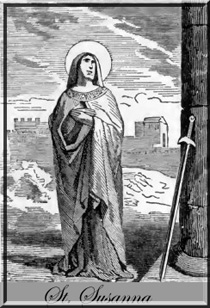 St. Susanna Saint Susanna was nobly born in Rome, the daughter of a certain Gabinius, who after his conversion became a priest; she was also the niece of Pope Saint Caius, her father's brother. This family was also related to the emperor Diocletian. Susanna's father had raised her with great care in the fear of God and love of Jesus Christ, and she had made a private vow of virginity. Diocletian, wishing to obtain the consent of this very beautiful maiden to marry his favorite, Maximian, sent a certain Claudius, another member of her family, to propose the espousals. She refused to consent, making known to her father and Saint Caius her vow, and saying that even if she had not resolved to conserve her chastity, she would not wish to marry a man responsible for the massacre of an infinite number of Christians. The Emperor's messenger was converted by her confession of faith, and became a fervent penitent. When Diocletian received no answer from his messenger concerning the results of the commission, and then learned of the conversion of Claudius, he was very irritated; then with Claudius he arrested Suzanne, Gabinius her father, and several other Christians. He had Suzanne beaten in her residence, then decapitated secretly. The emperor's wife, Prisca, who was also a Christian in secret, buried her body clandestinely and prayed to her as a holy martyr. Later the house of Gabinius was transformed by Pope Saint Caius into a church; it eventually became a convent for Cistercian nuns. Saint Susanna suffered towards the beginning of Diocletian's reign, about the year 295. |
August 12th, St. Clare, Virgin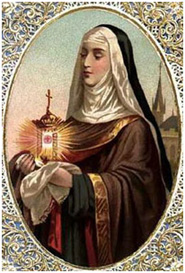 St. Clare, Virgin Novena to St. Clare Aug. 12th - Aug. 20th Catholic Book: The Life of Saint Clare St. Clare, Virgin Graciously hear us, O God our salvation: and grant that we, who are gladdened by the festival of blessed Clare Thy Virgin, may therefrom learn loving devotion towards Thee. Through our Lord Jesus Christ, Thy Son, Who liveth and reigneth with Thee in the unity of the same Holy Ghost, one God, world without end. R. Amen V. With thy comeliness and thy beauty. R. Set out, proceed prosperously, and reign. Ant. Come Spouse of Christ, receive the crown which the Lord hath prepared for thee for all eternity. (Roman Breviary) On Palm Sunday, March 19, 1212, a maiden eighteen years of age left her rich and noble family to retire for her reception as a religious to the little church of the Portiuncula. This maiden was Saint Clare. Already she had learned from Saint Francis to scorn the world, and was secretly resolved to live for God alone. There she was met by Saint Francis and his brethren, and at the altar of Our Lady, Saint Francis cut off her hair, clothed her in the habit of penance, a piece of sackcloth, with a cord as a cincture. Thus was she espoused to Christ. Saint Francis placed her for the moment in a Benedictine convent. It was in a tiny house outside Assisi that she founded her Order. Two weeks after Clare's consecration, her sister Agnes left home secretly to go to join her, at the age of fourteen years. Agnes succeeded in her intention, despite their father's strong opposition and a convoy of twelve men who attempted to take her back home by force. While Clare prayed in the convent, Agnes became so heavy they were unable to move her. Later their mother and other noble ladies joined them. They went barefoot, observed perpetual abstinence, constant silence, and perfect poverty. Saint Clare is celebrated for a miracle which occurred when the Saracen army of Frederick II was ravaging the valley of Spoleto. A legion of infidels advanced to assault the convent outside Assisi. The Saint, who was ill in the infirmary, rose and went, supported by her religious, to the door of the convent; there she had the Blessed Sacrament placed in a monstrance above the gate of the monastery facing the enemy. She knelt before it and prayed, "Deliver not to beasts, O Lord, the souls of those who confess Your Name!" A voice from the Host replied, "My protection will never fail you." A sudden panic seized the infidel army, which took flight; and the Saint's convent was spared. Although Saint Clare herself never left her monastery of Saint Damian, her Order spread in many places not only in Europe but elsewhere, and some four thousand convents, divided into several branches, shelter her disciples. Many Saints have come from these, especially from the groups which have maintained the original absolute poverty of her Constitutions. The Sisters of the original Order live by charity, and their convents possess nothing. Saint Clare died in 1253, as the Passion was being read, and Our Lady and the Angels conducted her to glory. |
|
August 13th, Sts. Hippolytus and Cassianus, Martyrs Vigil of the Assumption (Anticipated) St. Hippolytus and St. Cassian Litany of Faith and the Necessity of the Catholic Faith for Salvation Showing Forth Our Faith Are we bound to profess our Catholic Faith openly? Sts. Hippolytus and Cassianus, Martyrs 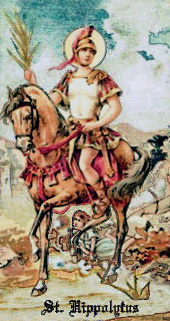
Grant, we beseech Thee, almighty God: that the holy festival of Thy blessed Martyrs Hippolytus and Cassianus may both increase our devotion and advance our salvation. Through our Lord Jesus Christ, Thy Son, Who liveth and reigneth with Thee in the unity of the same Holy Ghost, one God, world without end. R. Amen Ant. For theirs is the kindom of heaven, who have despised the life of the world, and have attained to the rewards of the kingdom, and have washed their robes in the blood of the Lamb. V. Be glad in the Lord, and rejoice, ye just. R. And glory all ye upright of heart. (Roman Breviary) Hippolytus, having been baptized by the holy Lawrence, was arrested in his own house while he was in the act of receiving Communion, and led before the emperor Valerian, and, when questioned by him as to his religious profession, he openly declared himself a Christian. He was therefore beaten with clubs; but as his faith was found the more constant amid the blows, he was tempted with gifts and promises of honors. But all proving to be in vain, he was handed over to the prefect to be put to death. The prefect came to the house of Hippolytus, to confiscate his possessions, and found that the whole household had embraced Christianity; and, having tried in vain to terrify them into abjuring the Christian faith, he first ordered Concordia, the nurse of Hippolytus, who had strengthened the faith of the rest, to be scourged with leaded whips, and the others to be slain outside the Porta Tiburtiana. Hippolytus, having been dragged by unbroken horses through places overgrown with briers and thistles until his entire body was lacerated gave his soul to God, and together with the others was buried by the priest Justin in the Ager Veranus. On the same day, the Martyr Cassianus suffered a most cruel death at Imola. For his hands were tied behind his back, and he was given over to the schoolboys whom he taught, to be pierced and torn with their iron pens. The frailty of his tormentors made his martyrdom the longer and the more painful, and his reward the more illustrious. |
August 14th, St. Eusebius, Confessor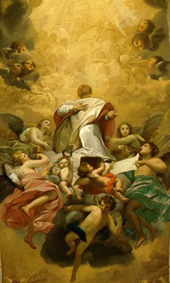 St. Eusebius The Dogma of the Incarnation Rests on the Divine Maternity of the Blessed Virgin Mary Litany of Faith and the Necessity of the Catholic Faith for Salvation How Catholics lose the Faith by Fr. Michael Muller Are we bound to profess our Catholic Faith openly? What Cannot and What Can Be Reformed in the Church. What Every Christian Must Believe and Do to be Saved. No Salvation Outside the Catholic Church Trusting in God St. Eusebius, Confessor O God, Who dost gladden us by the yearly solemnity of blessed Eusebius Thy Confessor: grant in Thy mercy, that we, Who keep his festival, may by following his example draw nigh unto Thee. Through our Lord Jesus Christ, Thy Son, Who liveth and reigneth with Thee in the unity of the same Holy Ghost, one God, world without end. R. Amen Ant: This is a Saint who strove for the truth, even unto death, and feared not the words of sinful men, forasmuch as he was founded upon a sure foundation. (Roman Breviary) The Church celebrates this day the memory of St. Eusebius, who opposed the Arians, at Rome, with so much zeal. He was imprisoned in his room by order of the Emperor Constantius, and sanctified his captivity by constant prayer. Another Saint of the same name, a priest and martyr, is commemorated on this day. In the reign of Diocletian and Maximian, before they had published any new edicts against the Christians, Eusebius, a holy priest, a man eminently endowed with the spirit of prayer and all apostolical virtues, suffered death for the Faith, probably in Palestine. The Emperor Maximian happening to be in that country, complaint was made to Maxentius, president of the province, that Eusebius distinguished himself by his zeal in invoking and preaching Christ, and the holy man was seized. Maximian was by birth a barbarian, and one of the roughest and most brutal and savage of all men. Yet the undaunted and modest virtue of this stranger, set off by a heavenly grace, struck him with awe. He desired to save the servant of Christ, but, like Pilate, would not give himself any trouble or hazard incurring the displeasure of those whom on all other occasions he despised. Maxentius commanded Eusebius to sacrifice to the gods, and on the Saint refusing, the president condemned him to be beheaded. Eusebius, hearing the sentence pronounced, said aloud, "I thank Your goodness and praise Your power, O Lord Jesus Christ, that, by calling me to the trial of my fidelity, You have treated me as one of Yours." He at that instant heard a voice from heaven saying to him, "If you had not been found worthy to suffer, you could not be admitted into the court of Christ or to the seats of the just." Being come to the place of execution, he knelt down, and his head was struck off. Reflection--Let us learn, from the example of the Saints, courage in the service of God. He calls upon us to endure suffering of body and of mind, if it is necessary, to prove our fidelity to Him; and He promises to support us by His strength, His light, and His heavenly consolation. |
August 15th, The Assumption of the Blessed Virgin Mary. Holy Day of Obligation.
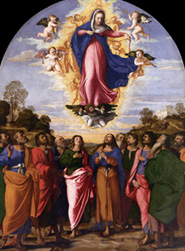 The Assumption I. Sermons by Fr. Francis Xavier Weninger on the Assumption II. Assumption: Additional Prayers and Devotions Novena of the Assumption Aug. 7th - Aug. 15th Instructions on the Feast of the Assumption of the Bless Virgin Mary Children's Sermon for the Assumption Vigil of the Assumption The Dormition and Assumption of the B.V.M. A Devout Guide to follow the Tridentine Latin Mass of Pope St. Pius V. Recommended for Those Who Cannot Attend Mass in Person. Feast of the Assumption The Holy Sacrifice of the Mass, Fr. O' Keeffe, 1891 Papal Bull: Quo Primum, the Tridentine Mass for all Times Why the Mass is in Latin Catholic Worship, Explained God the Teacher of Mankind: The Holy Sacrifice of the Mass, 1884 Manner of Hearing Mass At Home: For those who on account of sickness, old age, or for other proper reasons cannot assist at holy Mass, especially on Sundays and Holidays What Cannot and What Can Be Reformed in the Church. What Every Christian Must Believe and Do to be Saved. Spiritual Communion Mary Queen of All Saints Veneration of the Saints Devotions in honor of the Queenship of Mary The Life of the Blessed Virgin Mary as Set Forth in Her Titles from the Litany of Loreto The Life of the Blessed Virgin Mary, St. Joseph, St. Joachim and St. Anne, 1859 In Defense of Mary The Mother of God The Influence of Mary on Modern Civilization and Prayers of Petition to Our Lady The Assumption of the Blessed Virgin Mary O Almighty and Everlasting God, Who hast taken up, body and soul, into heavenly glory the Immaculate Virgin Mary, Mother of Thy Son; grant, we beseech Thee, that, ever intent upon the things above, we may be worthy to be partakers of her glory. Through the same our Lord Jesus Christ, Thy Son, Who liveth and reigneth with Thee in the unity of the Holy Ghost, one God, world without end. R. Amen Ant. With thy comeliness and thy beauty set out, proceed prosperously, and reign. Ant. The Most Hight hath sanctified His own tabernacle. (Roman Breviary) Homily of St. Peter Canisius The church frequently and reverently keeps feasts dedicated to the Mother of God realizing that it is a work pleasing to God and worthy of the faithful if many feasts, with fixed dates and public ceremonies, are celebrated in honor of the most blessed of all the blessed in heaven, the Mother of our Lord and God. Among all these feasts which have been celebrated so devotedly for so many years, right down to our own time, the Feast of the Assumption is considered the greatest and holds the chief place. Indeed there was no happier or more joyful day for Mary, if we duly consider the happiness of both body and soul to her on that day especially, as never before, her spirit, soul and body rejoiced wondrously in the living God and she could rightfully say, He has regarded lowliness of his handmaid; for behold, henceforth all generations shall call me blessed because He Who is mighty has done great things for me. O thrice blessed and truly august Mother, it is for this reason that we who love you and your Son cannot refrain from congratulating you with all sincerity upon your admirable and incomparable happiness, especially since everything that has been said to you and about you by the Lord, is brought to a conclusion by your beautiful passing away from this life, and in every wise has been perfectly fulfilled. Blessed art thou who have not only believed but have this day attained to the end of faith and the fruit of all virtue, and now at last have merited to enjoy the most pleasing sight of him whom you loved and desired so greatly. Yourself a guest, you received Emmanuel who as a guest entered into you, as into a mighty fortress in this world; and today, you in turn are received by him into his royal mansion, and magnificently welcomed with the highest honor as befits one found worthy to be the Mother of such a Solomon. O happy day which sent so precious a gift from the desert of this world, and carried it to the holy and eternal city, so that universal and unheard of joy no less than admiration welled up in all the blessed in heaven. O happy day, that fulfilled the long and ardent yearning of the gentle spouse, so that she might find what she had sought, that she might receive what she asked; that what she awaited she might possess securely, resting safely at last in that perfect vision and inward joy of the eternal and all-great Goodness. O happy day which raised up and so highly exalted this most humble handmaiden of the Lord that she might become the most glorious queen of heaven and the mistress of the world. Indeed she could not have risen to more sublime heights since she had been elevated to the very Throne of the heavenly kingdom, and thus was established in glory next after Christ. O happy and truly honorable is this day which constituted and confirmed for us a Queen and Mother who is at once powerful and merciful in the kingdom of God, that we might have her, who ever remains the Mother of the Judge, as a Mother of mercy protecting us and interceding for us with Christ, unceasingly watching over the work of our salvation. Hymn: Solis, O Virgo O Virgin, who shines with sun's rays surrounded, And over whose head glows the twelve-starred crown, The moon of high heaven thy footstool is made, Thou Queen of renown. O thou Victress over hell and dreadful death, Enthroned near Christ and ever our Mother, Earth and the heavens sing loud of Thy glory Thou sovereign Queen. But evil still is menacing thy children Confided to thee by Thy crucified Son, O Mother, draw nigh, against the demon defend, By crushing his head. Guard thou the faithful all who follow thy Son, And bring back to the sheepfold of the Shepherd, Far wandering souls that are shadowed by death, O save every one. In kindness beg mercy for all poor sinners; Also the sick, the poor, the sorrowful, aid; 'Midst life's thorns grant light and peaceful assurance of our salvation. Praise to the Triune Godhead everlasting, Who hath caused Thee, O Virgin, to be crowned, And providently willed our queen though shouldst be also our Mother. Amen |
August 16th, St. Joachim, Father of the Blessed Virgin Mary, Confessor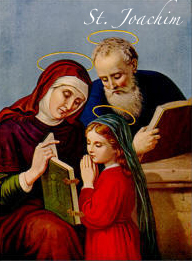 St. Joachim, Father of the Blessed Virgin Mary Novena to St. Joachim Aug. 8th - Aug. 16th Presentation of the Blessed Virgin Mary The Life of the Blessed Virgin Mary, St. Joseph, St. Joachim and St. Anne, 1859 The Christian Father Index on Marriage and all Related Questions: A Catholic's Moral Guide to Sacramental Marriage and Family Life, Includes a Glossary of Faith and Morals for the Married and Unmarried Part 1: How Catholics Should Prepare for a Happy Marriage Part 2: The Disposition Necessary for a Happy Marriage Nature of Marriage Christian Marriage The Sacrament of Marriage What is a mixed Marriage Homilies on the Book of Tobias Blessings of Many Children Religious and Moral Training of Children Instructions for the Catholic Family Duties of Parents Duties of Parents as Shepherds of their Flock St. Joachim, Father of the Blessed Virgin Mary, Confessor O God, Who of all Thy Saints wouldst choose blessed Joachim to be father to the Mother of Thy Son: grant, we beseech Thee, that we may evermore have for our advocate him to whose festival we pay honor. Through the same our Lord Jesus Christ, Thy Son, Who liveth and reigneth with Thee in the unity of the Holy Ghost, one God, world without end. R. Amen Ant. Let us praise a man of renown in his generation, because the Lord gave him the blessing of all nations, and confirmed his covenant upon his head. V. His seed shall be mighty upon the earth. R. The generation of the righteous shall be blessed. (Roman Breviary) The feast-day of the father of Our Lady and the husband of St. Anne, has been placed by the Church after the Feast of the Assumption only in very recent times. For a while it was celebrated directly after the birthday of Mary, September eighth. Devotion to him has been constant over the ages, although historically nothing is known about the details of his life. The proto-evangelium (the first gospel) of St. James is the basis for most of the tradition about him. This writing, however, is not regarded by the Church as an inspired piece of literature and, while it serves a purpose in indicating that his memory was early held in veneration, it does not aid us in our reflections on his personality. Yet this very obscurity teaches us a truly great lesson, namely, that God finds us useful for His purpose, and therefore. He and not we must be remembered if the work done through our agency is of importance. That is why the name of St. Joachim has been venerated in the Eastern Churches from very early days, and his tomb in Jerusalem given special honor as a shrine from the fourth to the ninth centuries. Actually, it is a dogma of the Church that Our Lady was privileged with an Immaculate Conception, free from the effect of Adam's sin from the very moment she began to be through the fatherhood of St. Joachim. It is not unreasonable to suppose that unique graces of holiness were given by God to him who was to be in contact with this singular privilege of Mary. Again, living with her who is full of grace even in her very earliest years would have been a source of abundant blessings for this man of God. In any event, the abiding tradition of devotion to St. Joachim and the rank of the feast as a double of the second class indicate the attitude of the Church towards the human father of the Blessed Mother of God. Reflection--Fathers have a hidden but most important part to play in the lives of their children. They can lead their children into paths of holiness and by so doing their own children may be for them a source of numerous spiritual blessings. |
August 17th, St. Hyacinth, Confessor and St. Roch, Confessor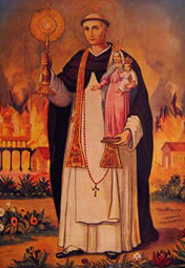 St. Hyacinth, Confessor Saints: the Gift of Miracles Two Short Sermons: On Fighting Under the Standard of Jesus Christ On the Rules Prescribed by Jesus Christ to His Followers Saints: the Gift of Miracles St. Roch, Confessor The Corporal Works of Mercy The Spiritual Works of Mercy St. Hyacinth, Confessor O God, Who dost gladden us by the yearly solemnity of blessed Hyacinth Thy Confessor: grant in Thy mercy, that we, who keep his festival, may also follow the pattern of his life. Through our Lord Jesus Christ, Thy Son, Who liveth and reigneth with Thee in the unity of the Holy Ghost, one God, world without end. R. Amen Ant. I will liken him to a wise man who built his house upon a rock. V. The Lord loved him, and adorned him. R. He clothed him with a robe of glory. (Roman Breviary) Hyacinth, the glorious apostle of Poland and Russia, was born of noble parents in Poland, about the year 1185. In 1218, being already Canon of Cracow, he accompanied his uncle, the bishop of that place, to Rome. There he met St. Dominic, and received the habit of the Friar Preachers from the patriarch himself, of whom be became a living copy. So wonderful was his progress in virtue that within a year Dominic sent him to preach and plant the Order in Poland, where he founded two houses. His apostolic journeys extended over numerous regions. Austria, Bohemia, Livonia, the shores of the Black Sea, Tartary, and Northern China on the east, and .Sweden and Norway to the west, were evangelized by him, and he is said to have visited Scotland. Everywhere multitudes were converted, churches and convents were built; one hundred and twenty thousand pagans and infidels were baptized by his hands. He worked numerous miracles, and at Cracow raised a dead youth to life. He had inherited from St. Dominic a most filial confidence in the Mother of God; to her he ascribed his success, and to her aid he looked for his salvation. When St. Hyacinth was at Kiev the Tartars sacked the town, but it was only as he finished Mass that the Saint heard of the danger. Without waiting to unvest, he took the ciborium in his hands, and was leaving the church. As he passed by an image of Mary a voice said: "Hyacinth, my son, why dust thou leave me behind? Take me with thee, and leave me not to mine enemies." The statue was of heavy alabaster, but when Hyacinth took it in his arms it was light as a reed. With the Blessed Sacrament and the image he came to the river Dnieper, and walked dry-shod over the surface of the waters. On the eve of the Assumption he was warned of his coming death. In spite of a wasting fever, he celebrated Mass on the feast, and communicated as a dying man. He was anointed at the foot of the altar, and died the same day, 1257. Reflection--St. Hyacinth teaches us to employ every effort in the service of God, and to rely for success not on our own industry, but on the prayer of His Immaculate Mother. |
August 18th, St. Agapitus, Martyr and St. Helena, Empress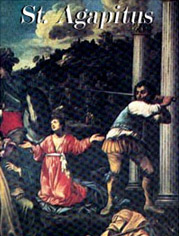 St. Agapitus, Martyr 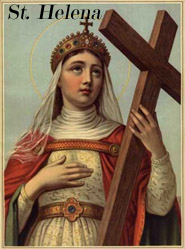
St. Helena, Empress On the Finding of the Holy Cross The Spiritual Works of Mercy The Corporal Works of Mercy Sermon from St. John Vianney on Suffering Let Thy Church, O God, be gladdened by the intercession of blessed Agapitus Thy Martyr, in which she puts her trust: through his glorious prayers may she ever devoted unto Thee, and ever abide in peace and safety. Through our Lord Jesus Christ, Thy Son, Who liveth and reigneth with Thee in the unity of the Holy Ghost, one God, world without end. R. Amen Ant. This Saint hath striven for the law of his God even unto death, and hath not feared for the words of the ungodly; for he had been been founded upon a firm rock. Thou hast crowned him with glory and honor, O Lord. And hast set him over the works of thy hands. (Roman Breviary) Agapitus, a native of Praeneste (Palestrina), when fifteen years old, was eagerly longing for martyrdom during the reign of the emperor Aurelian, and, on account of his firmness in his religion, he was, by the emperor's orders first beaten with thongs for a very long time; then he was cast into a loathsome dungeon, where he tasted absolutely no food for four days. He was then brought forth from the prison, and burning coals were placed upon his head; as he still gave thanks to God, he again suffered stripes, was stripped naked and hung up by the feet in such a way, that the thick smoke from a fire placed beneath him almost suffocated him. After that, his belly was scalded with boiling water, and his jaws were broken to pieces. About this time, the judge fell from the judgment-seat, and died shortly afterwards. The emperor being infuriated at this occurrence, ordered the holy youth to be cast to the beasts, but since they did not dare to touch him, he was beheaded with the sword at Praeneste. "A head which would wear an eternal crown in heaven, must not hesitate to wear pain and suffering on earth." Thus spoke St. Agapitus, and it means, that "he who would rejoice in heaven, must be willing to suffer on earth." The Apostles, the friends of our Lord, and other Saints walked in this path. Christ Himself went to heaven by no other way than the way of the cross. "Through many tribulations we must enter the kingdom of God." (Acts, xiv.) How can you seriously hope to save your soul if you will not suffer? Shall God prepare for you a special path, strewn with roses? Ah! do not believe this. We must suffer, if we would enter the kingdom of heaven, if we would become partakers of eternal joys. |
August 19th, St. John Eudes, Confessor. Within the Octave of the Assumption
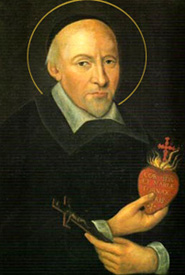 St. John Eudes Father Eudes, Apostolic Missionary, and His Foundations Death and the Importance of Salvation Litany for a Good Death Litany of the Sacred Heart for each day of the week The Manual of the Sacred Heart Novena to the Sacred Heart of Jesus The Enthronement of the Sacred Heart of Jesus Act of Reparation to the Sacred Heart of Jesus Consecration of Children to the Sacred Heart of Jesus St. John Eudes, Confessor O God, Who didst inspire blessed John Thy Confessor with wonderful zeal to promote the public worship of the Sacred Hearts of Jesus and Mary, and through him wast pleased to establish new Congregations in Thy Church: grant, we beseech Thee, that we may be taught by the virtuous example of him whose merits we honor. Through the same our Lord Jesus Christ, Thy son, Who liveth and reigneth with Thee in the unity of the Holy Ghost, one God, world without end. R. Amen V. The Lord loved him, and adorned, him. R. He clothed him with a robe of glory. Ant. I will liken him to a wise man who built his house upon a rock. (Roman Breviary) Saint John Eudes, forerunner of devotion both to the Sacred Heart and the Immaculate Heart of Mary, was born in 1601, some time after France had been torn apart by the revolt of the Huguenots. The rebels were calmed but relegated to western France by King Henry IV, after he himself returned to the Catholic faith. It was in that region that this young Saint spent his childhood, at Argentan in Normandy, and was educated with the Jesuits of Caen. The father of this firstborn of a family of solid and profound virtue, had himself desired the sacerdotal life, and he did not long oppose John's desire to consecrate himself to God as a priest. At eighteen years of age Saint John had already composed a treatise on voluntary abnegation, which his confessor obliged him to publish. He was ordained in Paris as a member of the recently founded French Oratory of Saint Philip Neri; his teachers there were Fathers de Berulle and de Condren, two unsurpassed spiritual directors. The governing theme of his meditation, his preaching and his writings was the importance of the redemptive Incarnation of the Son of God, through the intermediary of His Immaculate Mother. Controversy was not lacking in those days, when the Mother of God had been relegated to a very secondary if not insignificant role by the reformers, and Saint John did not fear controversy. He chose to study both theology and what we would call debate, as essential preparations for his calling. In those days seminaries were scarce; aspiring future priests themselves sought out the instruction they needed. At Caen a pestilence broke out and soon decimated the populace, often deprived of spiritual assistance. John Eudes offered to care for them in person, and while the scourge lasted slept outdoors in a field, in an old barrel, to protect his brothers in religion from contagion. In 1639 he was named Superior of the Oratory of Caen by Father de Condren, although the Superior General feared that office could interfere with his missions, from which they hoped for great renovation in western France. Nonetheless, from 1638 until 1642, Saint John, with his brethren in religion, was engaged in preaching missions in the dioceses of Bayeux and Lisieux, where the bishops encouraged him and soon were praising him highly. The fruits of these missions were rich and long-lived. Father Eudes was a follower of Saint Vincent de Paul in his ardent desire to evangelize the poor folk, so long neglected, and it was to the people that the preaching of the Oratorian missionaries was addressed. Their missions lasted for several weeks. "Otherwise," said Saint John, "we put a bandage on the wound, but do not heal it." Processions, hymns, little religious plays, special conferences for specific groups, organization of leagues against duels and blasphemy, and visits to the sick occupied the missionaries very full days. Saint John Eudes left the Oratory, a Society of priests which he loved sincerely, like other founders who have been in a similar position, because he was called by God to break new ground in establishing a group of priests without religious vows, destined to occupy posts in the new seminaries of France. The Council of Trent had commanded these establishments everywhere, ordaining that priests be formed to head parishes and to establish in each of them a school. Already in 1658 Saint John himself had founded four seminaries in Normandy--at Caen, Coutances, Lisieux and Rouen. Before the Revolution in France, the Eudists had accepted the responsibility for sixteen seminaries or minor seminaries. This required a foundation in depth in theology and all pastoral duties. Some of his former brethren turned against him when he left them, and he met obstacles also when founding in Caen a Congregation of women to raise up poor girls led astray by ignorance or need. The Sisters of Our Lady of Charity founded by Saint John, parent body of the Good Shepherd nuns, have done an immense good in many countries. The Congregation of Jesus and Mary has sent missionary priests to several countries, all over the world. Saint John Eudes, who died in 1680, was beatified in 1909 by Saint Pius X, and canonized by Pope Pius XI in 1925. |
August 20th, St. Bernard of Clairvaux, Abbot and Doctor of the Church
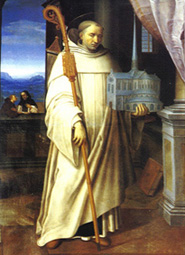
St. Bernard of Clairvaux Instructions for the Feast of St. Bernard Life of St. Bernard for Children From the Life of St. Bernard: Confession of a Devil During Exorcism St. Michael/ Exorcism A Short Explanation on the Rite of Exorcisms St. Bernard's Counsels for Confession The Root of All Sin St. Bernard of Clairvaux, Abbot and Doctor of the Church O God, Who didst give blessed Bernard to be a minister of eternal salvation to Thy people: grant, we beseech Thee, that we who have had him on earth as Teacher of life, may be worthy to have him as advocate in heaven. Through our Lord Jesus Christ, Thy Son, Who liveth and reigneth with Thee in the unity of the Holy Ghost, one God, world without end. R. Amen V. The Lord loved him and adorned him. Ant. O excellent Doctor, light of holy Church, blessed Bernard, lover of the divine law, pray unto the Son of God, for us. Ant. This man, despising the world and triumphing over earthly things, hath laid up treasure in heaven by word and deed. V. The Lord conducted the just through the right ways. R. And showed him the kingdon of God. (Roman Breviary) Bernard was born at the castle of Fontaines, in Burgundy near Dijon, in 1090. The grace of his person and the vigor of his intellect filled his parents with the highest hopes, and the world lay bright and smiling before him. But Bernard renounced it forever to join the monks of Citeaux, a few miles distant. Four of his brothers and a group of friends, thirty young Christians in all, went when he did to Citeaux, leaving the youngest brother, Nivard, to be the mainstay of his father in his old age. "You will now be heir to everything," they said to him as they departed. "Yes," said the boy; "you leave me the earth, and keep heaven for yourselves; do you consider that fair?" And he too left the world. At length their aged father came also, exchanging wealth and honor for the poverty of a monk in the monastery of Clairvaux, which Bernard with a band of monks founded in the diocese of Langres in 1115. One sister alone remained behind; she was married, and loved the world and its pleasures. Splendidly clothed, one day she came to visit Bernard, and he refused to see her. He finally consented to do so, not as her brother but as the minister of Christ. The words he then spoke moved her so deeply that two years later she retired to a convent with her husband's consent, dying later in the reputation of sanctity. Bernard's holy example attracted so many novices that many other monasteries had to be built. Unsparing for himself, he at first expected too much of his monks, who were disheartened by his severity. Soon perceiving his error, he led them forward to wonderful perfection by the sweetness of his correction and the mildness of his government. In spite of his desire to remain secluded, the fame of his sanctity spread far and wide, and many dioceses asked for him as their bishop. Through the help of Pope Eugenius III, his former subject, he escaped this dignity. Nonetheless, his retirement was continually invaded. The poor and the weak sought his protection; bishops, kings, and popes applied to him for advice; and at length Pope Eugenius himself ordered him to preach the crusade. By his fervor, eloquence, and miracles Bernard kindled the enthusiasm of Christendom, and two large armies were organized. Their defeat was only due, said the Saint, to their sins, but many had saved their souls by their dedication to the glory of God. Bernard died in 1153. His very precious writings have earned for him the title of the last Father of the Holy Church and one of its most famous Doctors. |
August 21st, St. Jane Frances de Chantal, Widow.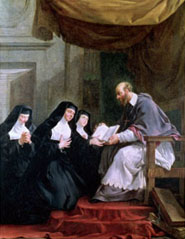 St. Jane Frances de Chantal Novena to St. Jane Frances de Chantal: Aug. 13th - Aug. 21st Exercising Works of Mercy St. Francis De Sales imparted the rule for the Institute of the Visitation of Our Lady St. Francis De Sales St. Jane Frances de Chantal, Widow. Almighty and merciful God, Who didst endow blessed Jane Frances, ever burning with love for Thee, with marvelous spiritual strength in keeping the perfect way through every path of life, and through her didst will to adorn the Church with a new family: grant, through her merits and prayers, that we who know how weak we are and trust only in Thy might, may be helped by grace from heaven, and may overcome all things that withstand us. Through our Lord Jesus Christ, Thy Son, Who liveth and reigneth with Thee in the unity of the Holy Ghost, one God, world without end. R. Amen V. With thy comeliness and thy beauty. R. Set out, proceed prosperiously, and reign. (Roman Breviary) At the age of sixteen, Jane Frances de Fremoit, already a motherless child, was placed under the care of a worldly-minded governess. In this crisis she offered herself to the Mother of God, and secured Mary's protection for life. When a Protestant sought her hand, she steadily refused to marry "an enemy of God and His Church," and shortly afterwards, as the loving and beloved wife of the Baron de Chantal, made her house the pattern of a Christian home. But God had marked her for something higher than domestic sanctity. Two children and a dearly beloved sister died, and, in the full tide of prosperity, her husband's life was taken by the innocent hand of a friend. For seven years the sorrows of her widowhood were increased by ill-usage from servants and inferiors, and the cruel importunities of friends, who urged her to marry again. Harassed almost to despair by their entreaties, she branded on her heart the name of Jesus, and in the end left her beloved home and children to live for God alone. It was on the 19th of March, 1609, that Madame de Chantal bade farewell to her family and relations. Pale, and with tears in her eyes, she passed round the large room, sweetly and humbly taking leave of each. Her son, a boy of fifteen, used every entreaty, every endearment, to induce his mother not to leave them, and at last passionately flung himself across the door of the room. In an agony of distress, she passed on over the body of her son to the embrace of her aged and disconsolate father. The anguish of that parting reached its height when, kneeling at the feet of the venerable old man, she sought and obtained his last blessing, promising to repay in her new home his sacrifice by her prayers. Well might St. Francis call her "the valiant woman." She was to found with St. Francis de Sales a great Order. Sickness, opposition, want, beset her, and the death of children, friends, and of St. Francis himself followed, while eighty-seven houses of the Visitation rose under her hand. Nine long years of interior desolation completed the work of God's grace; and in her seventieth year St. Vincent of Paul saw, at the moment of her death, her soul ascend, as a ball of fire, to heaven. Reflection--Profit by the successive trials of life to gain the strength and courage of St. Jane Frances, and they will become stepping-stones from earth to heaven. |
August 22nd, Immaculate Heart of the Blessed Virgin Mary 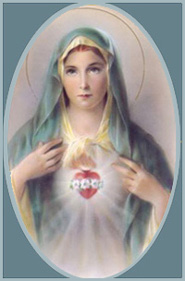 Immaculate Heart Remodel Your Home After Mary's Heart Novena to the Immaculate Heart of Mary: Aug. 14th - Aug. 22nd Devotion to the Immaculate Heart of Mary Devotion to the Sacred Heart of Mary Novena of Reparation to the Immaculate Heart of Mary; Fatima and the Rosary The Little Office of the Blessed Virgin Mary, from Candlemas until Advent Litany of Loretto The Life of the Blessed Virgin Mary as Set Forth in Her Titles from the Litany of Loretto 30 Days Prayer to the Blessed Virgin Mary Immaculate Heart of the Blessed Virgin Mary O almighty and everlasting God, Who hast prepared a worthy dwelling-place for the Holy Ghost in the heart of the blessed Virgin Mary: mercifully grant that we who celebrate with a devout mind the festival of the same Immaculate Heart, may be able to live according to Thy Heart. Through our Lord Jesus Christ, Thy Son, Who liveth and reigneth with Thee in the unity of the Holy Ghost, one God, world without end. R. Amen V. Vouchsafe that I may praise thee, O holy Virgin. R. Give me strength against thy enemies. Ant. My hear has exulted in the Lord, and my horn has been exalted in my God, for I have rejoiced in thy salvation. (Roman Breviary) St. John Eudes was responsible for activating the devotion to Our Lady's Heart and giving it the stimulus which grew into this modern feast. Pope Pius VII, at the beginning of the nineteenth century instituted a Feast of the Most Pure Heart of the Virgin Mary for optional use. In 1942, Pope Pius XII confided the whole human race to the care of Mary's Immaculate Heart in a solemn act of dedication, and established the feast celebrated today. The devotion to the Immaculate Heart of Mary is the homage paid by the faithful to Our Lady's Heart as the symbol of her complete and entire fidelity to God. It was from the Gospels that the early believers gleaned the account of Mary's inner life. Her spirit of recollection is seen in the words: "Mary kept all these words in her heart pondering over them"; her fidelity to duty in the tribute paid to her by Christ: "Blessed are they who hear the word of God and keep it"; her self-effacing charity in the trust given to her at the foot of the Cross: "Mother, behold thy son"--all these have been the background of the devotion to the Immaculate Heart since the early days of the Church. From her own words also as chiefly recorded by St. Luke, which tell of the dispositions of her heart at the Annunciation, at the loss of the Boy Christ in the Temple, at the marriage feast and, above all, in the glorious Magnificat spoken before Elizabeth, devout souls have grown to admire and love the Immaculate Heart which prompted them. The apparition to Catherine Laboure in 1830, authorizing a medal with a representation of the Immaculate Heart, furthered the devotion; in our day, the wonders at Fatima in Portugal in 1917 have enhanced it; the renewal of the First Saturday devotion in honor of Mary Immaculate has added to its popularity. Reflection--The Heart of Mary is the perfect image of the Sacred Heart of Jesus. Therefore she is our model and patron. Only through her can we hope to have our cold hearts changed into the likeness of the Heart of Jesus. August 22nd, Sts. Timothy, Hippolytus and Symphorian, Martyrs St. Timothy was martyred at Rome in the fourth century during the reign of Alexander. St. Hippolytus, Bishop of Porto, suffered martyrdom by drowning, some time during the 3rd century. St. Symphorian was beheaded at Autun towards the end of the 2nd century. O God, Who dost gladden us by the annual feast of Thy holy Martyrs, Timothy, Hippolytus and Symphorian, graciously grant that we who rejoice in their merits may be inspired by their examples. Through our Lord Jesus Christ, Thy Son, Who liveth and reigneth with Thee in the unity of the Holy Ghost, one God, world without end. R. Amen |
August 23rd, St. Philip Benizi, Confessor 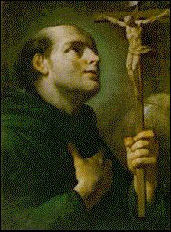 St. Philip Benizi Related links from the Practical Considerations by Fr. Weninger on the Life of St. Philip Benizi Death and the Importance of Salvation Resisting the Devil The Spiritual Works of Mercy Index of Prayers and Devotions for the Dying Two Short Sermons: On Turning from Sin to God The Sentiments of a Penitent Sinner Our Lady Refuge of Sinners Sermon on Prayer O God, Who in blessed Philip thy Confessor didst give to us a noble pattern of meekness: grant that thy servants may follow his example by despising earthly welfare, and by ever seeking after heavenly things. Through our Lord Jesus Christ, Thy Son, Who liveth and reigneth with Thee in the unity of the Holy Ghost, one God, world without end. R. Amen Ant. I will liken him to a wise man who built his house upon a rock. V. The Lord loved him and adorned him. R. He clothed him with a robe of glory. (Roman Breviary) Grant, we beseech Thee, almighty God: that the revered solemnity of blessed Bartholomew Thy Apostle, which we anticipate, may foster both our devotion and our salvation. Through our Lord Jesus Christ, Thy Son, Who liveth and reigneth with Thee in the unity of the Holy Ghost, one God, world without end. R. Amen (Roman Breviary) St. Philip Benizi was born in Florence, on the Feast of the Assumption, 1233. That same day the Order of Servites was founded by the Mother of God. As an infant at the breast, Philip broke out into speech at the sight of these new religious, and begged his mother to give them alms. Amidst all the temptations of his youth, he longed to become himself a servant of Mary, and it was only the fear of his own unworthiness which made him yield to his father's wish and begin to practise medicine. After long and weary waiting, his doubts were solved by Our Lady herself, who in a vision bade him enter her Order. Still Philip dared only offer himself as a lay brother, and in this humble state he strove to do penance for his sins. In spite of his reluctance, he was promoted to the post of master of novices; and as his rare abilities were daily discovered, he was bidden to prepare for the priesthood. Thenceforth honors were heaped upon him; he became general of the Order, and only escaped by flight elevation to the Papal throne. His preaching restored peace to Italy, which was wasted by civil wars; and at the Council of Lyons, he spoke to the assembled prelates with the gift of tongues. Amid all these favors Philip lived in extreme penitence, constantly examining his soul before the judgment-seat of God, and condemning himself as only fit for hell. St. Philip, though he was free from the stain of mortal sin, was never weary of beseeching God's mercy. From the time he was ten years old he said daily the Penitential Psalms. On his death-bed he kept reciting the verses of the Miserere, with his cheeks streaming with tears; and during his agony he went through a terrible contest to overcome the fear of damnation. But a few minutes before he died, all his doubts disappeared and were succeeded by a holy trust. He uttered the responses in a low but audible voice; and when at last the Mother of God appeared before him, he lifted up his arms with joy and breathed a gentle sigh, as if placing his soul in her hand. He died on the Octave of the Assumption, 1285. Reflection--Endeavor so to act as you would wish to have acted when you stand before your Judge. This is the rule of the Saints, and the only safe rule for all. br> August 22nd, Vigil of St. Bartholomew, Apostle The Vigil of St. Bartholomew has been celebrated from the time of St. Jerome, as we note in the Martyrology drawn up by St. Jerome. Grant, we beseech Thee, almighty God, that the holy feast of Blessed Bartholomew, Thy Apostle, which we anticipate, may both increase our devotion and advance our salvation. Through our Lord Jesus Christ, Thy Son, Who liveth and reigneth with Thee in the unity of the Holy Ghost, one God, world without end. R. Amen |
August 24th, St. Bartholomew, Apostle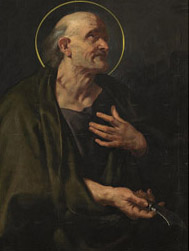 St. Bartholomew, Apostle The Lives of the 12 Apostles and St. Paul: The Apostles Creed What Cannot and What Can Be Reformed in the Church. What Every Christian Must Believe and Do to be Saved. The Labor of the Apostles: Their Teaching of the Nations Queen of Apostles Vol. 1, Part 2: The Ministry of Jesus Christ from the Latin Vulgate, as Illustrated by Catholic Artist and Historian, James Tissot, 1899 Prayer: its Conditions and Circumstances St. Bartholomew, Apostle Almighty and everlasting God, Who hast given us a reverent and holy joy in this day's festival of Thy blessed Apostle Bartholomew: grant, we beseech Thee, that Thy Church may love what he believed, and preach what he taught. Through our Lord Jesus Christ, Thy Son, Who liveth and reigneth with Thee in the unity of the Holy Ghost, one God, world without end. R. Amen Ant. This man, despising the world and trimphing over earthly things, hath laid up treasure in heaven by word and deed. V. The Lord conducted the just through the right ways. R. And showed him the kingdom of God. (Roman Breviary) The sound of the Apostles went into all lands, and their words unto the ends of the world, the glorious company of the Apostles praise Thee, O God. Alleluia. Blessed be Thou, O Lord, the unfailing Fountain of all good things, Who has chosen the holy Apostles, the first-born of Thy son, and the first preachers of the Gospel, to be before other Saints the pillars and foundations of the Christian Church, that through the healthful doctrine and wonderful works the Catholic Faith might plenteously shine over the whole earth among both Jews and Gentiles. I therefore must humbly beseech Thy majesty that, as we are founded upon the rock of the Apostolic confession, that as we were called by those same princes of our religion into the unity of the faith, and abide gathered together in the house of Thy Church, so may we not only with steadfast and thankful minds hold fast, their Apostolic doctrine and tradition, but also, by blameless lives, follow their holy conversation. And with our Christian profession, may we ever join, first, burning charity, then unceasing patience. Through Jesus Christ our Lord. Amen. The Apostles Creed I believe in God, the Father Almighty, Creator of heaven and earth; and in Jesus Christ, His only Son, our Lord; Who was conceived of the Holy Ghost, born of the Virgin Mary, suffered under Pontius Pilate, was crucified, died, and was buried. He descended into hell; the third day He arose again from the dead; He ascended into heaven and sitteth at the right hand of God, the Father Almighty: from thence He shall come to judge the living and the dead. I believe in the Holy Ghost, the Holy Catholic Church, the communion of Saints, the forgiveness of sins, the resurrection of the body, and life everlasting. Amen. St. Bartholomew was one of the twelve who were called to the apostolate by our blessed Lord Himself. Several learned interpreters of the Holy Scripture take this apostle to have been the same as Nathaniel, a native of Cana, in Galilee, a doctor in the Jewish law, and one of the seventy-two disciples of Christ, to whom he was conducted by St. Philip, and whose innocence and simplicity of heart deserved to be celebrated with the highest eulogium by the divine mouth of Our Redeemer. He is mentioned among the disciples who were met together in prayer after Christ's ascension, and he received the Holy Ghost with the rest. Being eminently qualified by the divine grace to discharge the functions of an apostle, he carried the Gospel through the most barbarous countries of the East, penetrating into the remoter Indies. He then returned again into the northwest part of Asia, and met St. Philip, at Hierapolis, in Phrygia. Hence he travelled into Lycaonia, where he instructed the people in the Christian Faith; but we know not even the names of many of the countries in which he preached. St. Bartholomew's last removal was into Great Armenia, where, preaching in a place obstinately addicted to the worship of idols, he was crowned with a glorious martyrdom. The modern Greek historians say that he was condemned by the governor of Albanopolis to be crucified. Others affirm that he was flayed alive, which might well enough consist with his crucifixion, this double punishment being in use not only in Egypt, but also among the Persians. Reflection--The characteristic virtue of the apostles was zeal for the divine glory, the first property of the love of God. A soldier is always ready to defend the honor of his prince, and a son that of his father; and can a Christian say he loves God who is indifferent to His honor? |
August 25th, St. Louis IX, King and Confessor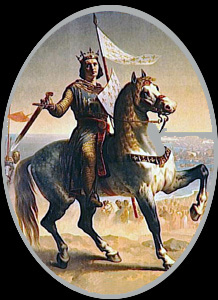 St. Louis IX. King of France The Corporal Works of Mercy The Spiritual Works of Mercy Influence of the Example of Parents Upon Their Children Sermon: The Pleasure of Serving God Two Short Reflections: On True Forgiveness On Forgiveness and Forgetfulness St. Louis IX, King and Confessor O God, Who didst remove blessed Louis Thy Confessor from an earthly throne to the glory of the heavenly kingdom: grant, we beseech Thee, through his merits and prayers, that we may have fellowship with the King of kings, Jesus Christ, Thy Son: Who liveth and reigneth with Thee in the unity of the Holy Ghost, one God, world without end. R. Amen Ant. I will liken him to a wise man who built his house upon a rock. V. The Lord loved him and adorned him. R. He clothed him with a robe of glory. (Roman Breviary) The mother of Louis told him she would rather see him die than commit a mortal sin, and he never forgot her words. King of France at the age of twelve, he made the defence of God's honor the aim of his life. Before two years, he had crushed the Albigensian heretics, and forced them by stringent penalties to respect the Catholic faith. Amidst the cares of government, he daily recited the Divine Office and heard two Masses, and the most glorious churches in France are still monuments of his piety. When his courtiers remonstrated with Louis for his law that blasphemers should be branded on the lips, he replied, "I would willingly have my own lips branded to root out blasphemy from my kingdom." The fearless protector of the weak and the oppressed, he was chosen to arbitrate in all the great feuds of his age, between the Pope and the Emperor, between Henry III. and the English barons. In 1248, to rescue the land which Christ had trod, he gathered round him the chivalry of France, and embarked for the East. There, before the infidel, in victory or defeat, on the bed of sickness or a captive in chains, Louis showed himself ever the same--the first, the best, and the bravest of Christian knights. When a captive at Damietta, an Emir rushed into his tent brandishing a dagger red with the blood of the Sultan, and threatened to stab him also unless he would make him a knight, as the Emperor Frederick had Facardin. Louis calmly replied that no unbeliever could perform the duties of a Christian knight. In the same captivity he was offered his liberty on terms lawful in themselves, but enforced by an oath which implied a blasphemy, and though the infidels held their swords' points at his throat, and threatened a massacre of the Christians, Louis inflexibly refused. The death of his mother recalled him to France; but when order was reestablished he again set forth on a second crusade. In August, 1270, his army landed at Tunis, and, though victorious over the enemy, succumbed to a malignant fever. Louis was one of the victims. He received the Viaticum kneeling by his camp-bed, and gave up his life with the same joy that he had given all else for the honor of God. Reflection--If we cannot imitate St. Louis in dying for the honor of God, we can at least resemble him in resenting the blasphemies offered against God by the infidel, the heretic, and the scoffer. |
August 26th, St. Zephyrinus, Pope and Martyr
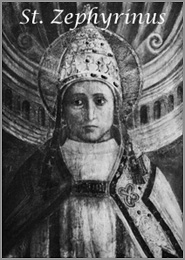
Showing Forth Our Faith The Heresy of Indifferentism: the Consequence of Luther's Heresy of Faith Alone St. Zephyrinus, Pope and Martyr O eternal Shepherd watch over the peace of Thy flock, and through blessed Zephyrinus Thy Martyr and Sovereign Pontiff, whom thou didst appoint shepherd over the whole Church, keep her under Thy constant protection. Through our Lord Jesus Christ, Thy Son, Who liveth and reigneth with Thee in the unity of the Holy Ghost, one God, world without end. R. Amen Ant. This Saint hath striven for the law of his God even unto death, and hath not feared for the words of the ungodly; for he had been founded upon a firm rock. V. Thou hast crowned him with glory and honor, O Lord. R. And hast set him over the works of Thy hands. (Roman Breviary) Zephyrinus, a native of Rome, succeeded Victor in the pontificate, in the year 202, in which Severus raised the fifth most bloody persecution against the Church, which continued not for two years only, but until the death of that emperor in 211. Under this furious storm this holy pastor was the support and comfort of the distressed flock of Christ, and he suffered by charity and compassion what every confessor underwent. The triumphs of the martyrs were indeed his joy, but his heart received many deep wounds from the fall of apostates and heretics. Neither did this latter affliction cease when peace was restored to the Church. Our Saint had also the affliction to see the fall of Tertullian, which seems to have been owing partly to his pride. Eusebius tells us that this holy Pope exerted his zeal so strenuously against the blasphemies of the heretics that they treated him in the most contumelious manner; but it was his glory that they called him the principal defender of Christ's divinity. St. Zephyrinus filled the pontifical chair seventeen years, dying in 219. He was buried in his own cemetery, on the 26th of August. He is, in some Martyrologies, styled a martyr, which title he might deserve by what he suffered in the persecution, though he perhaps did not die by the executioner. Reflection--God has always raised up holy pastors zealous to maintain the faith of His Church inviolable, and to watch over the purity of its morals and the sanctity of its discipline. We enjoy the greatest advantages of the divine grace through their labors, and we owe to God a tribute of perpetual thanksgiving and immortal praise for all those mercies which He has afforded His Church on earth. |
August 27th, St. Joseph Calasanctius, Confessor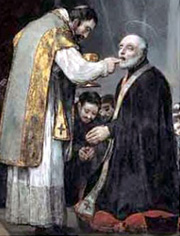
St. Joseph Calasanctius Religious and Moral Training of Children On the Mode of Teaching Christian Doctrine to Children Children Prayers and Sermons St. Joseph Calasanctius, Confessor O God, Who by means of holy Joseph Thy Confessor didst provide Thy Church with new helpers for training the young in the spirit of understanding and piety: grant, we beseech Thee, that, through his example and intercession, we may so work and so teach as to win everlasting rewards. Through our Lord Jesus Christ, Thy Son, Who liveth and reigneth with Thee in the unity of the Holy Ghost, one God, world without end. R. Amen (Roman Breviary) St. Joseph Calasantius was born in Arragon, in 1556. When only five years old, he led a troop of children through the streets to find the devil and kill him. He became a priest, and was engaged in various reforms, when he heard a voice saying, "Go to Rome," and had a vision of many children who were being taught by him and by a company of angels. When he reached the Holy City, his heart was moved by the vice and ignorance of the children of the poor. Their need mastered his humility, and he founded the Order of Clerks Regular of the Pious Schools. He himself provided all that was necessary for the education of the children, receiving nothing from them in payment, and there were soon about a thousand scholars of every rank under his care. Each lesson began with prayer. Every half-hour devotion was renewed by acts of faith, hope, and charity, and towards the end of school-time the children were instructed in the Christian doctrine. They were then escorted home by the masters, so as to escape all harm by the way. But enemies arose against Joseph from among his own subjects. They accused him to the Holy Office, and at the age of eighty-six he was led through the streets to prison. At last the Order was reduced to a simple congregation. It was not restored to its former privileges till after the Saint's death. Yet he died full of hope. "My work," he said, "was done solely for the love of God." Reflection--"My children," said the Cure of Ars, "I often think that most of the Christians who are lost are lost for want of instruction; they do not know their religion well." |
August 28th, St. Augustine, Confessor and Doctor of the Church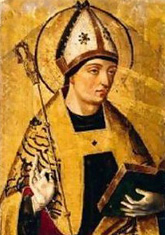 St. Augustine I. St. Augustine II. Instructions on the Feast of St. Augustine, Bishop The Conversion of Sinners On the Abuse of Divine Mercy by St. Alphonsus True Conversion: One of the best sermons for hardened sinners The 6th Commandment The 9th and 10th St. Monica, Widow A Mother's Prayers The Mother of St. Augustine St. Ambrose Bishop, Confessor, and Doctor of the Church The Vice of Impurity St. Augustine, Confessor and Doctor of the Church Give heed to our humble prayers, O Almighty God. Give us a firm trust in the mercy we hope from Thee through the intercession of blessed Augustine, Thy Confessor and Bishop. Grant that we may receive through him the fruit of Thy wonderful mercy. Through our Lord Jesus Christ, Thy Son, Who liveth and reigneth with Thee in the unity of the Holy Ghost, one God, world without end. R. Amen V. The Lord loved him and adorned him. R. He clothed him with a robe of glory. Ant. O Excellent Doctor, light of holy Church, blessed Augustine, lover of the divine law, pray unto the Son of God for us. (Roman Breviary) St. Augustine was born in 354, at Tagaste in Africa. He was brought up in the Christian faith, but without receiving baptism. An ambitious school-boy of brilliant talents and violent passions, he early lost both his faith and his innocence. He persisted in his irregular life until he was thirty-two. Being then at Milan professing rhetoric, he tells us that the faith of his childhood had regained possession of his intellect, but that he could not as yet resolve to break the chains of evil habit. One day, a however, stung to the heart by the account of some sudden conversions, be cried out, "The unlearned rise and storm heaven, and we, with all our learning, for lack of heart lie wallowing here." He then withdrew into a garden, when a long and terrible conflict ensued. Suddenly a young fresh voice (he knows not whose) breaks in upon his strife with the words, "Take and read;" and he lights upon the passage beginning, "Walk honestly as in the day." The battle was won. He received baptism, returned home, and gave all to the poor. At Hippo, where he settled, he was consecrated bishop in 395. For thirty-five years he was the centre of ecclesiastical life in Africa, and the Church's mightiest champion against heresy; whilst his writings have been everywhere accepted as one of the principal sources of devotional thought and theological speculation. He died in 430. Reflection--Read the lives of the Saints, and you will ill find that you are gradually creating a society about you to which in some measure you will be forced to raise the standard of your daily life. |
August 29th, The Beheading of St. John the Baptist
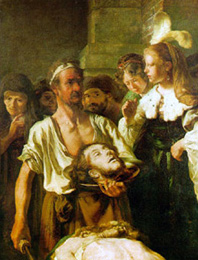 Beheading of St. John the Baptist Novena to St. John the Baptist: Aug. 21st - Aug 29th The Ravages of Adultery Thou Shalt not Commit Adultery Moral Teaching on Unchaste Thoughts and Desires The 6th Commandment The Sixth Commandment: Explained by St. Thomas Aquinas The 9th and 10th Commandments The 5th Commandment Sermon on Keeping the 10 Commandments Mortal Sin Examination of Conscience for Sins Against Purity Holy Purity The Necessity of Prayer for Sinners The Four Gates of Hell Catholic Laws on Marriage and Divorce In Defense of Catholic Marriage Against Divorce Unworthy Communion: Receiving in Mortal Sin such as Adultery The Sin of Scandal Catholic Preparation for Marriage Christian Marriage Encyclical Arcanum: Christian Marriage by Pope Leo XIII. What Cannot and What Can Be Reformed in the Church. There can be no changes to the Divine Condemnation of Adultery as a Mortal Sin Sins Against Marriage Contract Index on Marriage and all Related Questions: A Catholic's Moral Guide to Sacramental Marriage and Family Life, Includes a Glossary of Faith and Morals for the Married and Unmarried The Beheading of St. John the Baptist We beseech Thee, O Lord, that the revered feast of holy John the Baptist, Thy precursor and Martyr, may win for us help towards salvation: Who livest and reignest with God the Father in the unity of the holy Ghost, one God, world without end. R. Amen V. Thou hast crowned him with glory and honor, O Lord. R. And hast set him over the works of thy hands. Ant. Herod, sending an executioner, command that John be beheaded in prison. His disciples hearing this, came, took his body, and laid it in the tomb. (Roman Breviary) The Bond of Marriage by St. Alphonsus Liguori The bond of a previous marriage is an impediment which death alone can remove. The Catholic Church holds that, by the institution and ordinance of Almighty God, marriage is indissoluble. No power on earth, no prince, no judge, no legislature, can break the bond which unites husband and wife. For certain just causes, especially for adultery, they may live separately, but they arc still married, and cannot marry again. If, after such a separation, or after a divorce granted by the law of the land, either party should marry another person, it would be no true marriage before God, but an adultery. Jesus Christ has said it: "Whosoever shall put away his wife, except it be for fornication, and shall marry another, committeth adultery (St. Matt, xix.).'' It is therefore permitted in such a case to separate, but the marriage bond is not broken, the parties remain still husband and wife; for our Lord goes on to say: "he that shall marry her that is put away committeth adultery" If the first bond were really dissolved by such a separation, it might be forbidden, indeed, to the guilty party to contract a new one, but our Lord would never call the second marriage an adultery. Therefore, the words, except it be for fornication," have reference to the lawfulness of putting away the guilty woman at all, but give no permission to the innocent party to marry again. "What God hath joined together, let no man put assunder" says our Lord, in thy same chapter, condemning beforehand the iniquity of those divorces which are obtained in Protestant Legislatures, or Courts of Law. Let it be remembered, then, that no divorce, no guilt, no desertion, however wanton and unfeeling, no years of absence, can ever break the marriage bond. Nothing but a certain knowledge of the death of one party, can make it lawful for the other to marry. Although it might cause public scandal, although the honor of whole families may be at stake, although children would be exposed to shame and destitution by a separation, the guilty parties to these false second marriages must separate under pain of hell-fire. |
August 30th, St. Rose of Lima
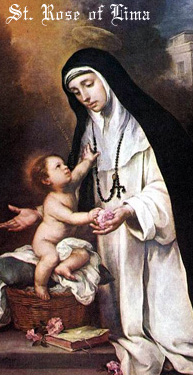 St. Rose of Lima: Novena, Prayers and Devotions St. Rose of Lima: The Flower of the New World Instructions on the Feast of St. Rose of Lima St. Rose of Lima Thou, O almighty God, giver of all good gifts, hast ordained that blessed Rose, anticipating Thy heavenly grace should bloom in the beauty of virginity and patience in the Indies. Grant that we, Thy servants, who run after the odor of her perfumes, may ourselves be found worthy to become a sweet savor of Christ. Who livest and reignest with God the Father in the unity of the holy Ghost, one God, world without end. R. Amen Ant. Come, Spouse of Christ, receive the crown which the Lord hath prepared for thee for all eternity. V. With the comeliness and thy beauty. R. Set out, proceed prosperously, and reign. (Roman Breviary) The first flower or sanctity in South America was the virgin Rose, born of Christian parents in Lima. Soon after infancy she gave clear signs of her future holiness. For on a certain occasion the countenance of the baby was transformed marvelously to resemble a rose. This was the occasion of this name being given her. Somewhat later the Virgin Mother of God gave her an additional name, commanding that she be called from that time on, St. Mary's Rose. When she was five years old she took a vow of perpetual virginity. As she grew older and became fearful that her parents might compel her to marry, she secretly cut off her beautiful hair. She fasted to a superhuman degree. Whole Lents would pass during which she ate no bread but subsisted solely on five seeds from the lime fruit. After Rose had taken the habit of the third order of St. Dominic she redoubled her former austerities. She inserted small pins all over her very long and very rough, hair-shirt. Day and night she wore under her veil a circlet studded inside with sharp nails. Treading in the difficult footsteps of St. Catherine of Siena she girded her loins with an iron chain, wound around her body three times. She made herself a small cot of gnarled logs and Elled the spaces between with shards of broken pottery. In a distant comer of he family garden she built herself a narrow little cell. There she devoted herself to meditation upon heavenly things. She subdued her frail body with frequent disciplines, fastings and vigils. As her body weakened, her spirit waxed strong. She triumphed in frequent struggles with the apparition of demons. She attacked them fearlessly and overcame them. Though she suffered dreadfully from the pains of many illnesses, from the reviling of members of her own family, and from malicious tongues, she protested she was not afflicted as she deserved to be. During fifteen years she would pine for several hours at a time, most wretched in the throes of spiritual desolation and dryness. She bore with undaunted courage these agonies more bitter than any form of death. All of Saint Rose's sufferings were offered for the conversion of sinners, and the thought of the multitudes in hell was ever before her soul. After that period she began to experience an abundance of heavenly delights. She was honored by visions and melted with seraphic ardor. Through their frequent appearances to her, she was marvelously familiar with her guardian angel, with St. Catherine of Siena, and with the Virgin Mother of God. She was privileged to hear these words from Christ: Rose of my heart, be thou my spouse. At length she was happily borne to the paradise of that Spouse. Because she was well known for miracles both before and after her death, the supreme Pontiff, Clement X, with solemn rites added her name to the list of holy virgins. |
August 31st, St. Raymund Nonnatus, Confessor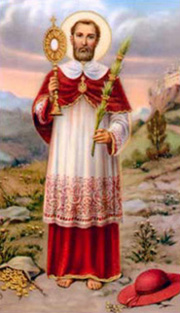 St. Raymond Nonnatus Prayers for Catholic Mothers The Christian Mother Your Guardian Angel throughout life Children Prayers and Sermons Prayers of Thanksgiving The 8th Commandment St. Raymund Nonnatus, Confessor O God, by Thy grace blessed Raymund Thy Confessor wrought wonders in redeeming Thy faithful people from the hands of wicked men. Grant, we beseech Thee, that loosened from the bonds of our sins, with free minds we may always do what is well-pleasing to Thee. Through our Lord Jesus Christ, Thy Son, Who liveth and reigneth with Thee in the unity of the Holy Ghost, one God, world without end. R. Amen V. The Lord loved him, and adorned him. R. He clothed him with a robe of glory. Ant. I will liken him to a wise man who built his house upon a rock. (Roman Breviary) Saint Raymund Nonnatus was born in Catalonia, Spain, in the year 1204. Motherless from infancy, in his childhood he seemed to find pleasure only in his devotions and serious duties. He chose the Blessed Virgin for his mother, almost as soon as the light of reason made this choice available to him. His father, perceiving in him an inclination to the religious state and unwilling to give up his son, took him from school and sent him to take care of a farm which he owned in the country. Raymund readily obeyed, and, in order to enjoy holy solitude, kept the sheep himself and spent his time in the mountains and forests in holy meditation and prayer. He found there an ancient hermitage containing a portrait of his Blessed Mother, and made this his asylum. There the devil found him and, assuming the disguise of a shepherd, attempted to turn him away from his devotions; but Raymund turned his back on his visitor and called Mary to his assistance. The sole name of the Mother of God caused the demon to disappear, and the hermit prostrated himself and blessed Her for Her assistance. Some time afterward, he joined the new Order of Our Lady of Mercy for the redemption of captives, and was admitted to profession at Barcelona by the holy founder, Saint Peter Nolasco. Within two or three years after his profession, he was sent into Barbary with a considerable sum of money; in Algiers he purchased the liberty of a great number of slaves. When all his treasure was exhausted, he gave himself up as a hostage for the ransom of others, according to the Rule of his Order. This magnanimous sacrifice served only to exasperate the Moslems, who treated him with uncommon barbarity, until they began to fear that if he died in their hands, they would lose the ransom which had been asked for his deliverance. A crier announced in the streets that anyone who mistreated him would answer for it, if he died. Therefore he was permitted to go abroad in the streets, which liberty he utilized to comfort and encourage the Christians in chains, and to convert and baptize certain Moslems. Learning of this, their pasha, furious, condemned him to be impaled, but his barbarous sentence was commuted at the insistence of those who had an interest in the ransom payments for the slaves he was replacing. He underwent instead a cruel bastinade, but that torment did not daunt his courage. So long as he saw souls in danger of perishing eternally, he thought he had yet done nothing. Saint Raymund had no more money to employ in releasing poor captives; and to converse with those of the local beliefs on the subject of religion meant death. He enjoyed sufficient liberty nonetheless to continue the same endeavors, and he did so, hoping either for success or martyrdom. The governor, enraged, ordered our Saint to have his lips pierced and padlocked, then to be imprisoned until his ransom would be brought by members of his Order. He remained in jail for eight months before his brethren arrived with the required sum, sent by Saint Peter Nolasco. Upon his return to Spain, he was nominated Cardinal by Pope Gregory IX, and the Pope called him to Rome. The Saint was on his way, but had gone no farther than Cardona when he was seized with a violent fever. He died on August 31, 1240, in his thirty-seventh year. His face in death became beautiful and radiant like that of Moses when he descended from the mountaintop, where he had spoken with God. A heavenly fragrance surrounded his body, and cures were effected on behalf of those who came and touched him. |
Saints and Feast Days for the Month of September
All of the following are non-moveable feasts that always occurs on the same date each year
All of the following are non-moveable feasts that always occurs on the same date each year
September 1st, St. Giles, Abbot
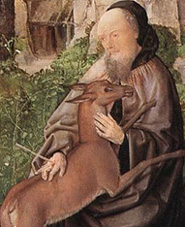 St. Giles, Holy Helper The Fourteen Holy Helpers Novena to Giles, Holy Helper: Aug. 24nd - Sept. 1st The Danger of Human Respect by St. Alphonsus Liguori False Confidence of Salvation Final Perseverance by St. Bonaventure On Vainglory and Prescriptions Against It The Vice of Pride and Remedies Against It St. Giles, Abbot May the intercession of the blessed Abbot Giles procure favor for us, we beseech Thee, O Lord: that we may gain, by his patronage, those things of which we are not capable by our own merits. Through our Lord Jesus Christ, Thy Son, Who liveth and reigneth with Thee in the unity of the Holy Ghost, one God, world without end. R. Amen Ant. I will liken him to a wise man who built his house upon a rock. V. The Lord loved him and adorned him. R. He clothed him with a robe of glory. (Roman Breviary) St. Giles, whose name has been held in great veneration for several ages in France and England, is said to have been an Athenian by birth, and of noble extraction. His extraordinary piety and learning drew the admiration of the world upon him in such a manner that it was impossible for him to enjoy in his own country that obscurity and retirement which was the chief object of his desires on earth. He therefore sailed to France, and chose a hermitage first in the open deserts near the mouth of the Rhone, afterward near the river Gard, and lastly in a forest in the diocese of Nismes. He passed many years in this close solitude, living on wild herbs or roots and water, and conversing only with God. We read in his life that he was for some time nourished with the milk of a doe in the forest, which, being pursued by hunters, fled for refuge to the Saint, who was thus discovered. The reputation of the sanctity of this holy hermit was much increased by many miracles which he wrought, and which rendered his name famous throughout all France. St. Giles was highly esteemed by the French king, but could not be prevailed upon to forsake his solitude. He, however, admitted several disciples, and settled excellent discipline in the monastery of which he was the founder, and which, in succeeding ages, became a flourishing abbey of the Benedictine Order. Reflection--He who accompanies the exercises of contemplation and arduous penance with zealous and undaunted endeavors to conduct others to the same glorious term with himself, shall be truly great in the kingdom of heaven. St. Giles is among the 14 Holy Helpers. |
September 2nd, St. Stephen. First Friday.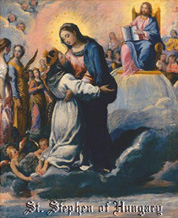
St. Stephen of Hungary The Corporal Works of Mercy The Spiritual Works of Mercy Index of Prayers and Devotions for the Sick On the Horror of Mortal Sin The Sin Unto Death by Cardinal Manning On the Havoc of Mortal Sin How Blind the Sinner Is Two Short Sermons: 1.) On the Virtue of Patience 2.) On the Means of Acquiring Patience On Conformity to the Will of God and The Motives that Oblige Us On Our Two Duties Grant, we beseech Thee, almighty God, that even as the faith of Thy Church was spread abroad by blessed Stephen Thy Confessor, while he reigned upon earthy, so she may be deemed worthy to have him also for a glorious champion in heaven. Through our Lord Jesus Christ, Thy Son, Who liveth and reigneth with Thee in the unity of the Holy Ghost, one God, world without end. R. Amen V. The Lord loved him and adorned him. R. He clothed him with a robe of glory. Ant. I will liken him to a wise man who built his home upon a rock. (Roman Breviary) St. Stephen, King and Confessor. Geysa, fourth Duke of Hungary, was, with his wife, converted to the Faith, and saw in a vision the martyr St. Stephen, who told him that he should have a son who would perfect the work he had begun. This son was born in 977, and received the name of Stephen. He was most carefully educated, and succeeded his father at an early age. He began to root out idolatry, suppressed a rebellion of his pagan subjects, and founded monasteries and churches all over the land. He sent to Pope Sylvester, begging him to appoint bishops to the eleven sees he had endowed, and to bestow on him, for the greater success of his work, the title of king. The Pope granted his requests, and sent him a cross to be borne before him, saying that he regarded him as the true apostle of his people. His devotion was fervent. He placed his realms under the protection of our blessed Lady, and kept the feast of her Assumption with peculiar affection. He gave good laws, and saw to their execution. Throughout his life, we are told, he had Christ on his lips, Christ in his heart, and Christ in all he did. His only wars were wars of defence, and he was always successful. God sent him many and sore trials. One by one his children died, but he bore all with perfect submission to the will of God. When St. Stephen was about to die, he summoned the bishops and nobles, and gave them charge concerning the choice of a successor. Then he urged them to nurture and cherish the Catholic Church, which was still as a tender plant in Hungary, to follow justice, humility, and charity, to be obedient to the laws, and to show ever a reverent submission to the Holy See. Then, raising his eyes towards heaven, he said, "O Queen of Heaven, august restorer of a prostrate world, to thy care I commend the Holy Church, my people, and my realm, and my own departing soul." And then, on his favorite feast of the Assumption, in 1038, he died in peace. Reflection--"Our duty," says Father Newman, "is to follow the Vicar of Christ whither he goeth, and never to desert him, however we may be tried; but to defend him at all hazards and against all corners, as a son would a father, and as a wife a husband, knowing that his cause is the cause of God." |
September 3rd, St. Pius X., Pope. 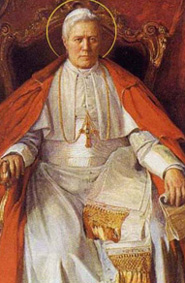 Pope St. Pius X, Novena, the Oath Against Modernism and Syllabus Against Modernist Errors First Communion by Mother Mary Loyola Behold the Lamb, A Book for Little Folks About the Holy Mass, 1912 What is Liberalism Pope Leo XIII. Encycle Concerning Modern Errors: Socialism, Communism, Nihilism What Cannot and What Can Be Reformed in the Church. What Every Christian Must Believe and Do to be Saved. The Value and Necessity of Christian Doctrine On the Mode of Teaching Christian Doctrine to Children How to Teach Little Ones: A Children's Catechism Catholic Teaching for Children St. Pius X., Pope Cardinal Joseph Sarto, who was elected on August 4, 1903, to succeed Leo XIII, was born near Venice on June 2, 1835, and was the son of a postman. He had been curate, parish priest, seminary professor, vicar general and bishop of Mantua before becoming cardinal patriarch of Venice and then pope. In 1904 he was insulted, very deliberately, by the French president. When the new pope, who had taken the title of Pius X, protested, the French withdrew their ambassador from the Vatican, and seized all ecclesiastical property in France, separating church and state, and removing from the French clergy all means of subsistence. This crisis was followed by the one which occurred among the clergy themselves, some of whom had been infected by the Modernist heresy. The pope dealt with this crisis by issuing against the Modernist heresy the decree Lamentabili in July 1907, and the encyclical Pascendi on September 8, 1907. Pope Pius X's motto was the "Restoration of all things in Christ," and his first action was to encourage frequent Communion, and to allow children to make their first Communion as soon as they knew the truths necessary for salvation, and the difference between the Eucharist and ordinary bread. He also restored Gregorian plain chant to its place in the liturgy, and founded a Pontifical Institute of Sacred Music in Rome; he reformed the Roman Curia and recodified the canon law. He died on August 20, 1914, and was canonized on May 31, 1954. |
September 4th, In some places the Feast of St. Rose of Viterbo, Virgin is celebrated.
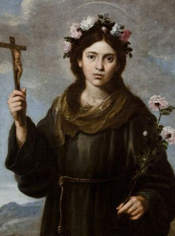 St. Rose of Viterbo Saint Rose was born in the spring of 1235 at Viterbo, capital of the patrimony of Saint Peter. In those days the emperor Frederick II was oppressing the Church, and many were faithless to the Holy See. But this infant at once seemed filled with grace; she never cried; with tottering steps she sought Jesus in His tabernacle; she knelt before sacred images and listened to sermons and pious conversation, retaining all she heard, and this when she was scarcely three years old. One coarse habit covered her flesh; fasts and disciplines were her delight. At the age of seven she wished to enter a monastery of nuns; but God had other designs for her, and she resolved to create a solitude in her father's house, where she would forever spend all her days. Her mortifications there seem incredible to our time of laxity; she gave herself the discipline three times a day until she fainted from fatigue and loss of blood, and she scarcely ate at all. To those who urged her to mitigate her austerities, she explained so perfectly that happiness consists in suffering for God, that no one could doubt this was so for her. Nonetheless she fell ill and nearly died of consumption. She was close to the final agony when suddenly she beheld the Mother of God, and said to those attending her: All of you here, why do you not greet the Queen of the world? Do you not see Mary, the August Mother of my God, coming forward? Let us go to meet Her, and prostrate ourselves before Her majesty! Everyone turned toward the door and knelt down, and the Mother of God spoke to Rose, telling her she must enter the Third Order of Saint Francis, then go out to reprove, convince, exhort and bring back the erring to the paths of salvation. If your endeavors bring upon you sarcasm and mockery, persecution and labor, you must bear them patiently... Those who assist you will be enriched with all the graces of the Lord. To defend the Church's rights was already Rose's burning wish. When hardly ten years old, she arose after her reception into the Franciscan habit, went down to the public square at Viterbo, called upon the inhabitants to be faithful to the Sovereign Pontiff, and vehemently denounced all his opponents. She returned to her house only to redouble her flagellations and macerations; she saw her Saviour on the Cross and nothing could arrest her ardor thereafter. So great was the power of her word and of the miracles which accompanied it, that at the end of several months the Imperial party, after threatening her in vain to stop her preaching, in fear and anger drove her from the city. Saint Rose and her parents moved to Soriano, a fortified city, where she continued to do as she had been told by the Mother of God. Then Rose went on by herself to Vitorchiano, where she had understood there was need for her, and continued to win souls by her aspect as much as by her words. She went barefoot and wore a poor tunic at all times, until after some eighteen months, when the emperor had died, she and her parents returned to Viterbo. Innocent IV was brought back in triumph to Rome and the cause of God was won. A number of young girls came to her for instruction at Viterbo, and she taught them the principles of modest prudence and faithful love of God. Rose fell ill again and recognized that her end was approaching; she prepared, rejoicing, in solitude for her glorious destiny, and died in her eighteenth year. Not long afterward, she appeared in glory to Alexander IV, and bade him to translate her intact body. He found it fragrant and beautiful, as if still in life. For more than 700 years it has remained supple and unchanged, save for its color, darkened after a fire in the chapel where it reposed. 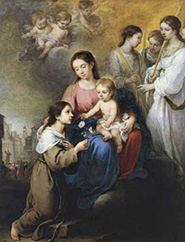 Reflection: Rose lived but eighteen years, saved the Church's cause, and died a Saint. We have lived, perhaps, much longer, but with what result? Every minute something can be done for God. Time is the money for eternity; shall we waste it and have nothing to show for it? |
September 5th, St. Lawrence Justinian, Bishop and Confessor
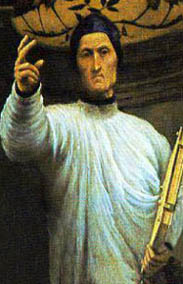
St. Lawrence Justinian On Resignation to the Will of God in All of Our Sufferings On Self Denial and Mortification of the Interior Good and Bad Priests Part II. The Incontinent Priest and Sacrilegious Mass Part I. Grievousness and Chastisement of Sin in a Priest Sermon on Keeping the 10 Commandments The Nature of Sin They are Gone Down to Hell The Sight of Hell, A Book for Children and Young Persons as well as Adults The Mercy and Justice of God Fear of Divine Justice St. Lawrence Justinian, Bishop and Confessor Grant, we beseech Thee, almighty God: that the holy festival of blessed Lawrence Thy Confessor and Bishop may both increase our devotion and advance our salvation. Through our Lord Jesus Christ, Thy Son, Who liveth and reigneth with Thee in the unity of the Holy Ghost, one God, world without end. R. Amen (Roman Breviary) Laurence from a child longed to be a Saint; and when he was nineteen years of age there was granted to him a vision of the Eternal Wisdom. All earthly things paled in his eyes before the ineffable beauty of this sight, and as it faded away a void was left in his heart which none but God could fill. Refusing the offer of a brilliant marriage, he fled secretly from his home at Venice, and joined the Canons Regular of St. George. One by one he crushed every natural instinct which could bar his union with his Love. When Laurence first entered religion, a nobleman went to dissuade him from the folly of thus sacrificing every earthly prospect. The young monk listened patiently in turn to his friend's affectionate appeal, scorn, and violent abuse. Calmly and kindly he then replied. He pointed out the shortness of life, the uncertainty of earthly happiness, and the incomparable superiority of the prize he sought to any his friend had named. The nobleman could make no answer; he felt in truth that Laurence was wise, himself the fool. He left the world, became a fellow-novice with the Saint, and his holy death bore every mark that he too had secured the treasures which never fail. As superior and as general, Laurence enlarged and strengthened his Order, and as bishop of his diocese, in spite of slander and insult, thoroughly reformed his see. His zeal led to his being appointed the first patriarch of Venice, but he remained ever in heart and soul an humble priest, thirsting for the sight of heaven. At length the eternal vision began to dawn. "Are you laying a bed of feathers for me?" he said. "Not so; my Lord was stretched on a hard and painful free." Laid upon the straw, he exclaimed in rapture, "Good Jesus, behold I come." He died in 1435, aged seventy-four. Reflection--Ask St. Laurence to vouchsafe you such a sense of the sufficiency of God that you too may fly to Him and be at rest. |
September 7th, from Earlier Calendars: Saint Cloud, Confessor 3 Short Sermons: 1. On the Consideration of Ourselves 2. On Our First Beginning 3. On Our Last End Saint Cloud is the most illustrious Saint among the princes of the royal family of the first French dynasty, the Merovingians (499-752). Born in 522, he was the son of Chlodomir, King of Orleans and eldest son of Clovis and Saint Clotilda. He was not yet three years old when his father was killed during a war. His grandmother, Saint Clotilda, brought him and his two brothers to Paris to be educated, and loved them dearly. Their ambitious uncles, however, desiring to divide the kingdom of Orleans between themselves, slew with their own hands the two young brothers of Cloud. He, by a special dispensation of Providence, was saved from the massacre. Later, renouncing the world, he privately consecrated himself to the service of God. After distributing to the poor what he could salvage of his heritage, he retired to a hermitage to be under the discipline of a holy recluse named Severinus, who dwelt near the gates of Paris and who clothed him with the monastic habit. His uncles left him alone, seeing his inalterable decision to live as a religious, and conceded certain heritages to him. When he became famous through an act of charity rewarded by a miracle, he withdrew secretly to Provence. There again, his hermitage was sought out by petitioners. He decided to return to Paris, where he was received with the greatest joy. At the earnest request of the people, he was ordained a priest in 551 by Eusebius, Bishop of Paris, and served the Church of that city for some time in the functions of the sacred ministry. Again he found himself in great honor; he therefore retired to Nogent, a place now known as Saint Cloud, two leagues south of Paris, where he built a monastery. There he was joined by many pious men, who fled from the world for fear of losing their souls in its midst. Saint Cloud was chosen by them to be their Superior, and he animated them to virtue both by word and example. He was also indefatigable in instructing and exhorting the faithful of the neighboring regions. He died at Nogent in 560, and the major part of his relics remain still in the parochial church of the village. Reflection: Let us remember, as Saint Cloud did, that he who ruleth over men must be just (II Kings 23:3), and that it is by faith that the just man lives. (Cf. Galatians 3:11). |
September 8th, Nativity of the Blessed Virgin Mary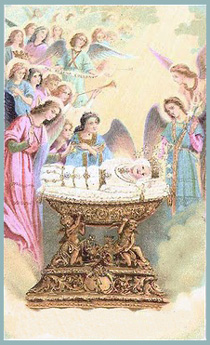 Nativity of Blessed Virgin Mary Novena of the Nativity of the Blessed Virgin Mary: Aug. 31st - Sept. 8th Feast of the Nativity of the Blessed Virgin: Epistle and Gospel Children's Sermon Nativity of Blessed Virgin Mary Reflection on the Nativity of the Blessed Virgin Mary by Bishop Challoner Mary's Dignities in Her Birth September Meditations on the "The Great Truths" The Little Office of the Blessed Virgin Mary, from Candlemas until Advent The Life of the Blessed Virgin Mary as Set Forth in Her Titles from the Litany of Loreto The Life of the Blessed Virgin Mary, St. Joseph, St. Joachim and St. Anne, 1859 The Book of the Holy Rosary, as explained by the Church Fathers and prefigured in the Old Testament True Devotion to the Blessed Virgin Mary by St. Louis Marie de Monfort The Excellence of the Rosary, Rev. M. J. Frings, 1912 How to Say the Rosary Glorious Mysteries Joyful Mysteries Sorrowful Mysteries Nativity of the Blessed Virgin Mary We beseech Thee, O Lord, to bestow on Thy servants the gift of heavenly grace, that for those to whom the blessed Virgin's maternity was the beginning of salvation, the votive solemnity of her nativity may obtain an increase of peace. Through our Lord Jesus Christ, Thy Son, Who liveth and reigneth with Thee in the unity of the Holy Ghost, one God, world without end. R. Amen Ant. While the King was at his repose, my spikenard sent forth an odor of sweetness. Ant. His left hand is under my head, and his right hand shall embrace me. Invitatory: Let us celebrate the birthday of the Virgin Mary: Let us adore the Lord Christ her Son. (Roman Breviary) The birth of the Blessed Virgin Mary announced joy and the near approach of salvation to the lost world. Mary was brought forth in the world not like other children of Adam, infected with the loathsome contagion of sin, but pure, holy, beautiful, and glorious, adorned with all the most precious graces which became her who was chosen to be the Mother of God. She appeared indeed in the weak state of our mortality; but in the eyes of Heaven she already transcended the highest seraph in purity, brightness, and the richest ornaments of grace. If we celebrate the birthdays of the great ones of this earth, how ought we to rejoice in that of the Virgin Mary, presenting to God the best homage of our praises and thanksgiving for the great mercies He has shown in her, and imploring her mediation with her Son in our behalf! Christ will not reject the supplications of His mother, whom He was pleased to obey whilst on earth. Her love, care, and tenderness for Him, the title and qualities which she bears, the charity and graces with which she is adorned, and the crown of glory with which she is honored, must incline Him readily to receive her recommendations and petitions. |
September 9th, St. Peter Claver, Confessor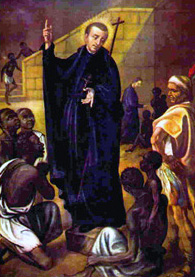 St. Peter Claver The Sacrament of Baptism The Spiritual Works of Mercy The Enthronement of the Sacred Heart of Jesus Act of Reparation to the Sacred Heart of Jesus Consecration of Children to the Sacred Heart of Jesus Litany of Faith and the Necessity of the Catholic Faith for Salvation St. Peter Claver, Confessor O God, Who, when about to call the enslaved Negroes unto the knowledge of Thy name, didst strengthen blessed Peter with a wondrous charity and patience for their help: grant, through his intercession, that we, seeking the things of Christ Jesus, may love our neighbors in deed and in truth. Through our Lord Jesus Christ, Thy Son, Who liveth and reigneth with Thee in the unity of the Holy Ghost, one God, world without end. R. Amen V. The just shall flourish like the palm-tree. R. He shall grow like the cedar of Libanus. Ant. He who hates his life in this world, keeps it unto life eternal. (Roman Breviary) Peter Claver was a Spanish Jesuit. In Majorca he fell in with the holy lay-brother Alphonsus Rodriguez, who, having already learned by revelation the saintly career of Peter, became his spiritual guide, foretold to him the labors he would undergo in the Indies, and the throne he would gain in heaven. Ordained priest in New Granada, Peter was sent to Cartagena, the great slave-mart of the West Indies, and there he consecrated himself by vow to the salvation of those ignorant and miserable creatures. For more than forty years he labored in this work. He called himself "the slave of the slaves." He was their apostle, father, physician, and friend. He fed them, nursed them with the utmost tenderness in their loathsome diseases, often applying his own lips to their hideous sores. His cloak, which was the constant covering of the naked, though soiled with their filthy ulcers, sent forth a miraculous perfume. His rest after his great labors was in nights of penance and prayer. However tired he might be, when news arrived of a fresh slave-ship, Saint Peter immediately revived, his eyes brightened, and he was at once on board amongst his dear slaves, bringing them comfort for body and soul. A false charge of reiterating Baptism for a while stopped his work. He submitted without a murmur till the calumny was refuted, and then God so blessed his toil that 40,000 negroes were baptized before he went to his reward, in 1654. Reflection--When you see any one standing in need of your assistance, either for body or soul, do not ask yourself why some one else did not help him, but think to yourself that you have found a treasure. September 9th, St. Gorgonius, Martyr May the holy Gorgonius, O Lord, gladden us by his intercession, and may he fill us with joy on this his holy festival. Through our Lord Jesus Christ, Thy Son, Who liveth and reigneth with Thee in the unity of the Holy Ghost, one God, world without end. R. Amen (Roman Breviary) |
September 10th, St. Nicholas of Tolentino, Confessor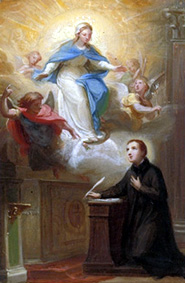
St. Nicholas of Tolentino On Vainglory and Prescriptions Against It The Business of Life and Vanity of Earthly Things On the Vanity of the World Part 14: Does Satan Exist? St. Michael/ Exorcism Index of Prayers and Devotions for the Dying Contrition: Explanation of Perfect Contrition and the Necessity of Contrition for Forgiveness of Sins St. Nicholas of Tolentino, Confessor Give ear, O Lord, to our humble prayers, which the festival of blessed Nicholas Thy Confessor: and may we, who trust not in our own righteousness, be helped by the prayers of him who was well-pleasing to Thee. Through our Lord Jesus Christ, Thy Son, Who liveth and reigneth with Thee in the unity of the Holy Ghost, one God, world without end. R. Amen V. The Lord loved him, and adorned him. R. He clothed him with a robe of glory. Ant. I will liken him to a wise man that built his house upon a rock. (Roman Breviary) This Patron of the Universal Church was born in 1245, in answer to the prayer of a holy mother, and was vowed before his birth to the service of God. His parents had made a pilgrimage across Italy to visit the shrine of Saint Nicholas of Myre and ask his intercession to obtain a child; the infant granted them was given the same name in his honor. Saint Nicholas of Tolentino never lost his baptismal innocence. His austerities as a very young religious were conspicuous even in the austere Order to which he belonged, the Hermits of Saint Augustine. To the remonstrances of his superiors he only replied, "How can I be said to fast, while every morning at the altar I receive my God?" The demons undertook a war against his spirit of prayer, going so far as to beat him and leave him inert on the floor, but they could not separate his soul from his Lord. He did, however, remain lame for life. He conceived an ardent charity for the holy souls of purgatory, so near and yet so far from their Saviour. Often, after his Mass, it was revealed to him that the souls for whom he had offered the Holy Sacrifice had been admitted to the presence of God. Saint Nicholas frequently went out of his monastery to beg for aid to the poor. He visited prisoners and the dying to administer the Last Sacraments. And this great Saint resurrected over one hundred children, on one occasion bringing back to life several who had been under water for several days. During an illness, he was ordered to eat meat by a physician, which he had made a vow never to do. A plate containing well-prepared fowl was brought to him. In the presence of several witnesses, he made the sign of the cross over it, and the bird flew away out the window. During the year preceding his death, a star always appeared over the altar where he said his Mass; afterwards it would conduct him to his cell, or lead him back again, later, to the altar. Amid his loving labors for God and man, he was haunted by thoughts of his own unworthiness. "The heavens," said he, "are not pure in the sight of Him whom I serve; how then shall I, a sinful man, stand before Him?" One day, as he pondered on the greatness of God and his own nothingness, Mary, Queen of all Saints, appeared before him. "Fear not, Nicholas," She said, "all is well with you: My Son bears you in His Heart, and I am your protection." Then his soul was at rest. At the hour of his death, which occurred on September 10, 1310, he heard, it is said, the songs which the Angels sing in the presence of their Lord. He died and was buried in the chapel where he was accustomed to offer Holy Mass and say his prayers. He was canonized in 1446 by Pope Eugene IV. Three hundred and one miracles were recognized during the process. His tomb has become renowned by many more, despite the fact that his relics have been lost, save for two arms from which blood still exudes when the Church is menaced by a great danger. This occurred, for example, when the island of Cyprus was taken over by infidels in 1570. The religious of Saint Augustine continue to maintain the service of the large basilica of Saint Nicholas in Tolentino. Saint Nicholas of Tolentino, like Saint Joseph, virginal father of Jesus, has been declared a Patron of the Universal Church. |
September 11th, Sts. Protus and Hyacinth, Martyrs
Moral Courage Sts. Protus & Hyacinth May the precious manifestation of Thy blessed Martyrs, Protus and Hyacinth assist us, O Lord: and let their loving intercession continually defend us. Through our Lord Jesus Christ, Thy Son, Who liveth and reigneth with Thee in the unity of the Holy Ghost, one God, world without end. R. Amen Ant. For theirs is the kingdom of heaven, who have despised the life of the world, and have attained to the rewards of the kingdom, and have washed their robes in the blood of the Lamb. V. Be glad in the Lord, and rejoice, ye just. R. And glory all ye upright of hear. (Roman Breviary) Protus and Hyacinth were brothers. They were eunuchs in the service of a holy woman named Eugenia, baptized with her by Bishop Helenus. Upon this they devoted themselves to the study of sacred literature. They lived in exceeding humility and holiness in Egypt among the ascetics. Later they accompanied the holy virgin Eugenia to Rome. There, in the reign of Gallienus, they were arrested because they professed the Christian faith. When they could not be induced in any way to give up Christianity and worship the false gods, they were terribly scourged and then beheaded. They were martyred on the eleventh of September. A Prayer to the Holy Martyrs to Obtain Their Protection O ye blessed Martyrs of the heavenly kingdom! ye who sacrificed to the Almighty God the honors, the riches, and possessions of this life, and have received in return the unfading glory and never-ending joys of heaven! ye who are secure in the everlasting possession of the brilliant crown of glory which your sufferings have obtained! Look with compassionate regards upon our wretched state in this valley of tears, where we groan in the uncertainty of what may be our eternal destiny. And form that divine Savior, for Whom you suffered so many torments, and Who now repays you with so unspeakable glory, obtain for us that we may love Him with all our heart, and receive in return the grace of perfect resignation under the trials of this life, fortitude under the temptations of the enemy, and perseverance to the end. May your powerful intercession obtain for us that we may one day in your blessed company sing the praises of the Eternal, and even as you now do, face to face, enjoy the beatitude of His vision! Amen |
September 12th, The Holy Name of Mary

The Holy Name of Mary The Sweetness of the Name of Mary Children's Sermon: The Holy Name of Mary Mary's Dignities in Her Name Veneration of the Holy Name of Mary Novena in Honor of the Holy Name of Mary Mary I: Sept. 4th - Sept. 12th Novena of the Holy Name of Mary II. and Psalms of the Blessed Virgin Mary Ave Maris Stella The Little Office of the Blessed Virgin Mary, from Candlemas until Advent The Life of the Blessed Virgin Mary, St. Joseph, St. Joachim and St. Anne, 1859 Litany of the Life of the Blessed Virgin Ave Maria St. Gabriel Joyful Mysteries Sorrowful Mysteries Glorious Mysteries The Pure Heart of Mary The Humility of the Blessed Virgin of Mary 30 Days Prayer to the Blessed Virgin Mary Nativity of Blessed Virgin Mary Index of Prayers for the Holy Souls in Purgatory The Holy Name of Mary Grant, we beseech Thee, almighty God: that Thy faithful people, Who rejoice in the Name and in the protection of the most holy Virgin Mary, may, by her loving intercession, be delivered from all evils here on earth and be found worthy to attain to everlasting joys in heaven. Through our Lord Jesus Christ, Thy Son, Who liveth and reigneth with Thee in the unity of the Holy Ghost, one God, world without end. Amen (Roman Breviary) This feast was established by Pope Innocent XI in 1683, that the faithful may in a particular manner recommend to God on this day, through the intercession of the Blessed Virgin, the necessities of His Church, and return Him thanks for His gracious protection and numberless mercies. What gave occasion to the institution of this feast was the desire of all Christendom for a solemn thanksgiving which would commemorate the deliverance of Vienna, obtained through the intercession of Our Lady, when the city was besieged by the Turks in 1683. An army of 550,000 invaders had reached the city walls and was threatening all of Europe. John Sobieski, King of Poland, came with a much smaller army to assist the besieged city during the octave of the Nativity of the Blessed Virgin, and made ready for a great battle. This religious prince began by having a Mass celebrated, which he himself desired to serve, his arms in a cross. After receiving Communion with fervor, he rose at the close of the sacrifice and cried out: "Let us march with confidence under the protection of Heaven and with the aid of the Most Holy Virgin!" His hope was not disappointed; the Turks were struck with a sudden panic and fled in disorder. From that time the feast day has been celebrated during the octave of the Nativity of Our Lady. |
September 13th, St. Maurilius of Angers--from the Early Church Calendar. Mass of the Preceding Sunday

St. Maurilius of Angers Contrition Two Short Sermons: On Turning from Sin to God The Sentiments of a Penitent Sinner Petition to the Blessed Virgin Almighty and Eternal God, Who provides for sinners a Refuge and Help in the Blessed Mary ever Virgin, vouchsafe, that through her intercession we may be freed from every sin, and may obtain the blessed fruits of Your Mercy. Through Christ our Lord. Amen Act of Consecration to Our Blessed Lady Recite the Hail Mary and then add: My Queen! My Mother! I give you all myself, and, to show my devotion to you, I consecrate to you my eyes, my ears, my mouth, my heart, my entire self. Amen |
September 14th, Exaltation of the Holy Cross Exaltation of the Holy Cross The Exaltation of the Holy Cross, by Bishop Challoner and Instructions for the Feast of the Exaltation of the Holy Cross Lenten Reflection on Via Crucis Stations of the Cross The Short Method of the Stations of the Cross Our Lord is Condemned to the Cross; Jesus Carries His Cross Jesus: the Willing Victim Other related links: Finding of the Holy Cross St. Leonard of Port Maurice and the Stations of the Cross The Holy Ways of the Cross by Henri Boudon, 1875 St. Helena, Empress and St. Agapitus, Martyr Exaltation of the Holy Cross Grant we beseech Thee, almighty God: that Thy faithful people, Who rejoice in the Name and in the protection of the most holy Virgin Mary, may, by her powerful intercession, be delivered from all evils here on earth, and be found worthy to attain to everlasting joys in heaven. Through our Lord Jesus Christ, Thy Son, Who liveth and reigneth with Thee in the unity of the Holy Ghost, one God, world without end. Amen Ant. O great work of love: death then died, when Life died on the tree. Save us, O Savior Christ, by the power of the Cross: Thou who didst save Peter in the sea, have mercy on us. Behold the Cross of the Lord, flee, O ye his enemies, for the lion of the tribe of Juda, the root of David, hath conquered, alleluia. But us it behoveth to glory in the Cross of our Lord Jesus Christ. By the sign of the Cross, deliver us from our enemies, O our God. (Roman Breviary) In the year 627, during the reign of the emperor Heraclius I of Constantinople, the Persians conquered the city of Jerusalem and removed from its venerable Sanctuary the major part of the true Cross of Our Lord, which Saint Helen, mother of the emperor Constantine, had left there after discovering it on Calvary. The emperor resolved to win back by combat this precious object, the new Ark of the Covenant for the new people of God. Before he left Constantinople with his army, Heraclius went to the church wearing black in the spirit of penance; he prostrated himself before the altar and begged God to sustain his courage. And on leaving he took with him a miraculous image of the Saviour, determined to combat with it even unto death. Heaven visibly assisted the valiant emperor, for his army won victory after victory. One of the conditions of the peace treaty was the return of the Cross of Our Lord, in the same condition as when it was removed. Heraclius on his return was received in Constantinople by the acclamations of the people; with olive branches and torches, they went out to meet him. And the true Cross was honored, on this occasion, in a magnificent triumph. The emperor wished to give thanks to God by going in person to Jerusalem to return this sacred wood, which had been in the power of the pagans for fourteen years. When he reached the Holy City, he placed the precious relic on his shoulders, but when he came to the gate leading out to Calvary, it became impossible for him to go forward. He was greatly astonished, and those in attendance were stupefied. "Take care, O Emperor!" said the Patriarch Zachary to him. "Certainly the imperial clothing you are wearing does not sufficiently resemble the poor and humiliated condition of Jesus carrying His cross." Heraclius was touched on hearing this; he removed his shoes and his imperial robes, adorned with gold and jewels. Wearing a poor man's tunic, he was able to go up to Calvary and depose there his glorious burden. To give greater brilliance to this triumphant march, God permitted several miracles to occur by the power of the Cross of Christ. A dead man returned to life, four paralytics were cured; ten lepers recovered their health and fifteen blind persons their sight; many possessed persons were delivered from the evil spirit, and a large number of sick persons were completely cured. In those days the greatest power of the Catholic world was the Empire of the East, and that bulwark against the eastern pagans was verging toward its ruin, before God put forth His hand to save it in this way. The re-establishment of the Cross at Jerusalem, by means of the emperor's Christian valor, was a sure pledge of its protection. It was after these events that the feast of the Exaltation of the Holy Cross was instituted, to perpetuate their memory in the Church. |
September 15th, The Seven Sorrows of the Blessed Virgin Mary. The Sorrowful Mother has always merited within the Church a particular devotion from whence she is called "Queen of Martyrs" and "Consoler of the Afflicted." This Feast was extended throughout the whole world by Pius VIII. 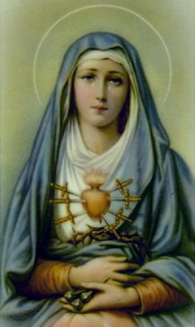 Novena in Honor of the Seven Sorrows of Mary: Sept. 7th - Sept. 15th Seven Sorrows of the Blessed Virgin Mary I. Seven Sorrows of the Blessed Virgin Mary II. Feast of the Seven Sorrows of the Blessed Virgin Mary Our Lady of Sorrows Manual of Devotions in Honour of Our Lady of Sorrows Sorrowful Mysteries Stations of the Cross The Short Method of the Stations of the Cross Clock of the Passion On the part the blessed Virgin bore in her Son's sufferings The Seven Sorrows of the Blessed Virgin Mary O God, at whose passion, as foretold by Simeon, a sword of sorrow pierced the most sweet soul of glorious Mary, Virgin and Mother: grant, in Thy mercy, that we who honor the memory of her sorrows may gain the happy fruit of Thy passion: Who liveth and reigneth with Thee in the unity of the Holy Ghost, one God, world without end. Amen. Invitatory: Let us stand beside the cross with Mary, the Mother of Jesus, Whose soul the sword of sorrow hath pierced. V. O Virgin Mary, by thy many sorrows' might. R. Make us rejoice in heaven's kingdom. Ant. Come, let us go up to the mountain of the Lord; and see if there be any sorrow like unto my sorrow. (Roman Breviary) The Church twice commemorates the sorrows of its heavenly Mother. The Friday of Passion week, since the 15th century, has also been dedicated by the universal Church to Her Compassion. Why is this so? To understand this double liturgy, we must know that Mary is also the Mother of the Mystical Body. The present feast was instituted by Pius VII after his return from his captivity and exile, which lasted from 1809 to 1814. Christ no longer suffers, and for Our Lady also, all suffering as we understand it has ceased. Nonetheless, the prophet Jeremias in his Lamentations, asks: "To whom shall You be compared, O Virgin? Your affliction is like the ocean." Mary's great sorrows began at the prediction of Simeon that a sword would transpierce Her heart. Soon afterwards, She was obliged to flee with the newborn Infant, already object of a fatal search. She lost Him in the temple for three inexpressibly painful days; She met Him on the road to Calvary, and the sight indeed pierced Her heart. She saw Him die, heard His final cry, and witnessed the opening of His side with the effusion of His last drops of blood, mingled with water; She received in Her arms the inert body of the most beautiful of the sons of men. Finally, She was obliged to depose Him in a tomb, leave Him there and return with Her adopted son, John, to a deicidal Jerusalem. The Queen of Martyrs has never ceased to encourage Her children on earth to bear their own crosses, which complement the Passion of Christ. He suffered first the ordinary contradictions of life; for three years He was taunted and regarded as a menace by those who should have recognized Him and His mission. He knew hunger, cold and fatigue; He slept so heavily in a boat amid a tempest, that we can only suppose He was exhausted. He knew what it was to be abandoned in need and to lose, to the empire of various passions, followers He had called His. Christ is our forerunner in all human sorrows and difficulties. Mary, as His Mother, offered to God with Him all the afflictions of His earthly life, and She continues to offer those of the Church, for its sanctification, for the souls in Purgatory and the salvation of souls. |
September 16th, Sts. Cornelius and Cyprian, Martyrs and St. Euphemia, Virgin & Companions, Martyrs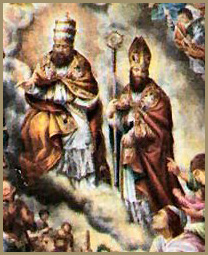 Sts. Cornelius and Cyprian The Sacrament of Baptism No Salvation Outside the Catholic Church The Enthronement of the Sacred Heart of Jesus Act of Reparation to the Sacred Heart of Jesus Consecration of Children to the Sacred Heart of Jesus Litany of Faith and the Necessity of the Catholic Faith for Salvation Sts. Cornelius and Cyprian, Martyrs We beseech Thee, O Lord, that the festive commemoration of blessed Cornelius and Cyprian, Thy martyrs and bishops, may assist us: and may their venerable prayers obtain for us Thy gracious favor. Through our Lord Jesus Christ, Thy Son, Who liveth and reigneth with Thee in the unity of the Holy Ghost, one God, world without end. Amen (Roman Breviary) St. Cornelius Cornelius, a Roman by birth, was sovereign pontiff during the reign of the emperors Gallus and Volusianus. Aided by a most holy woman named Lucina he transferred the bodies of the Apostles near the place of the catacombs to a more suitable resting place. Lucina buried Saint Paul's body on her estate on the Ostian Way close to the spot where he had been beheaded. Cornelius laid the body of the prince of the Apostles near the place of his crucifixion. When this fact became known to the emperors, together with the information that through the influence of Cornelius many persons had become Christians, he exiled the pontiff to Civita Vecchia. The saintly Cyprian, bishop of Carthage wrote to him there to console him. But when this office of Christian charity had been rendered by the one holy man to the other several times, the emperors, taking it in bad part summoned Cornelius to Rome, where, as if guilty of treason, he was beaten with leaded whips, and then dragged before an image of Mars, and commanded to sacrifice to it. When he showed his detestation of such an impiety, he was beheaded on the eighteenth of the Calends of October (September 14). The blessed Lucina, aided by some clerics buried his body in a sandpit on her estate, near to the cemetery of Callisus. His pontificate lasted about two years. St. Cyprian Saint Cyprian was an African of noble birth, the son of a Roman senator; he was a teacher of rhetoric in his youth, but still pagan and frivolous. In his vigorous mid-life he was converted to Christianity through the influence of a priest who was himself a convert to Christianity and was edifying all Carthage by his conversation and his virtues. A long combat followed for Cyprian, who although convinced of the truth of these excellent reasonings and the beauty of this doctrine, still had to overcome the pride of a philosopher and the worldly bent of his life of pleasure. Nonetheless, grace won out and he listened to the interior voice of conscience which constantly pressed him onward: "Courage, Cyprian! Whatever the cost, let us go to God." He sold his estates and gave the price to the poor; and it was not long after his baptism that he was ordained a priest, and then consecrated Bishop of Carthage notwithstanding his resistance. The Christian population rejoiced, sure that in him they would have a strong bulwark during persecution. When the persecution of Decius broke out, he was the object of a search by the pagans wanting to disorganize the flock. He left his episcopal city and found a secure retreat, in order to continue to minister to their spiritual needs by letters and the administration of the sacraments. He went on seeing to the burial of the martyrs and the needs of those deprived of their possessions. When a pestilence broke out, he aided in the ministry to the dying. He consulted other ecclesiastical authorities as to whether he should return from his retreat; he was told to remain where he was. He maintained existing religious discipline which required penance of those who, under stress, apostatized by paying money to certain magistrates; these would write certificates saying that they had obeyed the Roman edicts. The prevaricators afterwards strove to escape the penalties and return into communion with the faithful. Saint Cyprian met much opposition by his firmness, but was sustained by Rome. After a few years of peace under the emperor Valerian, he was finally banished and retired to a place about fifty miles from Carthage. There he learned by supernatural revelation that his future martyrdom was to occur the following year. He was discovered in a place near Carthage one day, and the sentence of death by decapitation was pronounced against him. He received it with the words, "Thanks be to God." His great desire was to die while preaching the faith of Christ, and he had the consolation of being surrounded at his martyrdom by crowds of his faithful children; there he paid the trembling executioner to encourage him in his task, and, preaching very effectively both by his words and his actions, was beheaded on the 14th of September, 258. In the brief ten years of his ministry, the Church was enriched through the fidelity of the martyrs he sustained, and by the many baptisms of pagans won over to his Christian flock. A considerable number of the spectators who were still pagan wept at his martyrdom. The holy bishop was buried publicly, with great solemnity. |
September 17th, The Stigmata of St. Francis. 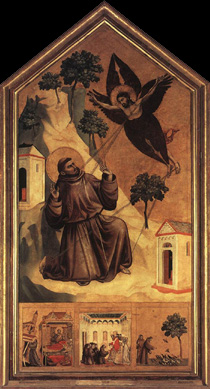 Stigmata of St. Francis Novena in Honor of the Stigmata of St. Francis: Sept. 9th - Sept. 17th St. Francis of Assisi, Confessor Works of the Seraphic Father St. Francis of Assisi St. Francis of Assisi and his Confrontations with devils The Little Flowers of St. Francis--The Stigmata of St. Francis begins page 172. On Resignation to the Will of God in All of Our Sufferings. On Self Denial and Mortification of the Interior On the Angelic Virtue and The Will of God, Our Sanctification The Stigmata of St. Francis O Lord Jesus Christ, Who when the world was growing cold, didst renew upon the body of blessed Francis the sacred marks of Thy passion to kindle in our hearts the fire of Thy love: grant, in Thy mercy, that with the help of his merits and prayers, we may ever carry our cross and bring forth worthy fruits of penance. Who liveth and reigneth with Thee in the unity of the Holy Ghost, one God, world without end. Amen. V. Thou hast signed, O Lord, Thy servant Francis. R. With the signs of our redemption. Ant. I will liken him to a wise man that built his house upon a rock. (Roman Breviary) Two years before the truly faithful servant and minister of Christ, Francis, gave back his soul to heaven, he retired to a high mountain called Mount Alvernia. There he began a forty-day fast in honor of the Archangel Michael. The sweetness of heavenly contemplation was poured out upon him more abundantly than usual, until, burning with a most ardent flame of celestial desires, he began to feel that the gifts of heaven were flooding upon him in a fullness he had never experienced before. The burning of his desire raised his heart towards God like the heart of a seraph, His tender love yearned to be transformed into the likeness of him who out of his great love was pleased to be crucified. One morning about the time of the feast of the Exaltation of the Holy Cross, as Francis was praying on the mountainside, he saw what appeared to be a seraph with six shining and fiery wings coming down from the heights of heaven. It flew very swiftly through the air and approached the man of God. Francis then saw that the spirit was not only winged but crucified, also. The hands and feet were stretched out and fastened to a cross, while the wings were arranged in a wondrous manner. Two were raised above the head, two were outstretched in flight, the remaining two were crossed over and veiled the whole body. As he gazed Francis was much amazed. His soul was filled with mingled joy and sorrow. The seraph's gracious aspect; revealed to him in such a wonderful and intimate way, filled Francis with exceedingly great rejoicing, while the sight of that cruel crucifixion pierced his heart with a sword of sorrowful compassion. The seraph, who appeared to Francis outwardly, taught him inwardly that although suffering and a weakness are not compatible with the immortal life of a seraph, this vision had been shown to Francis, as to a friend of Christ, that he might learn how to transform his whole being into a living image of Christ crucified. This he could not do by martyrdom of the flesh, but by the burning ardor of his soul. After a mysterious and intimate colloquy the vision disappeared, leaving Francis' mind burning with seraphic fire and his flesh impressed with the exact image of the crucified. It was as though the very flesh had melted in the heat of that seraphic flame and while it was so softened had taken the exact impression of that seal. For immediately the marks of the nails began to appear in Francis' hands and feet, those of the heads of the nails in the palms of the hands and in the upper part of his feet. Their points were visible on the other side. There was also a bright red scar on his right side, as if the side had been wounded with a lance. From this blood often flowed staining his tunic and breeches. Thereafter Francis was a new man. He was marked out by this new and amazing miracle, by this singular privilege which in all the past twelve centuries had not been granted to any man. That is to say, he had been adorned with the sacred stigmata. He came down from the mountain bearing with him the image of the Crucified, not carved on tablets of wood or stone by the hand of a mortal artist, but etched upon his flesh by the finger of the living God. Since the seraphic man knew that it is good to keep the secret of a king, and fully conscious of the royal secret he carried, he concealed the holy marks from men. But it lies within the province of God to reveal for his greater glory the things that He has done. God himself who impressed the marks in secret, worked publicly several miracles by means of them, so that the hidden and marvelous power of the stigmata might be proclaimed by these miracles. Benedict XI, sovereign pontiff, desired that this wonderful event, so well authenticated and so widely honored in papal letters with the highest praises and favors, should be celebrated by an annual feast. Afterwards Pope Paul V. wishing to enkindle in the hearts of all the faithful the fire of love for Christ crucified, extended the feast to the universal Church. |
September 18th, St. Joseph Cupertino, Confessor.
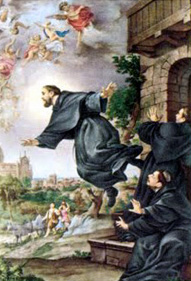
St. Joseph of Cupertino St. Joseph Copertino, Catholic Book The Corporal Works of Mercy The Gift of Miracles Spiritual Communion On Resignation to the Will of God in All of Our Sufferings. On Self Denial and Mortification of the Interior On the Angelic Virtue and The Will of God, Our Sanctification O God, Thou didst ordain that Thy only-begotten Son by being lifted up above the earth should draw all things to himself: in Thy mercy bring it to pass that through the merits and example of Thy seraphic Confessor Joseph, we may be lifted above all earthly lusts and found worthy to come to him. Who liveth and reigneth with Thee in the unity of the Holy Ghost, one God, world without end. Amen. V. The Lord loved him, and adorned him. R. He clothed him with a robe of glory. Ant. I am dead, and my life is hidden with Christ in God. (Roman Breviary) St. Joseph Cupertino, Confessor Joseph Desa was born in the little city of Cupertino, near the Gulf of Tarento, in 1600. It is said in the acts of the process of his canonization that at the age of five he already showed such signs of sanctity that if he had been an adult, he would have been venerated as a perfect man. Already in his youth he was ravished in ecstasies which literally tore him away from the earth; it has been calculated that perhaps half of his life for some sixty years was spent literally above the ground. But much remains to be said of Saint Joseph, apart from his visible divine favors. He almost died at the age of seven from an interior abscess, which only his prayer to Our Lady cured. He learned to be a shoemaker to earn his living, but was often absent in spirit from his work. He treated his flesh with singular rigor. The Cardinal de Lauria, who knew him well for long years, said he wore a very rude hair shirt and never ate meat, contenting himself with fruits and bread. He seasoned his soup, if he accepted any, with a dry and very bitter powder of wormwood. At the age of seventeen he desired to become a conventual Franciscan, but was refused because he had not studied. He entered the Capuchins as a lay brother, but the divine favors he received seemed everywhere to bring down contempt upon him. He was in continuous contemplation and dropped plates and cauldrons. He would often stop and kneel down, and his long halts in places of discomfort brought on a tumor of the knee which was very painful. It was decided that he lacked both aptitude and health, and he was sent home. He was then regarded everywhere as a vagabond and a fool, and his mother in particular was harsh, as had been her custom for long years. She did, however, obtain permission for him to take charge of the stable for the conventual Franciscans, wearing the habit of the Third Order. Saint Joseph proved himself many times to be perfectly obedient. His humility was heroic, and his mortification most exceptional. His words bore fruit and wakened the indifferent, warned against vice and in general were seen to come from a man who was very kind and very virtuous. He was finally granted the habit. He read with difficulty and wrote with still more difficulty, but the Mother of God was watching over him. When by the intervention of the bishop he had been admitted to minor Orders, he desired to be a priest but knew well only one text of the Gospel. By a special Providence of God, that was the text he was asked to expound during the canonical examination for the diaconate. The bishop who was in charge of hearing candidates for the priesthood found that the first ones answered exceptionally well, and he decided to ordain them all without any further hearings, thus passing Joseph with the others. He was ordained in 1628. He retired to a hermitage where he was apparently in nearly continuous ecstasy, or at least contemplation. He kept nothing for himself save the tunic he wore. Rejoicing to be totally poor, he felt entirely free also. He obeyed his Superiors and went wherever he was sent, wearing sandals and an old tunic which often came back with pieces missing; the people had begun to venerate him as a Saint, and had cut them off. When he did not notice what was happening, he was reproached as failing in poverty. The humble Brother wanted to pass for a sinner; he asked for the lowest employments, and transported the building materials for a church on his shoulders. He begged for the community. At the church he was a priest; elsewhere, a poor Brother. Toward the end of his life all divine consolations were denied the Saint, including his ecstasies. He fell victim to an aridity which was unceasing, and he could find no savor in any holy reading. Then the infernal spirits inspired terrible visions and dreams. He shed tears amid this darkness and prayed his Saviour to help him, but received no answer. When the General of the Order heard of this, he called him to Rome, and there he recovered from the fearful trial, and all his joy returned. He still had combats with the enemy of God to bear just the same, when the demons took human form to attempt to injure him physically. Other afflictions were not spared him, but his soul overcame all barriers between himself and God. He died on September 18, 1663, at the age of 63, in the Franciscan convent of Osino. He had celebrated Holy Mass up to and including the day before his death, as he had foretold he would do. |
September 19th, St. Januarius and Companions, Bishop, Martyrs. 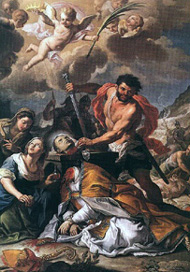 St. Januarius & St. Cyprian The Bad Death The Sinner Seeks God God Will Punish You! False Confidence of Salvation The False Peace of a Sinful Conscience, by Fr. Hunolt, 1691-1746 September Meditations on the "The Great Truths" 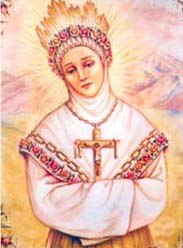 September 19th is the anniversary of the Apparition of Our Lady of La Salette Our Lady of La Salette Novena in Honor of Our Lady of La Salette: Sept. 11th - Sept. 19th Booklet: Our Lady of La Salette: Consecration to Our Lady of La Salette, The Causes of Mary's Tears at La Salette, Resolution to be Taken to Console Our Lady of La Salette St. Januarius and Companions, Bishop, Martyrs O God, Who dost gladden us by the yearly festival of Thy holy Martyrs, Januarius and his companions: grant in Thy mercy, that we who rejoice in their merits may be inspired by the examples of their lives. Through our Lord Jesus Christ, Thy Son, Who liveth and reigneth with Thee in the unity of the Holy Ghost, one God, world without end. Amen. V. Be glad in the Lord, and rejoice, ye just. R. And glory, all ye upright of heart. Ant. For theirs is the kingdom of heaven, who have despised the life the world, and have attained to the rewards of the kingdom, and have washed their robes in the blood of the Lamb. (Roman Breviary) Many centuries ago, Saint Januarius died for the Faith during the persecution of Diocletian. God, through the blood which His servant shed for Him, some of which is conserved in Naples, continues to strengthen the faith of the Church, and to work there a regular miracle by its means. This beloved Saint of the late third century was the bishop of Beneventum, and had a friend, a deacon named Sosius, who like himself was occupied with fortifying the Christians faced with martyrdom. When the prefect of Pouzzoles, where Sosius had been imprisoned, heard that Januarius was coming to visit him and three other fervent Christians being held there, he had him arrested. He urged him to cease his exhortations, forbidden by the imperial edicts, and to offer incense to the idols, if he wanted to avoid torture. The holy bishop replied that he could not do so. He was submitted to torments, the first one of which left him miraculously uninjured. The judge attributed the miracle to magic, as was often said of the Christians whom God chose to spare. He ordered another torture which left the bishop lame, before he was sent to the same prison as the others. When two ecclesiastics of Benevent came to visit the confessors, they were arrested and condemned to die with the other five in an amphitheater, by the teeth of wild beasts. The animals, furious when released into the space where the seven Confessors stood, came and quietly lay down at their feet, renewing a miracle seen more than once in the history of the first centuries. By this prodigy and other miracles which preceded their execution, five thousand persons were converted. The bishop and his companions were decapitated on September 19, 305. A church was built on a nearby mountain to honor the memory of Saint Januarius. Little did the heathen governor think, when he condemned them, that he would be the instrument in God's hand for ushering in a long succession of miracles which commemorate the faith and attest the sanctity of Januarius. His relics repose in the cathedral of Naples, and it is there that the liquefaction of his blood occurs. The blood is congealed in two glass vials, but when it is brought near the martyr's head, it melts and flows like the blood of a living man. This ordinarily occurs on his feast day celebrated on September 17th in Naples, and on anniversaries of miracles attributed to him, which have preserved the city from eruptions of Mount Vesuvius or the plague. Some have tried to explain this miracle by natural causes, but none have ever contested the reality of the facts. |
September 20th, St. Eustace (Holy Helper) and Companions, Martyrs and Vigil of St. Matthew
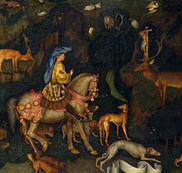
Novena to St. Eustace, Holy Helper and Patron of Families: Sept. 12th - Sept. 20th The Fourteen Holy Helpers The Christian Father Instructions for the Catholic Family The Christian Family Showing Forth Our Faith A Catholic's Moral Guide to Sacramental Marriage and Family Life, Includes a Glossary of Faith and Morals for the Married and Unmarried St. Eustace (Holy Helper) and Companions, Martyrs. Vigil of St. Matthew, Apostle O God, by whose grace we keep the festival of thy holy Martyrs Eustace and his companions: grant that we may enjoy their fellowship in everlasting bliss. Through our Lord Jesus Christ, Thy Son, Who liveth and reigneth with Thee in the unity of the Holy Ghost, one God, world without end. Amen. Grant, we beseech thee, O Almighty God: that we who on this day prepare to celebrate the feast of thy holy Apostle and Evangelist, Saint Matthew, may by the devout observance of the same increase in godliness to the attainment of everlasting salvation. Through our Lord Jesus Christ, Thy Son, Who liveth and reigneth with Thee in the unity of the Holy Ghost, one God, world without end. Amen. (Roman Breviary) The remarkable story of Saint Eustachius, named Placidus before his conversion, is a lesson given by God Himself on the marvels of His Divine Providence. He was a distinguished and very wealthy officer of the Roman army under the Emperor Trajan, in the beginning of the second century. He practiced generous charity to the poor, although he had not yet perceived the errors of idolatry. One day, while this distinguished officer was vainly pursuing a deer, the animal suddenly stood immobile before him in the light of a hilltop, and he perceived between its horns a luminous cross. On the cross was the image of the crucified Saviour, and a voice said to him, "I am the Christ whom you honor without knowing it; the alms you give to the poor have reached Me." Like Saint Paul, he fell from his horse and remained inert for a time. Coming to himself, he said interiorly, "What is this voice I have heard? You who speak to me, who are you, that I may believe in you?" And the Lord told him interiorly that He was the Creator of the light, of the seasons, of man and all things visible, that he had suffered to save the human race, died and been buried, but had risen the third day. This was sufficient, and the officer went home to fulfill the prescription he had received to be baptized with his wife and two young sons. His spouse had received a similar revelation at the same time as himself, and they all went to the Christian authority of the region in secret, to be baptized the same night. In a short time he lost all his possessions through natural catastrophes and robbers. But he had been advised beforehand that the Lord wanted to make of him another Job, that already the ancient enemy had plotted against him, and that he was not to allow any thought of blasphemy to arise in his heart amid the sufferings that were awaiting him. He prayed for strength, and retired from the region after the calamities, with his wife and children. When by unforeseeable and extraordinary accidents, his wife and children were also taken from him, and he believed the children dead, he was close to despair and wished his life might end; but the warning of the Lord returned to his mind, and he entered into the service of a land-owner of a village called Badyssus, to tend the fields. He remained for fifteen years in this occupation. During this time his loved ones were well and safe, all spared in the perilous circumstances which had removed them from his sight, but separated, each one like himself, from the three others. In those days the empire was suffering greatly from the ravages of barbarians, and was sinking under the assaults. The emperor Trajan had Eustachius sought out, and when he was found, had him clothed in splendid garments to give him command over the troops he intended to send against the invaders. During the celebration that accompanied his return, he related to the emperor all that had occurred to him. When the troops were being assembled, his own sons were conscripted. Seeing them, he noticed them as young men taller than most and of great nobility of bearing and countenance, and kept them near him without yet recognizing them. One of the two, while on bivouac near the very house of his own mother, who like Eustachius had taken employment in the garden of a landowner, related the confused memories of his childhood to his companion. Suddenly, the two brothers recognized one another and embraced in an effusion of joy. Their mother, by a delicate attention of Providence, had chanced to overhear them, and reflecting on what she heard, became certain they were her own sons. She went to the captain of the campaign to inquire about them, and immediately recognized him. Not wishing to startle him, she began to relate her story, identifying herself as the wife of a certain Placidus, and saying she believed she was now in the presence of her two sons from whom she had been separated, and whom she had not seen for long years. One must imagine the sentiments of the captain on hearing this narration, the reunion which followed, and the prayers of thanksgiving sent up to God by the family and also the troops, who joined them in their joy and prayers. Returning to Rome victorious, Eustachius was received in triumph and greatly honored, but when commanded to sacrifice during the celebration to the false gods, refused. The infuriated emperor Adrian--for Trajan had died --ordered him with his wife and children to be exposed to a starved lion. But instead of harming these servants of God, the beast came up to them, lowered its head as if in homage, and left the arena. The emperor, more furious still, caused the martyrs to be shut up inside a brazen bull, under which a fire was to be kindled, that they might be roasted to death. Saint Eustachius prayed aloud and thanked God, asking Him who had reunited them to cause that their lives end at the same time, so they might be received together by Him into the happiness of His presence. They expired, but neither their bodies nor even their hair was injured. They were found entire the next day, and at first it was believed they were still alive. Many believed in Christ through this final miracle, which to us today seems perhaps less miraculous than the story of their existence while alive. A church in honor of the martyrs still exists in Rome: Saint-Eustachius in Thermis. |
September 21st, St. Mathew, Apostle and Evangelist.
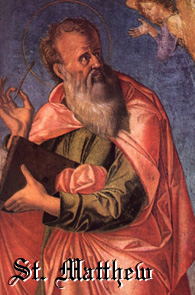
St. Matthew, Apostle Evangelist: Prayers, Devotions and Instructions for his Feast Day The Lives and Labors of the Apostles & The Apostles Creed Vol. 1, Part 2: The Ministry of Jesus Christ, as Illustrated by Catholic Artist and Historian, James Tissot, 1899 Vol. 2: Parables and Teachings of Jesus Christ, as Illustrated by Catholic Artist and Historian, James Tissot, 1899 September Meditations on the "The Great Truths" Related Links: A Series of Sermons in Defense of the Catholic Teaching on Oral Tradition, the Word of God, and Errors of Private Interpretation Refuting Protestant Errors of Private Interpretation The Catholic Church's Teaching on Justification Martin Luther & the Bible Martin Luther's Teaching and its Results, in his own words Catholic Bible Stories No Salvation Outside the Catholic Church 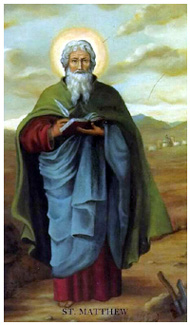
May we be assisted, O Lord, by the prayers of the blessed Apostle and Evangelist Matthew: that what we cannot by ourselves obtain may be given us through his intercession. Through our Lord Jesus Christ, Thy Son, Who liveth and reigneth with Thee in the unity of the Holy Ghost, one God, world without end. Amen. Ant. The souls of the Saints, who have followed the footsteps of Christ, rejoice in heaven; and because they have shed their blood for His love, therefore do they exult with Christ forever. R. These are the holy men whom the Lord hath chosen in charity unfeigned and hath given them everlasting glory: Whose teaching enlightens the Church as the moon by the sun. V. By faith the Saints conquered kingdoms and wrought justice. (Roman Breviary) One day, as Our Lord was walking by the Sea of Galilee, He saw, seated in his customs bureau, Levi the publican, whose business it was to collect the taxes from the people for their Roman masters. Jesus said to him: "Follow Me." Leaving all behind, Matthew arose and did so, thereby giving us all an example of the way in which we should respond to grace. The humble Matthew, as he was thereafter called, tells us himself in his Gospel that he was Levi, one of those publicans abhorred by the Jews as enemies of their country, outcasts and notorious sinners, who enriched themselves by extortion and fraud. No Pharisee would sit with one at table; Our Saviour alone had compassion for them. Saint Matthew prepared a great feast, to which he invited Jesus and His disciples, with a number of these publicans, who thereupon began to listen to Him with attention and joy. It was there, in answer to the murmurs of the Pharisees saying that this "pretended prophet" ate with publicans and sinners, that Jesus said, "They that are in good health have no need of a physician. I have not come to call the just, but sinners to penance." After the Ascension, Saint Matthew remained for over ten years in Judea, writing his Gospel there in about the year 44, to teach his countrymen that the kingdom of heaven had already been instigated, for Jesus was their true Lord and the King foretold by the prophets. He departed then to preach the Faith in Egypt and especially in Ethiopia, where he remained for twenty-three years. When he resurrected the son of the Ethiopian king who had received him, the miracle brought about the conversion of the royal house and with them the entire province. The king's daughter consecrated herself to God with several other maidens. When a young man wished to marry the beautiful Iphigenia, Saint Matthew invited him to come and listen to a discourse he was to make to that community of virgins, to hear what he would say to them. When the Apostle extolled the state of virginity, the suitor became enraged and arranged to have him slain as he came from the altar. Saint Hippolyte calls Saint Matthew the victim and martyr of holy virginity. It is said in the Constitutions of Pope Saint Clement that Saint Matthew instituted holy water, for protection of soul and body; the prayer he used for the purpose is reported in that document. The relics of Saint Matthew were for many years in the city of Naddaver in Ethiopia, where he suffered his martyrdom, but were transferred to Salerno in the year 954, where they remained concealed in a cave, for protection, for over a hundred years. |
September 22nd, St. Thomas of Villanova, Bishop and Confessor 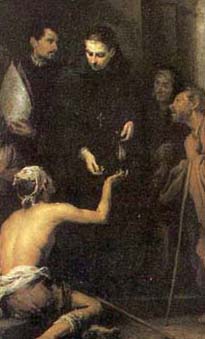 St. Thomas of Villanova The Life of St. Thomas of Villanova The Corporal Works of Mercy The Spiritual Works of Mercy On Conformity to the Will of God and the Motives that Oblige Us St. Thomas of Villanova, Bishop and Confessor We beseech Thee, O God, Who didst endow the blessed Bishop Thomas in a singular degree with the virtue of compassion for he poor: to pour forth through his intercession the riches of Thy mercy on those who humbly pray to Thee. Through our Lord Jesus Christ, Thy Son, Who liveth and reigneth with Thee in the unity of the Holy Ghost, one God, world without end. Amen. Ant. He hath dispersed abroad, he hath given to the poor: his justice endureth forever and ever. V. The Lord loved him and adorned him. R. He hath clothed him with a robe of glory. (Roman Breviary) Saint Thomas, the glory of the Spanish Church in the sixteenth century, was born in the diocese of Toledo in 1488. His mother was a Christian of extraordinary tenderness for the poor. God worked a miracle for her one day, when her servants had given away absolutely all the flour in their storeroom. When another beggar came to the door, she told them to go back once more and look again, and they found the storeroom filled with flour. Her little son followed his mother's example, and one day gave away, to six poor persons in succession, the six young chicks which had been following the hen around in the yard. When his mother asked where they were, he said, "You didn't leave any bread in the house, Mama, so I gave them the chicks! I would have given the hen if another beggar had come." At the age of fifteen years he began his studies and succeeded so well he was judged fit to teach philosophy and theology in a college of Alcala, and then at Salamanca. When his father died he returned to Villanova to dispose of his patrimony. He made his house into a hospital, keeping only what was needed for his mother, and gave the rest to the poor. At the age of twenty-eight he entered the Order of the Hermits of Saint Augustine at Salamanca, becoming professed in 1517. When ordained a priest three years later, he continued his teaching of theology, but also began to preach so remarkably well that he was compared with Saint Paul and the prophet Elias. The city was reformed, and after the Emperor Charles V heard him once, he returned and often mingled with the crowd to listen, finally making Saint Thomas his official preacher. He became Prior of his Order in three cities, then three times a Provincial Superior. His sanctity continued to increase, and he was nominated archbishop of Valencia in 1544; he had refused a similar offer sixteen years earlier, but this time was obliged to accept. After a long drought, rain fell on the day he assumed his new office. He arrived as a pilgrim accompanied by one fellow monk, and was not recognized in the convent of his Order when the two travelers came asking for shelter during the rain. He was obliged to reveal his identity when the Prior, who wondered where the awaited archbishop might be, asked him if perchance it was he. The new Archbishop was so poor that he was given money for furnishings, but he took it to the hospital for the indigent. On being led to his throne in church, he pushed the silken cushions aside, and with tears kissed the ground. His first visit was to the prison. Two-thirds of his episcopal revenues were annually spent in alms. He daily fed five hundred needy persons, made himself responsible for the bringing up of the city's orphans, and sheltered neglected foundlings with a mother's care. During his eleven years' episcopate, not one poor maiden was married without an alms from the archbishop. Spurred by his example, the rich and the selfish became liberal and generous. And when, on the Nativity of Our Lady, 1555, after one week of illness, Saint Thomas was about to breathe his last, he gave his bed to a poor man and asked to be placed on the floor. It has been said that at his death he was probably the only poor man in his see. 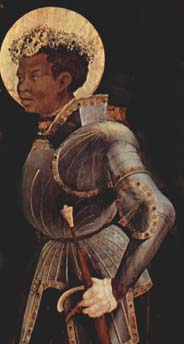 September 22nd, Sts. Maurice and Companions, Martyrs The Theban legion numbered more than six thousand men. They marched from the East into Gaul, and proved their loyalty at once to their Emperor and to their God. They were encamped near the Lake of Geneva, under the Emperor Maximian, when they got orders to turn their swords against the Christian population, and refused to obey. In his fury Maximian ordered them to be decimated. The order was executed once and again, but they endured this without a murmur or an effort to defend themselves. St. Maurice, the chief captain in this legion of martyrs, encouraged the rest to persevere and follow their comrades to heaven. "Know, O Emperor," he said, "that we are your soldiers, but we are servants also of the true God. In all things lawful we will most readily obey, but we cannot stain our hands in this innocent blood. We, have seen our comrades slain, and we rejoice at their honor, We have arms, but we resist not, for we had rather die without shame than live by sin." As the massacre began, these generous soldiers flung down their arms, offered their necks to the sword, and suffered themselves to be butchered in silence. Reflection.--Thank God for every slight and injury yon have to bear. An injury borne in meekness and silence is a true victory. It is the proof that we are good soldiers of Jesus Christ, disciples of that heavenly wisdom which is first pure, then peaceable. O almighty God, we beseech thee, may we be gladdened by the solemn festival of thy holy martyrs, Maurice and his companions; so that we may glory in the birthday of those on whose prayers we depend. Through our Lord Jesus Christ, Thy Son, Who liveth and reigneth with Thee in the unity of the Holy Ghost, one God, world without end. Amen. |
September 23rd, Linus, Pope and Martyr and St. Thecla, Virgin and Martyr. 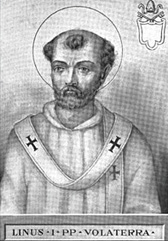
Linus, Pope and Martyr O eternal Shepherd, watch over the peace of Thy flock and through blessed Linus, Thy Martyr and Sovereign Pontiff, whom thou didst appoint shepherd over the whole Church, keep her under Thy constant protection. Through our Lord Jesus Christ, Thy Son, Who liveth and reigneth with Thee in the unity of the Holy Ghost, one God, world without end. Amen. (Roman Breviary) Saint Linus was converted in Rome in the days when Saint Peter was preaching the Gospel there. This nobleman, originally from the city of Volterra in Tuscany, left his father and renounced his heritage, to practice with greater perfection the doctrine of Our Lord Jesus Christ. He soon gave admirable proofs of his zeal, learning and prudence, and the first Vicar of Christ employed him in preaching and the administration of the Sacraments. He crossed into Gaul, and became the bishop of the city of BesanÂÂÂon. The number of the faithful increased daily by the conversion of many idolaters. The Saint one day attempted to turn some of those away from the celebration of a festival in honor of their gods, telling them that these idols were but statues without breath or sentiment, and represented only human beings whose vices were public knowledge. He exhorted them to turn to the unique God, Creator of the heavens and the earth, to whom alone man owes the homage of sacrifice. A prodigy followed his words; a column of their temple crumbled and caused the fall of an idol, which broke into a thousand pieces. The worshipers, unmoved by this, drove the Saint out of the city of BesanÂÂÂon, as the city's tradition still attests. He returned to Rome and was there when the prince of the Apostles was martyred. He wrote an account of the double martyrdom of Saints Peter and Paul, and was himself judged worthy to replace the first Vicar of Christ. The register of his reign records the creation of fifteen bishops and eighteen priests. The Roman breviary says that the faith and sanctity of this blessed Pope were so great that he drove the demons from many possessed persons. He had governed the Church for scarcely a year before he, too, shed his blood for his Saviour. His body was buried in the Vatican near that of Saint Peter. It was only in the 17th century that his tomb reappeared, marked Linus, when Pope Urban VIII had the work on the Confession of Saint Peter completed in the Basilica bearing his name. 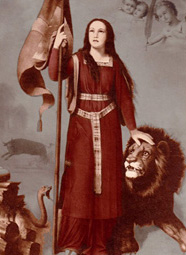 St. Thecla, Virgin and Martyr St. Thecla is one of the most ancient, as she is one of the most illustrious, Saints in the calendar of the Church. It was at Iconium that St. Paul met St. Thecla, and kindled the love of virginity in her heart. She had been promised in marriage to a young man who was rich and generous. But at the Apostle's words she died to the thought of earthly espousals; she forgot her beauty; she was deaf to her parents threats, and at the first opportunity she fled from a luxurious home and followed St. Paul. The rage of her parents and of her intended spouse followed hard upon her; and the Roman power did its worst against the virgin whom Christ had chosen for His own. She was stripped and placed in the public theatre; but her innocence shrouded her like a garment. Then the lions were let loose against her; they fell crouching at her feet, and licked them as if in veneration. Even fire could not harm her. Torment after torment was inflicted upon her without effect, till at last her Spouse spoke the word and called her to Himself, with the double crown of virginity and martyrdom on her head. Reflection.--It is purity in soul and body which will make you strong in pain, in temptation, and in the hour of death. Imitate the purity of this glorious virgin, and take her for your special patroness in your last agony. |
September 24th, Feast Day of Our Lady of Ransom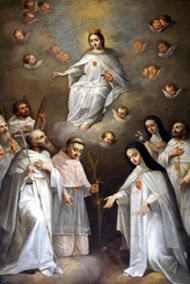 Our Lady of Ransom Novena to Our Lady of Ransom: Sept. 24th - Oct. 3rd Newly Added Catholic Book: Miniature Life of Mary The Sword of Saint Michael, St. Pius V. September Meditations on the "The Great Truths" Feast Day of Our Lady of Ransom O God Who wast pleased, through Thy Son's most glorious Mother to give new children to Thy Church to deliver Christ's faithful from the power of the heathen: grant, we beseech Thee, that we who love and honor her as the foundress of this great work, may by her merits and intercession be ourselves delivered from all sin and from the bondage of hell. Through our Lord Jesus Christ, Thy Son, Who liveth and reigneth with Thee in the unity of the Holy Ghost, one God, world without end. Amen. V. Vouchsafe that I may praise thee, O holy Virgin. R. Give me strength against thy enemies. Ant. Holy Mary, succor those in misery, strengthen the faint-hearted, comfort the sorrowful, pray for the people, mediate for the clergy, intercede for all devout women: may all experience thy help who celebrate thy holy festival. (Roman Breviary) The story of Our Lady of Ransom is, at its outset, that of Saint Peter Nolasco, born in Languedoc about 1189. At the age of twenty-five he took a vow of chastity and made over his vast estates to the Church. After making a pilgrimage to Our Lady of Montserrat, he went to Barcelona where he began to practice various works of charity. He conceived the idea of establishing an Order for the redemption of captives seized by the Moors on the seas and in Spain itself; they were being cruelly tormented in their African prisons to make them deny their faith. He spoke of it to the king of Aragon, James I, who knew him well and already respected him as a Saint; for the king had already asked for his prayers when he sent out his armies to combat the Moors, and he attributed his victories to those prayers. In effect all the Christians of Europe, and above all of Spain, were praying a great deal to obtain from God the remedy for the great evil that had befallen them. The divine Will was soon manifested. On the same night, August 1, 1218, the Blessed Virgin appeared to Saint Peter, to his confessor, Raymund of Pennafort, and to the king, and through these three servants of God established a work of the most perfect charity, the redemption of captives. On that night, while the Church was celebrating the feast of Saint Peter in Chains, the Virgin Mary came from heaven and appeared first to Saint Peter, saying that She indeed desired the establishment of a religious Order bearing the name of Her mercy. Its members would undertake to deliver Christian captives and offer themselves, if necessary, as a gage. Word of the miracle soon spread over the entire kingdom; and on August 10th the king went to the cathedral for a Mass celebrated by the bishop of Barcelona. Saint Raymund went up into the pulpit and narrated his vision, with admirable eloquence and fervor. The king besought the blessing of the bishop for the heaven-sent plan, and the bishop bestowed the habit on Saint Peter, who emitted the solemn vow to give himself as a hostage if necessary. The Order, thus solemnly established in Spain, was approved by Gregory IX under the name of Our Lady of Mercy. By the grace of God and under the protection of His Virgin Mother, the Order spread rapidly. Its growth was increased as the charity and piety of its members was observed; they very often followed Her directive to give themselves up to voluntary slavery when necessary, to aid the good work. It was to return thanks to God and the Blessed Virgin that a feast day was instituted and observed on September 24th, first in this Order of Our Lady, then everywhere in Spain and France. It was finally extended to the entire Church by Innocent XII. |
September 26th, Sts. Isaac Jogues and Companions, Martyrs 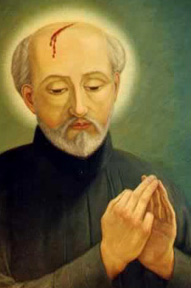 Sts. Isaac Jogues and Companions, Martyrs The Life of Father Isaac Jogues by Rev. Felix Martin Novena to the Jesuit Martyrs of North America: Sept. 18th - Sept. 26th. Bio on each martyrs for every day. Are we bound to profess our Catholic Faith openly? Final Perseverance by St. Bonaventure Litany of Faith and the Necessity of the Catholic Faith for Salvation Sts. Isaac Jogues and Companions, Martyrs O God, Who didst consecrate the first fruits of the faith in the northern regions of America by the preaching and blood of Thy blessed Martyrs Isaac, John, and their Companions: vouchsafe unto us, we beseech Thee, that through their intercession the fruitful harvest of Christians may everwhere daily receive an increase. Through our Lord. V. Be glad in the Lord, and rejoice, ye just. R. And glory, all ye upright of heart. Ant. For theirs is the kingdom of heaven, who have despised the life of the word, and have attained to the rewards of the kingdom, and have washed their robes in the blood of the Lamb. (Roman Breviary) September 26th, Sts. Cyprian and Justina, Martyrs: Virgin Sts. Cyprian and Justina from the Lives of the Saints O Lord, let Thy blessed martyrs Cyrpian and Justina ever lend us strength and protection: for Thou never ceasest to look with mercy upon those to whom Thou givest the help of the Saints. Through our Lord Jesus Christ, Thy Son, Who liveth and reigneth with Thee in the unity of the Holy Ghost, one God, world without end. Amen. (Roman Breviary) The detestable superstitions of Saint Cyprian's idolatrous parents delivered him, from his infancy, to the devil, and he was brought up in all the impious mysteries of idolatry, astrology, and black magic. Cyprian, having learned all the extravagances of these schools of error and delusion, hesitated at no crime, blasphemed Christ and committed secret murders. In the time of the emperor Diocletian, there lived at Antioch a young Christian called Justina, of high birth and great beauty. A pagan nobleman fell in love with her, and finding her modesty inaccessible and her resolution to evade him invincible, he applied to Cyprian for assistance. Cyprian tried every secret with which he was acquainted to overcome her resolution. Justina, perceiving herself vigorously attacked, armed herself by prayer, watchfulness, and mortification against all his demonic artifices and the power of his spells. Cyprian, realizing he was being bested by a superior power, began to recognize the weakness of the infernal spirits, and resolved to quit their service and become a Christian himself. Agladius, the suitor of the holy virgin, was likewise converted and baptized. When the persecution of Diocletian broke out, Cyprian and Justina were seized and presented to the same judge. She was inhumanly scourged, and Cyprian was torn with iron hooks. After this they were sent in chains to Diocletian, who commanded their heads to be struck off. This sentence was executed at Nicomedia, in the year 304. |
September 27th, Sts. Cosmas and Damian, Martyrs 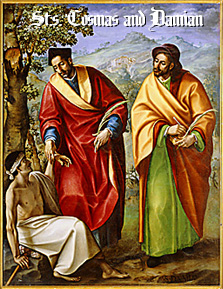 Ss. Cosmas and Damian, Martyrs Index of Prayers and Devotions for the Sick The Sickness of the Body is a Blessing to the Soul On Resignation to the Will of God in All of Our Sufferings September Meditations on the "The Great Truths" The Valid Sacrament of Extreme Unction The Corporal Works of Mercy Sts. Cosmas and Damian, Martyrs Grant, we beseech Thee, almighty God: that we who keep the festival of Thy blessed martyrs Cosmas and Damian, may through their intercession be delivered from all the dangers that threaten us. Through our Lord Jesus Christ, Thy Son, Who liveth and reigneth with Thee in the unity of the Holy Ghost, one God, world without end. Amen. V. Be glad in the Lord, and rejoice, ye just. R. And glory, all ye upright of heart. Ant. For theirs is the kingdom of heaven, who have despised the life of the world, and have attained to the rewards of the kingdom, and have washed their robes in the blood of the Lamb. (Roman Breviary) Saints Cosmas and Damian were brothers, born in Arabia in the third century, of noble and virtuous parents. Saint Gregory of Tours wrote that they were twins. They studied the sciences in Syria, and became eminent for their skill in medicine. Being Christians and filled with the charity which characterizes our holy religion, they practiced their profession with great application and wonderful success, but never accepted any fee. They were loved and respected by the people for their good offices and their zeal for the Christian faith, which they took every opportunity to propagate. When the persecution of Diocletian began to rage, it was impossible for persons of such distinction to remain concealed. They were denounced to the governor of Cilicia, named Lysias, as "Christians who cured various illnesses and delivered possessed persons in the name of the one called Christ; they do not permit others to go to the temple to honor the gods by sacrifices." The two brothers were apprehended by the order of the governor, and after various preliminary torments were sentenced to be bound hand and foot and thrown into the sea. Their prayer has been conserved: "We rejoice, Lord, to follow the path of Your commandments, as in the midst of immense riches; and even though we walk through the valley of the shadow of death, we fear no evil." And they recited the 23rd Psalm. The sentence was accomplished, but an Angel untied their bonds and drew them out of the sea. The witnesses of this fact returned to announce to the governor what had happened. They were brought back to Lysias as magicians, and he decided to imprison them until he could decide upon their fate. He condemned them to be burnt alive, but they prayed to God to manifest His power, lest His name be blasphemed, and an earthquake moved the fire into the midst of the pagans and spared the martyrs. When the rack also left them unharmed, the prefect swore by his gods he would continue to torture them until they became the food of birds of prey. They were crucified and stoned by the people, but this and still other tortures were ineffectual. They were finally beheaded with three Christian companions. |
September 28th, St. Wenceslaus, Martyr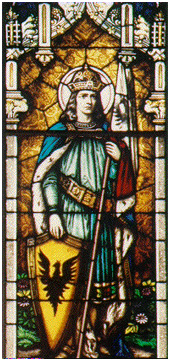 St. Wenceslaus Duke, Martyr The Devotion of St. Wenceslas, Duke of Behomia, to the Blessed Sacrament . . . page 24 The Corporal Works of Mercy The Spiritual Works of Mercy On Christian Self-Love and the Necessity of Holy Fear and Avoiding Sloth September Meditations on the "The Great Truths" St. Wenceslaus, Martyr O God, Who by the palm of martyrdom didst remove blessed Wenceslaus from an earthly principality to the glory of heaven, keep us, through his prayers, from all harm, and grant that we may enjoy fellowship with him. Through our Lord Jesus Christ, Thy Son, Who liveth and reigneth with Thee in the unity of the Holy Ghost, one God, world without end. Amen. (Roman Breviary) Wenceslas, born towards the end of the ninth century, was the son of a Christian Duke of Bohemia, but his mother was a harsh and cruel pagan. His holy grandmother, Ludmilla, seeing the danger to the future king, asked to bring him up. Wenceslas was educated by her good offices in the true faith, and under her tutelage acquired an exceptional devotion to the Blessed Sacrament. At the death of his father, however, he was still a minor, and his mother assumed the government and passed a series of persecuting laws. In the interests of the Faith, Wenceslas, encouraged by his grandmother, claimed and obtained through the support of the people, a large portion of the country as his own kingdom. Soon afterwards his grandmother was martyred, out of hatred of her faith and services to her country, while making her thanksgiving after Holy Communion. His mother secured the apostasy and alliance of her second son, Boleslas, who became henceforth her ally against the Christians. Wenceslas in the meantime ruled as the brave and pious king of Bohemia. When his kingdom was attacked, the prince of the invading army, which had been called in by certain seditious individuals, was approaching with a lance to slay him. This prince, named Radislas, saw two celestial spirits beside him; he had already seen him make the sign of the cross and then heard a voice saying not to strike him. These marvels so astonished him that he descended from his horse, knelt at the feet of Wenceslas and asked his pardon. Peace was then reestablished in the land. In the service of God Saint Wenceslas was constant, planting with his own hands the wheat and pressing the grapes for Holy Mass, at which he never failed to assist each day. He provided for the poor and himself took what they needed to them at night, to spare them the shame they might incur if their poverty became public knowledge. He desired to introduce the Benedictine Order into his kingdom, but was struck down by a violent death before he could do so and himself enter a monastery, as he wished to do. His piety provided the occasion for his death. After a banquet at his brother's palace, to which he had been treacherously invited and where he manifested great gentleness towards his brother and mother, he went to pray at night before the tabernacle, as he was accustomed to do. There, at midnight on the feast of the Angels in the year 938, he received the crown of martyrdom by the sword, at the hand of his own brother. |
September 29th, Dedication of St. Michael the Archangel
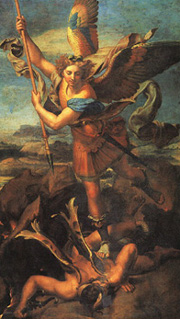
Dedication of St. Michael the Archangel Devotions to St. Michael, Chaplet St. Michael/ Exorcism Novena to St. Michael the Archangel Children's Sermon: St. Michael On Michaelmas Day. Sept. 29th Instructions on the Feast of St. Michael the Archangel The Three Archangels and the Guardian Angels in Art, 1899 The Angels in the Liturgy Litany of the Holy Angels Our Lady Queen of Angels Prayer for the Dying to St. Michael the Archangel September Meditations on the "The Great Truths" Dedication of St. Michael the Archangel O God, Who ordained in wondrous order, the offices of Angels and men, grant in Thy mercy, that those who stand forever before Thee in heaven to do Thy will, may also guard our lives upon earth. Through our Lord Jesus Christ, Thy Son, Who liveth and reigneth with Thee in the unity of the Holy Ghost, one God, world without end. Amen. Antiphon: An Angel stood at the altar of the temple, having a golden censer in his hand. While Michael the Archangel fought with the dragon, there was heard the voice of them that said: Salvation to our God, alleluia. O Archangel Michael, I have appointed thee prince over all souls about to be received into eternity. O ye Angels of the Lord, bless ye the Lord for ever. Angels, Archangels, Thrones and Dominations, Principalities and Powers, Virtues of the heavens, praise ye the Lord from the heavens, alleluia. (Roman Breviary) "MICHAEL," or "Who is like unto God?" was the cry of the great Archangel when he smote the rebel Lucifer in the conflict of the heavenly hosts. From that hour he has been known as Michael, Captain of the armies of God, the archetype of divine fortitude, the champion of every faithful soul in strife with the powers of evil. What is more, we see him in Holy Scripture as the special guardian of the children of Israel, their comfort and protector in times of sorrow or conflict. It is he who prepares their return from the Persian captivity, when the prophet Daniel prays for that favor (Daniel 10:12-13); who leads the valiant Maccabees to victory in battle, after the prayer of Judas Maccabeus (I Mac. 7:41-44). Ever since its foundation by Jesus Christ, the Church has venerated Saint Michael as her special patron and protector. She invokes him by name in her Confiteor, when accusing her faults; she summons him to the side of her children in the agony of death, and chooses him as their escort from the chastening flames of purgatory to the realms of holy light. Lastly, when Antichrist shall have set up his kingdom on earth, it is Michael who will unfurl once more the standard of the Cross. This we know from a prophecy of Scripture which states clearly that in those days the great prince Michael will rise up to protect the children of God. (Daniel 12:1-4) During the plague in Rome in the 6th century, Pope Gregory the Great saw Saint Michael in a vision sheathing his flaming sword to show that he would put an end to the scourge which was ravaging the city. In 608 a church was erected in thanksgiving to Saint Michael for the help he gave. 
St. Michael, who didst drive from heaven Lucifer and his rebel crew, pray for us. |
September 30th, St. Jerome, Priest, Confessor and Doctor of the Church. 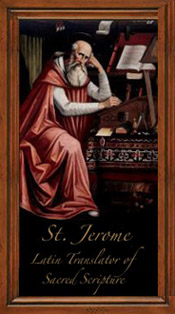 The Enthronement of the Sacred Heart of Jesus Act of Reparation to the Sacred Heart of Jesus Consecration of Children to the Sacred Heart of Jesus St. Jerome Priest, Confessor, and Doctor of the Church The Life of Saint Jerome A Series of Sermons in Defense of the Catholic Teaching on Oral Tradition, the Word of God, and Errors of Private Interpretation Refuting Protestant Errors of Private Interpretation September Meditations on the "The Great Truths" From St. Jeromes Latin Vulgate: Vol. 1, Part 2: The Ministry of Jesus Christ, as Illustrated by Catholic Artist and Historian, James Tissot, 1899 Vol. 2: Parables and Teachings of Jesus Christ, as Illustrated by Catholic Artist and Historian, James Tissot, 1899 Vol. 3: Holy Week and the Passion of Jesus Christ, as Illustrated by Catholic Artist and Historian, James Tissot, 1899 Vol. 4 Part 1: The Passion Continued and the Death of Jesus Christ, as Illustrated by Catholic Artist and Historian, James Tissot, 1899 Vol. 4 Part 2:The Resurrection and Ascension of Jesus Christ, as Illustrated by Catholic Artist and Historian, James Tissot, 1899 Newly Added Catholic Book The Apocalypse of St. John From the Children's Library Life on Earth of Our Blessed Lord for Little Children Catholic Bible Stories The Devils who Tempt St. Hilarion's miracles and combats with devils as written by St. Jerome St. Jerome, Priest, Confessor and Doctor of the Church O God, Who in blessed Jerome, Thy Confessor didst vouchsafe to provide for Thy Church a great Doctor to expound the Holy Scriptures: grant, we beseech Thee, that by his merits which plead for us, we may be able to practice what he taught both by word and example. Through our Lord Jesus Christ, Thy Son, Who liveth and reigneth with Thee in the unity of the Holy Ghost, one God, world without end. Amen. (Roman Breviary) Ant. O excellent Doctor, light of holy Church, blessed Jerome, lover of the divine law, pray unto the Son of God for us. V. The Lord hath loved him and hath adorned him. R. He hath clothed him with a robe of glory. Saint Jerome, born in Dalmatia in 329, was sent to school in Rome. His boyhood was not free from faults; his thirst for knowledge was excessive, and his love of books, a passion. He had studied under the best masters, visited foreign cities, and devoted himself to the pursuit of learning. But Christ had need of his strong will and active intellect for the service of His Church. He told him in a supernatural experience he never forgot that he was not a Christian, but a Ciceronian: "Your heart is where your treasure is," said the Lord to him--that is, in the eloquent writings of antique times. Saint Jerome obeyed the divine call, making a vow never again to read profane works, and another of celibacy. In Rome he had already assisted a number of holy women to organize houses of retirement where they consecrated themselves to God by vow. Calumnies, arising from jealousy, made a certain headway against the scholar whose competence was beginning to attract honors. He fled from Rome to the wild Syrian desert, and there for four years learned in solitude, intense sufferings and persecution from the demons, new lessons in humility, penance and prayer, and divine wisdom. "I was very foolish to want to sing the hymns of the Lord on foreign soil, and to abandon the mountain of Sinai to beg help from Egypt," he declared. Pope Damasus summoned him back to Rome, and there assigned to the famous scholar, already expert in Hebrew and other ancient languages, the task of revising the Latin Bible. Saint Jerome obeyed his earthly Head as he had obeyed his Lord. Retiring once more in 386 to Bethlehem, the eloquent hermit sent forth from his solitary cell not only a solidly accurate version of the Scriptures, but during thirty years' time, a veritable stream of luminous writings for the Christian world. He combated with unfailing efficacy several heresies being subtly introduced by various personages in his own region and elsewhere. For fourteen years the hand of the great scholar could no longer write; but Saint Jerome could still dictate to six secretaries at a time, to each on a different subject, in those final years. He died in his beloved Bethlehem in 420, when over 80 years old. His tomb is still in a subterranean chapel of its ancient basilica, but his relics were transported to Saint Mary Major Basilica of Rome, where the crib of Bethlehem is conserved. |
Saints and Feast Days for the Month of October
All of the following are non-moveable feasts that always occurs on the same date each year
All of the following are non-moveable feasts that always occurs on the same date each year
|
October 1st, St. Remigius, Bishop and Confessor. First Saturday. 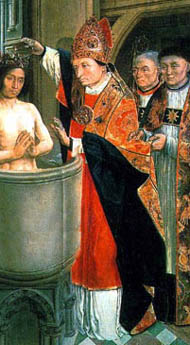
Our Lady's Saturday and First Saturday Act of Reparation Five First Saturdays Novena of Reparation to the Immaculate Heart of Mary; Fatima and the Rosary Remodel Your Home After Mary's Heart True Devotion to the Blessed Virgin Mary by St. Louis Marie de Monfort October 1st, St. Remigius Bishop and Confessor Abjuration of Heresy and Profession of Faith of the Council of Trent, Pius IV., 1565 The Sacrament of Baptism The Necessity of Avoiding Occasions of Sin by St. Alphonsus Liguori Sermon on Keeping the 10 Commandments The 1st Commandment Meditations on Saving Your Soul: Will it be Heaven or Hell? No Salvation Outside the Catholic Church Twelve Months Sanctified by Prayer, October--Dedicated to the Angels THE OCTOBER ROSARY His Holiness, Leo XIII., by his Encyclical Supremi Apostolatus, September I, 1883, and by a decree of the S. Congr. of Rites, August 20, 1885, had granted and confirmed some Indulgences for the saying of the Rosary during the month of October; then by a rescript of the S. Congr. of Indulgences, July 23, 1898, he made perpetual and modified them, granting to the faithful who, during the said month, publicly in church or privately anywhere, recite at least a third part of the Rosary; An Indulgence Of Seven Years. Novena for the Feast of the Most Holy Rosary: Sept. 30th - Oct. 8th 54 Day Rosary Novena--27 Days of Petition and 27 Days of Thanksgiving St. Remigius, Bishop and Confessor Grant, we beseech Thee, Almighty God; that the holy festival of blessed Remigius Thy Confessor and Bishop, may both increase our devotion and advance our salvation. Through our Lord Jesus Christ, Thy Son, Who liveth and reigneth with Thee in the unity of the Holy Ghost, one God, world without end. Amen. Ant. O Priest and Bishop, and workers of virtues, good shepherd of the people, pray unto the Lord for us. V. The Lord loved him and adorned him. R. He clothed him with a robe of glory. (Roman Breviary) Saint Remi or Remigius was born in the middle of the fifth century, of noble and pious parents. His mother, Saint Celine, had borne two other sons before him; the eldest, Saint Principius, became the twelfth bishop of Soissons, and the second was the father of Saint Lupus, thirteenth bishop of the same see. Saint Remi was given to his parents many years later, miraculously; a blind hermit named Montanus, afflicted by the state of religion in the churches of Gaul, was told three times, supernaturally, to advise his worthy parents that they would have a son who would be the light of the Francs, and would bring these new conquerors out of the idolatry in which they were plunged. The child born to them in fulfillment of the prediction, was at the age of twenty-two years acclaimed Archbishop of Rheims, despite his humble doubts as to his competence. He was unusually tall, his countenance manifested a blend of majesty and serenity; his bearing was gentle, humble, and retiring. He was learned and eloquent, and his pity and charity were boundless. In his labors he knew no weariness. His body was the outward expression of a noble and holy soul, breathing the spirit of meekness and compunction. The archbishop received the gift of miracles. When a great fire was threatening the city of Rheims with total ruin, by his presence he arrested it; he faced it with a crucifix and made the sign of the cross, and the flames retired as he advanced. He resurrected a young woman, and his fame continued to increase. For His predestined servant, God had a particular and great work in store. The south of France was in the hands of Arians, and in the last years of the 5th century the pagan Franks were wresting the north from the Romans. But Saint Remigius was loved by Clovis, the fifth of the Merovingian kings. The king was converted and baptized by him in 496, after winning the famous battle of Tolbiac, to fulfill a promise he had made to adopt the religion of his Christian wife if he repulsed the invading armies. A very large army of invaders, which had cast all of France into panic, fled in disarray when the small army of Clovis attacked, and their leader was slain. Clovis had married the noble Christian maiden known to us as Saint Clotilda, and these three acting concertedly gained virtually the entire nation to the Christian religion. The army was baptized at the same time as Clovis, by Saint Remi and his assistants. The Saint threw down the altars of the idols, built churches, and appointed bishops. He silenced the Arians and presided at the Catholic First Council of Orleans. Eventually he converted so many that he left France a Catholic kingdom; its king was also the first crowned son of the Church, and at that time the only one. Ever since Saint Remi, Catholic France has rejoiced in its title of eldest daughter of the Church. After an episcopate of seventy-four years, the longest on record, Saint Remi died in 533, leaving to France his famous Testament, predicting God's graces of predilection for this blessed kingdom, as long as its Heads remained faithful to Him, with the most severe chastisements if the contrary ensued. The prophecy has already been fulfilled three times, as the nation's Catholic historians affirm, for the three royal dynasties. |
October 2nd, The Feast of the Holy Guardian Angels. First Saturday
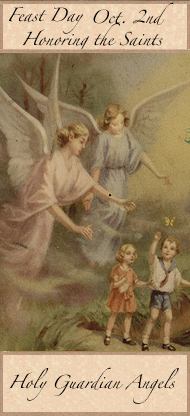 Guardian Angels Novena to the Guardian Angels The Feast of the Guardian Angels Catholic Book: Memoirs of a Guardian Angel Instructions for the Feast of the Guardian Angels and Sermon by Bishop Challoner Devotions to the Guardian Angels Children's Devotions to the Guardian Angels Your Guardian Angel throughout Life The Twelve Works of Our Guardian Angel St. Michael the Guardian Angel of the Blessed Sacrament Video on Guardian Angels Please wait until the entire video is loaded before viewing. This applies to all of our videos on the same page. October Meditations Dedicated to the Holy Angels Litany of the Holy Angels Our Lady Queen of Angels Twelve Months Sanctified by Prayer, October--Dedicated to the Angels Angels in the Liturgy The Devils Plan to Ruin Souls and the Protection of the Holy Angels The Spiritual Combat Good and Bad Angels The Three Archangels and the Guardian Angels in Art, 1899 St. Michael the Archangel/ Exorcism Prayer St. Raphael, the Archangel. St. Gabriel the Archangel The Feast of the Holy Guardian Angels O God, Who in Thy inexpressible providence, hast deigned to send Thy Holy Angels to guard us; grant, we humbly pray that we may ever be sheltered and shielded by them here, and rejoice in their fellowship hereafter. Through our Lord Jesus Christ, Thy Son, Who liveth and reigneth with Thee in the unity of the Holy Ghost, one God, world without end. Amen. Ant. God hath given His Angels charge over thee, to keep thee in all thy ways. Let us bless the Lord whom the Angels praise, unto whom the Cherubim and Seraphim cry: Holy, Holy, Holy. Their Angels always behold the face of My Father who is in heaven. Blessed be God, who sent His Angel, and delivered His servants who trusted in Him. Praise ye God, all His Angels; praise ye Him, all His hosts. (Roman Breviary) God does not abandon to what we call "chance," any of His creatures. By His essence and providence He is everywhere present; not a sparrow falls to the ground, nor a hair from our heads, without His consent. He is not content, however, with assisting His creation daily and at every moment, with sustaining His handiwork, which without His continuous support would return to dust. His divine and infinite Love, not only maintaining the existence which He gives and perpetuates in living beings, has charged His Holy Angels with the ministry of watching and safeguarding each one of His rational creatures. The Angels, divided into nine hierarchies, have varied obligations. Their intelligence and prudence are penetrating like the beam of a lighthouse; so it appears even when we compare it to the best of human intelligences, which are like the light of a little candle in contrast. An Angel, visualizing an end to be attained, sees instantly the means necessary to achieve it, whereas we must pray, study, deliberate, inquire, and choose during many phases of effort, in order to reach our proposed ends. Kingdoms have their Angels assigned to them; dignitaries of the Church and of the world have more than one Angel to guide them; and every child who enters into the world receives a Guardian Angel. Our Lord says in the Gospel: "Beware lest you scandalize any of these little ones, for their Angels in heaven behold the face of My Father." Thus the existence of Guardian Angels is a dogma of the Christian faith, based on Holy Scripture itself. |
October 3rd, St. Theresa of the Child Jesus, Virgin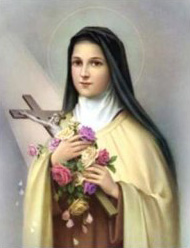
St. Theresa of the Child Jesus St. Theresa Additional Prayers St. Theresa had a Special Devotion to the Holy Face of Jesus Novena to St. Theresa: Sept. 25th - Oct. 3rd St. Theresa of the Child Jesus, Virgin O Lord, Who hast said, unless you become as little children you shall not enter into the kingdom of heaven: grant, we beseech Thee, that we may so follow the holy virgin Teresa, in humility and simplicity of heart, that we may attain to an everlasting reward. Who livest etc. (Roman Breviary) Ant. Come, Spouse of Christ, receive the crown, which the Lord hath prepared for thee for all eternity. V. With thy comeliness and thy beauty. R. Set out, proceed prosperously, and reign. Marie Francoise Therese Martin, known as the Little Flower of Jesus, was born January 2, 1873 at Alenon in Normandy, France, of very Christian parents. The Martins, who lost four of their little ones in early infancy or childhood, regarded their children as gifts from heaven and offered them to God before their birth. Therese was the last flower of this blessed stem, which gave four Sisters to the Carmel of Lisieux, still another to the Visitation of Caen. The five sisters were left without their mother, a victim of cancer, when Therese was only four years old; but her two oldest sisters were of an age to take excellent care of the household and continue the Christian character formation of the younger ones, which their mother had initiated. Their saintly father was soon to see his little flock separated, however, when one after the other they left to enter religious life. He blessed each one and gave them all back to God, with humble gratitude to God for having chosen his daughters. From childhood Therese had manifested a tender piety which her naturally lively temperament could not alter. Her mother's death affected her profoundly, however, and at the age of nine she was visited with a severe trial in the form of an illness the doctors could not diagnose, and which seemed incurable. She was instantly restored to her ordinary good health by the Virgin Mary, in answer to her desolate sisters' prayers; Therese saw Her statue become animated, to smile at her with an ineffable tenderness as she lay on her bed of suffering. Before the age of fifteen Therese already desired to enter the Carmel of Lisieux, where her two eldest sisters were already nuns; a trip to Rome and a petition at the knees of the Holy Father Leo XIII gave her the inalterable answer that her Superiors would regulate the matter. Many prayers finally obtained an affirmative reply to her ardent request, and four months after her fifteenth birthday she entered Carmel with an ineffable joy. She could say then, "I no longer have any desire but to love Jesus even to folly." She adopted flowers as the symbol of her love for her Divine Spouse and offered all her little daily sacrifices and works as rose petals at the feet of Jesus. Divine Providence gave to the world the autobiography of this true Saint, whose little way of spiritual childhood was described in her own words in her Story of a Soul. She could not offer God the macerations of the great soldiers of God, only her desires to love Him as they had loved Him, and to serve Him in every way possible. She chose "all" in spirit, for her beloved Lord. Later she would be named patroness of missions. Her spirituality does not imply only sweetness and light, however; this loving child of God passed by a tunnel of desolate spiritual darkness, yet never ceased to smile at Him, wanting to serve Him, if it were possible, without His even knowing it. When nine years had passed in the Carmel, the little flower was ready to be plucked for heaven; and in a slow agony of consumption, Therese made her final offering to God. She suffered so severely that she said she would never have believed it possible, and could only explain it by her desire to save souls for God. She died in 1897, was beatified in 1923 and canonized in 1925. And now, as she foretold, she is spending her heaven in doing good upon earth. Countless miracles have been attributed to her intercession. 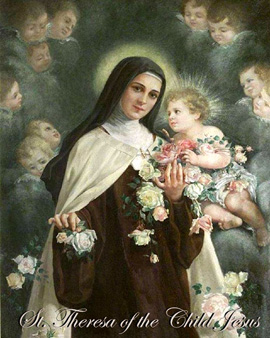
|
October 4th, St. Francis of Assisi, Confessor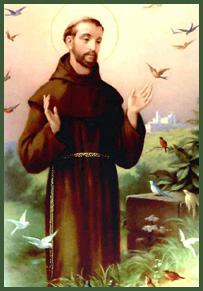 Devotions to St. Francis of Assisi Novena to St. Francis of Assisi: Oct. 4th - Oct. 12th Instructions for the Feast of the St. Francis of Assisi The Little Flowers of St. Francis Works of the Seraphic Father St. Francis of Assisi Stigmata of St. Francis with Litany to St. Francis St. Clare, Virgin St. Francis of Assisi and his Confrontations with devils Lead us not into Temptation: from the Council of Trent On the Use of Temptations and How to Overcome Discouragement Beware if you have no Temptations: Sermon by St. John Vianney The Corporal Works of Mercy The Spiritual Works of Mercy St. Francis of Assisi, Confessor O God, Who through the merits of blessed Francis, gavest increase to Thy Church by enriching her with new children: may we so follow his example as to despise the things of this world, and always rejoice in partaking of thy heavenly gifts. Through our Lord Jesus Christ, Thy Son, Who liveth and reigneth with Thee in the unity of the Holy Ghost, one God, world without end. Amen. V. The Lord loved him and adorned him. R. He clothed him with a robe of glory. Ant. I will liken him to a wise man that built his house upon a rock. (Roman Breviary) Saint Francis, the son of a merchant of Assisi, was born in the year 1182 in a poor stable, his birth already prophesying the Saint who would preach poverty to a world seduced by luxury. Though chosen by God to be for the world a living manifestation of Christ's poor and suffering life on earth, in his youth he was generous, always of equal humor, and much appreciated by his friends; he was fond of splendors, fine clothing, and good company, and easily won the affection of all who knew him. More than once various holy persons foretold for him a future of glory, but in veiled terms. Francis did not understand these predictions, and supposed he would become the leader of a large militia. The military life he had adopted ended when Jesus told him he was destined to fight another kind of combat, one against the demon and sin; that the grandeurs predicted were spiritual, not temporal -- and to return home. He became inspired with a great esteem for poverty and humiliation. The thought of the Man of Sorrows, who had nowhere to lay His head, filled him with holy envy of the poor, and constrained him to renounce the wealth and the worldly station which he had come to abhor. One day, while on horseback, he met a leper begging alms who inspired him with repugnance, and he took a path to avoid him. Then, repenting, he turned his horse around and returned to embrace him and give him a generous alms, as was his custom for all beggars. He continued on his way, but looked back, and nowhere on the plain could the stranger be seen, though there were no trees, no refuges anywhere. He was from that day a completely transformed person. He decided to use his wealth to care for the poor and the sick, and dedicate himself in person to the same works. When he prayed one day in the little chapel to do only what God willed of him, the Saviour spoke again to him, repeating three times the mysterious words: "Go, Francis, and repair My house which is falling into ruin." He then undertook to repair the old church of San Damiano where he had heard these words, retiring for refuge to a grotto. He was regarded as a fool by the people, when he returned to the city in the clothing of a poor beggar. This was indeed the folly of the Cross. Francis renounced his heritage definitively, to beg thereafter his daily sustenance and what he needed for the repair of the church, and left the city singing the praises of God. He repaired two other churches. The love of God which was burning brightly in the poor man of Assisi began to give light and warmth to many others also, and it was not long before several came to join him. One of them was a very wealthy man of Assisi, the second a Canon of the Assisi cathedral, and the third the now Blessed Brother Gilles. They adopted the absolute poverty of Francis, and the foundations of the Franciscan Order were laid. They were first called the "penitents of Assisi." No counsels could make Francis change his resolution to possess nothing at all. God revealed to him then that he was to found a religious Order. Pope Innocent III, when Francis with his first twelve companions journeyed to Rome, after first rebuffing them, recognized him as the monk God showed him in a vision, supporting on his shoulders the Church of Saint John Latran, which was growing decrepit. He received the profession of Francis and his twelve companions, and in 1215 they were formally constituted as a religious Order, which then spread rapidly throughout Christendom. In 1216, Saint Francis after assembling his religious, sent them out to preach in France, Spain, England and Germany, where they established monasteries, lasting proofs of the efficacy of their missions. A second general Chapter was held in 1219 on the feast of Pentecost, and the little Brothers gathered from all over the world at Saint Mary of the Angels, the church which Francis and his first twelve disciples had received only nine years earlier. Cabins of reeds and tents were put up all over the countryside. The Cardinal who visited them exclaimed, with tears in his eyes, "O Brother, truly this is the camp of the Lord!" They were more than 5,000 in number. Saint Francis exhorted his brethren: "My Brothers, above all, let us love the Holy Church; let us pray for her exaltation, and never abandon poverty. Is it not written, 'Trust in the Lord, and He Himself will sustain you' "? Francis, after visiting the Orient in a vain quest for martyrdom, spent his life like his Divine Master -- now in preaching to the multitudes, now amid the desert solitudes in fasting and contemplation. His constant prayer was "My God and my All!" During one of these retreats on Mount Alverno, he received on his hands, feet, and side the imprints of the five wounds of Jesus. With the cry, "Welcome, sister Death!" he passed to the glory of his God, October 4, 1226, at the age of 44 years. |
October 5th, St. Placid and Companions, Martyrs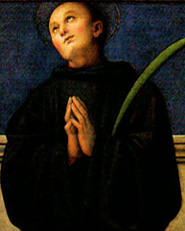 St. Placid and companions, Martyrs On Christian Self-Love and the Necessity of Holy Fear and Avoiding Sloth Part 12: Resisting the Enemies of Our Salvation The Sin Unto Death and the 7 Capital Sins by Cardinal Manning Time is No More St. Placid and Companions, Martyrs O God, by whose grace we keep the festival of Thy holy Martyrs Placidus and his Companions: grant that we may enjoy their fellowship in everlasting bliss. Through our Lord Jesus Christ, Thy Son, Who liveth and reigneth with Thee in the unity of the Holy Ghost, one God, world without end. Amen. Ant. For theirs is the kingdom of heaven, who have despised the life of the world, and have attained to the rewards of the kingdom, and have washed their robes int he blood of the Lamb. V. Be glad in the Lord, and rejoice, ye just. R. And glory all ye upright of heart. (Roman Breviary) Saint Placid was born in Rome, in the year 515, of a patrician family, and at seven years of age was taken by his father to the Benedictine monastery of Subiaco, recently founded, to be educated. At thirteen years of age he followed Saint Benedict to a new foundation at Monte Cassino, where he grew up in the practices of a wonderful austerity and innocence of life. He had scarcely completed his twenty-first year when he was chosen to found a monastery at Messina, in Sicily, upon some estates which had been given by his father to Saint Benedict. He spent four years in building that monastery. There miracles made him known, and it was said that his humility was so perfect and had such charm, that it earned for him the affection of all. He could not see a poor man without hastening to aid him. One day he cured all the sick of the island at the same time, when they were brought and assembled before him for his benediction. The fifth year spent by the monks in Messina had not yet ended when a band of Saracen pirates who had already killed a great many persons, burnt everything to the ground in 541. They then put to a lingering death not only Placid and thirty monks who had joined him, but also his two brothers, Eutychius and Victorinus, and his holy sister Flavia, who had come to visit him. The entire flotilla of the invaders perished when these barbarians left the island, amid a sudden storm; although they had a hundred ships and were 16,800 in number, not one ship or passenger survived. A religious who had escaped notice wrote to Saint Benedict an account of the massacre, after burying the martyrs. Saint Placid was the first Benedictine martyr, and the monastery of Messina, which was rebuilt not long afterwards, was henceforth known by his name. |
October 6th, St. Bruno, Confessor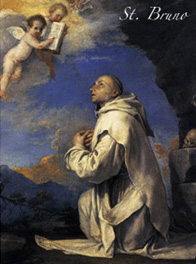 St. Bruno, Confessor They that Live in Sin Unworthy Communion Death-Bed Repentance On the Use of Temptations and How to Overcome Discouragement The Devils Plan to Ruin Souls and the Protection of the Holy Angels Moral Teaching on Unchaste Thoughts and Desires Links to the Guardian Angels During the Entire Month of October St. Bruno, Confessor O Lord, we beseech Thee, that we may be helped by the intercession of the holy Bruno, Thy Confessor, so that we who have offended Thy divine majesty by our grevious sinning, may through his merits and prayers, obtain forgiveness of our offenses. Through our Lord Jesus Christ, Thy Son, Who liveth and reigneth with Thee in the unity of the Holy Ghost, one God, world without end. Amen. V. The Lord loved him and adorned him. R. He clothed him with a robe of glory. Ant. I will liken him to a wise man that built his house upon a rock. Saint Bruno was born in Cologne in about the year 1030, of an illustrious family. He was endowed with rare natural gifts, which soon shone with outstanding brilliance in Paris, though he was studying among other gifted young men. Ordained at Cologne, his native city, he became a Canon of its cathedral, and then was a Canon at Rheims, where the direction of studies in theology was entrusted to him. He already had a very strong distaste for honors, and a great desire for the life of contemplation. On the death of the excellent Gervais, Archbishop of Rheims, the region fell for a time into evil hands, and Bruno, who had resisted the decay of religion, became the object of a persecution. He stood firm and called for a papal legate; a council was assembled at Autun, of which Bruno was the soul, and the intruder at Rheims was repulsed, to die later in total obscurity. Bruno was not yet forty years old, but all desired that he assume the charge of the see; yet he could not bring himself to accept this honor. He retired from Rheims, and resolved to forsake the world definitively, to live a life of retirement and penance. Others joined him in retreat, desiring the pursuit of perfection, according to the means Christ prescribed. If you will be perfect, go, sell all that you have and give it to the poor, and you shall have treasure in heaven; and come, follow Me. (Matthew 19:21) Saint Bruno aspired to a desert and, inspired by God, looked towards the Alps of the east. With six companions, four priests and two laymen, Saint Bruno applied to Hugh, Bishop of Grenoble, who led them to a wild solitude called the Chartreuse. There they lived in poverty, self-denial, and silence, each apart in his own cell, meeting only for the worship of God, and employing themselves in copying books. From the name of the solitude the Order of Saint Bruno was called the Carthusian Order. Six years later, Urban II called Bruno to Rome, that he might benefit from his counsel. Bruno tried to live there as he had lived in the desert; but the echoes of the great city disturbed his solitude, and, after refusing high dignities, he finally obtained, by force of persuasion, the permission of the Pope to resume his monastic life, this time in Calabria, with only a few companions. There he lived, in humility and mortification and great peace, until his blessed death occurred, in the arms of his faithful monks, in 1101. |
October 7th, The Most Holy Rosary of the Blessed Virgin Mary
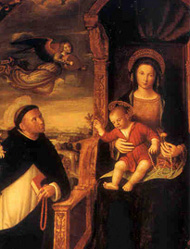
Novena of the Holy Rosary with Litany ; Feast of the Most Holy Rosary from the Liturgical Year, 1903 The Enthronement of the Sacred Heart of Jesus First Friday Devotions Consecration of Children to the Sacred Heart of Jesus Feast of the Holy Rosary Fr. Francis Xavier Weninger Feast of the Most Holy Rosary, by Rev. Geoffine, 1896 Children's Sermon: Feast of the Holy Rosary The History of the Rosary The Excellence of the Rosary, Rev. M. J. Frings, 1912 Encyclical on the Recitation of the Rosary The Book of the Holy Rosary as Explained by the Church Fathers The Victory of Lepanto and the Most Holy Rosary St. Dominic The Sword of Saint Michael, St. Pius V. How to Say the Rosary 54 Day Rosary Novena--27 Days of Petition and 27 Days of Thanksgiving 15 Promises of the Rosary Rosary Novena: Joyful Mysteries Rosary Novena: Sorrowful Mysteries Rosary Novena: Glorious Mysteries St. Gabriel Ave Maria The Little Office of the Blessed Virgin Mary, from Candlemas until Advent Spiritual Communion The Most Holy Rosary of the Blessed Virgin Mary O God, Whose only-begotten Son by His life, death, and resurrection hath purchased for us the rewards of eternal salvation: grant, we beseech Thee, that, by meditating upon these mysteries in the most holy Rosary of the Blessed Virgin Mary, we may both imitate what they contain, and obtain what they promise. Through our Lord Jesus Christ, Thy Son, Who liveth and reigneth with Thee in the unity of the Holy Ghost, one God, world without end. Amen. Ant. Who is this beautiful as a dove, like a rose planted by the brooks of water? It is the mighty Virgin, like the tower of David; a thousand bucklers hang upon it, all the armor of valiant men. Hail Mary, full of grace, the Lord is with thee, blessed art thou among women. The Lord hath blessed thee by his power, because by thee he hath brought our enemies to nought. The daughters of Sion saw her adorned with the flowers of roses, and declared her most blessed. (Roman Breviary) In thanksgiving for the victory of Lepanto, an ancient stronghold of Greece and a modern port of that nation, Saint Pius V in 1571 instituted an annual feast in honor of Our Lady of Victory. Two years later, Gregory XIII changed this title to Our Lady of the Rosary; in 1740, Clement XII extended the feast to the universal Church. We have related in the life of Saint Pius V the victory of Lepanto; here we will speak of the Rosary itself, granted to Saint Dominic by Our Lady Herself in the thirteenth century, with promises of the greatest blessings for those who recite it well. The Rosary of fifteen decades affords a simple means of meditation on the principal mysteries of our holy Religion, and a means of drawing closer to the Saviour through the intercession of the One to whom He never refuses anything. One can also say the chaplet of five decades, since the fifteen are divided into three groups of five: The Joyful, the Sorrowful, and the Glorious Mysteries of the life of Christ. Pope Leo XIII personally started the practice of devoting October to the Rosary devotion. In a letter of September 1, 1883, mindful of the Rosary's power to strengthen faith and foster a life of virtue, he outlined the triumphs of the Rosary in past times and admonished the faithful to dedicate the month of October to the Blessed Virgin through the daily recitation of her Rosary. Can one imagine a more perfect prayer than the Holy Rosary of the Queen of Heaven, the Blessed Virgin and Mother Mary? It would require large volumes or even an entire library to narrate the graces and miracles that have been obtained by its humble recitation. |
October 8th, St. Bridget, Widow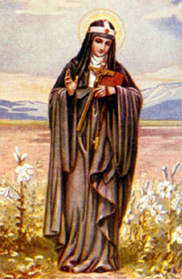 Our Lady's Saturday Our Lady of Fatima Five First Saturdays Novena of Reparation to the Immaculate Heart of Mary; Fatima and the Rosary Remodel Your Home After Mary's Heart The Revolt of Society from God St. Bridget, Widow Catholic Book about St. Bridget of Sweden, Imprimatur 1909 A Mother's Prayer for the Conversion of her child The Christian Mother Duties of Parents What is it to be a Mother? St. Bridget, Widow O Lord, our God, Who through Thy only-begotten Son, revealed the secrets of heaven to blessed Bridget, grant through her loving intercession, that we Thy servants, may rejoice with gladness at the revelation of Thy eternal glory. Through our Lord Jesus Christ, Thy Son, Who liveth and reigneth with Thee in the unity of the Holy Ghost, one God, world without end. Amen. (Roman Breviary) Saint Bridget was born into the Swedish royal family in the year 1302, the daughter of very virtuous Christian parents. More than one prophetic episode attended the birth of Bridget, "whose voice would be heard with admiration by the entire world," according to a bishop of her country. Curiously, for three years she said not a word, then began to speak with facility and clarity, like persons of mature years. At the age of seven, after her mother had died, she beheld the Mother of God, who presented her with a beautiful crown. She became sober, modest, candid, humble, and peaceful. At the age of ten she saw Our Lord as He was on the Cross, and she began to meditate constantly on the mysteries of the Passion, while occupying herself exteriorly with needlework. In obedience to her father, she was married to Prince Ulpho of Sweden. Saint Bridget became the mother of eight children, four boys and four girls, one of whom, Saint Catherine of Sweden, is honored as a Saint. Their four sons died young, two during one of the crusades. After some years she and her husband separated by mutual consent; he entered the Cistercian Order, where he died thirty years before his holy spouse. After his death, her life became still more austere; for her guide she had a celebrated Doctor of Theology, a Canon of the cathedral of Linkoeping. Severe for herself, Saint Bridget remained gentle for the poor and nourished twelve persons every day, serving them herself; she established hospices for the sick and the convalescent. She founded the Order of the Holy Saviour for sixty nuns, at the Abbey of Wastein or Wadstena in Sweden. Saint Bridget received a series of sublime revelations, all of which she scrupulously submitted to the judgment of her confessor. During a famous pilgrimage which she made to Rome at the command of her Lord, He dictated to her the "Fifteen Prayers of Saint Bridget," in honor of His Passion. Saint Bridget also went on pilgrimage to the Holy Land with her daughter, Saint Catherine, and amid the very scenes of the Passion was further instructed in the sacred mysteries. She died in Rome, after her return from this pilgrimage, in 1373. |
October 9th, St. Dionysius and Companions, Martyrs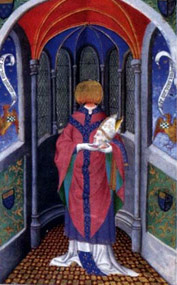
Novena to St. Dionysius, Holy Helper, from Oct. 1st - Oct. 9th. He is invoked for tranquility of conscience and against demonic possession. The Fourteen Holy Helpers The 1st Commandment 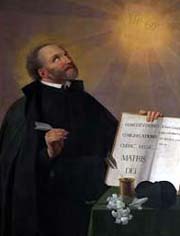
St. John Leonard, Confessor O God, Who vouchsafed to raise up blessed John, Thy Confessor, to spread the faith wondrously among the people, and to gather a new family in the Church to teach the faithful, grant to us Thy servants, that we may so benefit by what he has founded, that we may attain an eternal reward. Through our Lord Jesus Christ, Thy Son, Who liveth and reigneth with Thee in the unity of the Holy Ghost, one God, world without end. Amen. V. The Lord loved him, and adorned him. R. He clothed him with a robe of glory. Ant. I will liken him to a wise man that built his house upon a rock. (Roman Breviary) John Leonard was born of pious and respectable parents in the town of Diecimo, not far from the city Lucca. From very early childhood he showed himself mature and serious, with an inclination to solitude and prayer. When he was twenty-six years old God called him to enlist among the soldiers of the Church. John renounced immediately all his worldly interests. At first he had to study elementary Latin with little boys, but he soon advanced in a knowledge of literature, philosophy and theology. After scant four years, at the command of his superior, he was ordained to the priesthood. Soon afterward he and and a group of noble youths, alike inflamed with high ideals, earnestly set about attaining perfection in virtue. The following year they formed the Congregation of Clerks Regular of the Mother of God, a name chosen because of their intense devotion to her. John and his companions labored with such diligence in their care of souls, that before long a change of attitude was brought about. In the city state of Lucca, where through the perfidious wiles of the heretics, hateful passion burned fiercely among the citizens, where morals were corrupted, in a very short space of time the primitive piety of the Christian seemed to revive. In his work for the salvation of souls John met most bitter insults from wicked men who tried in every way to destroy the newly gathered family. But the man of God, bearing all things cheerfully and serenely, defended pertinaciously the fruit of his apostolic labors by securing from the Supreme Pontiff, Gregory XIII, papal approbation of his Congregation. Many bishops about to undertake difficult enterprises sought his advice and aid. Even the Holy Father delegated to him the solution of intricate litigation and the reform of religious societies. He stood in support of Saint Joseph Calasanctius when his society was on the verge of collapse. Scarcely less arduous were the honors John devoted to the affairs of the Hospital of the Holy Spirit in the English section of Rome, and to those of the convent of Saint Frances of Rome. Greatly saddened that so many peoples in far distant places were without the light of the Gospel, John burned with a desire to journey to those countries to spread the light of the true faith. But when Saint Philip Neri, who called John a true reformer, showed him that he and his Congregation were destined to educate the Italian people, John acquiesced to the will of God. He did not, however, refrain so completely that he did not try to do some work for the infidels. He is therefore, very rightfully credited along with the pioneer Vives with being the founder of the movement among the bishops to send well-qualified young men to distant, alien lands to propagate the faith. Wherefore he is very properly regarded as the author of that most illustrious institute which augments the work of the Sovereign Pontiffs and serves to spread the Catholic faith through the world. John wrote many works on theology and morality, well adapted to the men of that day. Finally in sack-cloth and ashes, lacking nothing in his sacred ministry, he passed to the Lord in Rome on October 9, 1609, at the age of sixty-six. |
October 10th, St. Francis Borgia, Confessor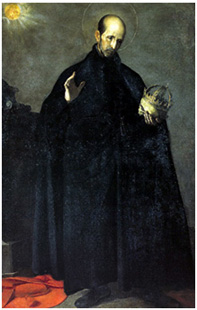 St. Francis Borgia, Confessor The Business of Life and Vanity of Earthly Things The Bad Death Death and the Importance of Salvation Meditations on Saving Your Soul: Will it be Heaven or Hell? Death-Bed Repentance St. Francis Borgia, Confessor O Lord Jesus Christ, the pattern and reward of true humility: we beseech Thee that, as blessed Francis was made to follow gloriously in Thy footsteps by spurning earthly honors, so thou wilt suffer us to become his companions both in following Thee and in his glory. Who liveth and reigneth with Thee in the unity of the Holy Ghost, one God, world without end. Amen. Ant. I will liken him to a wise man that built his house upon a rock. V. The Lord loved him and adorned him. R. He clothed him with a robe of glory. (Roman Breviary) Saint Francis Borgia, named for Francis of Assisi at his birth in 1510, was placed under the tutelage of his uncle, Archbishop of Saragossa, after the death of his mother when he was ten years old. Soon he had to go to the court of Spain, as he was destined to be one of the great lords of that nation. There he remained Christian, modest and virtuous. His noble and beautiful appearance soon brought upon him snares which he succeeded in escaping, setting for himself regimes of prayer and study to escape from the dangers. He wore a hair shirt, and never would enter into any of those games of chance which cause the loss not only of money but of time, the spirit of devotion, and peace of soul. The Empress arranged for him to marry Eleanor de Castro of Portugal, who like himself was very pious. They were blessed with eight children, five sons and three daughters, who continued to practice the virtue of their parents. Having become the Duke of Gandia after his father's death, he became one of the richest and most honored nobles in Spain. In 1539, there was laid upon him the sad duty of escorting the mortal remains of his once beautiful sovereign, the Empress Isabella, who had died still young, to the royal burial ground at Granada. The coffin had to be opened for him, that he might verify the body before it was placed in the tomb; and so unrecognizable, so astonishing a sight met his eyes that he vowed never again to serve any earthly sovereign, subject to so drastic and terrible a change. It was many years before he could follow the call of his Lord; the emperor named him Captain-General of Catalonia, and sent him to bring to justice a group of bandits who had ravaged the countryside. The poor found in him strong protection against oppression. Vices were banished by his ordinances; he endowed poor girls and assisted families ruined by misery and reversals; he delivered debtors from prisons by paying what they owed. He was in effect the very Christian Viceroy of the Emperor. Saint Francis was relieved of this duty when he asked the Emperor, after the death of his father, to return and govern his subjects at Gandia. In Gandia he again did much public good; he built monasteries, founded hospitals, helped the poor in every possible way. But suddenly, his wife was taken from him. He was told by God that this loss was for both his and her own advantage, and amid his tears he offered his own life and that of his children, if that would please the Eternal Master. After making a retreat according to the Exercises of Saint Ignatius, under Blessed Peter Favre, he made the vows of a Jesuit privately until he could see to the establishment of his children. When he went to Rome with one of them, it was rumored he would be made a cardinal like two of his brothers. But he wished to avoid all dignities, and succeeded in doing so by leaving Rome as soon as possible. Saint Ignatius made him his Vicar General for Spain, Portugal, and the East Indies, and there was scarcely a city of Spain and Portugal where he did not establish colleges or houses of the Company of Jesus. At the death of Saint Ignatius two years later, the Order chose him to be its General. Then his journeys became countless; to narrate them all would be an impossibility. The Turks were threatening Christendom, and Pope Saint Pius V commissioned two cardinal-legates to go and assemble the European Christian princes into a league for its defense. The holy Pope chose Francis to accompany one of the Cardinals and, worn out as he was, the Saint obeyed at once. The fatigues of the embassy exhausted what little life was left to him. Saint Francis died in the same year as Saint Pius V, happy to do so in the service of God and the Church, when he returned to Rome in October, 1572. |
October 11th, The Maternity of the Blessed Virgin Mary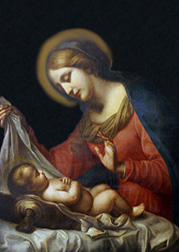 The Maternity of Mary Novena in Honor of the Materinity of the Blessed Virgin Mary: Oct. 3rd - Oct. 11th In Defense of Mary The Mother of God The Dogma of the Incarnation Rests on the Divine Maternity of the Blessed Virgin Mary Children's Sermon on the Maternity of Mary The Annunciation Two Short Sermons on the Benefits from the Incarnation October Meditations on the Holy Angels Related Links to the Maternity of Mary Mary, Full of Grace Mother of God: Devotion to the Blessed Virgin Mary The Espousal and Perpetual Virginity of the Blessed Virgin Mary The Life of the Blessed Virgin Mary, St. Joseph, St. Joachim and St. Anne, 1859 The Life of the Blessed Virgin Mary as Set Forth in Her Titles from the Litany of Loreto Litany of Loreto and Litany of Our Lady of Angels True Devotion to the Blessed Virgin Mary by St. Louis Marie de Monfort The Book of the Holy Rosary, as explained by the Church Fathers and prefigured in the Old Testament Joyful Mysteries Sorrowful Mysteries Glorious Mysteries The Little Office of the Blessed Virgin Mary, from Candlemas until Advent The Christian Mother What is it to be a Mother? Prayers for Catholic Mothers A Mother's Prayer for the Conversion of her child Religious and Moral Training of Children Instructions for the Catholic Family October 11th, The Maternity of the Blessed Virgin Mary O God, Who didst will that Thy Word should take flesh at the message of an Angel in the womb of the Blessed Virgin Mary: grant to us, Thy supplicants, that we, who believe her to be truly the Mother of God, may be helped by her intercession with Thee. Through our Lord Jesus Christ, Thy Son, Who liveth and reigneth with Thee in the unity of the Holy Ghost, one God, world without end. Amen. (Roman Breviary) In 1931, in commemoration of the fifteenth centenary of the Council of Ephesus, Pope Pius XI decreed that henceforth in the entire Church a Feast in honor of the Motherhood of Mary should be established on the eleventh of October. The history behind the Feast is of interest. In 431, in Ephesus, a great council of the Bishops met in the Church of Mary, the Mother of God, to assert the Catholic faith in the Person of Jesus Christ, true God and true man. This was done to offset and denounce the false teaching of Nestorius, who asserted that Christ was a mere man but united to God. He taught that Jesus of Nazareth and the Word of God are two distinct persons. As a consequence of this teaching, it was held that Mary was only the mother of the human person, Christ. Of course, the Council of Ephesus gave out the true teaching as we find it today, for example in the Anthanasian Creed: "This is true faith, to believe and confess that Our Lord Jesus Christ is God and man. Although at the same time God and man, yet He is one and the same Person." It follows from this, that Mary, in becoming the human mother of the Person Christ is the Mother of God. Pius XI commended mary and the Holy Family of Nazareth as models of the dignity and holiness of chaste wedlock, and as patterns of the holy education of youth. |
October 13th, Anniversary of the Final Apparition of Our Lady of Fatima

Our Lady of Fatima Our Lady of Fatima: Novena Oct. 5th - Oct. 13th Mary's Fatima Message. Peace and Devotions by Fr. Lovasik, 1955 Fatima: Peace on Earth; A Catholic Russia; Peace of Mind Immaculate Heart of Mary The Sight of Hell, A Book for Children and Young Persons as well as Adults The Necessity of Prayer for Sinners Our Lady Refuge of Sinners True Conversion: One of the best sermons for hardened sinners The Conversion of Sinners |
October 14th, St. Callistus I, Pope and Martyr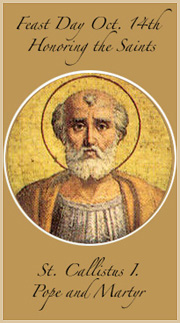
St. Callistus I, Pope and Martyr O God Who seest that we fall from our very own weakness; mercifully restore us to Thy love by the example of Thy Saints. Through our Lord Jesus Christ, Thy Son, Who liveth and reigneth with Thee in the unity of the Holy Ghost, one God, world without end. Amen. (Roman Breviary) Early in the third century, it was to Callistus, then a deacon, that Pope Saint Zephyrinus confided the government of the clergy, as well as the creation and maintenance of the Christian cemeteries, which at that time were the catacombs of Rome. At the death of the Sovereign Pontiff, Callistus succeeded him as Head of the Church. It is he who made obligatory for the entire Church, the fast of the Ember Days which the Apostles had instituted, to bring down blessings on each season of the year. During his time, the Christians began to build churches, which though destroyed during the various persecutions, were eventually rebuilt. Among the catacombs owed to his government, is the one on the Appian Way which bears his name. Many precious memories are conserved there; in it are found the tomb of Saint Cecilia, the crypts of several popes, and paintings which attest the perfect conformity of the primitive Faith with that of the present-day Church. During the pontificate of Saint Callistus, several very striking conversions occurred among the very officers of the persecuting emperor Alexander Severus. At one time an officer, his family and household, forty-two persons in all, were baptized by the Pope on the same day. Many others asked him for Baptism; among them a Senator and sixty-eight persons of his household, and a guardian of the saintly Pope, whose name was Privatus, after the prayers of the Holy Father had cured him of an ulcer. All these new Christians were martyred, and their heads were exposed at the various gates of Rome to discourage any who would propagate the Faith of Christ in that city. Despite the continuing pursuits and his constant solicitude for all the churches, Saint Callistus found the means to have a diligent search made by fishermen for the body of a priest of his clergy, which had been cast into the Tiber after his martyrdom. When it was found he was filled with joy, and buried it with hymns of praise. During the persecution Saint Callistus was obliged to take shelter in the poor and populous quarters of the city. The martyred priest, Calipodius, appeared to him soon afterwards, saying: "Father, take courage; the hour of the reward is approaching; your crown will be proportionate to your sufferings." Soon afterwards he was discovered there, and the house was guarded by soldiers who received the order to allow no food to enter it for several days. And Saint Callistus was martyred in his turn. With a rock suspended from his neck, he was thrown from a window into a well on October 14, 223. The priest Asterius recovered and buried his body in the catacomb named for Calipodius. A week later Asterius too was arrested and thrown into the Tiber. The Christians interred this martyr also. |
October 15th, St. Teresa, Virgin
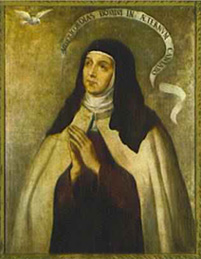
St. Teresa of Avila The Spirit of St. Teresa St. Teresa of Avila's combat with Satan & encounter with hell Novena to St. Teresa of Jesus: Oct. 7th - Oct. 15th Short Sermons on Prayer: Necessity of Prayer Attention in Prayer Conditions of Prayer Fervour in Prayer Mental Prayer St. Teresa of Avila, Virgin Graciously hear us, O God our salvation: and grant that we who are gladdened by the festival of blessed Teresa, Thy Virgin, may be fed with the food of her heavenly teaching, and may learn from her, loving devotion to Thee. Through our Lord Jesus Christ, Thy Son, Who liveth and reigneth with Thee in the unity of the Holy Ghost, one God, world without end. Amen. V. Grace is poured out on thy lips. R. Therefore hath God blessed thee forever. Ant. Come, Spouse of Christ, receive the crown, which the Lord hath prepared for thee for all eternity. (Roman Breviary) "By their fruits you will know them," says Our Lord of those who claim to be His followers. The fruits which remain of the life, labors and prayer of Saint Teresa of Avila bear to her virtue a living and enduring testimony which none can refuse to admit. She herself wrote her life and many other celebrated spiritual works, and much more can still be said of this soul of predilection, whose writings and examples have led so many souls to high sanctity. Born in 1515 in the kingdom of Castile in Spain, she was the youngest child of a virtuous nobleman. When she was seven years old, Teresa fled from her home with one of her young brothers, in the hope of going to Africa and receiving the palm of martyrdom. Brought back and asked the reason for her flight, she replied: "I want to see God, and I must die before I can see Him." She then began, with her same brother, Rodriguez, to build a hermitage in the garden, and was often heard repeating: "Forever, forever!" She lost her mother at the age of twelve years, and was led by worldly companions into various frivolities. Her father decided to place her in a boarding convent, and she obeyed without any inclination for this kind of life. Grace came to her assistance with the good guidance of the Sisters, and she decided to enter religion in the Carmelite monastery of the Incarnation at Avila. For a time frivolous conversations there, too, checked her progress toward perfection, but finally in her thirty-first year, she abandoned herself entirely to God. A vision showed her the very place in hell to which her apparently light faults would have led her, and she was told by Our Lord that all her conversation must be with heaven. Ever afterwards she lived in the deepest distrust of herself. When she was named Prioress against her will at the monastery of the Incarnation, she succeeded in conciliating even the most hostile hearts by placing a statue of Our Lady in the seat she would ordinarily have occupied, to preside over the Community. God enlightened her to understand that He desired the reform of her Order, and her heart was pierced with divine love. The Superior General gave her full permission to found as many houses as might become feasible. She dreaded nothing so much as delusion in the decisions she would make in difficult situations; we can well understand this, knowing she founded seventeen convents for the Sisters, and that fifteen others for the Fathers of the Reform were established during her lifetime, with the aid of Saint John of the Cross. To the end of her life she acted only under obedience to her confessors, and this practice both made her strong and preserved her from error. Journeying in those days was far from comfortable and even perilous, but nothing could stop the Saint from accomplishing the holy Will of God. When the cart was overturned one day and she had a broken leg, her sense of humor became very evident by her remark: "Dear Lord, if this is how You treat Your friends, it is no wonder You have so few!" She died October 4, 1582, and was canonized in 1622. The history of her mortal remains is as extraordinary as that of her life. After nine months in a wooden coffin, caved in from the excess weight above it, the body was perfectly conserved, though the clothing had rotted. A fine perfume it exuded spread throughout the entire monastery of the nuns, when they reclothed it. Parts of it were later removed as relics, including the heart showing the marks of the Transverberation, and her left arm. At the last exhumation in 1914, the body was found to remain in the same condition as when it was seen previously, still recognizable and very fragrant with the same intense perfume. |
October 16th, St. Hedwig, Widow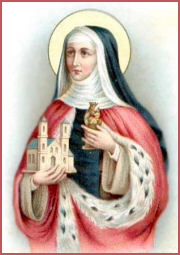
St. Hedwig, Widow The Corporal Works of Mercy The Spiritual Works of Mercy The Thought of Eternity On Resignation to the Will of God in All of Our Sufferings On Conformity to the Will of God and the Motives that Oblige Us The Providence of God and why He permits evil St. Hedwig, Widow O God, Who didst teach blessed Hedwig to renounce the pomps of this world with all her heart so that she might humbly follow Thy cross: grant that, through her example and merits, we may learn to trample under foot the perishable delights of this world, and by clinging to Thy cross, may overcome all thins that war against us. Who liveth and reigneth with Thee in the unity of the Holy Ghost, one God, world without end. Amen. (Roman Breviary) Saint Hedwig was the wife of Henry, Duke of Silesia and Poland, and the mother of six children. To one of her sisters, married to the King of Hungary, was born the future Saint Elizabeth of Hungary; another was the wife of Philip-Augustus of France, and the third, Abbess of a celebrated monastery at Lutzingen. Saint Hedwig led a humble, austere, and holy life amid all the pomp of her royal state. While still young, she and her spouse made a solemn vow of chastity, ratified by their bishop. Her house was a school of piety and good order; with Duke Henry she built the large monastery of Trebnitz, where she placed nuns of the Order of Citeaux. Inspired by these holy examples, the Secretary of State of the Duke and Duchess left the court and dedicated all his wealth to the construction of a Cistercian monastery, which he then entered, to spend there the rest of his life. Saint Hedwig attended to the needs of all the monasteries and the hermits of the region, visiting them herself and taking them clothing, food and all she judged necessary. She visited prisoners and saw that they did not suffer from the cold or from lack of light. She cared for the poor and served them herself in her residence. On Holy Thursday she washed the feet of several lepers, remembering the lessons of Our Saviour. She fasted often and walked barefoot in the snow when she prayed; she slept on the ground. Devotion to the Blessed Sacrament was the keynote of her life. She considered it her very great privilege to supply the bread and wine for the Sacred Mysteries, and each morning would attend as many Masses as were celebrated. After the death of her husband in 1238, she retired to the Cistercian convent of Trebnitz, where she lived under obedience to her daughter Gertrude, abbess of that monastery, growing day by day in holiness, until God called her to Himself in the year 1243. She was canonized twenty-four years later, by Pope Clement IV. This Pontiff, during the ceremony of her canonization, asked God through her intercession to cure a girl who was blind, and the cure was immediately effected. Saint Hedwig is buried in the church of Trebnitz. |
October 17th, St. Margaret Mary Alacoque, Virgin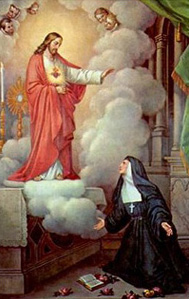 Life of Blessed Margaret Mary Alacoque St. Margaret Mary Alacoque I. St. Margaret Mary Alacoque II. Novena to St. Margaret Mary Alocque: Oct. 9th - Oct. 17th Devotions to the Sacred Heart Consecration of Children to the Sacred Heart of Jesus The Novena to the Sacred Heart of Jesus along with many wonderful prayers and devotion can be found in the following book: The Manual of the Sacred Heart The Manual of the Sacred Heart Related Links: Litany of the Sacred Heart for each day of the week Feast of the Sacred Heart Feast of the Sacred Heart: Sermons by Fr. Weninger Spiritual Communion St. Margaret Mary Alacoque, Virgin O Lord Jesus Christ, Who didst wondrously reveal to the Virgin blessed Margaret Mary, the unsearchable riches of Thy heart: grant by her merits, that we who love Thee after her example in all things and above all things, may obtain an everlasting abode in Thy heart. Who liveth and reigneth with Thee in the unity of the Holy Ghost, one God, world without end. Amen. V. With thy comeliness and thy beauty. R. Set out, proceed prosperously, and reign. Ant. Come, Spouse of Christ, receive the crown, which the Lord hath prepared for thee for all eternity. (Roman Breviary) Saint Margaret Mary, a soul of divine predilection, was born at Terreau in Burgundy, on July 22, 1647. During her infancy she showed a wonderfully sensitive revulsion to the very idea of sin, and while still a young child always recited the entire Rosary every day. She lost her father at the age of eight years, and her mother placed her with the Poor Clares. She was often sick and for four years was bedridden, losing almost entirely the use of her members. She made a vow to Our Lady to become one of Her daughters if She cured her, and was suddenly entirely well. She was of a happy temperament and her heart became easily attached to human affections. God began her purification when the charge of her mother's house was confided to persons who reduced the family to a sort of servitude. Margaret Mary turned to God for strength and consolation when she was accused of various crimes she had not committed. In short, the Saint of the Sacred Heart learned to suffer for Christ, with patience, what innocence can suffer in such situations. She desired to be a religious, but her mother could not bear to hear a word of that desire. Finally God came to her assistance through a Franciscan priest, who told her brother that he would answer to God for the vocation of his sister. In 1671 she entered the Order of the Visitation of Mary, at Paray-le-Monial, and was professed the following year. She followed all the practices of the monastery in perfect obedience, spending as much time as she could in the chapel with her Lord. After sanctifying her by many trials, Jesus appeared to her in numerous visions, displaying to her His Sacred Heart, sometimes burning as a furnace, and sometimes torn and bleeding on account of the coldness and sins of men. "Behold this Heart which has so loved men, and been so little loved by them in return!" In 1675, she was told by Our Lord that she, with the aid of Father Claude de la Colombiere of the Society of Jesus, was to be His instrument for instituting the feast of the Sacred Heart, and for spreading that devotion everywhere. This was not accomplished without great sufferings. The good Jesuit did all in his power to make known and loved the Heart of Jesus, but when it seemed all obstacles were about to disappear, his credit diminished, and his Superiors sent him to England. He returned to France exhausted and soon died. Saint Margaret Mary was for a time Mistress of Novices, and in this office exercised a true apostolate, working to win for the Heart of Jesus the hearts of the young girls who were aspiring to religious consecration. She was persecuted when she sent one of them home, not having seen in her the indications of a genuine vocation; the family attempted to have her deposed. She remained in the charge but was deprived of Holy Communion on the First Friday of the month. This practice was one of Our Lord's specific requests; for souls who communicate nine First Fridays in succession, He promised the most wonderful graces. The demons also persecuted her visibly; nonetheless her entire Community was finally won over to devotion to the Divine Heart. |
October 18th, St. Luke, Evangelist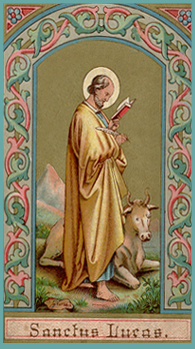 St. Luke, the Evangelist The Labor of the Apostles: Their Teaching of the Nations Ave Maria The Angelus: Prayer, Explanation, Indulgences 30 Days Prayer to the Blessed Virgin Mary The Life of Our Savior Jesus Christ, from the Four Gospels, as Illustrated by James Tissot Vol. 1, Part 1: The Holy Childhood of Jesus from the Latin Vulgate, as Illustrated by Catholic Artist and Historian, James Tissot, 1899 Vol. 1, Part 2: The Ministry of Jesus Christ, as Illustrated by Catholic Artist and Historian, James Tissot, 1899 Vol. 2: Parables and Teachings of Jesus Christ, as Illustrated by Catholic Artist and Historian, James Tissot, 1899 Vol. 3: Holy Week and the Passion of Jesus Christ, as Illustrated by Catholic Artist and Historian, James Tissot, 1899 Vol. 4 Part 1: The Passion Continued and the Death of Jesus Christ, as Illustrated by Catholic Artist and Historian, James Tissot, 1899 Vol. 4 Part 2:The Resurrection and Ascension of Jesus Christ, as Illustrated by Catholic Artist and Historian, James Tissot, 1899 Catholic Bible Stories Jesus of Nazareth, the Story of His Life: A Catholic Children's Book, 1906 Index of Prayers and Devotions for the Sick Related Links: Refuting Protestant Errors of Private Interpretation A Series of Sermons in Defense of the Catholic Teaching on Oral Tradition, the Word of God, and Errors of Private Interpretation Are we bound to profess our Catholic Faith openly? St. Luke, Evangelist Grant us, O Lord, we beseech Thee, the intercession of blessed Luke the Evangelist, who for love of Thy holy name bore continually in his body the mortification of the cross. Through our Lord Jesus Christ, Thy Son, Who liveth and reigneth with Thee in the unity of the Holy Ghost, one God, world without end. Amen. R. There are they who, living in the flesh, planted the Church in the their blood: They drank the chalice of the Lord, and became the friends of God. V. Their sound hath gone forth into all the earth, and their words unto the ends of the world. (Roman Breviary) Saint Luke, a physician at Antioch and a painter, was also an excellent rhetorician in Greek, his native language. He became a disciple of Saint Paul, the Apostle's fellow-worker and his faithful friend during his two imprisonments, and is best known to us as the historian of the New Testament acts of both Christ and the Apostles. Though not an eye-witness of Our Lord's life, the meticulous Evangelist diligently gathered information from those who had followed or listened to Jesus of Nazareth, and wrote, as he tells us, all things in order. His command of Greek is much admired. Saint Clement of Alexandria, Saint Jerome and Saint Thomas Aquinas state that it is he who translated Saint Paul's famous Epistle to the Hebrews, written in the language of the Jerusalem Christians, into the admirable Greek which we presently possess as the only ancient version. The Acts of the Apostles were written by the Evangelist as a sequel to his Gospel, bringing the history of the Church down to the first imprisonment of Saint Paul in Rome, in the year 64. The humble historian never names himself, but by his occasional use of "we" instead of "he" or "they", we are able to detect his presence in the scenes of Saint Paul's life which he describes. We thus find that he sailed with Paul and Silas from Troas to Macedonia, where he remained behind, apparently, for seven years at Philippi. Finally, after remaining near Saint Paul during the time he was imprisoned in Palestine, he accompanied him, still a prisoner, when he was transported to Rome. Thus he shared the shipwreck and perils of that memorable voyage, narrated in Chapter 27 of Acts--which book no Christian should fail to read, along with the four Gospels. He then narrates the two years of Saint Paul's first imprisonment, ending in his liberation. There his narrative ends, but from Saint Paul's Epistles we learn that Saint Luke was his faithful companion to the last. His paintings of Our Lady are still conserved with care in a number of places in Europe. Saint Luke certainly learned from the Mother of Christ Herself, the story of the Annunciation, the Visitation, and the Angelic mission to the shepherds of Bethlehem. After the martyrdom of the Apostle to the Gentiles, Saint Epiphanus says that Saint Luke preached in Italy, Gaul, Dalmatia and Macedonia. Others say he went to Egypt and preached in the Thebaid, the region of the Fathers of the desert. Saint Hippolyte says he was crucified in Greece. His mortal remains were transferred to the Church of the Apostles, built by Constantine the Great at Constantinople, with those of Saint Andrew and Saint Timothy. Some of his relics remain in the Greek monastery of Mount Athos. |
October 19th, St. Peter of Alcantara, Confessor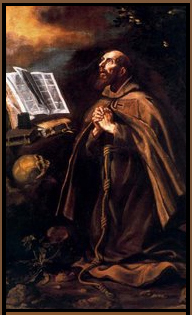 St. Peter of Alcantara, Confessor The Life of St. Peter Alcantara and his Golden Treastise of Mental Prayer What we should pray for Sermon on Prayer Short Sermons on Prayer: Necessity of Prayer Attention in Prayer Conditions of Prayer Fervour in Prayer Mental Prayer How to Fast from the Heart Litany of Penance The Necessity of Mortification Two Short Sermons: One Thing Necessary and Strive to Enter by the Narrow Gate Spiritual Communion St. Peter of Alcantara, Confessor O God Who didst vouchsafe to make blessed Peter, Thy Confessor, illustrious by the grace of marvelous penance and lofty contemplation: grant, we beseech Thee, that, by his merits which plead for us, we may so mortify our bodies as to embrace the more readily the things of heaven. Through our Lord Jesus Christ, Thy Son, Who liveth and reigneth with Thee in the unity of the Holy Ghost, one God, world without end. Amen. Ant. I will liken him to a wise man that built his home upon a rock. V. The Lord loved him and adorned him. R. He clothed him with a robe of glory. (Roman Breviary) Saint Peter was born in 1499 near the Portuguese border of Spain. While still a youth of sixteen, he left his home at Alcantara and entered a convent of Discalced Franciscans near Valencia. He rose quickly to high posts in the Order, as a guardian, a definitor, and then Superior of the Province of Saint Gabriel. But his thirst for penance was still unappeased, and in 1539, being then forty years old, he founded the Congregation of Saint Joseph of the "Strict Observance," to conserve the letter of the Rule of Saint Francis. He suffered great tribulations to conserve that Rule in its integrity. Eventually Saint Peter himself, the year before his death, raised it to the status of a province under obedience to the Minister General of the entire Seraphic Order. The Reform he instituted has since been extended even to the farthest Orient and the Indies; it is believed God ordained that it repair the ravages to the faith of the sixteenth century. The modesty of Saint Peter remains proverbial in the Franciscan Order; never did he raise his eyes to look at the non-essentials of his interior life with God. His fast was constant and severe; he lived perpetually on bread and water alone, even during his illnesses. He devised a sort of harness to keep him upright on his seat during the short hour and a half of sleep which he took every day, for forty years. He acknowledged to Saint Teresa of Avila that this mortification was the one which cost him the most. The cells of the friars of Saint Joseph resembled graves rather than dwelling-places. That of Saint Peter himself was four and a half feet in length, so that he could never lie down; his sackcloth habit and a cloak were his only garments; he never covered his head or feet. In the bitter winter he would open the door and window of his cell in order that, by closing them again, he might be grateful for the shelter of his cell. Among those whom he guided to perfection we may name Saint Teresa, who fully appreciated this remarkable director. He read her soul, approved her spirit of prayer, and strengthened her to carry out her reforms. Everywhere he could do so, he planted crosses, for the Passion of Our Lord was engraved in his heart. Wherever they were to be placed, even on mountains, and however heavy they might be, he went to the destined sites carrying them on his shoulders. From these heights he would then preach the mysteries of the Cross, afterwards remaining in prayer there. Shepherds saw him several times in the air, at the height of the highest trees of the forests. Never did he go anywhere except on foot, even in his old age. He was often seen prostrated before a large crucifix, shedding torrents of tears; and he was found in ecstasy once at the height of the traverse of a crucifix. Saint Peter died at the age of sixty-three, repeating with the Psalmist, "I rejoiced when it was said unto me, let us go unto the house of the Lord!" The date was October 18, 1562; he was kneeling in prayer. |
October 20th, St. John Cantius, Confessor
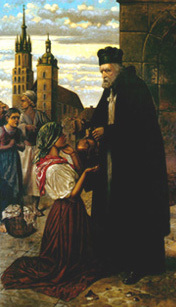 St. John Cantius, Confessor The Corporal Works of Mercy On the Mode of Teaching Christian Doctrine to Children St. John Cantius was devoted to Passion of Christ. The Litany of the Passion is included in the following link. The Passion of Christ St. John Cantius, Confessor Grant, we beseech Thee, Almighty God, that by the example of thy Confessor John, we may advance in the science of the saints, and by showing mercy to others, through his merits win forgiveness from Thee. Through our Lord Jesus Christ, Thy Son, Who liveth and reigneth with Thee in the unity of the Holy Ghost, one God, world without end. Amen. Ant. This man, despising the world and triumphing over earthly things, hath laid up treasure in heaven by world and deed. V. The Lord conducted the just through the right ways. R. And showed him the kingdom of God. (Roman Breviary) Saint John was born at Kenty in Poland in 1403. He studied philosophy and theology at the University of Cracow with great intelligence, industry, and success, while his modesty and virtue drew all hearts to him. After earning his degrees, he was appointed to the Chair of Theology at the university. He inflamed his hearers with the desire of every kind of piety, no less by his deeds than by his words. He was ordained a priest and was for a short time in charge of a parish, where he manifested great concern for the poor, at his own expense. At the University's request, he resumed the professor's Chair and taught there until his holy death. He found a poor man on the snow one day, dying of hunger and cold; he clothed him in his own frock and took him to the rectory, to eat at his table. Afterwards, for many years, every professor of the College of Varsovie was obliged, once every year, to invite a poor man to dine with him. He made a pilgrimage to Jerusalem, preaching along the way to the Turks, and hoping for the grace of martyrdom. He went four times to Rome to visit the tombs of the Apostles and pay honor to the Holy See, desiring thereby to be spared the pains of purgatory. He always traveled on foot, carrying his own effects. Robbed one day by bandits, he forgot he had a few gold pieces sewn into his cloak; he soon remembered and called them back to give them to his benefactors. They were so astonished they refused to accept the offering, and even returned to him what they had taken. Saint John Cantius wrote on the walls of his residence some verses which showed the horror he had for the vice of backbiting or detraction, talking without cause of our neighbor's faults. He slept very little and often spent entire nights praying before a crucifix. After his classes he went to pray before the Blessed Sacrament in a church. Before his death, he gave absolutely everything he still had to the poor. He died in 1473, at the age of seventy-six years. The purple robe which he had worn as a Doctor was religiously conserved and always given to the venerable Head of the School of Philosophy on the day of his reception; and a promise was required of the teachers there, to imitate the virtues of this beloved Saint. He is a patron of both Poland and Lithuania; Clement XIII canonized him in 1767. |
October 21st, St. Hilarion, Abbot; St. Ursula and Companions, Virgins and Martyrs 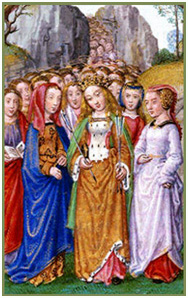 Related Links for St. Ursula St. Ursula and Companions, Virgins and Martyrs Holy Purity Prayers for the Preservation of Chastity. An Explanation and Defense of the Virtue of Chastity Grant, we beseech thee, O Lord our God, that we may reverence with unceasing devotion the triumphs of the holy Virgins and Martyrs Ursula and her Companions: and although we cannot pay them the honor that is their due, let us at least present to them our humble service. Through our Lord Jesus Christ, Thy Son, Who liveth and reigneth with Thee in the unity of the Holy Ghost, one God, world without end. Amen. (Roman Breviary) Saint Ursula was born in Great Britain of Christian parents; her father, Maurus, was king of Cornubia in Scotland. Ursula was sought in marriage by a young pagan prince, but had already vowed her life and her heart to Jesus Christ. In the year 383 she was boarded onto a boat with a large number of young girls and Christian women whom a Roman conqueror wished to give as wives to his soldiers, after having endowed them with rich terrains. But during the crossing of the Channel a storm arose, and the ships, instead of reaching western Gaul, were driven towards the mouth of the Rhine. The Huns who at that time were ravaging Europe saw the ships, and were making ready to pillage them and inflict on these virgins and women a dishonor more dreaded by them than death. Commanded by Ursula, they resisted heroically and so well that suddenly the sentiments of the barbarians changed. They took up their arms to be rid of this peaceful army. Soon the victims fell under the blows of the executioners, and their souls winged their way to heaven. The prince of the Huns, struck by Ursula's beauty, spared her at first; he tried to console her for the death of her companions and promised to marry her. When she did not assent he shot her with an arrow, and this consecrated virgin fell with the others. She was considered the leader of the eleven thousand brought by the Romans from Great Britain. Many churches have relics of this army of martyrs, but no region is more richly endowed than that of Cologne, since it is to that city that the Christians of the region devotedly carried the mortal remains of the martyrs. In the seventh century a magnificent church rose over their tomb, whose walls itself served as reliquaries. This holy cemetery has been rendered illustrious by many miracles. Pilgrims and especially young girls have come from all over Europe, to beg protection for their virginity from Saint Ursula and her companions. The very arrow which pierced Saint Ursula is still conserved there. A religious, who had great devotion to these martyrs, had fallen dangerously ill; a virgin appeared to him and said: "I am one of the virgins whom you honor. To reward you for the eleven thousand Our Father's you recited to honor us, you will have our assistance at the hour of death." And soon the glorious troop came to escort his soul. Saint Ursula is the patron of young teachers, and many congregations of nuns, dedicated to education, bear her name. October 21st, St. Hilarion, Abbot St. Hilarion Abbot St. Hilarion's miracles and combats with devils as written by St. Jerome The Bad Death Part 2: Lead us not into Temptation Part 3: Temptations and the Devils who Tempt Beware if you have no Temptations Part 5: The Devils Plan to Ruin Souls and the Protection of the Holy Angels Moral Teaching on Unchaste Thoughts and Desires May the intercession of the blessed Abbot Hilarion procure favor for us, we beseech Thee, O Lord: that we may gain, by his patronage, those things of which we are not capable by our own merits. Through our Lord Jesus Christ, Thy Son, Who liveth and reigneth with Thee in the unity of the Holy Ghost, one God, world without end. Amen. Ant. O ye wise Virgins, trim your lamps: behold the Bridegroom cometh, go ye forth to meet Him. V. After her shall Virigns be brought to the King. R. Her neighbors shall be brought to thee. (Roman Breviary) Saint Hilarion was born of pagan parents near Gaza, and was converted while studying grammar in Alexandria. He renounced games, the theater and all the vain amusements of young people, to attend the reunions of his fellow Christians. He desired to see the great Saint Anthony in the desert and went to Egypt, where he remained near him for two months. He carefully observed everything in his life and conduct -- his affability, his gentleness towards others and his severity towards himself, then returned to Palestine with a few solitaries to settle his affairs. His father and mother had both died, and he kept nothing of his heritage for himself. At this time he was only fifteen years old. Despite his youth and delicate health, he retired to a desert; he practiced severe mortification, tempted continually by the demons expending all their efforts to make him abandon this life of total renouncement. He redoubled his austerities, tilled the ground and, following the example of the Egyptian monks, made baskets of reeds and willow branches. He lived first in a cabin of reeds, then in one of clay, so low and narrow that it seemed more like a tomb than a lodging for a young man. He learned all of Holy Scripture by heart and repeated it with admirable devotion. When thieves approached him one day he told them he did not fear them, because he had nothing to lose, and death did not alarm him since he was ready to die. They were so touched by his answers they promised him to abandon their life of pillage. He soon began to work miracles by his prayers, and visitors made their way to his former solitude. Several remained nearby to become his disciples, and thus gave rise to the monastic life in Palestine, of which Hilarion is regarded as the founder. Saint Anthony esteemed him highly, sometimes wrote him letters, and sent to him the sick persons who came to him from Syria, telling them they had no need to make so long a journey. Saint Hilarion was a master exorcist and healer of all illnesses, but he refused all remuneration for his assistance, saying to his visitors from the city that they were better placed than he to distribute in alms the money they were offering him. Frequently the scattered solitaries of Palestine came to him to listen to his instructions, and he also visited them. The pagans too gathered around him. His exhortations to abandon idolatry were so powerful that on one occasion a group of Saracens promised to convert, asking him to send them a priest to baptize them and establish a church. One day, accompanied by three thousand persons who were following him, he blessed the vine of a solitary who received him. The vine furnished a triple harvest and all in the crowd were well nourished. Saint Hilarion found his solitude transformed into a city, and decided at the age of sixty-five to go elsewhere. His Palestinian disciples attempted to change his mind without success, and taking with him only forty monks, he set out for Egypt on foot. Saint Anthony had recently died, and he wished to visit the places where he had dwelt. After spending some time in Egypt, he went with only two religious to a village a few days' distance from Babylon. He remained only a short time there also, afterwards going elsewhere, and everywhere assisting those who had recourse to his prayers. In Sicily he delivered a demoniac, and then a crowd came to surround him once again. In Dalmatia he worked still more miracles, and saved a city from being engulfed by tidal waves raised by an earthquake. These traditions are still alive in the regions where he passed. He tried many times to live unknown but never could succeed. Saint Hilarion died in 372 on the island of Cyprus, at the age of seventy years. His last words were: "Go forth, my soul; why dost thou doubt? Nigh seventy years hast thou served God, and dost thou fear death?" His body was found incorrupt some time afterwards, and was transported to Palestine to his original monastery. Saint Jerome was his original biographer. |
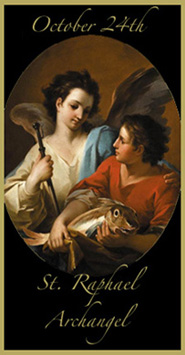 St. Raphael, Prayer Devotions and Novena St. Raphael Additional Prayers Litany of the Holy Angels Homilies on the Book of Tobias The Three Archangels and the Guardian Angels in Art, 1899 Twelve Months Sanctified by Prayer, October--Dedicated to the Angels Angels in the Liturgy Devotions to the Guardian Angels Your Guardian Angel throughout Life The Spiritual Combat Meditations on the Holy Angels Good and Bad Angels Guardian Angels The Disposition Necessary for a Happy Marriage St. Raphael the Archangel O God, Who gave blessed Raphael the Archangel to Tobias as his traveling companion, grant to us Thy servants that we also may be guarded by his care and receive the protection of his assistance. Through our Lord Jesus Christ, Thy Son, Who liveth and reigneth with Thee in the unity of the Holy Ghost, one God, world without end. Amen. Ant. The angel Raphael was sent unto Tobias and Sara, to cure them. The angel being entered in unto Tobias, saluted him, and said: Joy be ever with thee. Be of good cheer. Tobias: for in a short time thou shalt be healed of God. Bless ye the God of heaven, and confess to him in sight of all the living, for he hath wrought His mercy towards you. Peace be unto you, fear not; bless ye God, and sing unto Him. (Roman Breviary) This holy Archangel identified himself to the exiled Jew Tobias as "one of the Seven who stand before God" (Tob. 12:15). His name means the healing of God, and he is thought to be the Angel who came down and agitated the water of the pool of Bethsaida in Jerusalem. The sick, who always lay around the pool, strove to be the first to enter the water afterwards, because that fortunate one was always cured. We read of this in the story of the paralytic cured by Jesus, who had waited patiently for thirty-eight years, unable to move when the occasion presented itself. (Cf. John 5:1-9) Saint Raphael is best known through the beautiful history of the two Tobias, father and son, exiled to Persia in the days of the Assyrian conquest in the eighth century before Christ. In their story, the Archangel plays the major role. The father Tobias was a faithful son of Jacob and was old and worn out by his manifold good works; for many years he had assisted his fellow exiles in every possible way, even burying the slain of Israel during a persecution by Sennacherib, and continuing this practice despite the wrath that king manifested towards him. Having been stripped of all his possessions, he desired to have his son recover a substantial sum of money he had once lent to a member of his family in a distant city. He needed a companion for the young Tobias. God provided that guide in the Archangel Raphael, whom the son met providentially one day, in the person of a stranger from the very area where he was to go, in the country of the Medes. Raphael to all appearances was a young man like himself, who said his name was Azarias (Assistance of God). Everything went well, as proposed; the young Tobias recovered the sum and then was married, during their stay in Media, to the virtuous daughter of another relative, whom Providence had reserved for him. All aspects of this journey had been thorny with difficulties, but the wise guide had found a way to overcome all of them. When a huge fish threatened to devour Tobias, camped on the shores of the Tigris, the guide told him how to remove it from the water, and the fish expired at his feet; then remedies and provisions were derived from this creature by the directives of Azarias. When the Angel led Tobias for lodging in the city of Rages, to the house of his kinsman Raguel, father of the beautiful Sara, the young man learned that seven proposed husbands had died on the very day of the planned marriage. How would Tobias fare? The Angel reassured him that this would not be his own fate, and told him to pray with his future spouse for three nights, that they might be blessed with a holy posterity. Sara was an only daughter, as Tobias was an only son, and she was endowed with a large heritage. During the absence of the young Tobias, his father had become blind when the droppings of a pigeon had fallen into his eyes. When the two travelers returned after an extended absence, which had cost his mother many tears, the young Tobias was deeply grieved to find his father unable to see him and his new daughter-in-law. But Raphael told the son how to cure his father's blindness by means of the gall of the fish; and after the remedy had proved efficacious, all of them rejoiced time in their blessings. When Tobias the son narrated his story and told his father that all their benefits had come to them through this stranger, both father and son wished to give Azarias half of the inheritance. Raphael declined and revealed his identity, saying he was sent to assist the family of the man who had never failed to obey and honor the blessed God of Israel. Raphael, before he disappeared, said to the family: "It is honorable to reveal and confess the works of God. Prayer is good, with fasting and alms, more than to lay up treasures, for alms deliver from death and purge away sins, and cause the giver to find mercy and life everlasting... When thou didst pray with tears and didst bury the dead, and didst leave thy dinner to hide the dead by day in thy house, and bury them by night, I offered thy prayer to the Lord. And because thou wast acceptable to God, it was necessary that trials prove thee . . . I am the Angel Raphael, one of the seven who stand before the Lord." |
October 25th, Sts. Chrysanthus and Daria, Martyrs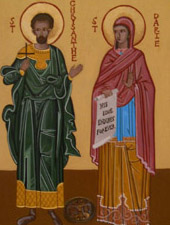 Ss. Chrysanthus and Daria, Martyrs Prayers for the Preservation of Chastity. An Explanation and Defense of the Virtue of Chastity Moral Teaching on Unchaste Thoughts and Desires The Folly of Impure Desires of Sensual Pleasures The False Peace of a Sinful Conscience, by Fr. Hunolt, 1691-1746 The Necessity of Mortification Sts. Chrysanthus and Daria, Martyrs May the prayers of Thy Blessed Martyrs, Chrysanthus and Daria be with us, we beseech Thee, O Lord, and may we who honor them by this service continually enjoy their loving help. Through our Lord Jesus Christ, Thy Son, Who liveth and reigneth with Thee in the unity of the Holy Ghost, one God, world without end. Amen. (Roman Breviary) Chrysanthus was the son of a Roman senator, born in Egypt. While still young he went with his father to Rome, where his superior intelligence was quickly appreciated. Convinced of the vanity of idol-worship, he undertook every means at his disposition to learn the truth and deliver his soul from the doubts afflicting him. An elderly gentlemen was pointed out to him as a sage, and Chrysanthus went to him with his questions. The old man, who was a Christian, had no difficulty in opening the eyes of the young neophyte; Chrysanthus instantly embraced the truth with ardor and became an apostle. His father, at first astonished, became irritated and decided to bring his son back from what he called his superstitions and errors. No means were effectual for this purpose. Thus, influenced by his associates, the father locked him in his palace and sent a courtesan to seduce his purity. When the first one did not succeed, others were commissioned for the infamous task, and finally a vestal virgin, priestess of an idol regarded as the empire’s bulwark, attempted every artifice to corrupt the young Christian. Instead, she herself became the conquest of grace. The two Christians saw themselves united by the bonds of faith, hope and charity, and determined to add to these holy chains those of a virginal marriage. This decision brought about liberty for Chrysanthus and gave him the means to continue his preaching of Christ. Many conversions among the officers of the Roman society with which he was already familiar, were the fruit of the apostolate of the young spouses, including that of the tribune Claudius, with his household and seventy soldiers. But complaints began to be addressed to the prefect of Rome, who arrested the young couple. After enduring torments, Chrysanthus was shut up in the Mamertine prison, and Daria was sent to a house of ill fame. But the Lord watched over both of them as He had done over many others, and they surmounted their trials, intact and pure. To be done with them, the irritated emperor had them buried alive. It appears this torment was chosen in order to inflict on Daria the death reserved for unfaithful vestals. The principal relics of Chrysanthus and Daria are in the Abbey of Saint Avold in the diocese of Metz. |
October 26th, St. Evaristus Pope and Martyr. 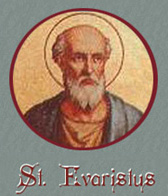
Catholic Book: The Marytrs of the Coliseum Are we bound to profess our Catholic Faith openly? Does Satan Exist? Resisting the Enemies of Our Salvation St. Evaristus Pope and Martyr O eternal Shepherd, watch over the peace of Thy flock, and through blessed Evaristus, Thy Martyr and Sovereign Pontiff, whom Thou didst appoint shepherd over the whole Church, keep her under Thy constant protection. Through our Lord Jesus Christ, Thy Son, Who liveth and reigneth with Thee in the unity of the Holy Ghost, one God, world without end. Amen. (Roman Breviary) Saint Evaristus succeeded Saint Anacletus on the throne of Saint Peter, elected during the second general persecution, under the reign of Domitian. That emperor no doubt did not know that the Christian pontificate was being perpetuated in the shadows of the catacombs. The text of the Liber Pontificalis, says of the new pope: "Evaristus, born in Greece of a Jewish father named Juda, originally from the city of Bethlehem, reigned for thirteen years, six months and two days, under the reigns of Domitian, Nerva and Trajan, from the Consulate of Valens and Veter (96) until that of Gallus and Bradua (108). This pontiff divided among the priests the titles of the city of Rome. By a constitution he established seven deacons who were to assist the bishop and serve as authentic witnesses for him. During the three ordinations which he conducted in the month of December, he promoted six priests, two deacons and five bishops, destined for various churches. Evaristus received the crown of martyrdom. He was buried near the body of Blessed Peter in the Vatican, on the sixth day of the Calends of November (October 25, 108). The episcopal throne remained vacant for nineteen days." The Bollandists explain two passages of this text as follows: Saint Anacletus had ordained twenty-five priests for the city of Rome; Saint Evaristus completed this institution by settling the boundaries of each of these titles, and filling the vacancies which probably occurred during the persecution of Diocletian. As for the decree by which he ordains that seven deacons make up the cortege of the bishop, we find in the first epistle of Saint Anacletus a text which helps us to grasp and better perceive the discipline of the early Church. There existed amid the diverse elements which composed it in its first years, proud minds, envious souls, ambitious hearts which could not bear the yoke of obedience, and who by their revolts and incessant detraction fatigued the patience of the Apostles. The deacons were to be the Pope's guards against their ill-intentioned projects. It was at the same time as Saint Ignatius, the illustrious bishop of Antioch, that Pope Saint Evaristus gave his life by martyrdom. The acts of his martyrdom are lost, but we perceive that the same faith, heroism and devotion united the churches of the East and of the West. He is often represented with a sword because he was decapitated, or with a crib, because it is believed that he was born in Bethlehem, from which his father migrated. |
October 27th, Vigil of Sts. Simon and Jude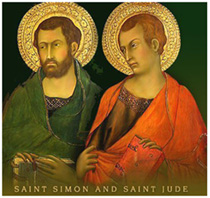 Why the World Continually Persecutes the Church What Can and Cannot Be Reformed in the Church. No One can Change the Doctrine of Jesus Christ, Articles of Faith, the Commandments or the Sacraments Vigil of Sts. Simon and Jude Grant, we beseech Thee, O almighty God, that as we approach the glorious festival of the Apostles Simon and Jude, so may they approach Thy divine majesty in our behalf. Through our Lord Jesus Christ, Thy Son, Who liveth and reigneth with Thee in the unity of the Holy Ghost, one God, world without end. Amen. (Roman Breviary) Simon, whom St. Matthew calls the Cananean to distinguish him for St. Peter who bore the same name, was born at Cana in Galilee. St. Luke calls him Zelotes, because he had probably belonged to the Jewish party, thus called for its zeal in defending the faith. Jude, surnamed Thaddeus or Lebbe (the courageous) was by Cleophas his father and Mary his mother, a nephew to St. Joseph and the Blessed Virgin and cousin to Jesus. St. James, the Less, first bishop of Jerusalem and the first apostle martyred, and Simeon who succeeded him in this see, were his brothers. These apostles of Christ heard from the lips of the Master at the Last Supper the words of the Gospel: I am the vine, you are the branches. Every branch which bears fruit, My Father shall prune in order that it should bear more. After having preached the Gospel at the price of great sufferings, the first in Egypt, the second in Mesopotamia, they were both martyred in Persia. Wherefore their feasts are celebrated on the same day in the same office and their names are mentioned jointly in the Canon of the Mass. |
October 28th, Sts. Simon and Jude, Apostles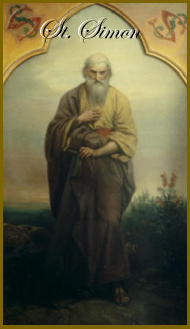 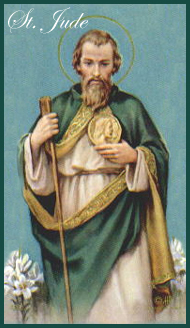
Life of St. Jude Thadeus, the Forgotten Saint Novena to St. Jude, Apostle from Oct. 20th - Oct. 28th Sts. Simon and Jude The Epistle of St. Jude with Catholic Exposition by Rev. John MacEvilly, 1891 St. Jude, Helper in Desparate Cases and St. Rita, Advocate of the Impossible--History Prayers and Devotions How to Obtain Answers to Our Prayers The Labor of the Apostles: Their Teaching of the Nations The Lives of the 12 Apostles and St. Paul: The Apostles Creed Vol. 1, Part 2: The Ministry of Jesus Christ from the Latin Vulgate, as Illustrated by Catholic Artist and Historian, James Tissot, 1899 Vol. 2: Parables and Teachings of Jesus Christ from the Latin Vulgate, as Illustrated by Catholic Artist and Historian, James Tissot, 1899 Sts. Simon and Jude, Apostles O God, Who through Thy blessed Apostles Simon and Jude hast brought us to the knowledge of Thy name, grant that by advancing in virtue we may celebrate their everlasting glory and by celebrating their glory advance in virtue. Through our Lord Jesus Christ, Thy Son, Who liveth and reigneth with Thee in the unity of the Holy Ghost, one God, world without end. Amen. R. Behold I am sending you forth like sheep in the midst of wolves, saith the Lord: Be therefore wise as serpents, and guiless as doves. V. While you have the light, believe in the light, that you may become sons of light. R. Take my yoke upon you, saith the Lord, and learn from me, for I am meek and humble of heart: For my yoke is easy, and my burden light. V. And you will find rest for your souls. For my yoke is easy, and my burden light. (Roman Breviary) Simon was a simple Galilean, a brother of Jesus, as the ancients called one's close relatives--aunts, uncles, first cousins; he was one of the Saviour's four first cousins, with James the Less, Jude and Joseph, all sons of Mary, the wife of Alpheus, or Cleophas, either name being a derivative of the Aramaic Chalphai. The latter was the brother of Saint Joseph, according to tradition. All the sons of this family were raised at Nazareth near the Holy Family. (See the Gospel of Saint Matthew 13:53-58.) Simon, Jude and James were called by Our Lord to be Apostles, pillars of His Church, and Joseph the Just was His loyal disciple. Saint Simon the Zealot or the Zealous, was the name this Apostle bore among the twelve. He preached in Egypt, Mauritania (Spain), and Lybia, leaving behind him the fertile hills of Galilee, where he had been engaged in the healthful cultivation of the vineyards and olive gardens. He later rejoined his brother, Saint Jude, in Persia, where they labored and died together. At first they were respected by the king, for they had manifested power over two ferocious tigers who had terrorized the land. With the king, sixty thousand Persians became Christians, and churches rose over the ruins of the idolatrous temples. But the ancient enemy, who never sleeps, rose up, and when the two went elsewhere the pagans commanded them to sacrifice to the sun. Both Apostles, just before that time, had seen Our Lord amid His Angels. Simon said to Jude, "One of the Angels said to me, I will take you out of the temple and bring the building down upon their heads. I answered him, Let it not be so; perhaps some of them will be converted." They prayed for mercy for the people and offered their lives to God. Saint Simon told the crowd that their gods were only demons, and ordered them to come out of the statues, which they did, revealing themselves under hideous forms. But the idolaters fell on the Apostles and massacred them, while they blessed God and prayed for their murderers. Saint Jude has left us a short but powerful epistle, written after the death of his brother James, bishop of Jerusalem, and addressed to the new Christians being tempted by false brethren and heretics. |
October 31st, Vigil of All Saints. Day of Fast and
Partial Abstinence
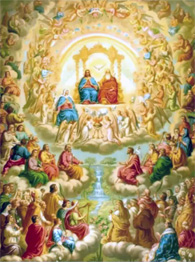
Vigil of All Saints from the Liturgical Year The Vigil of All Saints Multiply Thy grace upon us, O Lord, and grant that we may be gladdened at the holy confession of those to whose glorious festival we look forward. Through our Lord Jesus Christ, Thy Son, Who liveth and reigneth with Thee in the unity of the Holy Ghost, one God, world without end. Amen. (Roman Breviary) The most illustrious martyrs had at Rome, from the fourth century century, their basilicas, where was celebrated each year the anniversary of their death, or rather their birth in heaven. At that time a number of Masses were prescribed without any fixed day in honor of those who had no public recognition. When later the names of saints who were not martyrs were introduced into the ecclesiastical Calendar, a more universal character was given to such Masses. It is thus that in the eighth century the Gregorian Sacramentary indicates among the common Masses without a date: The Mass in honor of All Saints. Fixed in the following century on November 1st, it became the Mass of All Saints' Day for which we are this day prepared by a vigil. This explains why the Mass of the vigil, as well as that of the feast, contains extracts from the Masses of the Common of Martyrs. Let us prepare our souls for the graces heaven is about to shower upon the earth in return for its homage. Tomorrow the Church will be so overflowing with joy, that she will seem to be already in possession of eternal happiness; but today she appears in the garb of penance, confessing that she is still an exile. Let us fast and pray with her; for are not we too pilgrims and strangers in this world, where all things are fleeting and hurry on to death? Year by year, as the great solemnity comes round, it has gathered from among our former companions new saints, who bless our tears and smile upon our songs of hope. Year by year the appointed time draws nearer, when we ourselves, seated at the heavenly banquet, shall receive the homage of those who succeed us, and hold out a helping hand to draw them after us to the home of everlasting happiness. Let us learn, from this very hour, to emancipate our souls, let us keep our hearts free, in the midst of the vain solicitudes and false pleasures of a strange land: the exile has no care but his banishment, no joy but that which gives him a foretaste of his fatherland. With these thoughts in mind, let us say with the Church the Collect of the Vigil: O Lord our God, multiply Thy grace upon us; and grant us in our holy profession to follow the joy of those, whose glorious selemnity we anticipate. Through our Lord Related Links to combat the attacks of the devil: The Devils Plan to Ruin Souls and the Protection of the Holy Angels Good and Bad Angels The Triumph of the Blessed Sacrament or Exorcism of Nicola Aubry, by Fr. Michael Muller A Short Explanation on the Rite of Exorcisms Resisting the Enemies of Our Salvation Temptations and the Devils who Tempt Temptations: Why we have them St. Michael/ Exorcism |
http://catholicharboroffaithandmorals.com/